January
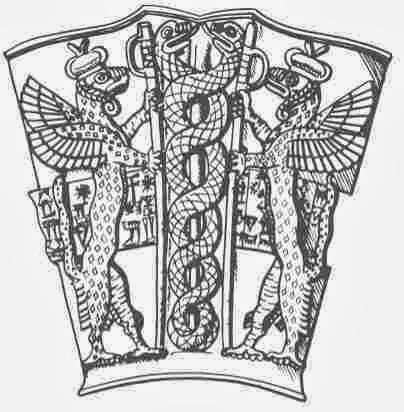
Early Sumerian version of the caduceus.
LEARNING IS TO THE MIND
WHAT LIGHT IS TO THE EYE
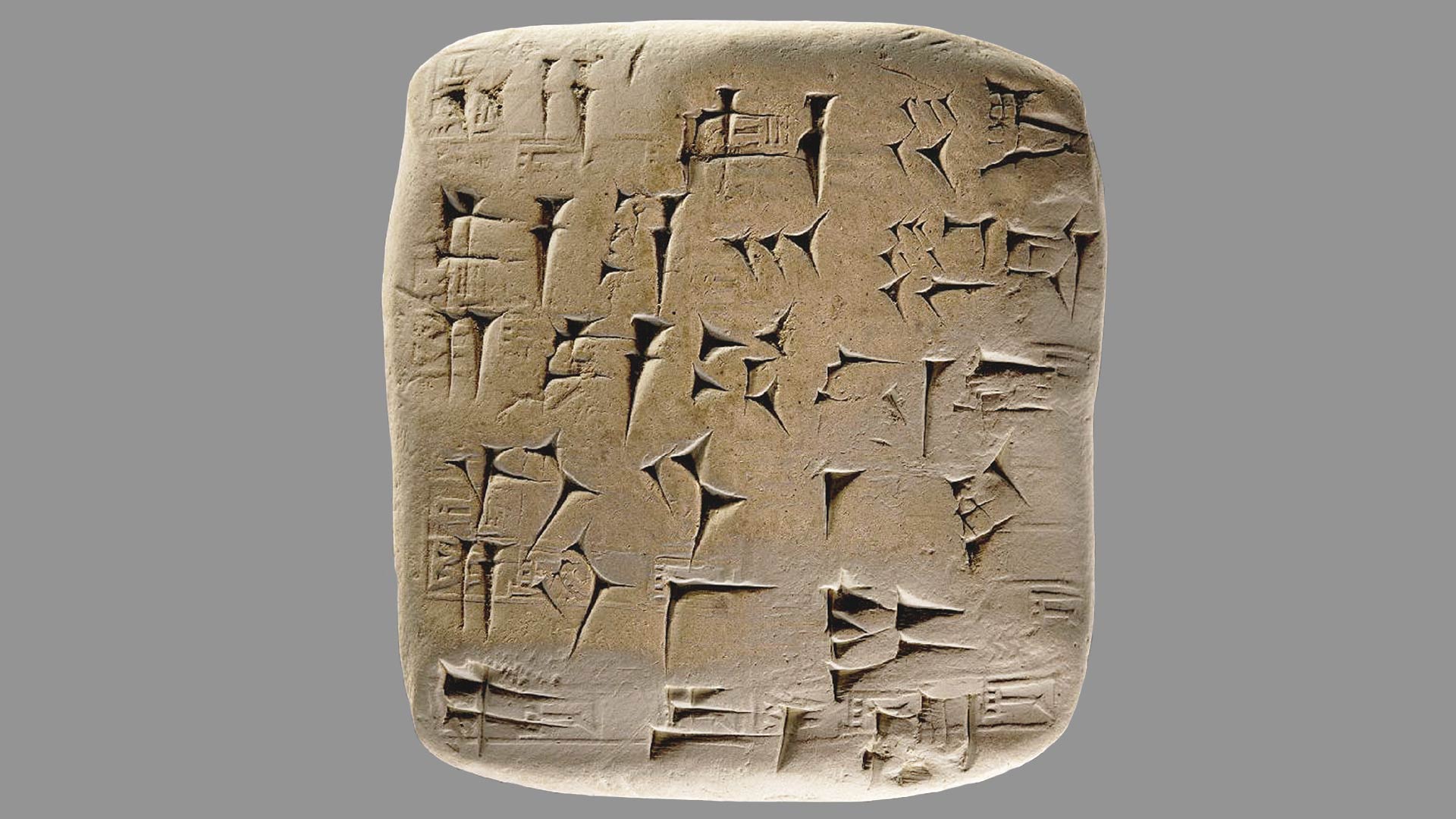
CUNEIFORM WRITING:
Latin CUNEUS means WEDGE and FORMA means SHAPE
The script was in active use from the early Bronze Age until the beginning of the Common Era; developed to write the Sumerian language of southern Mesopotamia. Cuneiform is the earliest known writing system and was adapted to write a number of languages in addition to Sumerian. Akkadian texts are attested from the 24th century BCE onward and make up the bulk of the cuneiform record.
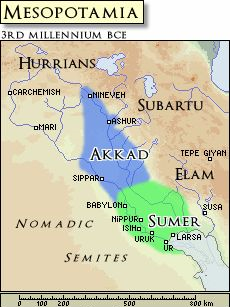
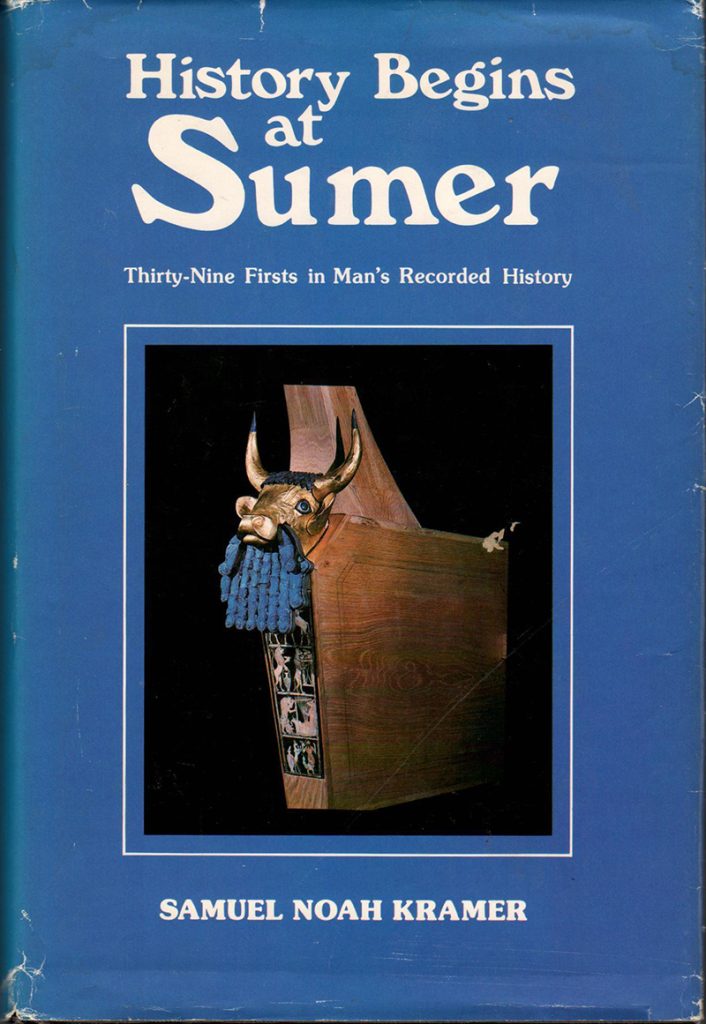
TO SUMER THE WORLD OWES ALL ITS BASIC ARTS
OF LITERATE CIVILIZED LIFESTYLES
“SUMER--A STORE OF KNOWLEDGE”
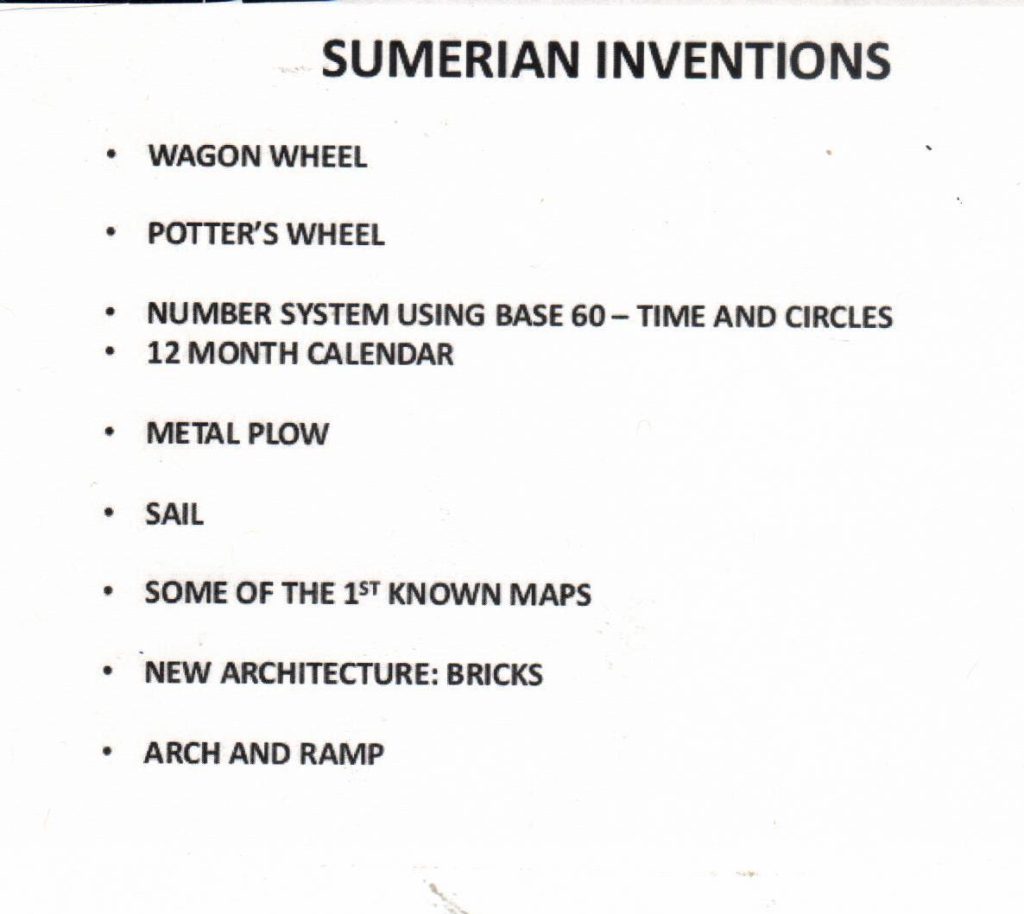
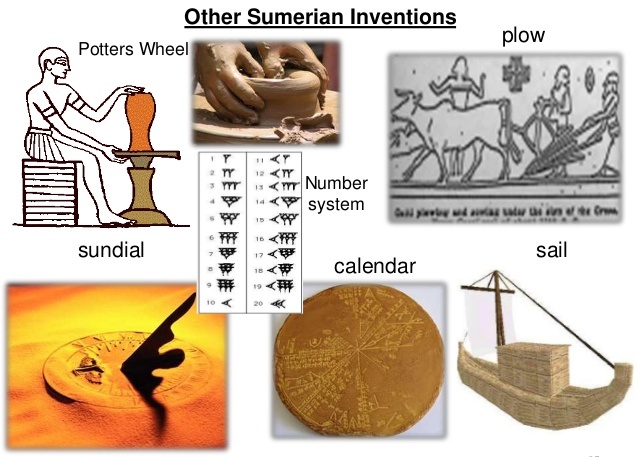
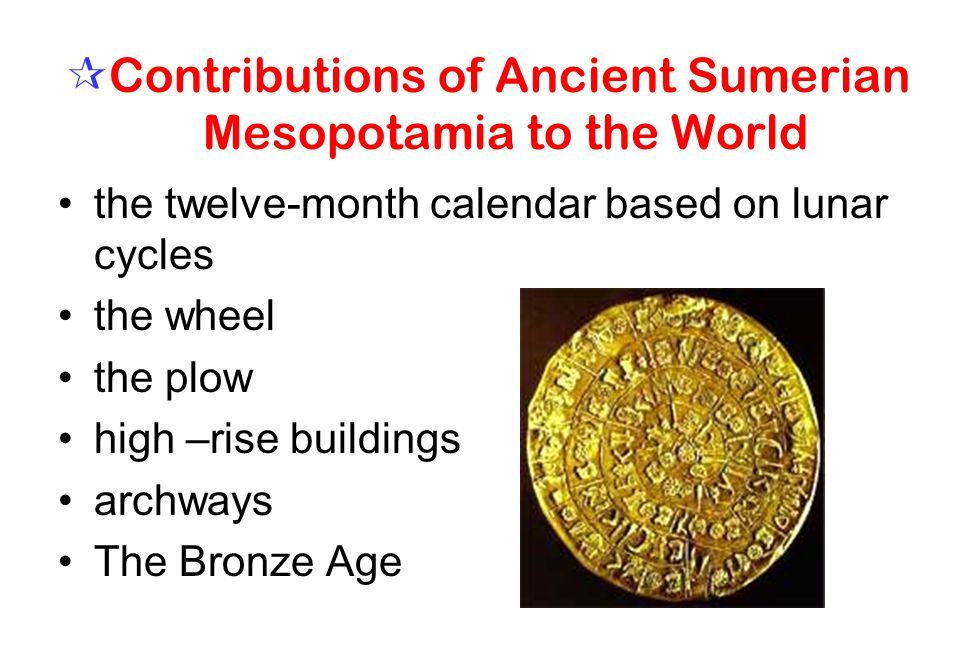
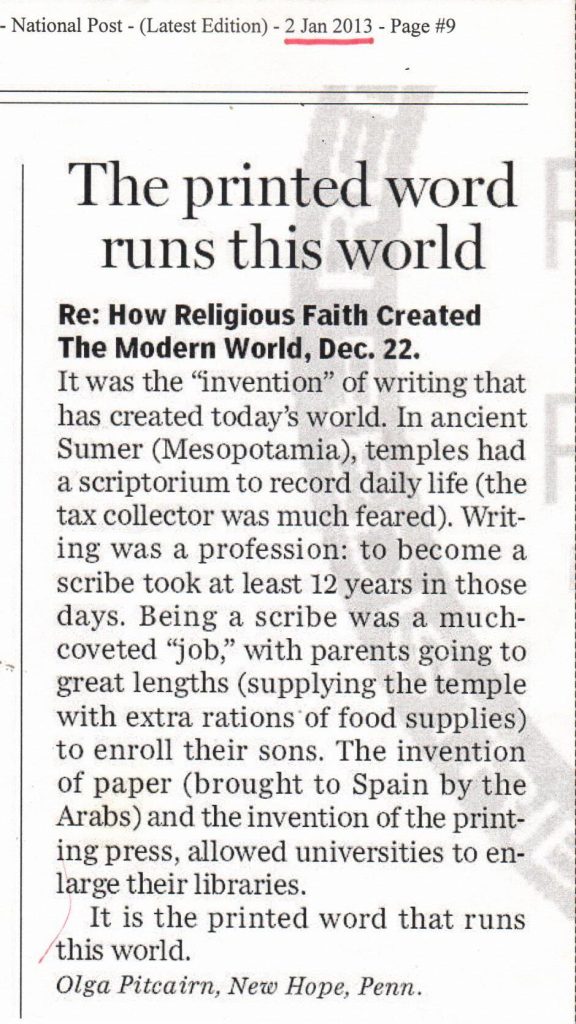
A religion cannot become a global faith without BOOKS TO TEACH
THE BOOK OF GENESIS
The doctrine of the creative power of the divine word:
Let there BE light (electricity/fusion energy)
MAN:
AN ANIMAL WHO SEES
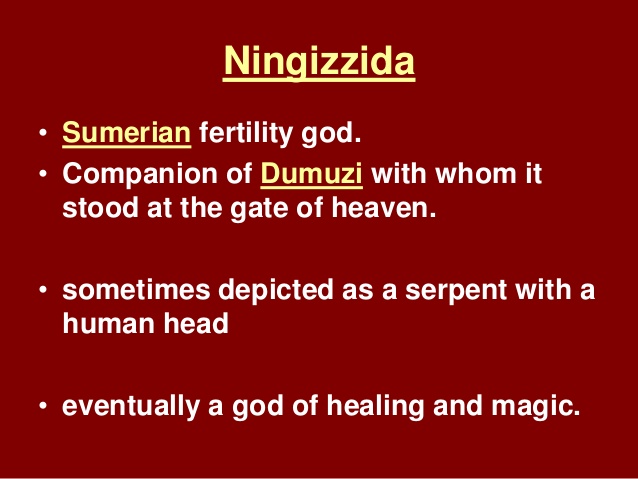
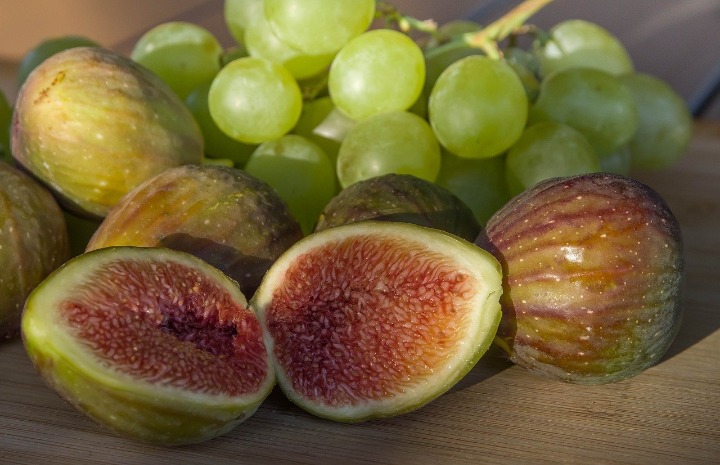
“THE EYES OF THE LORD”
Genesis 2:8—NOW . . . the Lord God had planted a garden [cultivated parcel] in the East [sunrise], in EDEN—and there he put the man he had formed [Sumerian creation story: November 2022].
Genesis 2:15—the Lord God took the man and put him in the Garden of EDEN to WORK it and take care of it [Sumerian].
Genesis 2:9—In the middle of the garden were the Tree of Life and the Tree of the Knowledge of Good and Evil.
Genesis 2:16—And the Lord God commanded the man: YOU are free to eat from any tree in the garden BUT . . . you must not eat from the Tree of the Knowledge of Good and Evil. For when YOU eat of it you will surely die.
Genesis 3—Ancient symbol of immortality—renewal of life because it sheds its skin, the Serpent said to the woman: DID GOD REALLY SAY that you must not eat from any tree in the garden? The woman said: We may eat fruit from the trees in the garden. But . . . God did say . . . you must not eat fruit from the tree that is in the middle of the garden and you must not touch it, or you will die. The Serpent said: You will not die. Your EYES will be opened and you will be like God KNOWING good and evil.
[--Learning is to the MIND what Light is to the EYE--]
SO . . . the woman ate the fruit [no mention of apple]—so pleasant to the eye and for gaining wisdom. She also gave the man some and he ate it. Then THEIR EYES were opened: they were naked. [Gen. 9:20Noah planted a vineyard; when he drank some of the wine he became DRUNK and lay UNCOVERED in his tent]. Upset, the Lord God appeared (wearing a garment of skin -Gen. 3:23) and said to the man: Have you eaten from the tree that I commanded you not to eat from? The man pointed his finger at the woman and said: She gave me some. The woman said, pointing at the serpent, He deceived me and I ate.
Genesis 3:19—Pointing at the man, the Lord God pronounced: By the sweat of your brow you will EAT YOUR FOOD until you return to the ground, since from it you were taken; for DUST you are and to DUST you will return [Sumerian]. And turning to the woman who had enticed the man to eat the fruit—to punish her—he said: Your desire will be for your husband and . . . . . . he will rule over you.
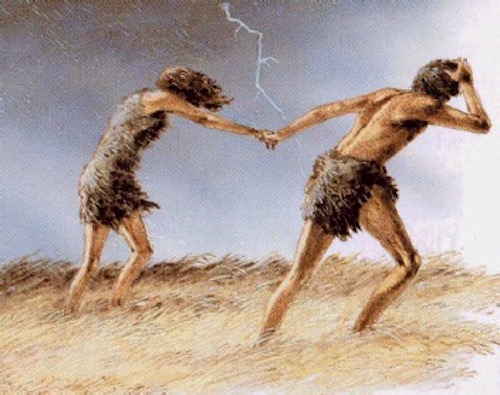
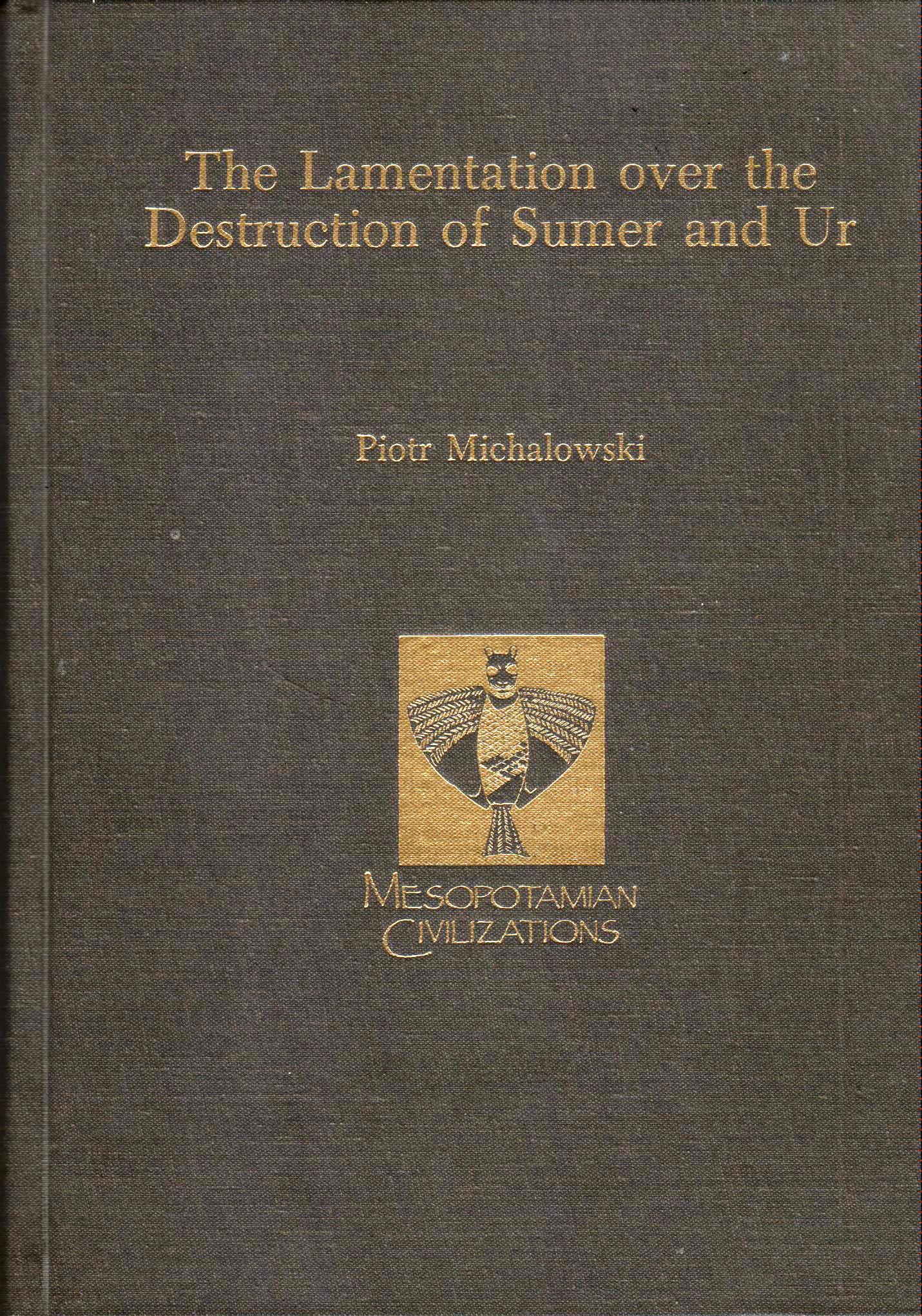
THE LAMENTATION OVER
THE DESTRUCTION OF SUMER AND UR
The deity of the city-state UR was the moon-god Nanna/SIN;
He was symbolized by the crescent moon and star.
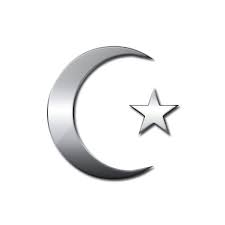
IT WAS THE BRONZE AGE:
3200--1200 BCE
Ur-Nammu was the first ruler of the Third Dynasty of Ur. The fall of the city happened during the reign of King Ibbi-Sin and occurred circa 2200 BCE. The baton went to Akkad
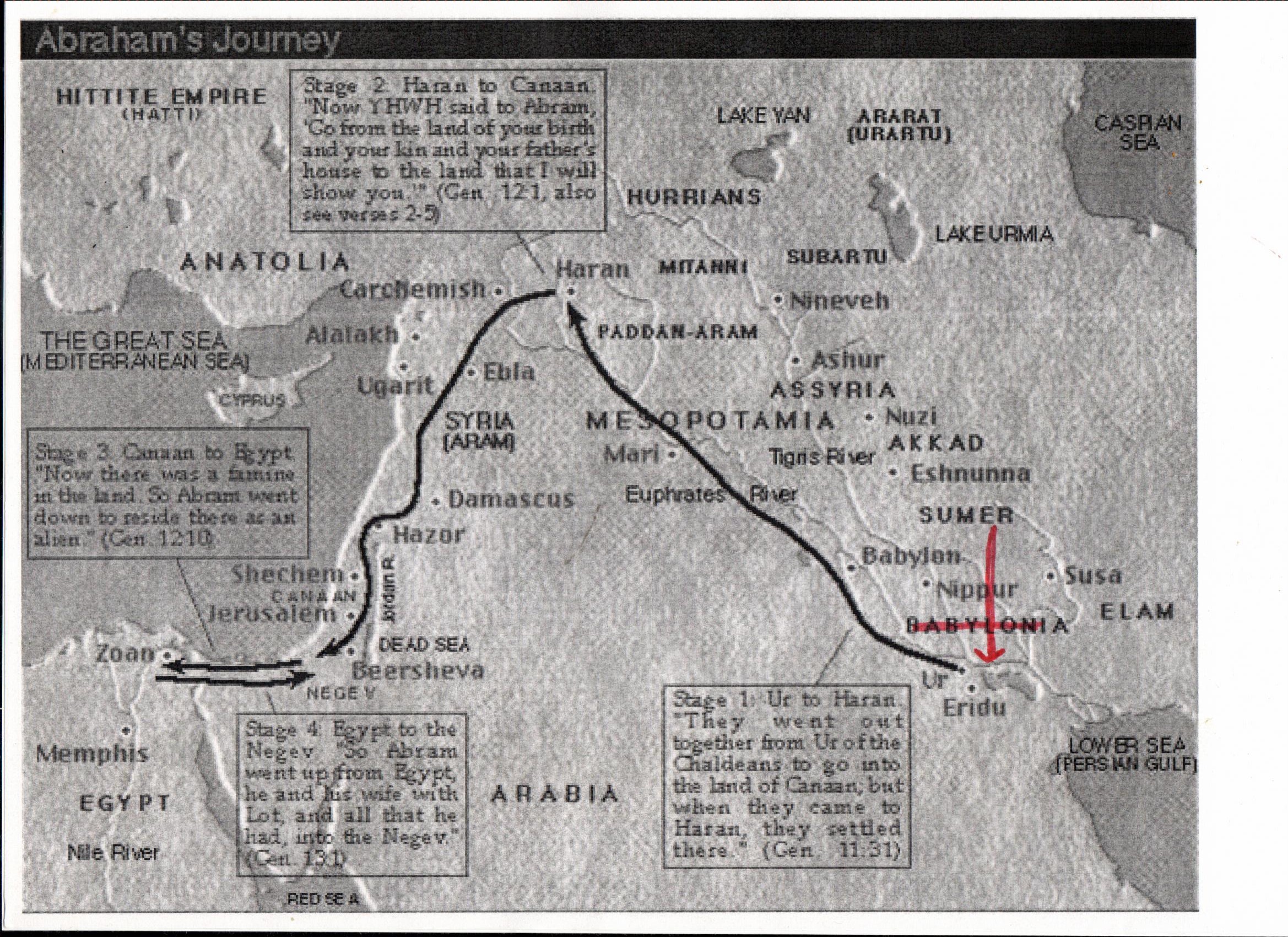
The Chaldean Aramaeans of Ur—[according to “UR OF THE CHALDEES” by Leonard Woolley]—are not to be found in Southern Mesopotamia [SUMER] before the beginning of the first millennium but from the 10th to the 6th centuries BCE. The Chaldeans were well-known astrologers, famous for predicting the future [MAGI from the east followed a STAR to Jerusalem [Matthew 2] to worship the new-born king of the Jews] and of course magic tricks! That’s why the Chaldean branch of Aramaeans [Hebrews/Jews] put “their history” in the book of Genesis. Babylonian King Nebuchadnezzar [reigned 605-562 BCE] was the second Chaldean king.
THE BOOK OF GENESIS
is the PRELUDE
to the book of EXODUS and the religion of the Israelites
IT IS THE STORY OF—
THE FAMILY TREE
THE BLOODLINE
[Sumerian creation story: November 2022]

I spin like a spider myriad reflections
and embroider with strands of vivid observations.
I paint fantasies with frivolous perceptions
and build in the air with luminous illusions
brilliant tapestries and scintillating castles.
[copyright Olga Pitcairn]

Starting at Genesis 11:31
The biography— adventures—of Abram/Abraham
Our future “patriarch” has two brothers: Nahor who has two daughters and Haran, deceased, who has a son called LOT. The three brothers live with their father Terah in UR of the Chaldeans. Father Terah decides to immigrate to Canaan. Nahor decides to stay.
So . . . Terah leaves with son Abram and his wife Sarai and grandson Lot—taking along their wealth: livestock. They finally arrive in HARAN, a city to the north of Canaan. Terah is tired of “wandering” and they settle down there. He dies at age 205. Abram buries his father. Nephew Lot wants to know if they continue living at Haran or return to UR of the Chaldeans, his birthplace. Abram goes to a huge rock plateau. He sits on a boulder and contemplates the vast plain ahead that leads toward Canaan. With a sigh he recalls his father saying it was the land of milk and honey. As he nods, he folds his hands. Suddenly, out of the blue, a breeze tickles his right ear and someone whispers: ‘Abram, why not leave this place and settle in the land of your father’s golden dream?’ Eyes wide open, startled, Abram turns his head. Lo-and-behold, God is smiling at him. ‘Abram’, he says, ‘I promise—I predict—that you’ll be prosperous and multiply. I’ll make sure that you’ll become a great nation. I promise that you will be a blessing to all peoples on earth’.
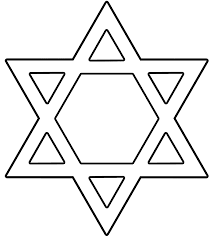
So . . . in a nutshell: At age 75, Abram packs up and travels with childless Sarai, his nephew Lot, his entire household and livestock to CANAAN—where he pitches his tents near the great tree of Moreh at SHECHEM. Abram is contemplating his next move when out of the blue, God again appears to him. ‘Abraham,’ he whispers, ‘how about . . . if I‘ll give this land to your offspring?’ Face aglow, eyes shining, Abram whispers, ‘Lord, so that we can communicate, what you want me to do?’ The Lord puts his lips at Abram’s ear. ‘Build me an altar, Abram. Offer me a sacrifice; that will be the sign for calling on me.’ Encouraged by the thought that the Lord had offered the land to his future children, Abram builds an altar to the Lord. Looking from the hills at Shechem down to the fertile valley, he nods, murmuring to himself that his kids will need this land as well. Determined, he moves on, and pitches his tents between BETHEL and AI. He builds one more altar . . . in case; one never knows, better be prepared than sorry. He offers a sacrifice; and calls on the Lord who tells him to go on. Abram, eager to expand his territory, strolls on and enters the NEGEV. After a while he has a hard time grazing his flocks: having to compete with other herdsmen for water. To top it all, a famine in Canaan forces him to keep moving. Abram decides, with a nod from Lot, to travel with his household to bountiful, grain-rich EGYPT.
So . . . Abram enters his wife Sarai’s tent and sits down for a serious chat. She offers him a cup of goat milk and a piece of bread and then sits facing him. ‘Sweet honey,’ Abram says, ‘I can’t let my household starve.’ He takes a bite of bread and chews. Then he says, ‘This is our staff of life. So Lot and I decided to go to Egypt, our nearest breadbasket.’ He sips milk. “Sweet honey,’ he continues, ‘you are a beautiful woman.’ He nods at her. ‘When the Egyptians see you, they will say that you are my wife, and they will kill me but you will live.’ Sarai gets up and sits next to her husband. ‘Yes, Abram?’ she whispers. ‘What you want me to do?’ Abram takes Sarai’s hand. ‘How about . . .’ and he squeezes her hand. ‘I’m your sister?’ Sarai says with a slight nod of her head. All smiles, Abram says, ‘Thank you, sweet honey. You’ll spare my life and I’ll be treated well.’ He puts his arm around her and whispers in her ear, ‘Sister Sarai, we’ll see each other often, don’t you worry.’ Sarai fondles his earlobe and says, ‘I can’t show up in these rags, dear Abram. I need new garments.’ Abram nods and says, ‘Of course, sweet honey. Get your seamstress busy, and . . .’ he chuckles, ‘I’ll get you pretty purple sandals. That will be my gift.’ They embrace. To Be Continued

The geographical PICTURE --from this Genesis story—is that of IRON AGE PALESTINE—[1100-500 BCE] as only during that period all the cities/settlements in “the narrative” are known AND occupied.
When the Most High [ELYON] allotted peoples for inheritance,
When He divided up humanity,
He fixed the boundaries for peoples,
According to the number of the divine sons:
For Yahweh’s portion is his people,
Jacob His own inheritance.
[Ugaritic text]
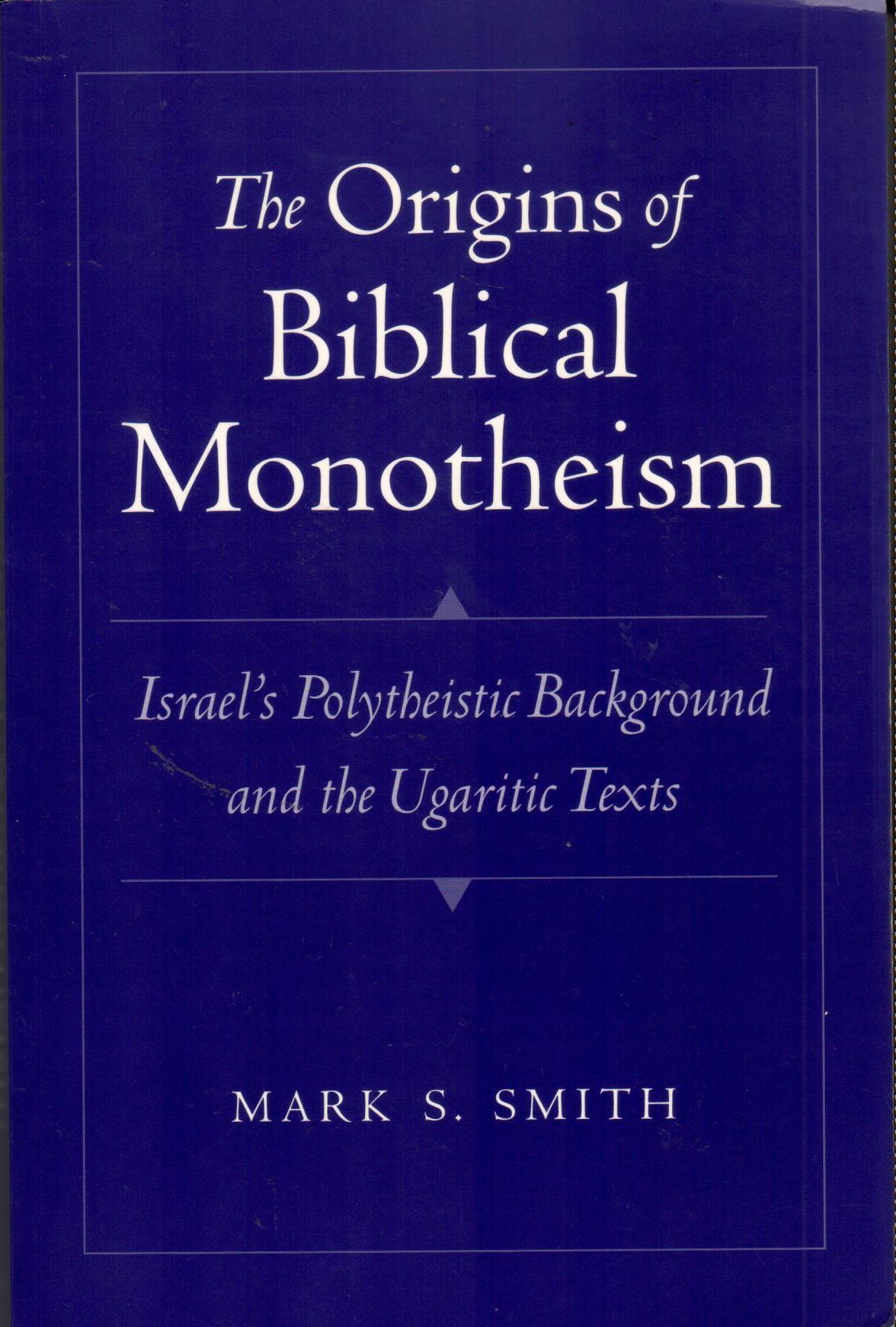
The Origins of Biblical Monotheism
TO BE CONTINUED
February
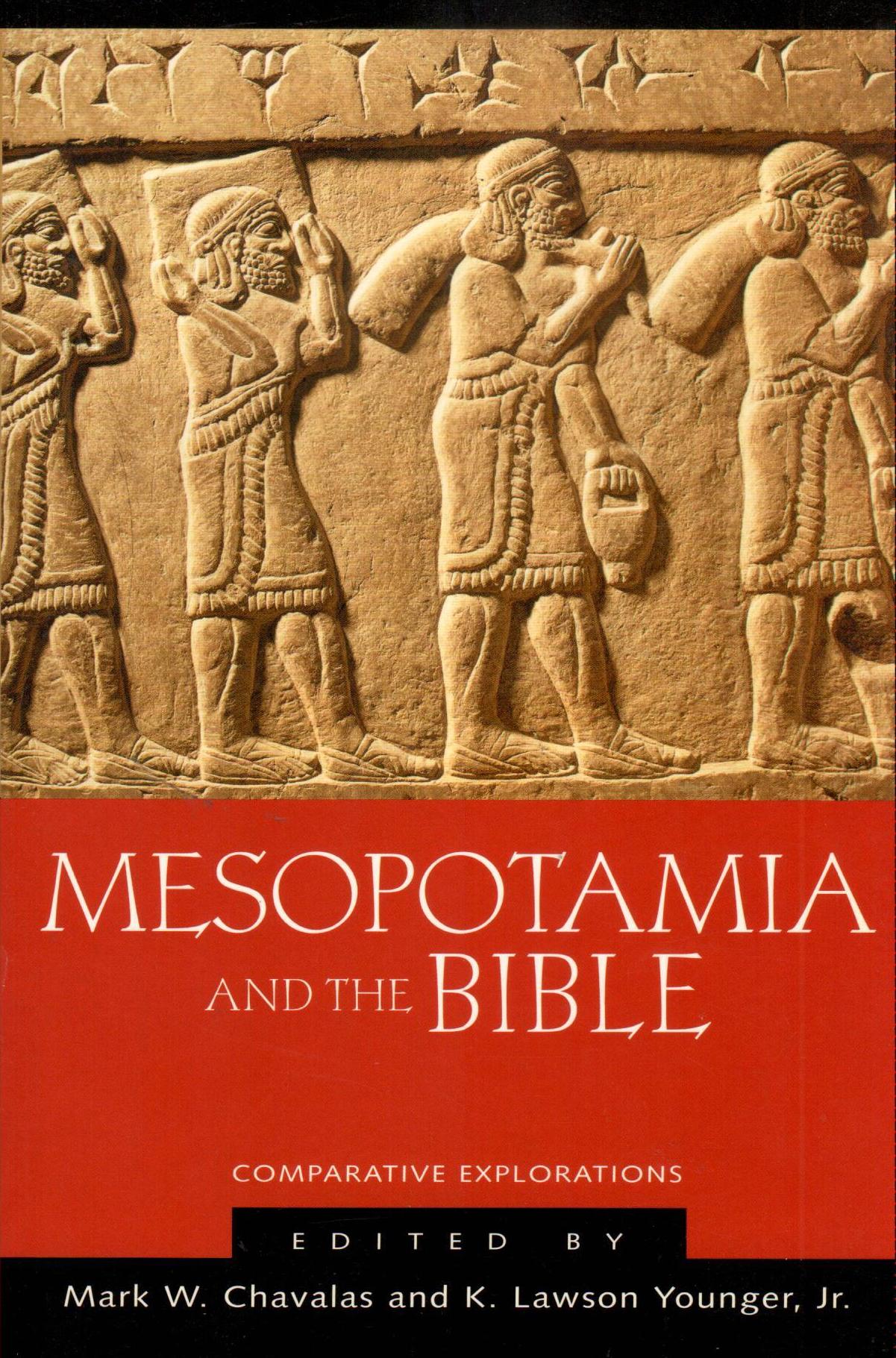
MESOPOTAMIA AND THE BIBLE
Land was the property of the gods
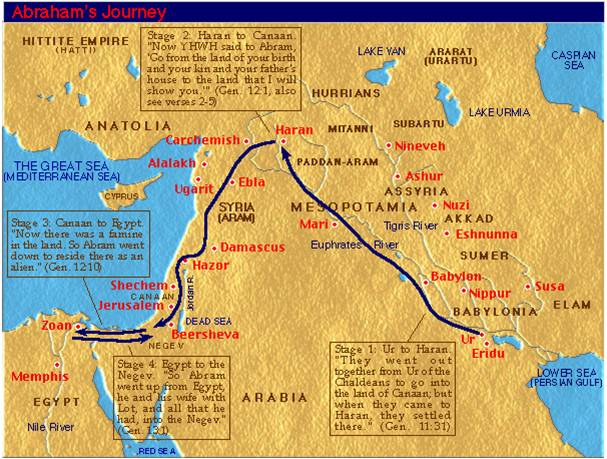
Continuation from January
So . . . Abram and his family enter fertile EGYPT. As predicted, Pharaoh takes a liking to beautiful Sarai and Abram tells him that she is his sister. Sarai stays at the palace. Abram is welcomed with open arms by the Egyptians. His herdsmen are respected and are allowed to graze Abram’s flocks without hinder. Abram acquires more livestock and more servants; he is doing very well for himself. But then . . . a whistleblower, one of Lot’s servants, informs Pharaoh that, to tell the truth, Sarai is Abram’s wife. Needless to say Pharaoh is upset? He summons Abram to the palace and the two have an amicable chat. With his blessings, Pharaoh sends the couple with their considerable gains out of Egypt. Abram, Lot and Sarai discuss where to go.
So . . . in a nutshell: The family returns to the NEGEV and on to BETHEL where finally they pitch their tents. Abram says to Lot that he will ask God what to do. He goes to the altar he had built years before to call on God. Abram puts his sacrifice, a choice lamb, on the altar and kindles the fire. The aroma of burning flesh is enticing. Abram holds his hands high up and shouts, ‘Here I am Lord God. What you want me to do?’ There is silence. He repeats, ‘Here I am Lord God. What you want me to do?’ Silence. Mystified Abram returns to his tent wondering if God is angry. Then, in a flash, he remembers that, while they were at Shechem, God had promised the land of milk and honey to his offspring. So, Abram says to Lot, ’Let’s walk up the hill. You are aware that our herdsmen are quarrelling?’ Lot nods and sighs. ‘Let’s part,’ Abram suggests as they reach the top. ‘If you go to the left then I’ll go’—he points to Jordan—‘to the right. It’s your choice.’ Lot points to the right: the whole plain of Jordan.
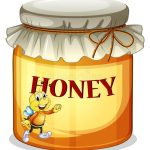
So . . . Abram returns to his altar and waits for God to tell him what to do. From the altar a voice says, ‘Remember that I offered this land, Canaan, to your offspring?’ Abram folds his hands and bows his head as he says, ‘I do remember your offer, oh Lord.’ The flames on the altar crackle and the voice says, ‘You, Abram, stay in this land. Lift up your eyes and look north and south, east and west—all the land that you SEE I will give to you and your offspring FOREVER. I will make your offspring like the dust of the earth. Go, walk the length and breadth of the land of milk and honey—for I am giving it to you.’ [so far, the couple has no offspring]
So . . . in a nutshell: Abram and Sarai pack up their large household and with their animals leave direction for the great trees of Mamre at HEBRON where they pitch their tents. Abram builds an altar to the Lord. When Abram hears that Lot, living near Sodom, has been taken captive by some kings, he marches with armed servants to his rescue. He brings Lot back with his possessions, women, and other folk. In Salem [Jerusalem] King Melchizedek, priest of God Most High [Elyon], celebrates Abram’s victory by offering bread and wine as he blesses him. Abram gives Melchizedek one tenth of the booty he acquired from the defeated kings.
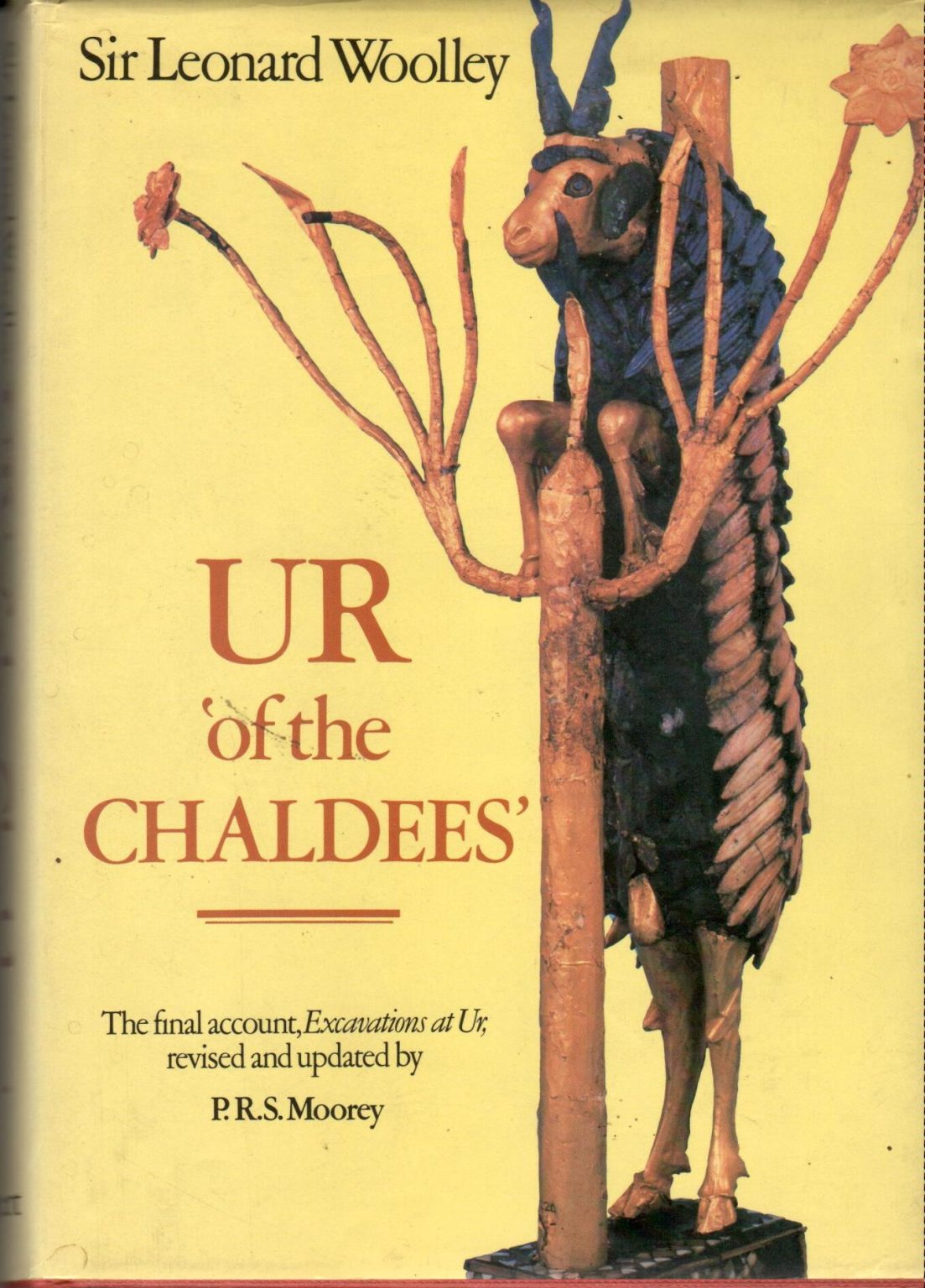
UR OF THE CHALDEES
Back in HEBRON: One balmy evening Abram sits beneath a tree sipping fermented date juice. As he contemplates about what God had promised him, the Lord appears to him in a vision. Right away . . . Abram begins to lament that he has no children and that a servant, Elizier of Damascus, his right hand herdsman, will be his heir. God smiles at him and promises that he will have a son of his own flesh and blood. Above his head the leaves move softly. ‘Abram,’ a voice says, ‘look up at the heavens and count the stars. So shall your offspring be. I am the Lord who brought you out of UR OF THE CHALDEANS to give you this land to take possession of. Know for certain that your descendants will be strangers in a country not their own, and they will be enslaved and mistreated for four hundred years. In the fourth generation your descendants will return. This is my COVENANT with you: to your descendants I give this land, from the river of Egypt to the great river, the Euphrates.’ Elated, Abram rushes to tell Sarai about this covenant God made with him. Sarai nods and reminds him that they have, as yet, no children, and suggests that he sleeps with her Egyptian maidservant Hagar. [according to custom that child will be hers] A year later, son ISHMAEL is born. Abram is 86 years old. There is a huge celebration welcoming Abram’s first-born offspring. Everyone is content except for barren Sarai who will never have a son from her own bloodline.

GENESIS 17
So . . . in a nutshell: God Almighty [Elyon] appears out of the blue to 99-year old Abram, who is taking a walk, and says, ‘Abram, I want to confirm my covenant.’ Terrified, Abram falls, face down, on his stomach. The voice continues: ‘I will greatly increase your numbers. You will be the father of many nations—from now on your name will be ABRAHAM, kings will come from you. The whole land of Canaan—the land of milk and honey—where you are now an alien I will give as an everlasting possession to you and your descendants after you—and I WILL BE THEIR GOD. The covenant you are to keep is this: Every male among you shall be circumcised—this will be THE SIGN OF THE COVENANT between me and you. And, Abraham, Sarai is from now on to be known as SARAH. I will bless her so that she will be the mother of nations; kings of peoples will come from her. MY COVENANT—I will ESTABLISH with ISAAC whom Sarah will bear to you—by this time next year.’
It is a very hot day—Abraham is sitting at the entrance to his tent when God, disguised as a man, appears with two males. He gets up to say welcome and invites them to a meal. They accept. Abraham tells Sarah to bake bread, and then rushes to his flock and orders that a calf be roasted. When the meal is ready the three eat at the entrance of the tent. Standing under a tree, Abraham watches them. They inquire after Sarah. He replies that she is inside the tent. Then God says, ‘I will surely return to you about this time next year, and Sarah, your wife, will have a son.’ Inside the tent Sarah laughs—she can’t believe it; her womb is barren. God repeats his prediction. When the three men leave—Abraham joins them. As they walk direction Sodom, God says that they came to investigate about the wickedness of the people of Sodom. If it’s true, he will destroy the city. Abraham pleads for his nephew Lot and his family to be saved.
GENESIS 20
So . . . in a nutshell: Abraham packs up and moves to the NEGEV and settles in Gerar. The king, Abimelech, takes Sarah for his wife because Abraham tells him that she is his sister. God pays the king a visit in a dream and informs him that he is as good as dead because Sarah is a married woman. God orders the king to return Sarah to Abraham—a prophet who will pray for him to live. Out of curiosity, the king wants to know why Abraham said that Sarah is his sister. Abraham explains that Sarah is the daughter of his father Terah’s other wife; that’s how she became his wife. And, so as to show him her love, Sarah always says: ‘He’s my brother.’ Satisfied with the clarification, the king happily gives Abraham sheep, cattle, slaves and Sarah—telling her that he’ll give her brother Abraham one thousand shekels in silver as repentance. To Abraham King Abimelech says, ‘My land is before you; live wherever you like.’ Abraham prays to God. And God heals the king, his family, and household so they can have children again. He had closed every womb so that Abraham’s wife Sarah could not conceive and have a child with the king!
So . . . Abraham accepts King Abimelech’s offer and settles in his land. Sarah becomes pregnant, just as God predicted. Abraham is 100-year old when ISAAC is born. The infant is eight days old when Abraham circumcises him, as God had commanded. A feast is given once Isaac has been weaned: a toddler standing on his own two feet. Ishmael makes a face, commenting that he is the first born. Sarah, furious, says to Abraham, ‘Get rid of Ishmael and Hagar, his slave mother. He will never share in the inheritance with my son Isaac.’ Abraham is greatly distressed because he dearly loves his son Ishmael. [by now a lean teenager] But God tells him that he’ll make Ishmael also into a nation. [a long story] Abraham should do what Sarah tells him because Isaac’s descendants will be the rightful heirs to the “Promised Land”: from the great river of Egypt to the great river, the Euphrates. [the pecking order: to be considered a Jew, mother must be a Hebrew]
So . . . Abraham has dug a well without King Abimelech’s permission and the king’s servants seize the well. The two men come to an agreement that in return for sheep and cattle Abraham has the right to stay in the land. They swear an oath. Abraham gives the king seven ewe lambs as a witness that he had dug the well and now owns it. He plants a tamarisk tree [today a flagpole] at this well. The place is BEERSHEBA. He calls upon the name of the Eternal God [Elyon]. Abraham stays in the land of the Philistines for a very long time.
In the late Stone Age, people in distress—petitioning the gods for life-saving rain—would offer as sacrifice their most precious first-born son. This practice fell into disuse and was replaced by a choice animal for sacrifice.
GENESIS 22
This is the story of how God challenged/tested Abraham—telling him to sacrifice his only son Isaac on his altar. In a nutshell: Father and son [age unknown] travel to Moriah where, on a mountain designated by God, the sacrifice will take place. They arrive, Isaac carrying the wood to kindle the fire. Abraham builds the altar and then adds the wood. The boy asks about the animal to be sacrificed. All choked up, Abraham is mute. He binds his son; then puts him on the wood pile, ready to sacrifice him. Isaac, petrified, stares at his father. But, lo and behold, the angel of the Lord calls out to stop the performance. A ram bleats in a bush. Abraham catches the animal. He unbinds his son and puts the ram on the wood and quickly lights the pile. The angel of the Lord shouts: ‘Because you have not withheld your only son, I will bless you and make your descendants as numerous as the stars in the sky and as the sand on the seashore. Your descendants will take possession of the cities of their enemies and through your offspring all nations on earth will be blessed because you have obeyed me!’ Isaac embraces his father, Abraham. They return to Beersheba.

So . . . Sarah dies in HEBRON, Canaan, when she is 127 years old. Abraham grieves. He buys from Ephron the Hittite the cave and fields of Machpelah near Mamre for 400 silver shekels, and buries his wife Sarah in this cave. His thoughts turn to getting Isaac a wife.
This is the story in a nutshell [Genesis 24]
Abraham receives news that his brother Nahor left UR of the Chaldeans and had settled in PADDAM ARAM. He recalls that nephew Lot has two sisters: Milcah and Iscah, and that Milcah is married to Nahor, her uncle. [an Aramaean]
So . . . Abraham asks his chief servant, Eliezer of Damascus, who manages his household, to get Isaac a wife from the “old country” where he has relatives. In case he dies, the manager should not get Isaac a Canaanite wife and orders him to swear; Eliezer puts his hand under his thigh. Abraham tells him that an angel of his Lord God will guide him on this trip. Eliezer wants to know what to do if the girl refuses. Abraham replies that he is then released from his oath. Satisfied knowing his marching orders, the manager takes 10 camels along with their caretakers, loads them with “goodie bags”, and departs. Finally, he arrives at PADDAM ARAM: it is evening. A long story: of meeting Rebekah at the well outside the city. It turns out she is the daughter of Bethuel—son of Nahor and Milcah. Eliezer asks for their hospitality and gives her a gold nose ring and two gold bracelets. The girl runs home and tells her mother and brother Laban of meeting this rich man who wants to board with them. Laban rushes to the well and invites Eliezer and his camels to stay with his mother. When Eliezer sits down for dinner with the family, he says: ‘I will not eat until I have told you what I have to say.’ Laban says: ‘Then tell us.’ Eliezer reveals that he’s Abraham’s servant. He explains at great length that he came to look for a wife for son Isaac. And with the help of Abraham’s God he arrived safely at this house. He gives Rebekah gold and silver jewelry and precious garments; also gifts for mother Milcah and brother Laban. When, together with her nurse, Rebekah leaves her home, the family wave farewell, and saying: ‘Our sister, may you increase to thousands upon thousands: may your offspring possess the gates of their enemies.’
Upon arrival at Kadesh in the NEGEV Eliezer introduces Rebekah to Isaac; who takes her into the tent of his mother Sarah. [buried in Hebron!] And Rebekah becomes Isaac’s wife. [they are cousins]
GENESIS 25
So . . . Abraham takes a new wife (concubine) named Keturah. They have 6 sons. When Abraham approaches the age of 175 he instructs that his estate, everything he owns, belongs to son Isaac. The 6 sons by Keturah receive gifts and Abraham sends them across the Jordan into the Arabian Peninsula. Sons Ishmael and Isaac bury Abraham next to Sarah in the cave of Machpelah near Mamre: in HEBRON.
According to the science of Archaeology:
THE IRON AGE of the LEVANT
starts circa 1150 BCE
According to Judaism, MOSES wrote five books known as The Pentateuch:
Genesis—Exodus—Leviticus—Numbers—Deuteronomy
It seems that Moses lived in the Late Bronze Age: Exodus (27)—altar with bronze overlay; (30)—a bronze basin. And, also, the Early Iron Age: Deuteronomy (3:11)—bed made of iron (4:20)—iron-smelting furnace; (8:9)—the rocks are iron; (27:5)—any iron tool.

GOD’S COVENANT WITH ABRAM:
GENESIS 15:13
Know for certain that your descendants will be strangers in a country not their own, and they will be enslaved and mistreated FOUR HUNDRED YEARS.
Jacob, grandson of Abraham, [buried in Hebron] and his descendants number 70 when THEY ENTER EGYPT. Joseph, son of Jacob, is already in Egypt, having been sold by his brothers (Genesis 37:12) to Potiphar, an official of Pharaoh. So when Jacob enters Egypt, he is accompanied by eleven sons and their families: Reuben—Simeon—Levi—Judah—Issachar—Zebulun—Benjamin—Dan—Naphtali—Gad—Asher.
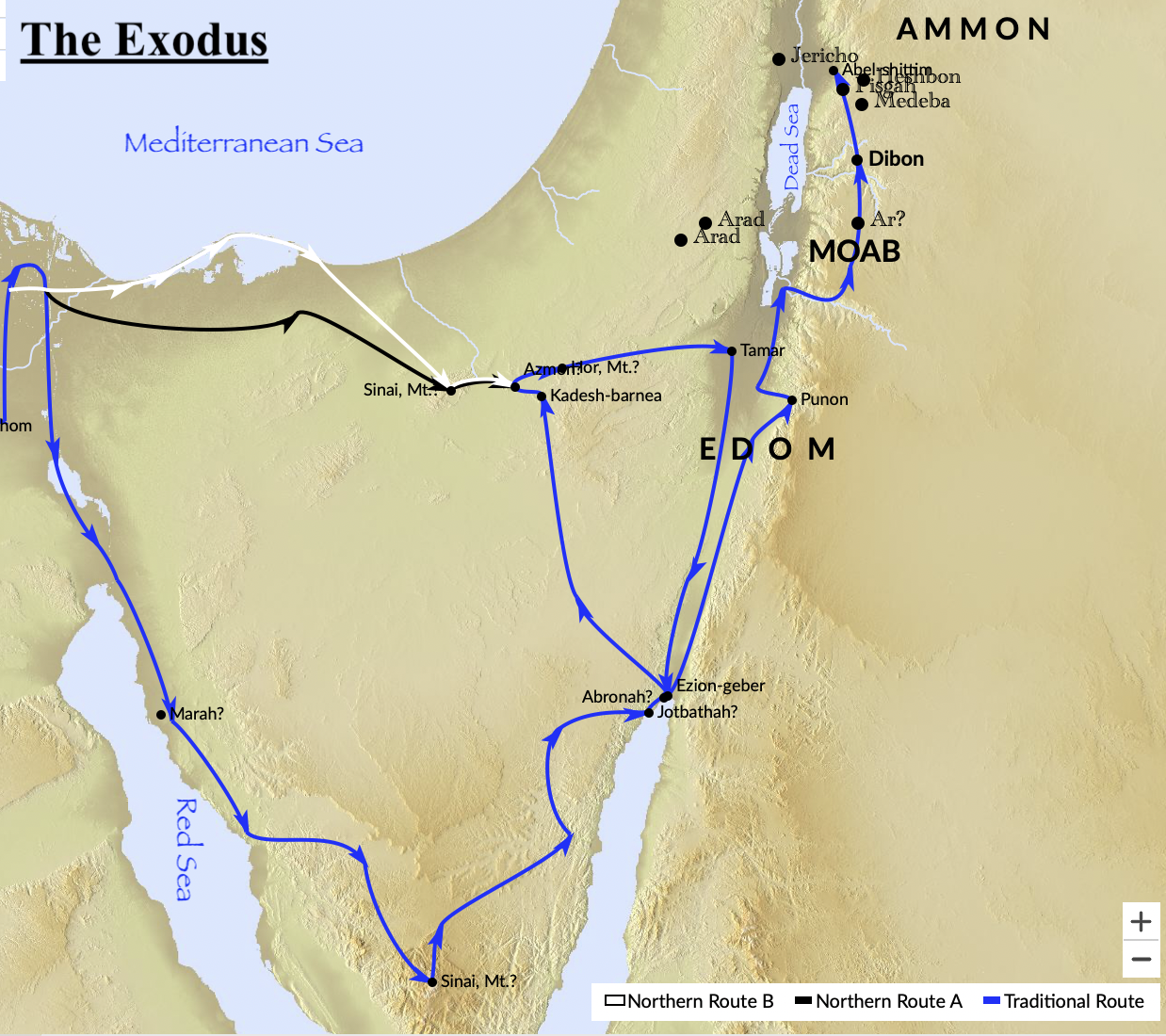
THE ISRAELITES ARE FRUITFUL AND MULTIPLY
THE BOOK OF EXODUS
EGYPT
A new Pharaoh—unacquainted with the past history of the Israelites—says to his own people that they must deal with the Israelites because if they must fight a war these outsiders will join the enemy.
The story begins with the slaughter of baby boys. Pharaoh issues an edict that the two available Hebrew midwives must kill their baby boys but to have mercy on girls. The midwives fear God’s wrath and ignore the instruction. Pharaoh is angry. The midwives’ excuse is that Hebrew women give birth before they arrive on the scene. Then the fearful order comes that every baby boy born to a Hebrew woman must be thrown into the Nile.
It so happens that a Levite woman, married to a Levite man, gives birth to a baby boy. When the infant is three months old she makes a papyrus basket, coats it with tar and pitch, puts her baby boy in it and—her daughter watching—pushes the basket to a spot among the reeds along the banks of the Nile where Pharaoh’s daughter likes to bathe. When Pharaoh’s daughter arrives to take her bath she spots the basket. Curious, she opens it. The baby cries. Pharaoh’s daughter shrieks that it must be a Hebrew boy! The baby’s sister approaches and offers to fetch a wet nurse—and, voila!—the Levite woman shows up. Pharaoh’s daughter tells her to look after the boy. To top it all . . . the woman gets paid for this job!
The baby thrives and grows up into a handsome boy. The story line has it that the Levite woman decides to take the child to the palace and introduce him to Pharaoh’s daughter. Enchanted by his good looks, she adopts him, and gives her son the name MOSES—Egyptian for ‘I drew him out of the water.’
One day . . . now an adult, Moses decides to look up “his own people, the Israelites”. He witnesses an Egyptian beating a Hebrew. Flying into a rage, Moses kills the Egyptian, and then buries him in the sand. The next day, Moses watches two Hebrews fighting. Fuming, he steps up to interfere. In the blink of an eye, God recalls his covenant with Abraham, Isaac, and Jacob. The Hebrew men are ungrateful; there’s always a whistleblower. That’s how Pharaoh hears of Moses having killed and buried an Egyptian. Fearing for his life, sure-footed Moses flees to Midian.
The Story Continues
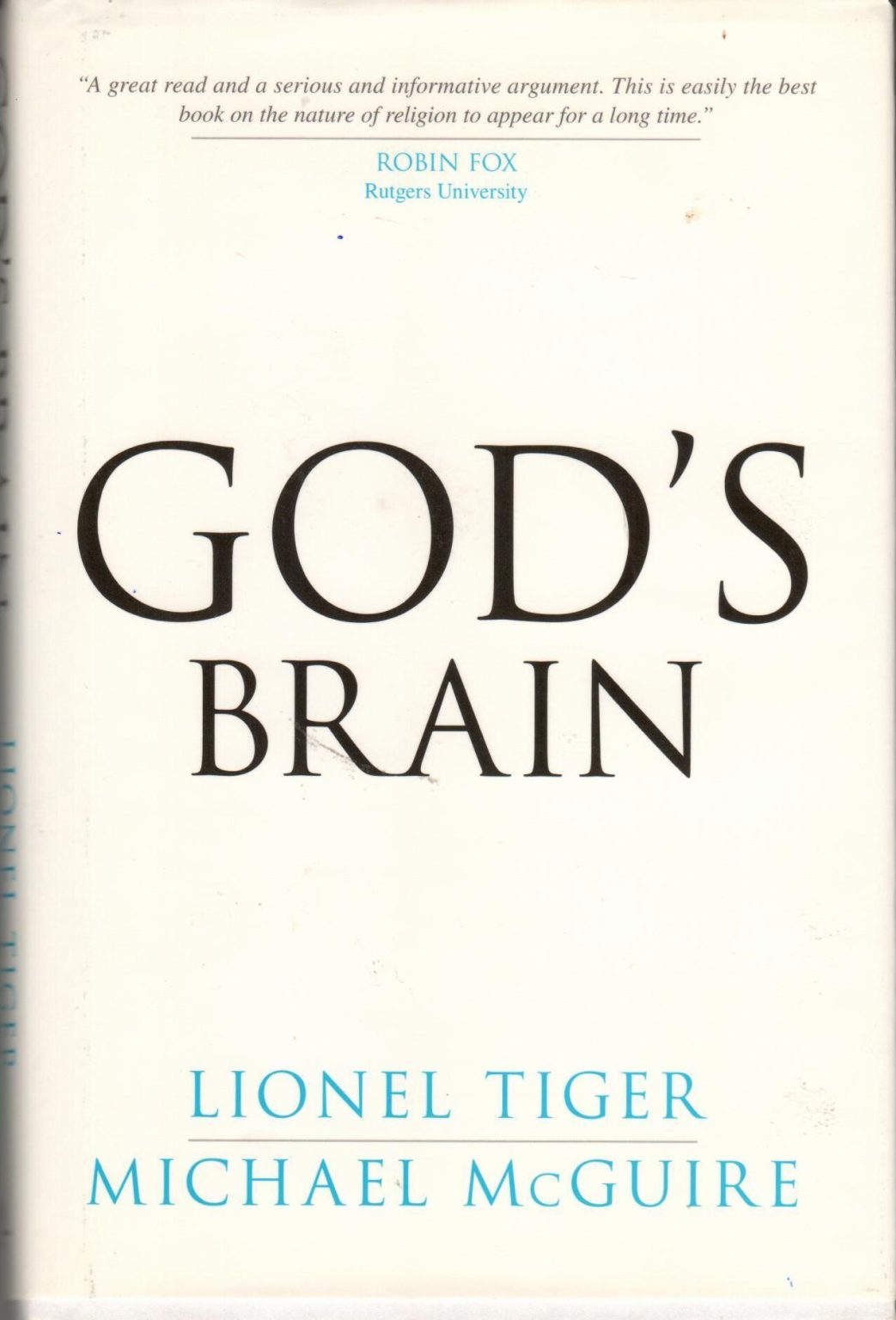
GOD’S BRAIN
IMAGINATION IS THE BEGINNING OF
ALL MAGICAL OPERATIONS
March

“I AM WHO I AM”
3:14
EXODUS
EGYPT
Continuation from February
Fearing for his life, sure-footed Moses flees to Midian. He sits on a rock near a well when seven women approach to water their father’s flock. Shepherds make a go for the women; Moses interferes. The knight-errant offers to draw water and fill the troughs. The women say thanks and leave. Father REUEL, a priest of Midian, is astonished to see his daughters return home early. Excited, they relate that a very good-looking man chased away the shepherds; and he then drew water for the flocks. The priest orders his daughters to invite the man for dinner. Glad to get a roof over his head, Moses accepts. The priest gives him daughter Zipporah in marriage. They have a son: Gershom—Moses says that now he is an alien in a foreign land.
The chronicler then relates that Moses—tending the flocks of his father-in-law, Jethro, (previously known as Reuel)—is walking in the direction of Horeb, the mountain of God. When Moses arrives at Horeb he looks around for shelter. Out of the blue the angel of the Lord appears in flames and fire from inside a bush that does not seem to burn up. Startled, Moses goes to inspect the bush. ‘Moses,’ a voice within the bush shouts, ‘do not come closer! Remove your sandals, because this place is holy ground. Moses, I am the God of your father, the God of Abraham, Isaac, and Jacob.’ Moses puts his hands over his face while God informs him of the misery of his people, the Israelites, in Egypt. ‘Moses’, he says, ‘I have a job for you. I want to rescue the Israelites and as promised bring them to Canaan. Go to Pharaoh and tell him to let the Israelites leave Egypt.’ All shook up, Moses says, ‘Who am I? Pharaoh will just laugh.’ God says, ‘Moses, I’ll be with you. Fetch the Israelites. Bring them to Horeb so they can worship me here.’ Moses doesn’t feel up to the job and shouts, ‘What if they ask me what your name is?’ The fire crackles. God says, ‘Tell them that I AM WHO I AM sends you to rescue his people. Contact the elders of Israel and say that the Lord has sent you, and by that name, the Lord, I am to be remembered forever from generation to generation.’ The flames leap high. ‘Then you and the elders,’ God continues, ‘go to the king of Egypt and tell him that the Lord, the God of the Hebrews, is asking for permission to let them leave for three days so they can offer sacrifices. And if the king is unwilling, I shall strike the Egyptians where it hurts. Then negotiate again so the Egyptians will be glad to see the Israelites leave for worship. I’ll make sure that they’ll give our women silver and gold and precious clothing.’ God softly chuckles. ‘That’s the way to plunder the Egyptians.’ Moses rolls his eyes as he says, ‘What if they do not believe me and say that you did not appear to me?’ God’s voice is stern when he says, ‘What is that in your hand?’ Moses says, ‘My staff,’ as he shrugs. ‘Throw it on the ground,’ God orders. When Moses obeys and his staff turns into a snake he wants to run but God says, ‘Take it by its tail.’ Gingerly, Moses complies and the snake becomes again a staff. ‘When you do this trick’ God says, “they’ll believe you that I appeared. Now, put your hand inside your cloak!’ Moses obeys. When he removes his hand it is leprous, white as snow. He chokes. ‘Put your hand back into your cloak and then remove it,’ God orders. Moses follows the suggestion and is astonished when his hand looks normal. ‘However,’ God continues, ‘if the Israelites do not believe you after the first sign, they will believe you now. And if they do not believe these two signs, then take a bowl with Nile water and pour it on the ground. It will turn into blood.’ Moses is at a loss what to say. ‘O Lord, I’m tongue-tied,’ he croaks. ‘This is not a job for me.’ The Lord says, ‘Who gave you your mouth? It is I, the Lord. Now go! I’ll help you speak and teach you what to say.’ Moses goes on his knees and begs, ‘O Lord, please send someone else.’ Furious, God says, ‘Your brother Aaron, the Levite, speaks well. He’s on his way here to meet you. I will help him how to speak to the people for you. It will be—as if he is your mouth and—as if you are God to him. But you, Moses, must perform miracles with the staff. By the way, the men who wanted to kill you are all dead.’
At Horeb. According to God’s plan, Moses waits for Aaron to show up. They kiss. Moses relates to his brother everything that happened to him. And that God showed him all the tricks. And of his important commission! They are excited as they say farewell: Until we meet in Egypt. Relieved knowing about the news that his enemies are dead Moses returns to his father-in-law. He asks for permission to leave for Egypt as he wants to know if any of his people are still alive. Jethro says, ‘Go. I wish you well.’
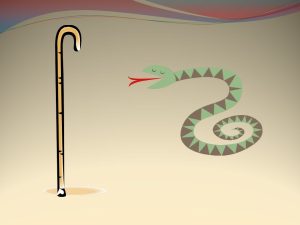
The story line in a nutshell. Moses puts his wife and sons on a donkey and is on his way to Egypt. To fulfill God’s assignment he holds God’s trickster staff firmly in his hand. The instructions are to perform all the magic tricks so the Israelites will depart for greener pastures: Canaan. God predicts that Pharaoh will be stubborn and resist. The ultimate message will be: that as God considers Israel his ‘first-born’ son, Pharaoh is obliged to let his people leave to worship their Lord God. And if the king refuses . . . God will kill Pharaoh’s first-born son! Something happens that makes God foam with fury because at a resting place where Moses has pitched his tents, he appears out of the blue. Sitting at the entrance of her tent, Zipporah sees God, eyes ablaze, standing under a tree. Zipporah’s bosom heaves, she smells trouble, and grabs her kitchen flint knife, lifts up her son’s tunic, holds his penis in her other hand and cuts off his foreskin. She rushes up to Moses who is taking a cat nap and touches his feet with the bloody item while saying something to the fact that now Moses has been circumcised. [Surely you are a bridegroom of blood to me; ever since . . . the flint knife is used by rabbis]
As predicted, Moses (80) and Aaron (83) meet up in Egypt. They gather the elders of Israel and tell them about their God who wants to help them out of their misery. To great applause, Moses performs for them the signs. The Israelites are prepared to worship the Lord. Then the brothers pay Pharaoh a visit. As predicted, the king is in no mood to let Israel leave for a three day worship because they must work making bricks. Greedy Pharaoh orders his slave drivers and foremen to put the whip on them so they work even harder. The situation becomes unbearable for the Israelites. God takes Moses aside and informs him about the covenant he made with Abraham, Isaac, and Jacob when his name was God Almighty, Elyon. The name change to Lord happened only recently, and it is the Lord [previously Elyon] who will bring them out from under the yoke of the Egyptians. The Lord orders the brothers to gather the clans, starting with the firstborn of each branch. The Lord’s refrain is: Bring the Israelites out of Egypt. God says, ‘Moses, I made you like God to Pharaoh ----- and your brother Aaron your prophet.
The brothers show up at the palace to show God’s power to Pharaoh. Moses orders Aaron to take his staff and do the snake trick. The king summons his magicians; who then also perform the snake trick. But not to be outdone Aaron grabs his snake, spits on it, and the creature swallows up the staffs! Pharaoh still refuses to let the Israelites leave for worship. On orders from God, Moses and Aaron, while standing with the king on the banks of the Nile, do the water into blood show. Fish dye, the river smells awful; nobody can drink the water. However, not to be outdone the king’s magicians are capable to repeat the trick. Pharaoh returns to his palace.

Seven days later God orders Moses to meet Pharaoh and demand that he let God’s people leave. If he refuses, God will smother the land with frogs. Aaron must stretch out his staff over the canals and make—voila!—frogs come up! The Nile River will teem with frogs; in Pharaoh’s palace, his bed, the houses of his officials—frogs will even invade his ovens and kneading troughs. The Egyptians will starve! Though the Egyptian magicians are great copy cats Pharaoh is ready to capitulate. He makes a pact with Moses: to beg his God to take the frogs out of the land. Moses promises but says that the Nile frogs stay. So, God removes the dead frogs piled up into heaps: the land reeks—such a stench! Needless to say that two-faced Pharaoh changes his mind and will not let the Israelites leave!
Accordingly, God has a new task for Aaron. He must strike with his staff the dust of the ground so that gnats have the opportunity to arise. And indeed . . . all the dust becomes gnats! The horrible creatures attack the people as well as the animals. This time the magicians are unable [or unwilling] to produce gnats! Wringing their hands, they tell Pharaoh that it’s the finger of God. But Pharaoh is still stubborn and resists. Then God’s message is that he’ll send flies to Pharaoh and his people but not to the Hebrews living in Goshen. This does the trick. Because Pharaoh makes a deal with Moses and Aaron that the Israelites don’t have to travel. They can offer sacrifices to their God right here, in Egypt. Moses argues that their sacrifices may be unpalatable to the inhabitants and they’ll get stoned. He insists that they must travel three days. After much wheeling and dealing, Pharaoh agrees that they can leave for the desert . . . but not too far! Moses accepts; he prays to God to make the flies leave the land. So . . . the flies leave for greener pastures! And, pronto . . . Pharaoh forgets his promise!
God’s message for Moses to deliver to Pharaoh is that he will send a “terrible plague” on his livestock: horses, donkeys, camels, cattle, sheep and goats but he will spare the livestock of the Israelites. To make sure that the Hebrew God has not destroyed the animals of his worshiping people, Pharaoh sends men to investigate. Imagine, their God kept his word! But still, Pharaoh will not let the people go.
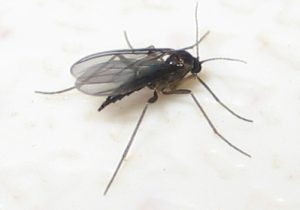
Then God tells Moses and Aaron to take handfuls of soot from a furnace and Moses must toss it into the air in the presence of Pharaoh. The soot becomes fine dust—covering all of Egypt. And the people and animals are covered in festering, itchy, boils! Somehow . . . God manages to harden Pharaoh’s heart—so the king refuses to listen to Moses and Aaron. (Just as God predicted) God says to Moses to confront Pharaoh and tell him that the God of the Hebrews says to let his people go so they can worship him. And that now it will be the full force of all his plagues: So that Pharaoh will admit that there is no other god like the God of the Hebrews in all the earth—His name must be proclaimed! If Pharaoh again refuses, God will send the worst hailstorm in mankind’s memory. Moses advises Pharaoh to put all his livestock in the fields into shelter because the hail will fall on every person and animal. Some officials who feared the Hebrew God’s words take their slaves and livestock indoors. Then God orders Moses to stretch out his staff toward the sky so hail will pour down. Moses dutifully points, and thunder, hail, and lightning flashes down to the ground. [The hail destroyed flax and barley but not wheat and spelt] The only place free from hail is the land of Goshen. Pharaoh calls for Moses and Aaron to see him. He apologizes, saying he sinned. And he asks Moses to beg his God to stop the thunder and hail and he will let the Israelites go. Moses replies that he’ll pray to his God but he also knows that Pharaoh and his officials still do not fear their Lord God. However, Moses asks his Lord to stop the hail and rain. When the request has been granted, Pharaoh sins again, and refuses to let the Hebrews leave.
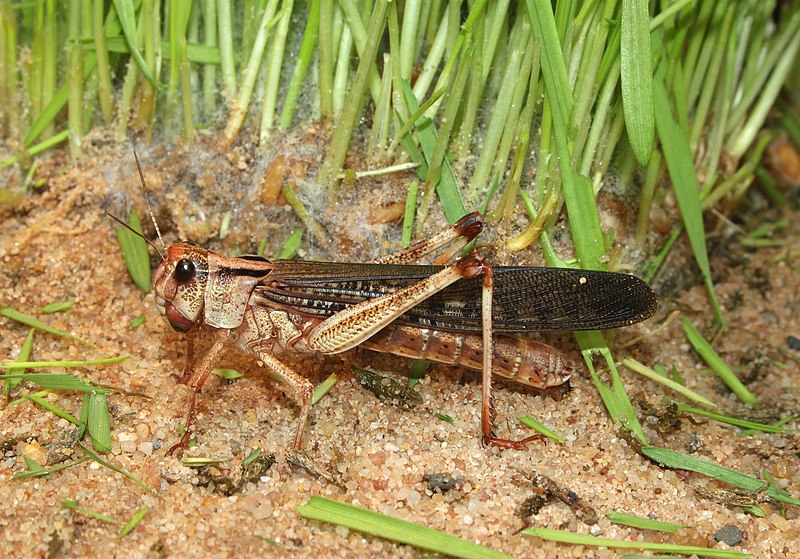
Next, the Lord confides in Moses that he has on purpose hardened the hearts of Pharaoh and his officials so that he, the Lord, has the opportunity to perform miracles. And . . . that Moses can tell his children and grandchildren how the Lord God dealt heartless with the people in Egypt—and that all the people finally will know that the Lord is the Hebrew God. Well . . . Moses and Aaron go to the palace and confront Pharaoh. ‘How long will you refuse to humble yourself?’ Moses shouts. “Let God’s people leave so that they may worship him. If you refuse, we will bring locusts in your country tomorrow! They will devour what little you have left after the hail, including every tree growing in your fields. All the houses of your people will be filled with locusts. I tell you, king, this will be a first!’ Fuming, Moses turns on his heels, Aaron follows folding his hands. The officials attack Pharaoh, saying: ‘How long will this man be a snare to us? Let them go and worship the Lord, their God.’ Pointing at the king, they shout, ‘Do you not realize that Egypt is ruined!’ The officials run after the brothers and persuade them to return to the palace. Pharaoh says, ‘Go, and worship the Lord, your God. But . . . just who will be going?’ Aaron stares at Moses, who blinks at him. ‘All the Israelites’, Moses says, ‘and also our flocks, because we are to celebrate a festival to the Lord.’ Raising his brow, Pharaoh shouts, ‘Hah! You can’t fool me. Everyone and livestock! No. Only the men can go and worship. That’s what you have been asking for!’ Moses and Aaron are driven out of the palace. The next day, the Lord tells Moses to stretch out his hand over Egypt so a wind blows across the land bringing winged locusts in “great numbers”. They invade Egypt. The ground is pitch-black. What vegetation had been left after the hail . . . these locusts devour—nothing green remains on trees and plants. Never before has there been such a plague of locusts. Pharaoh summons Moses and Aaron and confesses that he sinned against the Lord, their God, as well as against them. The king promises to sin no longer and asks for forgiveness. ‘Please,’ he begs, ‘take the deadly plague out of my country.’ So Moses prays to the Lord, who changes the direction of the wind, and the locusts end up in the Red Sea. Again, God hardens the king’s heart; he refuses to let the Israelites go.
After that ordeal, the Lord says to Moses to stretch out his hand toward the sky so that for three days (total) darkness will spread over Egypt. No one can see anything and they are all locked up in their houses. But in Goshen the Israelites have light. Well . . . Pharaoh [as predicted] summons Moses and says, ‘Go. Worship the Lord. You can take along your women and children but not your flocks. They stay here!’Moses argues that they need the livestock for sacrifices. Pharaoh gets all worked up and, pointing at Moses, shouts ‘Get out of my sight! If you dare to return and look me in my face . . . you’ll die!’ Moses wonders what God will do so he’ll not die, and, as he retreats, mumbles, ‘Just as you say. I’ll not show up again.’
It so happens . . . that Moses is highly regarded by the Egyptian people and the officials—after all, Pharaoh’s daughter adopted him. So when the Lord appeals to Moses for one more “miracle plague” to perform, Moses listens carefully to the plan God has in mind. Moses is to tell the Israelites to ask their “neighbors” for articles of silver and gold because they are leaving permanently and need extra wealth, besides their livestock, to survive their journey. Pharaoh will refuse to even listen to Moses. Pharaoh hates having to admit how successful the Lord has been performing these wonders. The supreme plot is: [prelude to Passover festival and the actual exodus] the Lord will go throughout Egypt around midnight. And every firstborn son in Egypt will die, starting with the firstborn son of Pharaoh to the firstborn son of any slave girl who grinds the flour for baking bread, as well as the firstborn of the cattle. The wailing will be heard throughout Egypt—screams of sorrow, and lamentations at the palace and temples. The officials will go on their knees and beg Moses to ask the Lord to leave with their livestock forever, never to show up again. [and also get rid of the Hebrew God]
So . . . God gives instructions on how to start the Exodus. First, a date is to be set; and on the 14th day of that month each man is to take a lamb for his family and slaughter it. Every household must take some blood and using a sponge wipe the blood on the sides and tops of the doorframes of the houses where they are to eat the lamb. They must eat the meat roasted, not cooked, with bitter herbs and bread made without yeast—and in haste because it is the Lord’s PASSOVER: When he will pass over Egypt and strike down every firstborn—of men and animals— but not the houses drenched in blood. This event is to be a seven-day festival to the Lord. No work is to be done except for preparing food and eating unleavened bread. This festival they should observe when one day they enter the Promised Land. And . . . so it happens: At midnight the Lord strikes down all the firstborns mentioned—the wailing is deafening. Pharaoh summons for Moses and Aaron to come. Red-faced, breathing heavily, Pharaoh bellows, ‘UP! Leave my people! You and the Israelites! Go, worship the Lord as you requested. Take your flocks and herds and go!’ Pharaoh folds his hands and pleads ‘Don’t forget to bless me.’ [I had no choice; your God made me do it]
THE LORD GIVES MOSES AND AARON REGULATONS
AND
RESTRICTIONS FOR THE PASSOVER FESTIVAL
[to be “celebrated inside a house”—nomads live in tents]
When the Lord brings you into the land of the Canaanites, a land flowing with milk and honey, you are to observe this ceremony in this month. Only circumcised males may eat the Passover lamb. For 7 days eat bread without yeast, and on the 7th day hold a festival to the Lord. That’s when you are to give to the Lord the first offspring of “every womb”; the firstborn males of your livestock. Redeem with a lamb every firstborn donkey. Redeem every firstborn among your sons with a lamb. Tell your sons that the Lord brought you out of Egypt after he had successfully killed every firstborn in Egypt, both man and animal as punishment for Pharaoh’s hard-headed refusal to let us go. This festival where you sacrifice the first male offspring of every womb is like a sign on your hand and a symbol on your forehead that the Lord brought us out of Egypt.
Afraid they all may die, the Egyptians urge the Israelites to hurry and leave. They ask the Egyptians to give them farewell gifts of silver, gold and nice garments. (That’s how they should plunder the Egyptians said the Lord) So the Israelites take their dough—without yeast added—put it in kneading troughs and carry them wrapped in cloths on their shoulders. Moses takes the bones of Joseph with him because Joseph had made the sons of Israel swear an oath: You must carry my bones up with you when you leave this place, Egypt.
The story unfolds as predicted (Genesis 15:13). Over400 years have elapsed since Jacob’s family entered and until their exit. The party consists of three million Israelites: 600.000 men armed for battle—the twelve divisions—women and children riding on donkeys, and droves of livestock: flocks and herds (Numbers 1:46—603.550 men) (Deuteronomy 1:10—today you are as many as the stars) (Genesis 15:5—count the stars)

According to the story—it “seems” the Lord worries that if he’ll show the Children of Israel the shorter road into Canaan—where they may have to face fighting the Philistines—they’ll “chicken” and hurry back to Egypt. So . . . God makes the wise decision to lead his people around the desert direction the Red Sea. Anyway, they depart from Rameses destination Succoth where they camp. In the morning the women make flatbread—the dough without yeast they carried with them—for everyone! Then they depart for Etham—an angel of the Lord in front of the army and guided by the Lord in a pillar of cloud. At night the Lord hovers above the camps in a pillar of fire so that the Israelites feel protected.
To Be Continued
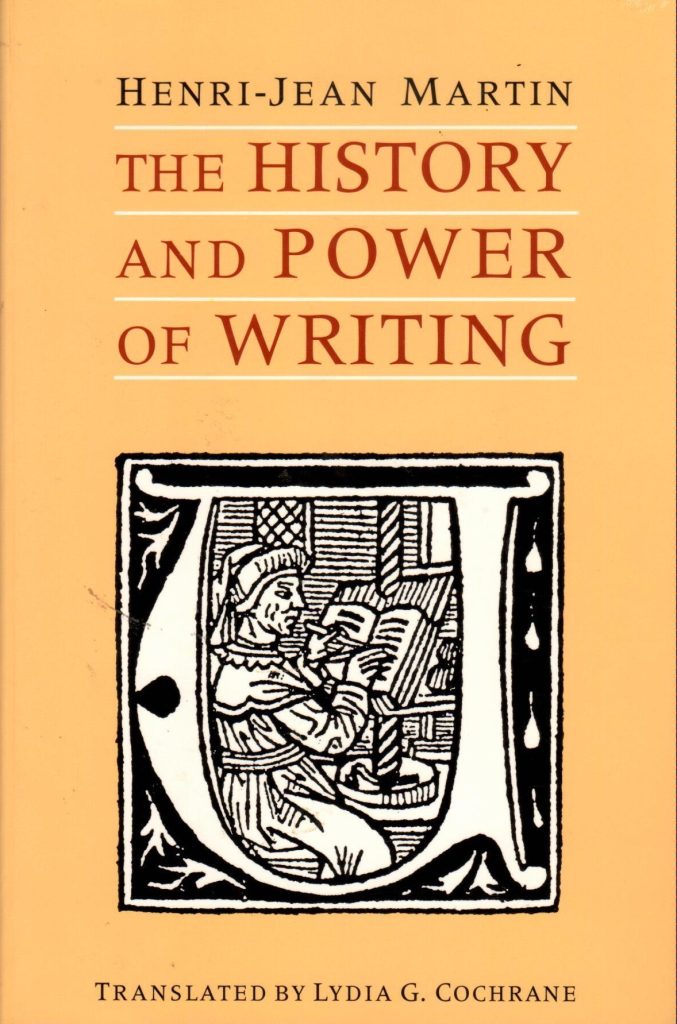
THE HISTORY AND POWER OF WRITING
WRITING is the graphic expression of actual SPEECH
The PEN is the TONGUE of the MIND (Horace)
WRITING was permanent MEMORY/SPEECH:
Storage of ideas
on stone, clay, animal skin, papyrus and lately computer chips
April
PLATO:
HE WAS A WISE MAN WHO INVENTED GOD
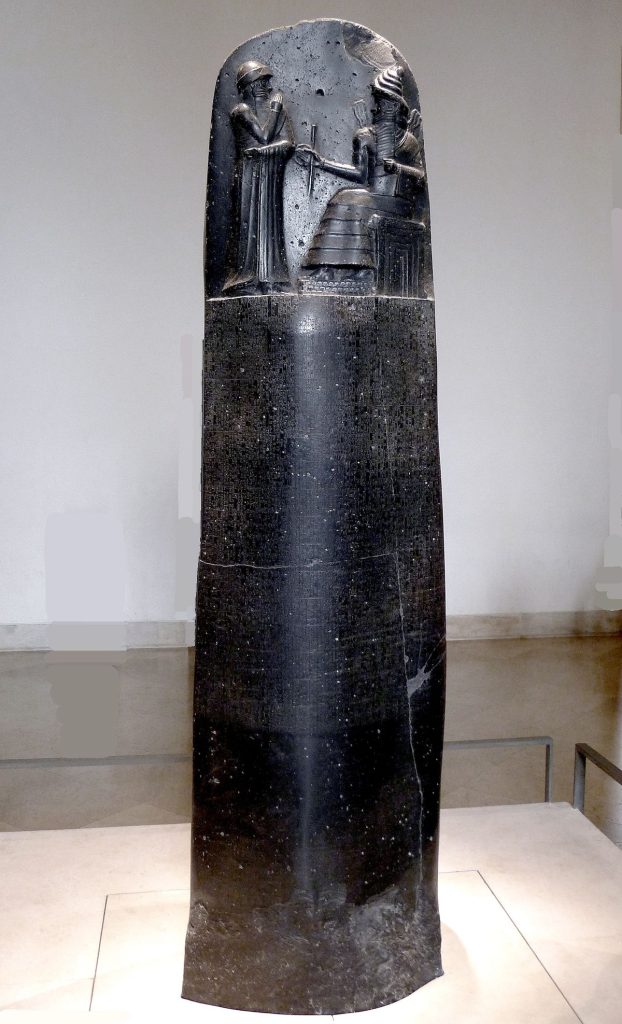
The LAWS of Hammurabi written in stone
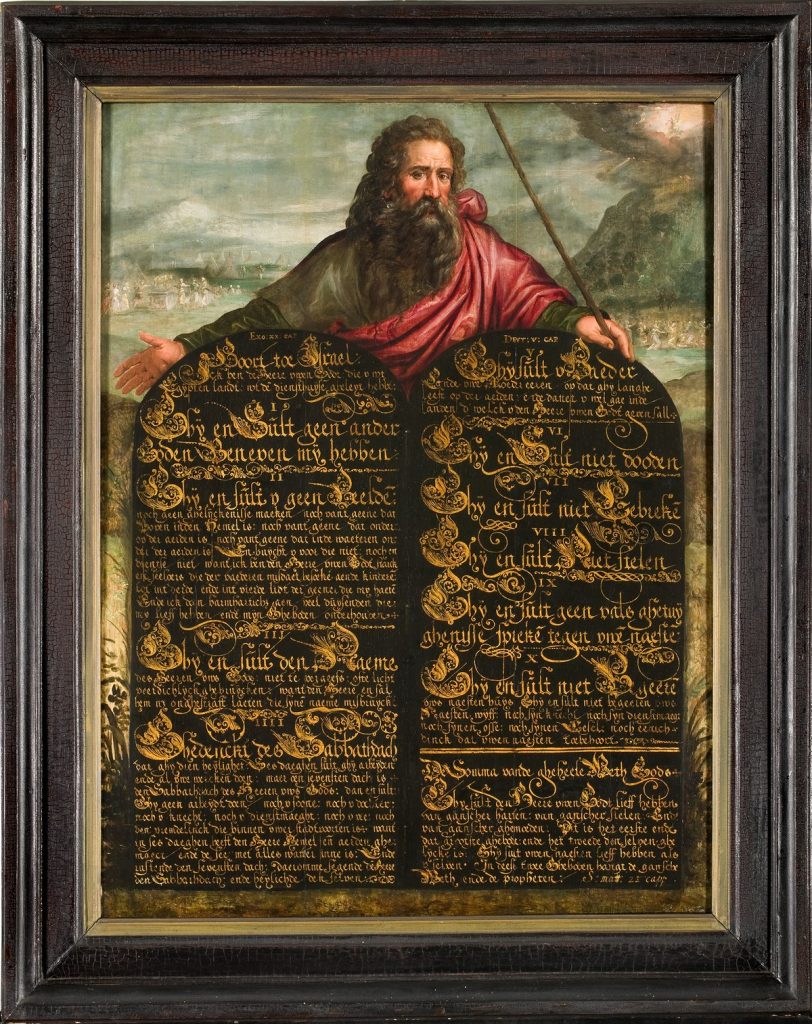
THE TEN COMMANDMENTS written in stone
Exodus 20 & Deuteronomy 5

The book of Exodus starts with the slaughter of Hebrew baby boys drowning them in the Nile River. Now that they have left Egypt the story starts with a grand sweep: The Lord’s strategy for his chosen people to make it to Canaan as promised to Abraham, Isaac, and Jacob.
Continuation of March:
Then they depart for Etham: with an angel of the Lord in front of the army and guided by the Lord in a pillar of cloud. At night the Lord hovers above the camp in a pillar of fire so the Israelites feel protected.
EXODUS 14
The plot of “parting the Red Sea” is the Lord’s brilliant idea of destroying the Egyptian army once and for all. He confides to Moses what he intends to do: He’ll make sure that Pharaoh will fume with anger upon hearing of the Hebrew’s escape in the dark of night and will follow them with 600 charioteers and annihilate them. Moses is awe-struck—holding his breath. When the Lord gives him instructions what to do, Moses is eager to participate and do his share.
Standing on a rock so everyone can see him, Moses tells the Israelites that he received a message from the Lord. And the message is that they must make a right-about-face and go for Pi Hahiroth near the sea (across from Baal Zephon) and camp there. Some men start to argue with Aaron but they follow Moses and the “crowd”. When, to their horror, the Israelites see the Egyptian army approaching they shout at Moses: ‘Was it because there were no graves in Egypt that you brought us to the desert to die? Better to serve the Egyptians!’
To get their attention Moses waves his left hand above his head. ‘Calm down!’ he shouts. ‘The Lord will fight for you and told me that the Egyptians you see today you will never see again. Watch this!’ Holding in his right hand his staff, Moses waves his magic wand direction sea and . . . lo-and-behold . . . slowly—the waters divide . . . a highway on dry ground appears . . . with a wall of water on the right and a wall of water on the left. The men gasp, the children shriek and the women cover their faces with their hands, peeking between their fingers. ‘Children,’ Moses shouts as he hands over his staff to his brother, ‘follow Aaron!’ Holding hands with their mothers and siblings, they rush forward, followed by the animals. The legions of armed Hebrew men and Moses make up the tail end.
Pharaoh, in hot pursuit with a cavalry of chariots, sees the magic highway ahead and the throng of Israelites. Moses is holding his hands above his head clapping; from experience Pharaoh knows that those are magic hands. He stops and consults his general who suggests that he’ll launch the attack along with the army. Pharaoh is to make up the tail end to ward off those evil hands. So . . . the general charges into the highway and as he nears the Israelites . . . the dry ground turns into mud! The wheels of his chariot come off and the chariots behind him pile on top of each other. The scene of whinnying horses and screaming charioteers wallowing in the mud is horrific. That’s when the Lord whispers into Moses’ ear: ‘Turn around and stretch out your hand over the sea. The waters will swallow up the enemy.’ And so it happens that the army drowns—the shore is blanketed with dead Egyptians. Not one of them survives to tell this tale. The Israelites begin to fear their Lord when they see the power of their God in full force. They put their trust in the Lord and Moses.
EXODUS 15
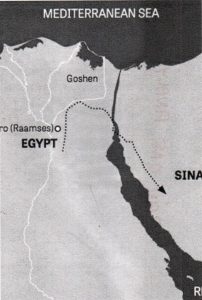
WATER becomes the main issue for humans and the animals
So . . . for 3 days the Israelites wander through the Desert of Shur without finding water until they come at Marah where, alas, the water is bitter! The wailing of the adults and the sobs of the children is heart-breaking. God gives Moses a piece of wood to throw into the water so it will turn sweet. After a needed rest, the party goes to Elim—an oasis with 12 springs and 70 palm trees. For some time they camp there until Moses reminds them it is time to continue toward Canaan. On their way to Sinai they travel through the Desert of Sin. This time the Israelites grumble about food. The memory of pots of meat in Egypt makes them salivate and say that they would rather have died in Egypt than starve here. So . . . Moses consults God. The people must gather and he’ll promise them meat.
Moses and Aaron order the clans to show up. Moses points to the horizon and . . . lo-and-behold . . . there hovers “the glory of God in a cloud”. ‘Tonight’, he says, ‘you will eat meat, and tomorrow morning you will eat bread.’ In awe, the clans return to their camps and wait in anticipation.
And . . . lo-and-behold—the sky turns darker and darker. Magic happens . . . birds drop down and glut the camps. Shouting with excitement everyone collects quails. In the morning the desert floor is covered with thin, frost-like flakes. ‘These are wavers with honey,’ Moses says. ‘This is the Lord’s bread’. They are told to collect this bread every day, but on the 7th day, the Sabbath, they must rest. Then Moses tells Aaron to get a “jar”. He puts four pints of the bread in it and then shows the jar to the Lord for “his blessing”—the Testimony. This special jar [magic bread box] is to be kept “for generations to come” until the Israelites reach the border of Canaan.
Access to water, or rather scarcity, becomes a cause for uprisings within the camp. At Horeb, Moses uses his staff to tap a rock for water. He also holds his staff to “win wars” when they enter foreign territory. Supported by Aaron and an elder, Moses stands on a hill holding up high the staff of God to encourage Joshua, who, of course, wins the battle against the Amalekites. ‘Write this down on a scroll,’ God says to Moses, ‘as something to be remembered. That we destroyed the Amalekites.’ Moses builds an altar and calls it “The Lord is my banner”.
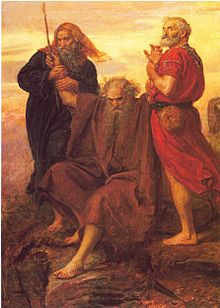
Out of the blue, Jethro, Moses’ father-in-law, shows up with Zipporah and her two sons to unite them with their father Moses. Jethro watches Moses playing judge, settling clan grudges all day long, even in the evenings. He suggests that Moses select trustworthy, capable men to help him out with these duties because he looks burned-out. Saying farewell, Jethro returns to his country.
EXODUS 19
The story in a nutshell: Scene—the Israelites are camping at the foot of Mt. Sinai.
Moses goes up the mountain to receive instructions. The Lord says: ‘You are to tell the house of Jacob if the Israelites obey me and keep the covenant (circumcision) then out of all nations you will be my treasured possession. Although the whole earth is mine, [God is pushing himself to be accepted] you will be a kingdom of priests and a holy nation. Let me know their decision.’
Moses returns to the camp and delivers God’s offer. The Israelites accept whole-heartedly. Moses goes up the mountain telling God that his people accept Him as their Lord. God then tells Moses that the Israelites must prepare themselves to meet God and wash their clothes—[cleanliness is next to Godliness]—and abstain from sexual relations for two days. On the third day they must stand at the foot of the mountain and not touch the ground or they’ll die. When the ram’s horn sounds they may meet their Lord.
As planned, on the morning of the third day there is thunder and lightning, a thick cloud covers the top of the mountain and then the sound of a trumpet. Accordingly, Moses leads the people to the foot of the smoke-covered mountain. The sound of the trumpets becomes deafening as God descends in fire from the sky. Moses calls out to God. And . . . wrapped in a cloud the Lord descends in the very top where He hovers—ordering Moses that he and Aaron join him. The priests and the people, trembling with fear, say to Moses: ‘Do not have God speak to us or we will die!’
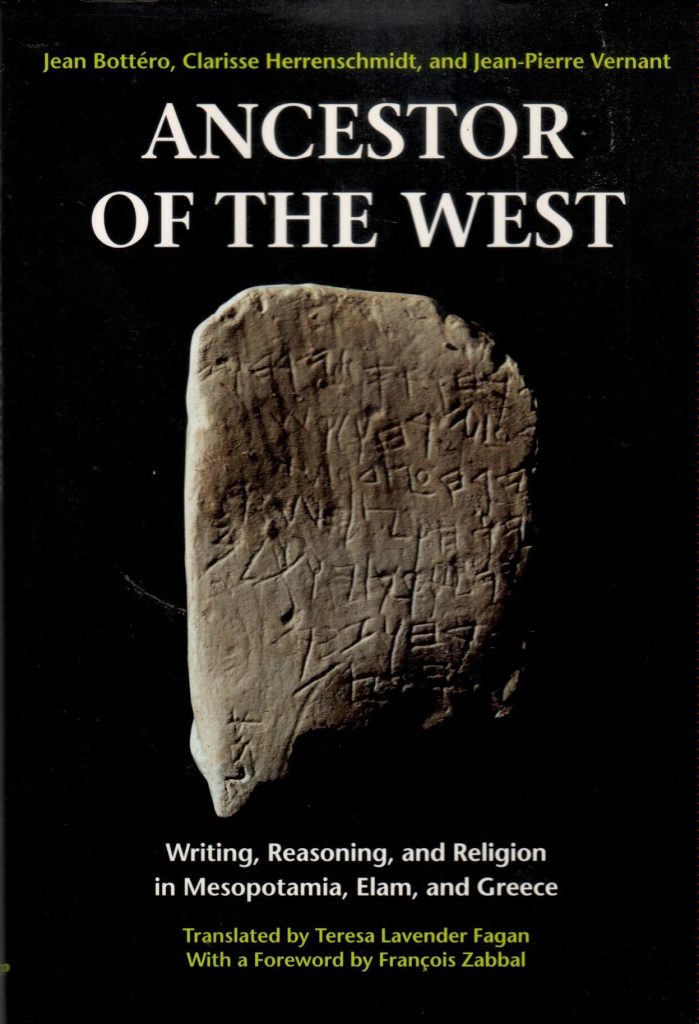
So . . . With Aaron as his witness next to him, Moses addresses the people as follow: ‘You have seen for yourself that I have spoken to you from heaven.
These are the Lord’s Ten Commandments:
1:--I the Lord am your God who brought you out of the land of Egypt, the house of bondage.
2:--You shall have no other gods besides me.
3:--You shall not swear falsely by the name of the Lord your God.
4:--Remember the Sabbath day and keep it holy.
5:--Honor your father and your mother.
6:--You shall not murder.
7:--You shall not commit adultery.
8:--You shall not steal.
9:--You shall not bear false witness against your neighbor.
10:--You shall not covet your neighbor’s house: you shall not covet your neighbor’s wife, of anything that is your neighbor’s.
The Lord God says: Do not make any gods to be alongside me; do not make for yourselves gods of silver or gods of gold. [the one dollar bill: In God We Trust] Do not invoke the name of other gods; do not let them be heard on your lips.
Next: More laws to be obeyed: on servants; personal injuries; protection of property; social responsibilities and laws of justice and mercy, and restrictions on the Sabbath. Three times a year the people are to celebrate a festival to the Lord.
1:--The Feast of Unleavened Bread.
2:--The Feast of Harvest.
3:--The Feast of Ingathering.
The Lord says to Moses that he’ll have an angel to guard him along the way who will escort, at a slow pace, the Israelites into the land of the Amorites, Hittites, Perizzites, Canaanites, Hivites and Jebusites. They must not bow down before their gods or worship them or follow their practices. Again, the Lord establishes their borders from the Red Sea to the sea of the Philistines (Mediterranean) and from the desert to the River Euphrates. God’s blessing will be on their food and water if they worship Him.
Moses—the obedient servant—follows God’s orders and without using tools builds an altar at the foot of the mountain. Next to the altar he sets up twelve pillars representing the twelve tribes of Israel. When young men offer young bulls to be sacrificed Moses remembers that God had told him not to offer the blood of a sacrifice along anything with yeast. He collects half of the blood and puts it in bowls—the other half he sprinkles on the altar. He takes the Book of the Covenant (the scroll with the instruction of circumcision) and reads it to the people. They say: ‘We will obey.’ Then Moses takes the bowls with blood, sprinkles it on the people, and says, ‘This is the blood of the covenant that the Lord made with you in accordance with these words.’
Then Moses, Aaron and 70 elders of Israel go up the mountain to pay their reverence to the Lord—whose feet are on a pavement made of sapphire: clear as the sky. God invites his guests to eat and drink. As they leave, God tells Moses to come back but this time alone to receive the tablets of stone with the law and commandments. With a heavy heart Moses returns and enters the cloud that covers the mountain.
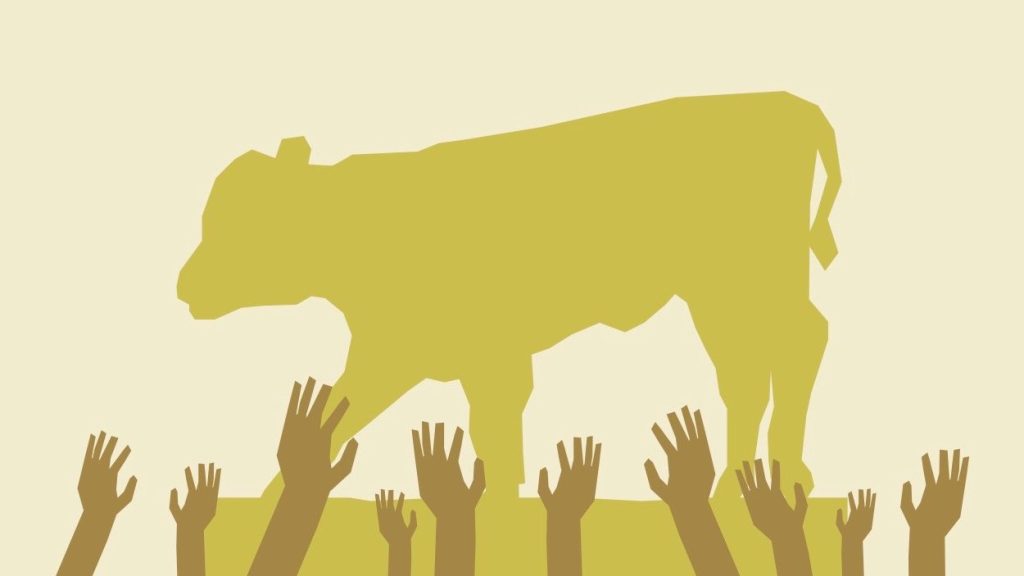
In a nutshell:
DRAMA in capital letters. In his absence the Israelites become aggressive and demand that Aaron give them a god to worship so they can make sacrifices. [eat MEAT!] They give him gold earrings to make them an idol. So, Aaron builds an altar and throws the jewelry into the fire and out comes . . . voila! . . . a golden calf! Up in the mountain the all-seeing Lord mentions this to Moses. Embarrassed, Moses reminds God that he promised Abraham, Isaac, and Jacob that their descendants will inherit the land of milk and honey. God is annoyed being reminded and they have a heated dispute about the Israelites’ sinful behavior. Angered, Moses goes down the mountain with the two stone tablets. Joshua meets him and says that the shouting in the camp is the sound of war. Moses sees the golden calf and the people dancing and hot with rage smashes the tablets on the ground at the foot of the mountain. He confronts Aaron who tries to explain—but to no avail. Fighting erupts in the camp; a revolt is going on. More than 3000 men die. Moses returns to the clouds in the mountain and tells God about the disaster; who punishes the people with sending them a terrible plague. Then God orders Moses to continue toward Canaan as intended but he no longer will protect them because they are a stiff-necked people. [this god is a control freak] More drama: God changes his mind! More promises: promises galore! Replacing the smashed ones, God gives Moses two new stone tablets. More threats about worshiping other gods, foreign gods! He, the Lord, whose name is Jealous, is a jealous god! [desperate to be accepted!] After forty days and nights have elapsed Moses returns, face radiant, holding the stone tablets written with the finger of God Himself to his people. He has a very special message for them: They cannot work on the Sabbath because it is a holy day and whoever does any work must be put to death. [the kibosh is born]
In a nutshell:
Moses asks Aaron to summon the people as he has a message from their Lord. The Israelites arrive. [brainwash the gullible] Moses says that—the Lord desires that every man offers—freely and with all his heart—gold, silver, bronze, blue/purple/scarlet yarns, fine linens, hides, acacia wood, olive oil, spices, incense, onyx stones and other gems . . . so as to make Him a sanctuary and he can dwell amongst them while they travel. That—he has been given instructions on how to construct this portable temple, the Tabernacle—Tent of Meeting. That—he also has been asked to get all the furnishings made: the throne of God—an acacia chest in gold called the ark of the Testimony with inside the stone tablets, the lamp-stand, and the table. Moses describes the exquisite, colorful priestly garments with the ephod, the breast-plate, and the Urim and Thummim stones [dice] for making decisions. The descriptions are in detail—superb workmanship is required. The many projects keep the people busy like bees/working ants. Needless to say that to keep God content there are elaborate rituals performed with strict rules.
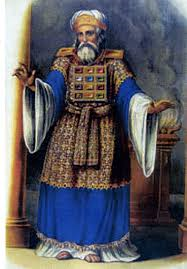
EXODUS 40: In all the travels of the Israelites, whenever the cloud lifted from above the tabernacle, they would set out, but if the cloud did not lift, they did not set out—until the day it lifted. So the cloud of the Lord was over the tabernacle by day and fire was in the cloud by night, in the sight of all the house of Israel all their travels.
THE DEATH OF MOSES AS TOLD BY THE LORD GOD
Moses dies at the ripe old age of 120. No one knows where his grave is.
Because Moses broke faith with the Lord in the presence of the Israelites at the waters of Meribah Kadesh in the Desert of Zin and he did not upheld God’s holiness among the Israelites, God tells him that he may see the land of milk and honey “only from a distance” [revengeful/sadist] Moses climbs to Mt. Nebo in Moab—across from Jericho—and sees the whole land. God nods and says: ‘This . . . is the land I promised on oath to Abraham, Isaac, and Jacob when I said: I will give it to your descendants.’
VERITAS ODIUM PARIT—TRUTH BEGETS HATRED
CAN RELIGION BE SUBJECT TO “ENGINEERING”?
BLAISE PASCAL:
Men never do evil so completely
and cheerfully as when they do it from religious convictions.
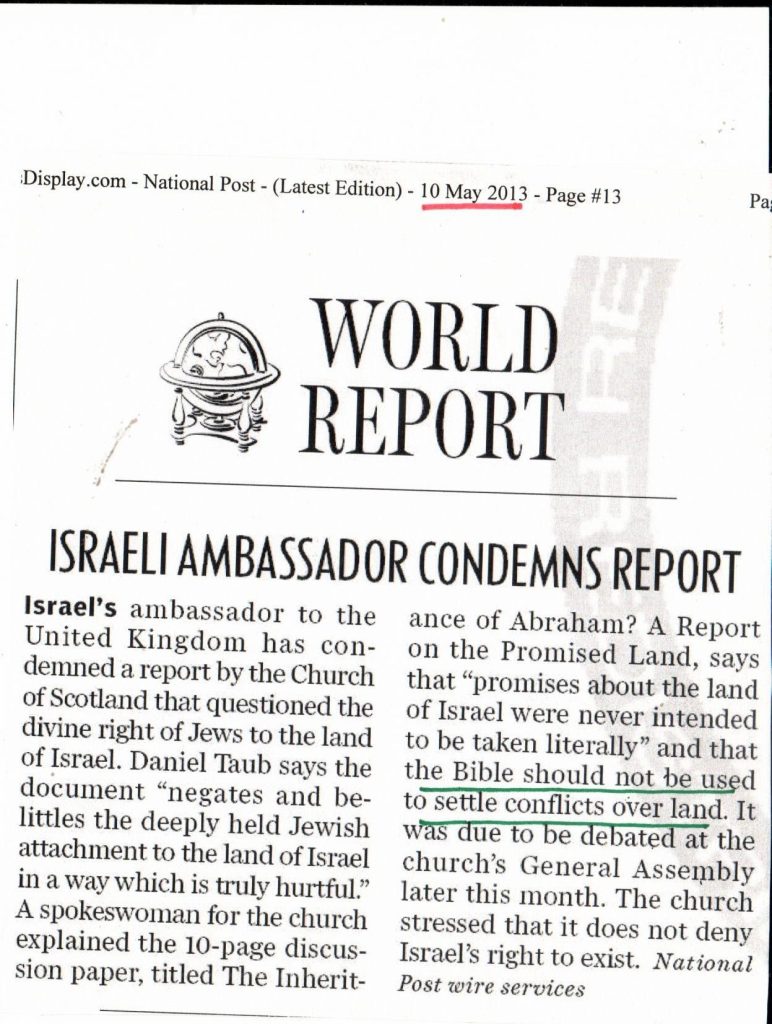
PSALM 164
(Old Testament)
The Lord makes grass grow for cattle
And plants for man to cultivate
Bringing forth FOOD from the earth:
WINE that gladdens the heart of man,
OIL to make his face shine
And BREAD that sustains his heart.
THE DIVINE LANDLORD
LAND WAS THE PROPERTY OF THE GODS
It was cultivation of land
that alone provided the basis
for the development of
territorial civilization
The story of:
In the BEGINNING
In principio erat verbum:
(Gospel of John 1:1)
SPEECH IS:
A MNEMONIC
(mindful/memorize) SYSTEM
comprising of WORDS
The history of man is the history of LANGUAGE:
A TOOL FOR COMMUNICATION
Book covers of:

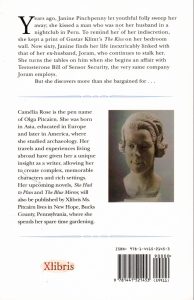
SOFT PORN: 100 pages; E-BOOK
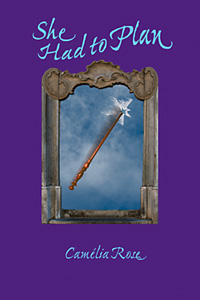
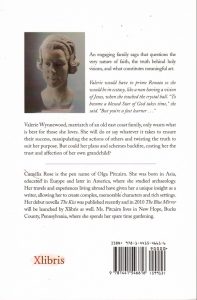
FAMILY DRAMA: 180 pages; E-BOOK
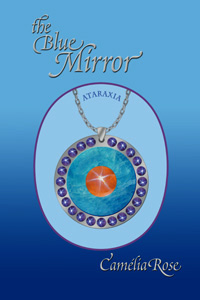
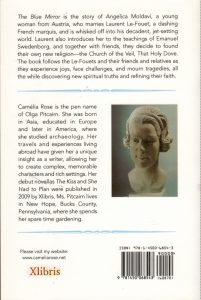
FAMILY BUSINESS:
CREATION OF AN INCLUSIVE RELIGION: 707 pages; E-BOOK
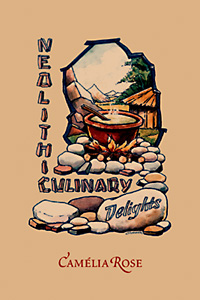
STONE AGE CUISINE
Not yet published—copyright Olga Pitcairn
Stories—told by Stone Age women on cooking their “BELLY—FOODS”: the grains WHEAT and BARLEY in ancient Mesopotamia, RICE in Asia, and CORN-MAIZE in Mesoamerica. In Peru, South America, high in the mountains women cultivated POTATOES—that grow under the ground—as their staple food.
Bread/Pasta, made of WHEAT, was once known as the Staff of Life. Today—eaten world-wide—RICE is the belly-food par excellence. It is eaten in Asia from sunrise until sunset. In Mesoamerica CORN-MAIZE is still the staple food of the peoples; globally it is cultivated for feed. POTATOES, introduced to the West by Spain, became the belly-food for tillers of the soil: the peasants of days gone by. Today—potato chips are for snacking; imagine life without fish ‘n’ chips or . . . burgers and French fries!
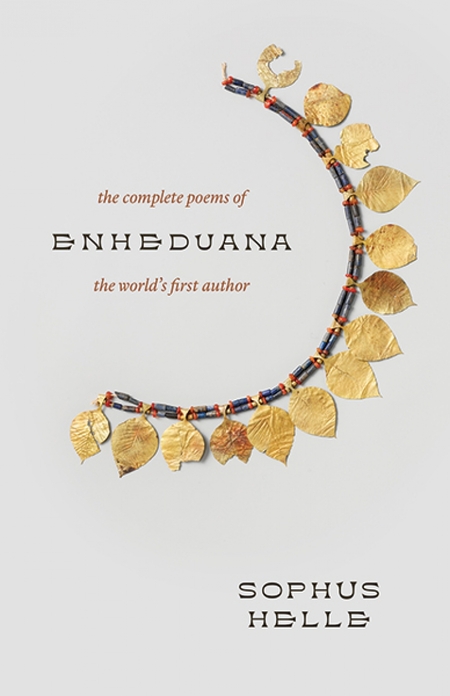
ENHEDUANA:
She who wrote (circa 1800 BCE): Akkad/Mesopotamia
High-Priestess of UR, Enheduana was the daughter of King Sargon. She wrote a prayer in Sumerian to the goddess Inanna, daughter of Nanna, the moon god.
My morning hymn of praise
(copyright Olga Pitcairn)
Oh Inanna-Ishtar—Lady of Heaven!
Daughter of the Moon—beautiful you are.
Oh Joy of Eanna, the House of Heaven!
Child of the night, beloved Morningstar!
Oh Inanna-Ishtar—Queen of Heaven!
Shepherdess of the Igigi—benevolent you are.
Oh brilliant One, the Torch of Heaven!
Light of all mortals, oh blessed Morningstar!
WRITING: A TOOL FOR COMMUNICATION
IN THE BEGINNING . . .
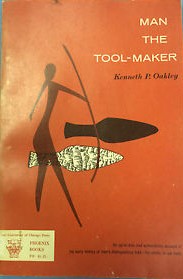
MAN THE TOOL-MAKER
COMING UP!
May
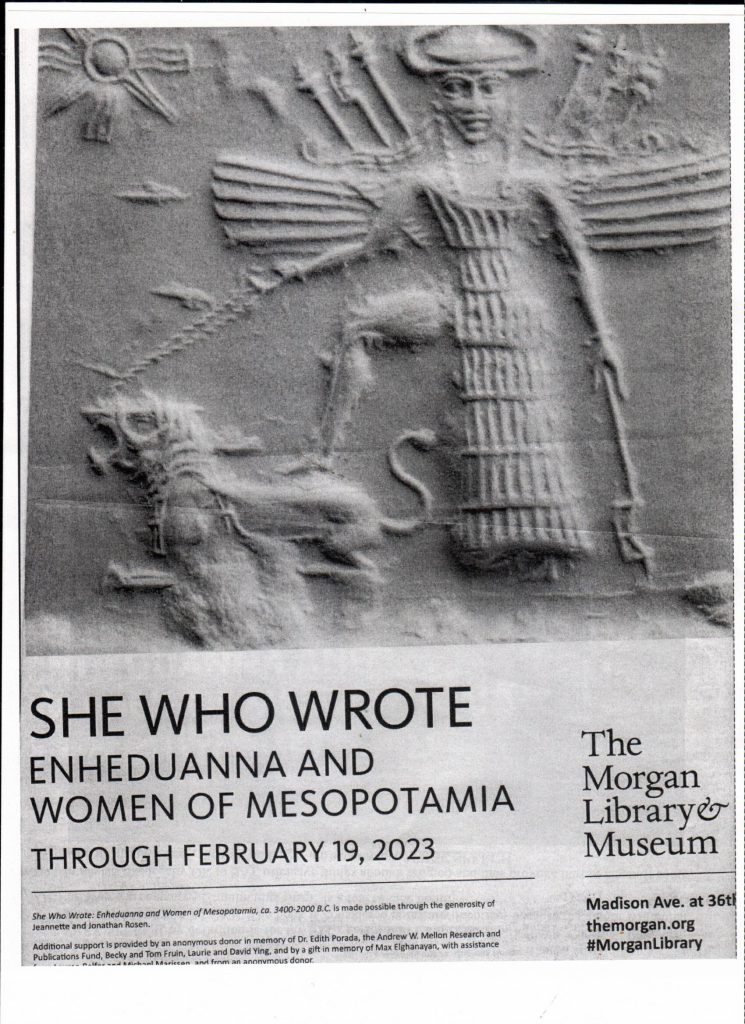
To begin with:
I want to pay homage to my pioneer sister ENHEDUANNA: She who wrote in ancient Mesopotamia; to the Roman citizen APULEIUS and his pornographic, hilarious tale The Golden Ass; to Miguel de Cervantes of Spain and his epic novel DON QUIXOTE; to SHAHRAZAD: She of the Arabian Nights (whatso woman willith, the same she fulfillith, however man nillith); and the romantic Tales of the Alhambra by 19th century raconteur Washington Irving: the Knickerbocker. These tellers of tales used their TONGUE (what’s your mother tongue—first language), TOOL OF COMMUNICATION, to entertain the world at large.
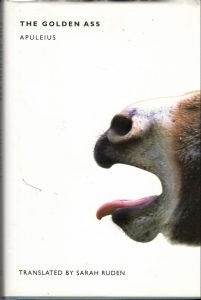
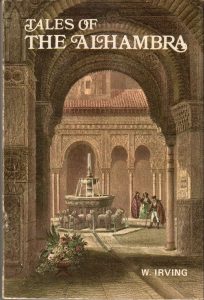
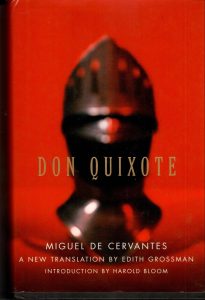
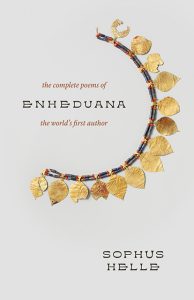

MAN THE TOOL-MAKER
IN THE BEGINNING . . .
My aim is to record chronologically—as long as the Stone Age lasted in the Fertile Crescent, Mesopotamia, from circa 12000 BCE until the Bronze Age, circa 3300 BCE—the story of Stone Age Cuisine; copyright 1990 CE, the Age of Microwave Food, and updated in the year 2023 CE.
Once upon a time - - - in the mist of times - - - a long time ago - - - the familiar tune was ADAPT or DIE.
When fruits and plants—our FOOD—became scarce, we watched the hyenas and birds of prey devouring meat morsels from carcasses. HUNGER is the best chef - - - and - - - we jumped on the bandwagon! Clawing with our little hands at bony leftovers, we licked, savored blood. We began to regard our HANDS as having MAGIC—and on the walls of caves we left our handprints.
One auspicious day - - - one of us, a frisky one, stepped on something and shrieking sat down. He looked at his foot: his sole oozed blood. He then looked at the object that had done this and took it in his hands—it was a stone with pointed edges. Firmly grasping this eyesore, he got up and, with a big grin on his lips, joined the group. Around the campfire he passed his stone around so everyone could touch it. In the morning, he looked for a smaller stone. He lifted his foot to get a good look and then started to chip—and—chop: making a row of points. Grinning, he joined the group searching for an abandoned carcass. With gusto, he cut slivers of meat . . . stuffing them in his mouth! Someone jumped on him to take the stone; instead he got the tip of his nose snipped off. Baffled, the thief stared at the drops of blood dripping on his hands. Watching, touching their noses, everyone was shaking their heads and then wanted to know more about this “magic” stone. So our hero told them that he had a dream—he closed his eyes for a few seconds, and then opened them—wondering if he could make the stone sharper so he could get more meat. In his dream he saw clearly HOW he should make—he gestured with his hands—this “tool” that he gave the name FLINT KNIFE. Everyone clapped their hands and shouted: MAGIC HANDS!
FROM
FLINT KNIVES - - - for cutting up flesh for food
TO
LASER BEAMS - - - for surgery on the human body
As luck would have it, our adventurous go-getter, with time on his hands, started eyeing the cattle passing by his cave. At full speed a lion chased a bull and killed it to eat—to stay alive. The frisky one grinded his teeth, wishing he could kill an animal so he had plenty to eat. He looked at the long stick next to him on the ground that he carried to chase away critters in his path. Then he looked at his flint knife. If . . . he grinned, and started to put two and two together . . . Eureka! He hit the bull’s eye when he made a spear. He practiced on smaller animals: spearing them. But he was desperate to make a kill. When a fawn scrambled up a hill he got his break. Nostrils flaring, his heart pounding, Frisky threw his spear with full force . . . and lo-and-behold the fawn fell to the ground.
Well . . . everyone was in a hurry to make his own spear! We decided to hunt in groups. Chasing, leaping around the animal, we threw our spears until the creature collapsed. By now we were experts at skinning and cutting up the corpse. We all got our share of this satisfying food. One day, at the cave, as we sat around the campfire, Frisky put a chunk of meat on the tip of his spear and held it above the flames. The aroma was tantalizing; everyone’s nose quivered. And then Frisky took the morsel and stuffed it in his mouth . . . he rolled his eyes, chewing the juicy tidbit. You bet there was an avalanche of copycats?! A child dashed to the back of the cave and grabbed a chunk from a pile of meat. He took a stone and pounded the chunk flat. Then he went to the fire and put his cutlet on a hot stone—it sizzled! Frisky clapped his hands and waved at the child to sit next to him. He took the little one’s head in his hands and, looking into its eyes, nodded. Eureka!, he shouted, and licked the child’s eyes. From that day on, child Eureka paved the way for changes in the mental landscape: eyes, ears and bellies the trailblazers. Wanting to kill a bird on a tree-branch, Eureka used a “tool” he had just made and, curious, wanted to try it out. It was a fluke that the slingshot saw the day of light. But other go-getters kept the ball rolling by sowing the seeds for providing food. By leaps and bounds, the bow and arrow became universal. [and still used by native South Americans in the Amazon Basin]
FROM
the BOW and ARROW, a TOOL for providing MEAT—FOOD
in order to survive
TO
the HUNTING RIFLE for killing animals “for sport”.
Firearms have become WEAPONS—TOOLS for killing people; warfare.

NEOLITHIC CULINARY DELIGHTS
First recipe:
500 lbs of research
100 lbs of determination
1 large bucket of imagination
2 handfuls of laughter
1 pinch of luck
Please, take the ancient recipes with a grain of salt!
Neolithic Culinary Delights is presented as a novelty cookbook.
WHEN DID WE BEGIN TO COOK—WHY COOK?
It so happens - - - that around the globe “Mother Nature” bestowed a cornucopia of edible food plants. Our great civilizations were founded on FOUR STAPLE FOODS: THE BELLY FOODS. From literally quite nothing we created societies whose daily fare was limited because of the necessity to grow food that produced the most per acreage.
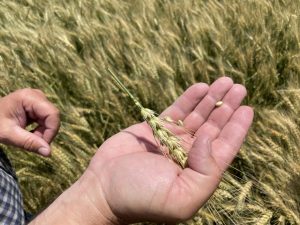
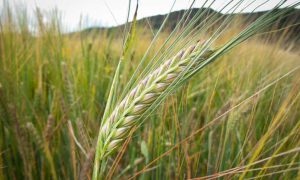
WHEAT BARLEY
these wild grasses were cultivated in the Near/Middle East (ancient Mesopotamia)
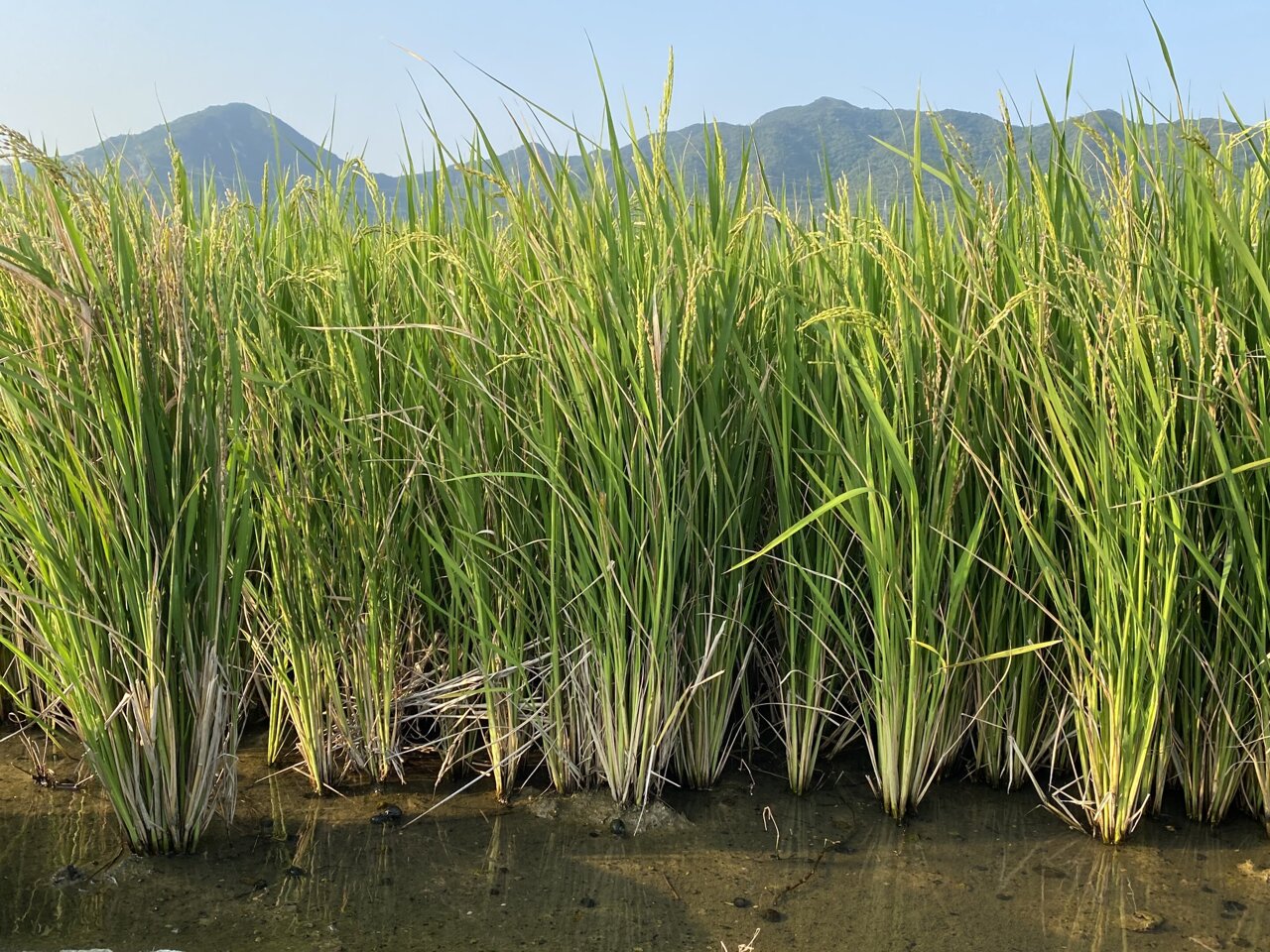
RICE:
a wild grass cultivated in most of Asia
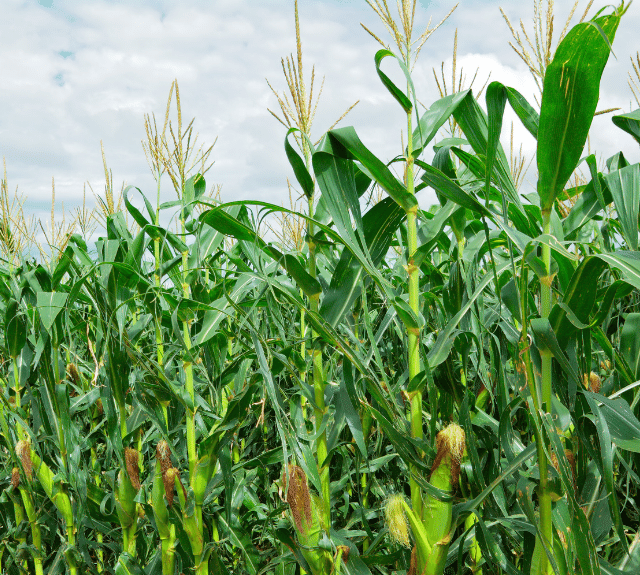
CORN—MAIZE:
a wild grass growing in Mesoamerica

POTATO:
a plant - - - that produces its food under the ground and was cultivated by the people in the mountains of Peru (Lake Titicaca area) South America
In a nutshell:
Neolithic Culinary Delights is a Stone Age journal—the adventure story of Eva, a roaming cave-woman who, by becoming a house-bound agriculturalist, resolves the pangs of hunger. Why want to grow food?! Well, how about . . . that my feet were killing me walking all day collecting food for myself and my kids? So I made up my mind to do something about that; especially as I am lazy by nature. Ha-ha! Why bother growing food—that means WORK—when nature provides? Well . . . I remember that this adventure . . .
THE AGRICULTURAL REVOLUTION . . .
was a global event!
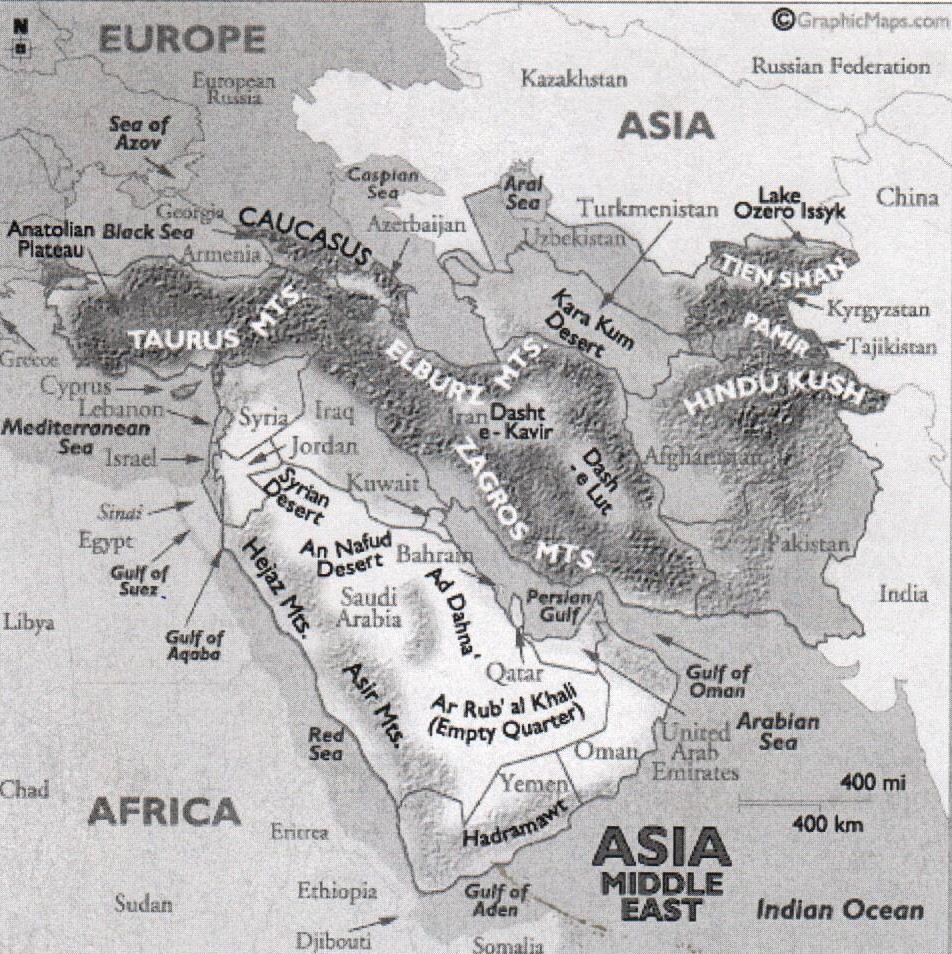
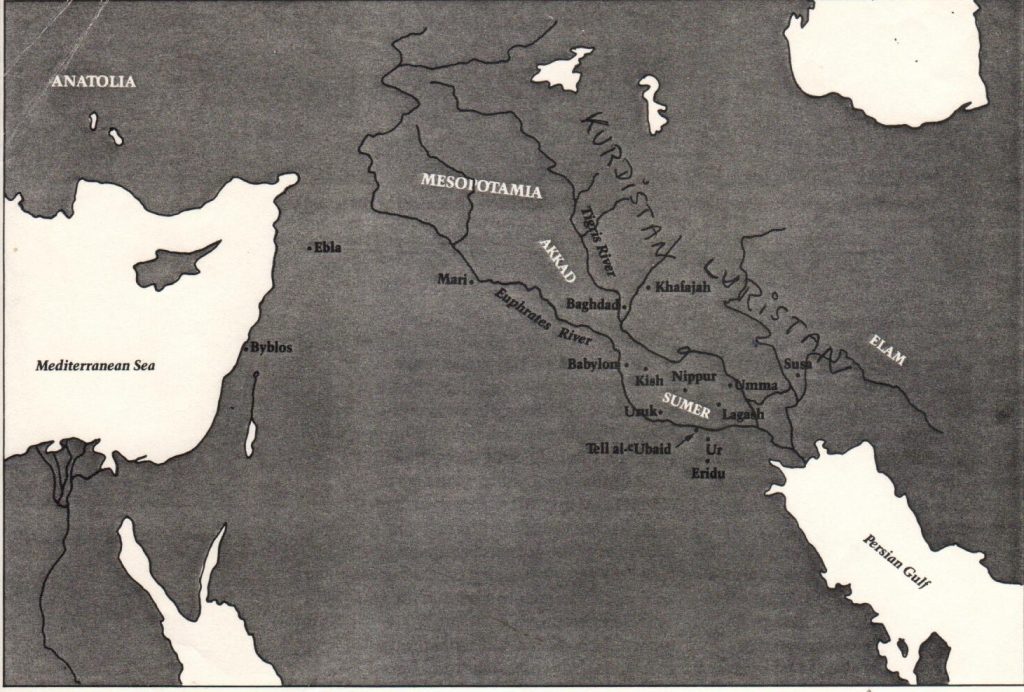
THE MIDDLE EAST
THE ZAGROS MOUNTAINS
KURDISTAN
[7500 BCE]
When I was a cave-woman I shared a cave with my three children and five other women and their children. Our ancestors, who also had lived in caves, roamed the earth for ages. When the days became nippy and the nights chilly we moved to warmer places. As we were often on the move, I couldn’t carry much with me: a basket of grass I made for food-collecting, a stone for pounding tough roots, a sturdy digging stick, and my precious flint knife.
Our men had tamed some wolves and together they hunted cattle, deer, boars, antelopes and smaller animals for food. They returned to the cave when the catch was large enough to share. But most of the time we, women and children, had to look after ourselves. Three kids and I and the five women and their offspring meant that in our territory we had to search every day for food: the children had to be fed! One season we had a short supply of “hares”, a small furry animal the children caught by setting traps. My hare-kebabs, chunks of hare-meat on sticks marinated in onion salsa and roasted above the open fire, were a big hit with my own kids. Sometimes the weather played tricks. Many moons past, for two summers we were flooded by rains, even hail storms, and the pickings were meager; we looked like skeletons and many children died. We had to—so to say—move along with the FOOD SUPPLY: the migrating animals that also depended on eating the same plants.
Let me tell you about the time when the weather, or rather climate, was changing. I was told . . . that the polar caps and glaciers had melted and this abundance of water made the rivers larger, many ponds became lakes, and sea levels rose by 350 feet! Millions of square miles of fine hunting-gathering territory disappeared. The animals, our meat-supply, also disappeared. Hunting became difficult for the men and . . . meat became a luxury! Due to this calamity, we also had to adjust to unknown, foreign plants. We suffered from nutritional stress because the environment had made life extremely competitive and . . . HUNGER was always at the cave entrance! So we had to choose between moving farther north with the animals to really unknown regions or stay in one place and grow food on a permanent basis.
It so happened . . . that my grandmother, who collected the seeds of plants at every place we passed, had thrown these near our caves and water supplies. When we returned we had our little fields of food. My mother, a very observant woman, had noticed that seeds of certain grasses growing near our winter cave wouldn’t grow at all around our summer cave. As my grandmother and mother had experimented before my time, I now also took a great interest in those plants and observed in which areas they grew easily and abundantly. WHY GROW FOOD THAT NEED A LOT OF CARE?
So, one rainy day, huddling around the campfire, I uttered a simple question: HOW ABOUT getting a permanent place and grow food, keep goats, and . . . I wish I hadn’t suggested this. Because in unison the men shouted: ‘You must be joking! We need real food. MEAT!’ However, I had the full support of my female companions. In the end we compromised. At each of our caves the men would cut down the shrubbery on an area of land of our choice and then burn the vegetation. Once the ashes were cold, we, women, would scatter seeds of plants we liked best. Mother Nature would take care of them. For a long time the “slash and burn method” was popular. The first season was a great success, we harvested plenty. No more foraging! But then we had a drought. We became somewhat desperate . . .
On our trip to the northern caves we met another family. They told us that three valleys yonder some people had settled down permanently and survived by growing plants and herding animals. They lived in caves called “houses”. Around the campfire we again discussed this adventure of settling down. Well, we decided to find out how these people were doing. And so we crossed the three valleys. From the top of the mountain we saw the settlement down in the valley and we were more than amazed. Everywhere plants flourished along and near the river. Higher up on the slope were the cave-houses. In a hurry we descended towards their settlement and were welcomed by yapping wolf-puppies, children, and old folk: two men and five women.
We quickly found out—we spoke a similar tongue—that we belonged to the same group-tribe. Right away, the children became friends and off they went to play. We learned that the women were away working in the fields and the men were away grazing the animals. The old folk took us to a log-cabin telling us that this was their clubhouse. I was truly amazed when we entered—it was big! The oldest woman, she told me her name was Nana, gave each of us a small hollowed out gourd. She poured from a larger gourd in our cups red water she called sour cherry spirit. It was yummy! The men waved their cups, saying it was schnapps. Nana offered us food called pita. She told us that besides the clubhouse they had five more dwellings: each was occupied by two families and their pets. There were 10 families: 20 adults and 38 children. Two small cabins were used for their extra, leftover food— surplus food!
The seven had no families and lived in the clubhouse—the community dining hall, and . . . now also our lodgment. Nana told us that in the evenings everyone stayed in the clubhouse when the weather was bad. They entertained each other: singing, dancing, telling stories—they had fun . . . laughing a lot. Some women occupied their time making thread from sheep fleece; others made from these threads cloth and made tunics for covering their bodies. By the time Nana finished telling us about their way of life, the women and older children returned from the fields with baskets heaped with greens. They were very excited meeting us and soon we got to know each other. Before long, the men came down from the mountain with the sheep, goats, and yapping wolves called doggies.
When it was time to eat we went indoors. Grass plates with home-grown greens were put in the center of the room. Warm pita, topped with pungent oregano, passed around in large baskets. The men apologized for not serving us meat, but soon we would eat kebabs. We finished the meal with a fruit called melon. My son Joe, the only child still alive as I had lost my daughter and the baby, rolled his eyes as the sweet juice dripped down his chin. In our honor the male nannies served a beverage called BEER. With a wink at Nana, they told us it was made from fermented barley. Very soon we became very merry! Some girls got up to dance, shaking their rattles. Two boys took to thumping their drums. We had a memorable evening, you bet! Our hosts promised to introduce us the next day to what life in a Stone Age settlement really was like.
We awoke when the doggies barked. The two men went outside—their work was making pita in a nearby lean-out shed named kitchen. Nana and the other women rekindled the fire. Finally, the first meal of the day, called breakfast, was ready. Everyone came indoors and left with their portion of pita and a handful of berries. We could eat as much as we wanted; and to us, cave-dwellers, this was big news. The children ran around the compound while the men stood in groups, eating. Chatting all the while, the women came and went. It was a lively scene. Only at the occasional tribal meeting in the past had we seen that many people together. Our children were happy to have playmates. Finally everyone left for WORK. Our husbands joined our hosts who were leaving with their animals for greener pastures. This was an adventure for us all!
It was a beautiful morning when our group split up. I went along with Ruby and Pearl and their children. Walking to their field, the two explained that the land belonged to everyone and that all food grown was for everyone to eat. Extra food was stored in the cabins. Our first work was watering the seedlings they had planted some days before. We went to the river with large hollowed out gourds and scooped water. It was a coming and going: watering; it kept us busy for quite a while. Then we had a rest and chatted. Pearl decided that the next job was weeding. Ruby told me that most of the real work had been done: like preparing the fields and sowing the plants wheat and barley. I learned that pita was made from wheat grass. Barley, the beer plant food, did well, especially the two-row kind. Pearl said that if they were to grow the six-row variety then they would have three times more grains on the same size of land and, of course, less work. I was all for this: less work! Ruby told her that they had already started this project and that at some later day . . . they were looking forward to collecting huge amounts of barley. After the weeding was done Pearl said that her kids loved eating sweet melons. We should prepare a field for growing this gourd. Before returning to the settlement we cleaned our hands and faces in the river.
Upon our return Joe greeted me wildly, throwing his arms around me, telling me about the wonders he had seen. So nobody had to go to the river when they were thirsty, the men had made an underground water-hole that they named wishing-well. They let down a leather string with a hollowed out gourd attached and then pulled up filled with water. And that Tom and Tim, the old men, looked after the boars they kept in a fenced place. That Tim had slaughtered a sheep for our meal. That an old woman fed seeds to big birds and that the kids collected the eggs. Nana and the women were preparing the kebabs and pita. The men returned with their animals. Adam told me about his experience; he liked the work! The sheep kebabs were as delicious as my hare-kebabs, Joe and Adam agreed. The pita was topped with seeds named sesame. I was curious to know more about their food and I asked Nana. She said that after we finished eating she would unfold the story of the grasses that came to be our FOOD.
Nana sat cross-legged in the center of the clubhouse with a large pita in her hand. ‘Children,’ she started saying, ‘pita is our belly-food.’ Nanny Tim rushed up holding a cup and sat next to her. ‘Beer,’ he said, ‘is our whoopee-water!’ Laughing, we clapped our hands in unison. Nana shook her head and said, ‘Tim, go to your place’—she pointed—‘and kindle the fire. Go!’ Tom clapped when his mate joined him. I giggled: Nana made sure who was boss.
Nana held the pita above her head—everyone was laughing—and hollered ‘Attention!’ Then she said, ‘Eva, come and sit with me because this story is for you.’ I got up, took Joe’s hand, and we sat in front of Nana. She gave Joe her pita saying ‘This is your belly-food.’ She smiled, and started:
‘What I tell you now I heard from my grandmother, who heard it from . . . her grandmother . . . and other ancestors.
All over this earth Mother Nature fostered different grasses to grow and with our helping hands, these magic hands’—she spread them in the air for all to see—‘these grasses we cultivate to nourish and sustain our families. The most nutritious is WHEAT, providing us with a lot of calories to keep working! Eva and Joe, so you know . . . the grains of grasses are dry fruits. We eat pita every day so we have energy to get up and work. The hardiest grass is the shallow-rooted BARLEY. The grains come off easily, that’s why barley’—Nana chuckled—‘is known as a naked grass. It will grow practically in any location (except in tropical areas, the dessert, and icy zones). That’s the reason we like growing a lot of barley.’ Nana pointed at Tim. ‘Making beer is done in a jiffy!’ She licked her lips. ‘So that they grow fat, we feed our cattle some of our surplus barley. We also nursed many other grasses for food. RYE and OATS turned out to be popular; especially oats, eaten at breakfast. We grow all these cereals.’ Nana cackled like a hen laying an egg. ‘My grandmother told me that a long time ago a birdie told an ancestor that in a far away land we revere the grass CORN-MAIZE. And in other lands, where it rains a lot, communities grow the grass RICE.’ Nana paused. Then she announced: ‘Some other time . . . I’ll praise the miracle grass RICE.’
All too soon, the newness of farming wore off with our family group. They told Adam that they preferred to be free like the birds. After enjoying a farewell party with plenty of beer and merry dancing, they left, promising to check up on us. With tears in his eyes, Joe waved at his cave playmates, who told him that they would miss him.
Adam, Joe and I moved in with Ruby and Pearl and their families. When I became with child, everyone was excited. Adam asked Nana if I could stay with her at the clubhouse because he and Joe were away all day long looking after the animals. That’s when, observing the old women, I wondered about . . . how to improve daily life for us. I wondered about cooking the grains in water. But how? Then I recalled that when Joe was little, he made with earth and water small balls and, playfully, had thrown them in the fire. The following day these balls were like the pebbles he collected at the lake. I looked at the gourds:—Eureka! I went with a basket to the river and collected earth. Near the clubhouse was the wishing-well. I filled an empty gourd with water. I sat nearby on a log. I experimented with water and earth—making what I called clay. To make a long story short, with my little hands I made a clay gourd that I named pot. I put this pot in the sun to dry. Adam was excited when he saw my pot. But he didn’t like me sitting on the ground working hunched over the clay. So he put a small tree trunk in the ground reaching my waist; then he fixed a tree plank on top of this tree trunk; and then he put a ball of clay on the plank, saying this was my “stand”. I could work standing on my feet so I wouldn’t hurt my belly. I gave him a big hug and a kiss. I went to the kitchen and asked Tom to cook my pot in the fire; saying it was for cooking food. Grinning, he fanned the fire. The following day, Tom showed me the cooked clay pot that he had put on a large stone at the entrance to his kitchen. He turned around and pointed at the fire. ‘Imagine life without fire,’ he said. ‘Eva, I baked your pot!’ . . . . . . [2023 CE: imagine life without electricity!]
One day, when Tom and I sat on the log near the wishing-well, I asked him what had motivated him to stay here. This is his story: ‘Once . . . we were three family groups. At one of our tribal meetings we decided to grow food; live a new way of life. Many of us, especially babies, had died of strange causes. So we settled on this spot. As you know, we now have ten families. The women can have babies more often. Nana, the other women, and Tim . . . well, Eva, our own families had perished from hunger. We decided to take care of the younger generation so we can have a larger group. We now have enough to eat. The men used to grumble because’—Tom softly chuckled—‘they are now stuck with routine. Eva, for me, living with my group means security. For Joe and the baby security is everything.’ I heartily agreed; and he was the best nanny of them all.
Our new lifestyle, and being with child, had its advantages—it unleashed my creativity. Soon—Cave Cuisine—became the talk of the settlement. The families hugged me when they liked a dish best. I made barley porridge with sour cherries, or nuts. I cooked a dish I named minestrone: I plucked and singed several birds, depending on size. With my flint knife I cut up the birds and put the pieces in a pot. I added onions, garlic, and greens and five handfuls of barley. Then I added water to cover and slowly cooked the soup until the barley was soft. I learned that barley is a thirsty grain and needs a lot of water. When eggs were plentiful I cooked those in water. Then I peeled them, and mashed them with a flat stone, adding some goat milk. I served the creamy eggs with pita, topping with chives.
One day, I went to the kitchen and Tom said, ‘Eva, I cooked something special for you. I named it Omelet Eva. Have a bite,’ and he offered me the omelet on a grass plate. ‘It’s yummy,’ I said after eating it. ‘Tell me about it.’ With a big grin, he said, ‘I made it with eggs and goat milk. And then I put some sesame seeds on the hot stone and cooked it like pita.’ I nodded, saying ‘The children will gobble it up. How about topping it with the sweet you call honey? By the way . . . Joe told me that when you looked at a bee-house that you got the picture of making cave-houses. Is that so?’ He nodded. ‘That’s why we are busy bees.’ Tom laughed. ‘Always working!”
We had shifted from preparing foods requiring little time, like kebabs, to food requiring much labor: planting, harvesting, storing, and then grinding the cereals for cooking so we had a meal and survive. Barley was being harvested and then our pita wheat. Everyone worked from sunrise to sunset. Then my daughter saw the light of day; she arrived before the families went up the mountains to collect fruits and nuts.
With fewer mouths to cook for, Tom and Tim had time to look after the settlement’s tools. When not feeding my baby, we named her Rose, I joined them outside at a shed; repairing the tools, getting them ready for the planting season. ‘Tom,’ I said, ‘can you tell me about tools?’ He said, ‘Honey, for every new tool made with our loving hands’—he grinned—‘we need a new word so we can talk about it. Like this.’ He held up an animal rib with teeth of flint attached. ‘We gave it the name sickle. And as you saw for yourself, we use it for cutting our food grasses. And for cutting down trees we use this large chopper we named axe. We make up names for everything so we can talk.’ Tim came to show me a tool that looked like my knife but was as dark as the night. ‘This,’ he said, ‘is also a sickle but from my ancestor who lived in a land where mountains have fires inside and the stones are like this one. I gave it the name obsidian. Feel it, Eva, it is very sharp, much sharper than Tom’s sickle.’ Tom, eager to show me something he was holding in his hands, said, ‘Eva, look at this, it’s a tool made from flakes of stones. It’s another kind of knife and we use it for skinning an animal and making leather.’ The pestles and mortars for grinding the cereals were made of sand-stone. Tim then showed me a basket with bone needles. ‘My grandmother,’ he said, showing me something, ‘made these from bones that she made shiny. She named them beads. And her daughter put these beads on a leather string and named it necklace. I’ll make a necklace for Rose.’ He looked at Tom. ‘Necklace,’ Tom said with a flutter of his eyelids, ‘that’s a catchy word.’
After many seasons had passed, we were surprised by the arrival of some of our former family group who had departed for greener pastures of freedom. Boss Nana insisted giving a welcome party. Of course everyone clapped: the word party meant beer and dancing. Adam was curious to hear their story and asked them to gather at the wishing-well. Nana, Tom and Tim were also ‘all ears’ and joined us. A young man stood up and said, ‘My name is Darwin. The elders asked me to tell you about our adventures after we left you many moons past.’ Joe got up and face flushed with excitement sat next to Darwin. ‘My name is Joe,’ he said, ‘and I’m just dying to hear your story.’ All smiles Darwin said, ‘I remember you, Joe. You were crying when we left. But we came back.’ Tom and Tim clapped. Darwin continued: ‘We followed the deer and met families who had settled in valleys with plenty of water. Some spoke a tongue that was new to us, but we managed using our hands.’ Nana clapped. ‘The most impressive settlement,’ Darwin continued, ‘was in a region’—he pointed a finger at the sky—‘over there, where the stars guided us. This settlement was the largest we saw. The people spoke a tongue we understood. They told us that every family had their own plot of land and planted what they liked. Next to their dwellings they put their food in a shelter they dug in the ground called pit. The boss of this settlement told us that this was a village. In the center of this village was a large open space called market. Families came to exchange food stuffs, and things like this.’ He pointed at his necklace with a large shiny reddish-brown bead made of wood. ‘By word of mouth we learned that this exchange of goods was known as bartering.’
Nana stood up, saying ‘We also barter. How about you give me your necklace and you can have mine?’ Tom and Tim laughed loudly. Darwin grinned and shook his head. ‘Nana, you busy-body, we know that you like parties. Well, after having bartered their goods, the villagers often stayed for a chat. The village boss told me that at special times he also gives parties that he calls festivals.’
Joe looked at Darwin when he said, ‘Has this village a name?’
Darwin took a pita offered to him by Nana and said, ‘The name of this village is FLOUR POWER.’
Hearing about Flour Power I felt like—Eureka! I waved at Adam to follow me as I left. We had a heart-to-heart talk about going to this village. Joe and Rose would enjoy a better life, especially meeting more children their age. Amazingly, Adam liked it! He also wanted to improve his future. When we told Joe that we planned to move to this village he jumped for joy and asked if we could join Darwin: who suggested picking us up on their return to Flour Power. Of course Ruby, Pearl, and Nana were teary-eyed, but Tom and Tim clapped, saying migrating from our community to a village would improve their opportunities in every way, and perhaps some of their own new generation would join us later.
When Darwin and his family group returned—at the same time as our fruit-and-nut pickers—we had a terrific party. The Darwin women and girls twirled holding clappers that made sounds similar to hand-clapping. These clappers were small and round and made of wood on which were attached strings that they winded around their fingers so that these clappers would not fall to the ground. The women told us that they got these from a family that specialized in making wood objects. The family made wood-sandals!
After having recovered from drinking too much beer we got ready—deciding what we could not do without and take along whatever we could carry. Then, after breakfast and a long, last talkfest, our community waved us off, shouting . . . ‘Have a safe trip to FLOUR POWER!’
THE VILLAGE OF FLOUR POWER
Zagros Mountains: Luristan, circa 4500 BCE
It was just wonderful to walk again as in the olden days. I carried toddler Rose when she was tired. For Joe this trip was a unique event; I was able to teach him the knowledge my ancestors had imparted to me about edible and non-edible plants on which we survived. We traversed sensational canyon scenery, following a river called Simareh. Along the way, we got to know many settlements and their peoples where the men herded their sheep and goats as pasture was abundant; small rivers cascaded down the steep mountain walls. I saw plants I had never seen before and was told that peoples from the south had brought the seeds along when they came up north: tribes were traveling a great deal.
Kinsmen of our tribal family told me that they had gone up north to a lake called Van to visit a settlement where they made obsidian tools. They said that the waters of this lake were bright blue. They bartered sea-shells and beads for obsidian tools, so necessary to obtain goodwill and safe passage on their journeys.
In our settlement I had invented the pot, so I was, naturally, interested in the pottery of other settlements. I noticed the varieties of shapes and color. At one smallish “village” they baked the pots in an oven called kiln. I had never seen an oven before and was excited. Two elderly women offered to show me the know-how of making their pots. So I asked our family to stay one more day.
In exchange for food and care, the two women made pots for all the families. They said that all clay is not the same. Baked in the oven—they called this process firing—the different clays gave earthenware a special color. That’s how one can tell where the pottery was made. Their kiln had two rooms called chambers. The vessels to be fired were put in the top one that had large holes at the bottom—the lower chamber burned the pile of wood; good ventilation was necessary so the upper chamber was piping-hot! The pots were baked! I recalled Tom and my first pot. The two women were proud of their invention making pots in a jiffy. They showed me the wood plank on the ground with the stand on top. One of them sat on a stool in front and used her feet to turn the plank around and around. How nifty! When we parted my two friends gave me a bowl with a wavy design--their mark, they said. This was the beginning of my passion: collecting pottery—“Made in Mesopotamia.”
Continuing our journey south, the days were dry and warm and crisp at night. We collected berries, pears, apples and nuts. Some women were experts at netting smaller animals. The men hunted. We camped at places known to our group. At one of their favorite ‘watering-holes’ the men decided to stay for a while. There were boars in this area. They were excited because when chased the boar becomes ferocious and they were planning to kill one. The doggies came in handy for distracting them. Before sunset the men gathered, and then left to perform some magic; necessary for a victorious hunt. Adam never told me about this because women weren’t allowed to know about these secret rites.
I was looking at plants I had not seen before and pondered if any could be edible, when a loud snort startled me. I faced a mother boar and her young. We stared at each other: terrified! I recalled how my knees were shaking. Then a chorus of yapping doggies approached. This distracted the mother enough to turn around. Silently begging for help, I clutched my necklace. Then mama-boar turned her attention to me again. That was all I could take . . . and I ran screaming toward a pistachio tree with low hanging branches. With my heart in my mouth I climbed as fast as I could . . . all the while mama-boar snorting, letting me know she was not tolerating me. All shook up, I gave thanks to the tree spirit that boars could NOT climb. Then the doggies came. Until today I can’t recall exactly what happened while the doggies were yapping, mama-boar was a-squeaking and the men were shouting. Really, a fantastic commotion took place. But I vividly recall that it ended so loud! The squeaking peals of mama-boar paralyzed me. Don’t forget, it all happened underneath my pistachio tree. Suddenly there was silence . . . like magic! I finally dared open my eyes. The doggies were wagging their tails while sniffing at the little boars and the hero stood next to dead mama-boar. Holding their spears high up in the air, the men silently danced around them. When we returned to our camp, I told our group my horror story. And overnight I became a heroine!
With two friends helping me, I prepared a dish commemorating this event and named it Paté de Boar. To honor the tree that saved my life, I added pistachios. Here is the recipe: Ask the hero to skin the head and singe the ears. Cut up the tongue, ears, and cheeks and soak these in water with sour-green in season. Save brains and eyes. Boil water in pot with onions, garlic and leeks. Add the meat pieces and cook until soft. Add brains and cook. Take meat out of pot and chop until meat is mashed. Add wheat flour. Add chopped pistachios. Make cakes. Cover the cakes with boar fat. Cook on hot stones. P.S.: The eyes, cooked in the broth separately to ward off the evil eye, are a delicacy and reserved for the hero hunter.
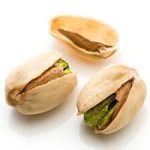
We continued our journey Darwin said that we were nearing our new paradise. One morning I’ll never forget, we stood on the hill which overlooked the plain leading to this marvel called FLOUR POWER in the distance. It was very emotional and a significant event in my life as all my longings and all my dreams were involved. I held Rose in my arms and said to Joe that this was our magic moment. We watched the shepherds leaving the village with their flocks—hundreds of sheep and goats. The goats went toward a rocky area; these agile animals like to leap. Guided by doggies, the sheep went direction plain to graze.
Darwin joined us, giving Joe a pat on his shoulder. He smiled at me when he said that the village was famous for pomegranate trees. Someone grew acacia trees and made from the bark a medicine for stomach troubles. Darwin pointed to the village built on an elevation and said that the cliffs protected the villagers from attacking raiders. But on the other side they had to build a wooden fence with a door called gate. The fields and orchards were beyond, where a river flowed. There was a well outside the gate and one inside the village that had about one hundred houses.
Adam wanted to know about the importance of Flour Power in this region. Darwin said that very large villages were called cities. And that Flour Power, in exchange for protection, had to give some of their surplus food to SUSA, a city within five days walking. The city had a standing army.
‘What’s a standing army?’ Joe wanted to know. Darwin laughed, and then said, ‘A standing army is a large group of men ready to go and kill intruders with spears, and bow and arrows they call weapons. These men are called warriors and, Joe . . . in exchange for defending the peoples they do not work in the fields to grow food. They also get shelter.’ Joe shouted, ‘I want to be a warrior!’ I pulled his ear, saying ‘No. You are helping me in the kitchen.’ Joe made faces, so Adam said, ‘Darwin, who is leader in Susa?’ Darwin put his hand on Joe’s shoulder and said, ‘He is called king. And if you want to be a warrior, Joe, you’ll have to ask the king.’ He turned to Adam saying ‘By the way, some villagers no longer grow their own food but exchange their handiwork for food. If you need sandals, you go to Charlie and do your wheeling-and-dealing.’ I nudged Adam and said, ‘You are very good at bartering.’ Darwin chuckled. ‘In that case, Adam,’ he said, ‘you’ll be a trader; work that requires footwork selling goods from house to house.’
Darwin turned to me. ‘Eva, if you don’t grow your own food then you must work. So . . . what’s your plan?’ He took Rose who had been waving her arms at him. ‘Well . . .’ I said looking at Adam. ‘Is there a clubhouse where we can stay until we have our own house?’ Darwin shook his head. ‘I know a family who runs a boarding shelter, not fancy, but you’ll have a roof over your head to start with.’ Adam rushed to say ‘Are you also boarding at that shelter?’ Darwin smiled broadly. ‘I’m staying at a family with a daughter I want as my wife.’ I clapped. ‘Congratulations!’ I took Rose in my arms. ‘Let’s go!’
As we approached the fenced area of the village Darwin told us that our shelter was near the gate named Kushki. At the well men hauled water. He said hello and they waved, saying something in a tongue we barely understood. Darwin said that in Susa people spoke a different tongue, and if Adam wanted to be a trader, he should learn their words.
We stood inside gate Kushki. Ahead of us a wide street with houses on either side led to the market place. Darwin took Joe’s hand and we followed—passing two houses they made a right turn. In the back of the house was an orchard. A white-haired woman was picking fruit. She said hello, smiled at Darwin, and gave him a red fruit. He gave it to me saying that this was a pomegranate. He spoke with the woman in her tongue. We understood, he was pointing at us, that this was the boarding shelter. All smiles, Darwin said that they had room for us, but she needed a deposit because she would cook us one meal daily until we had found work. Adam took from his satchel an obsidian knife. The woman’s face lit up and she nodded at Darwin. Gosh, so easy, the deal was done!
Our host family became our sponsors. Bill and Barb were kind and helped us adjust; we had to learn new words! Neena, the white-haired woman, had a friend who spoke our tongue and she joined us in the orchard. She informed us about available work: always in demand: field-work was tops, and grinding wheat for making pita, and baking pita and selling pita in the market; making beer and selling beer; making leather goods; making pots for cooking and storage for grains; making bricks for building houses, and shepherding. The most coveted line of work was the Susa city job: transporting wheat and barley in ox-carts for their granaries. The work involved loading the cereal in the cart and unloading at destination. The caravan was escorted by warriors.
Neena took Rose along when she went with her grand-daughter Jane to the market bartering greens in season that Barb grew at their fields. Bill took Joe under his wings and showed him brick-making. The two older sons of the couple were shepherds. For Adam it was stressful adjusting to this village life because he was responsible for feeding us; no longer able to hunt for meat! We had never thought that uprooting, [emigrating] was this tough. We started to quarrel! He called me “feather-heart” because I wasn’t practical, always on the look-out for doing something new. Certainty was fine I said, but not for improving life. Life was one big risk with hunger lurking everywhere. I didn’t mince words when I said it was a matter of adapting or dying. Then Bill told us that a friend of his who lived most of the time in Susa needed an extra shepherd to look after his village flocks. Adam might consider taking this work. His reward was the newborn speckled goat kids. Beaming with gratitude, Adam embraced Bill.
I decided to take a stroll to the market place and find out about work as cook; after all, my cave-cuisine had been much appreciated. I took Rose with me, who asked if the boy next door could join us. Harry was her age and his work was collecting fire wood for his mother. He would introduce us to the villagers bartering their goods. Along the route were the two-room brick-houses; like our boarding shelter with a walled-in-courtyard for the family’s goat that produced milk for making yogurt. Harry had told Rose that goats were cherished; she was called wet-nurse of infants. The family oven was also in the courtyard and a drainage hole for excess water and family “waste” led outside the wall. Pomegranate trees were everywhere. Harry said that shepherds take the fruit with them to quench their thirst, and travelers to Susa to refresh their mouths. I wondered if I should use the water of this fruit for my barley-hare-soup.
We stood at the entrance of the walled market. Women lined up at the well. Nearby on a long brick bench underneath two shady trees older women were chatting. A few paces further, on a platform, stood a statue without head showing prominent nipples and a wide pelvis . . . and without arms or legs. Eyes shining, Rose said that her name was Pikki-Me: meaning tree of life. She was made of wood because trees have roots that go deep. Harry tugged at my arm and said that his mother had told him that Pikki-Me was a family tree. A commotion at one of the shops drew my attention.
Rose took my hand. ‘Look, modar,’ she said, ‘Joe is having big words with Bill.’
‘And Neena and Jane are waving!’ Harry rushed to join them.
Rose laughed as we neared the group at the shop where the bickering took place. ‘I heard Joe saying that he doesn’t want to make bricks because his hands get dirty.’
‘Tell Joe that he’ll get fifteen jars of barley for making three hundred bricks!’ Jane said as she took Harry’s hand. ‘Neena will hoard his extra barley so we can marry and start a family.’
‘Modar,’ Joe said stepping up, ‘I want to make beer.’
“And Rose’—Harry took her hand—‘will barter your beer.’
Shaking his head, Bill joined me and said, ‘Eva, Adam and I will be picking bones about your Joe. I’m trying my best to get him work and he refuses!’
‘Modar,’ Rose said, ‘how about . . . if we ask pedar for his input and hear what he has to say. Joe and I are putting up roots in Flour Power. We must build our life!’
I took my daughter’s hand and said, ‘Yes, Rose. Let’s talk with pedar what you and Joe will do to make a living.’ I held out my other hand for Joe.
Then I said looking at Bill, ‘We are grateful for your help getting Joe work and we hope that you’ll join us because Adam has nothing but praise for you.’
I smiled at Jane. ‘Your grandmother says that you are a clever girl; so I want you to listen to our talk, and maybe Rose will give you her ear.’ I squeezed Rose’s hand.
‘Harry,’ I said, ‘tell your mother to also come. I want to know more about Pikki-Me.’
Harry’s eyes were teary when he said, ‘How about me . . .’ He looked at Rose.
I couldn’t help smiling and said, ‘Harry, you’ll be our guest of honor. You have given me my hunch. Take her hand. And, Neena, let’s all walk to the orchard and wait for pedar to return so we can have a talkfest.’
When we arrived at the orchard—Bill said that he had a meeting with the village boss, so he left. Neena said that she needed a nap and went indoors. Rose and Jane made a dash for the brick-bench. Joe wanted to talk with Darwin about his beer future, so he left. Harry took my hand and suggested going to his orchard and meet his mother.
Her name was Sue. We sat on a brick-bench in her courtyard. Harry went inside the house and returned giving his mother a wood image the size of a large pomegranate. Sue smiled as she stroked the image, saying Pikki-Me was her object of affection because she was her family tree. I was curious to know more about this wood carving that had no head, no arms and no legs that she so cherished, and without asking I reached out to hold her. As she pointed at the large nipples, Sue nodded, saying the image represented maternal love. Sitting next to her, Harry said that his father had a crush on her belly because that’s where babies began life.
I wanted to know who had made this handicraft. Sue took the image, saying Pikki-Me represented mother earth—who gave birth to fruit trees: fruits are their babies, their children. Now enraptured, Sue put the image in her lap and said that many moons before she saw the light of day, an ancestor had made Pikki-Me from wood; because trees were living beings stretching their roots underground. Earth was Magic. And Pikki-Me was their symbol for the magic of life.
Harry took the image and kissed her belly, saying to his mother that she should tell me about their ancestor Nana and what she did. Sue laughed and patted his arm. She then told me that her Nana, who had returned to the dust of the earth, had asked a wood carver arriving in Flour Power to make a very large image of Pikki-Me. Nana said that everyone in the village should worship the image of life represented by her Pikki-Me. The boss had liked it and told the villagers to come to the market place and celebrate Pikki-Me: the tree of life. And every day since, villagers had put food on her platform, reminding everyone that mother earth nourished all living beings. Every full moon villagers showed up at the market place, singing songs praising her. The young ones danced, and the adults drank beer. With a big grin on her face, Sue said there was much merrymaking. Harry returned the image to his mother and said that she should ask father to get me a Pikki-Me from baked clay. Thrilled with the offer, I got up to give him a hug when Rose and Jane showed up, shouting that pedar was eager to see me so we could have a family talkfest. I held out my hand to Sue, saying we valued her words of advice and wanted her at our family meeting. Harry jumped for joy.
In the courtyard—Neena and Barb were at the oven. The children were watching them as Adam, holding a basket, gave them the kebabs to cook. Sue and I joined them.
Chuckling, Adam said, ‘All the village knows what happened at the market place. The old women went to the boss to complain about Joe. Only women make beer. And if men take over, they will be out of work.’
‘Eva!’—Neena winked at me—‘Get this . . . stingy Steve gave Adam the kebabs on credit for sheep meat. He doesn’t want barley.’
‘I wanted to celebrate,’ Adam said, ‘that everyone is talking about our Joe. He may get an offer working for our boss . . . perhaps be his right hand!’
‘I oversee,’ Sue said, ‘making wheat flour at our workplace. I’ll be happy to get Joe involved in our trade. My husband makes the pitas and trades them at the market place where we have a shop.’
Shouting Darwin, Rose ran to the orchard. All smiles, Joe and Darwin joined us.
‘Son,’ Adam said, now laughing, ‘you are the talk of our village because you don’t want to get your hands dirty!’
‘Making bricks is hard work,’ Barb said as she put one more kebab on the fire. Neena nodded looking up, her face shining with sweat. ‘But you’ll make a good living. Bill is doing very well producing housing bricks for arriving settlers looking for work.’
Jane took Joe’s hand. ‘We have workers do the dirty work,’ she said. ‘Mason, my father’s assistant, takes care of the brick-makers.’
‘Jane,’—Harry put his arm around her—‘I want to work for your father making baked Pikki-Me. How about we set up shop at the market place?’ He looked at me and smiled.
Someone clapped hands. The boss and Bill entered the courtyard. ‘Harry,’ the boss said with a big grin, ‘that’s terrific. Flour Power will become famous because every trader will want one to take home as a souvenir.’
Sue laughed. ‘Alex,’ she said to the boss, ‘you know that my ancestors started grinding the wheat and traded in flour. That’s how our village got its name.’
“Wheat flour made into pita is our belly-food,’ Neena said and clapped.
‘That’s why Susa,’ Darwin said as he joined boss Alex, ‘leaves your village in peace. As Neena said, Flour Power is their belly-food place. Susa needs flour to keep their people from rioting.’
‘But the city sends us their tax collector,’ Alex said with a sigh. ‘And he needs a bribe or he’ll assess our wheat output double.’
Adam clapped his hands to get our attention. ‘Alex,’ he said, ‘my son wants to make beer. I heard that this work is done by women only. Tell me why Joe can’t make beer.’
Alex raised his eyebrows. ‘Your son can make beer. That’s not the problem. But he can’t set up shop in the market place. For setting up shop you need a license from me.’ He stared at Adam; then continued: ‘Serving customers has been, from day one, woman’s work. They don’t need permission to barter home-brew. They can barter anywhere . . . not only the market place.’
‘Can Joe set up shop outside the village?’ I wanted to know.
‘I am wondering . . . serving my brew in a beer-garden,’ Joe said. ‘Perhaps in an orchard outside the village.’
‘Joe, to start with, you need a lot of barley,’ Alex said as he looked at Adam. ‘I collect all barley output and it’s bartered at my, I mean, our village shop.’ He looked at me. ‘Eva, Darwin told me that your cave-cuisine is tops. And a birdie told me that you want to set up shop and cook for those who can’t cook. The birdie chirped that it is take-away food.’ He rubbed his thumb and forefinger as he said, ‘Traders will take to it. I’ll give you a license because it will benefit our village.’
‘How about giving Joe barley on credit,’ Adam said as he joined Joe and Darwin.
‘The kebabs are done.’ Barb shouted. ‘Let’s eat!’
Neena laughed. ‘And I’ll serve my . . . homebrew!’
Adam put his arm around Joe, gave Alex a huge smile, and said, ‘Yes. Let’s eat, drink, and make merry!’
Neena’s homebrew was delicious. She told her secret to Joe, that she had added fragrant yellow flour given to her by a trader from Susa who once stayed at her shelter. The two made a pact: Neena would show Joe how to make beer and in return she wanted a portion of his beer-garden trade gain.
Barb served Alex the choicest kebabs with a salsa of onion juice and chives. Bill, Jane and Harry arranged between them a deal making kiln-fired images of Pikki-Me. They had the approval of Alex. But Bill insisted getting also the consent from his father Jack, who was in Susa making deals at a pita-making shop that used his flour. Harry asked his mother; Sue smiled and nodded.
Alex, Darwin, Joe, Adam and I made deals. As my position was strong because I had Alex’s endorsement for a take-away food shop in the market place, Alex pledged Adam that he would give Joe the much-needed barley credit. The men embraced, sealing the deal for a beer-garden outside the village gate that led to his pomegranate orchard. I made sure that my Rose would serve the customers. Sowing the seeds for starting a family trade had taken roots . . .
When Alex and Darwin had left, arms around each other, Barb asked me, rolling her eyes and giggling, to join her for one more cup of beer. She told me that one of her friends in the fields had told her about my boar story, and that I had created Paté de Boar, a recipe that included pistachios. Her families owned the mountain behind the fields where pistachios grew in abundance and she offered me to help them collecting the nuts. I was thrilled to hug again my life-saving tree; so I accepted on the spot without asking Adam! Sue saw us laughing and toasting, and joined us; wanting to know about our merrymaking. She said that she was very happy with the Pikki-Me deal her Harry had made with Bill. This deal had a great coming. Jack had told her that the temple priest in Susa—they worshipped the ruler of light, the sun—needed women to serve the worshipping men. The priest collected the barley and wheat grains the women got for their services. I wanted to know about these services. Sue laughed. Jack had told her that the work was honorable because the priest had said so. Well . . . the women were sex-workers. Now all smiles face shining, Sue got up to leave saying the Pikke-Me images would trade like hot pitas. And that her Harry would become a successful trader like his father. I wanted to know more about the temple sex-workers. Barb said that they were easy on the eye, mature women with experience and that the women most likely were widows with no surviving children, and that this was how they eked out a living. I wondered if these sex-workers had a special name. She said that they were known as Tamars.

Barb and I were going to meet Lucy, an owner of the pistachio orchard, at her workplace. As we crossed the market place she pointed out the gate called Anor behind Pikki-Me. She gave me an elbow when she said with a chuckle in her voice that this would be the gate to Joe’s beer-garden.
We went through the gate called Bachban that was opposite from our entrance gate Kushki; the market place divided them. Here the dwellings were close to each other, without a shade tree. These houses were for the people making a living in the fields or helping out with chores, Barb said. Close to the gate stood a magnificent shade tree where several women and men were chatting. Barb went to two women who greeted her; the women did the heavy work in her garden. The four of us walked to Barb’s workplace, laughing and chatting. Every day I learned new words!
Lucy was all smiles, saying she had been looking forward meeting the woman who had survived a boar hunt thanks to a pistachio tree. Barb gave me a hug as she said that she and Neena couldn’t wait to hear about my pistachio trip. Lucy gave her a small sack with nuts, and we departed.
I was thrilled that Lucy understood my tongue. She had been trading with nomads, bartering foods that transported easily—dried fruits like figs, raisins, berries, and sweet dates. These nomads had exchanged sacks, containers of woven sheep wool, for food.
I was in awe when we arrived at her family-dwelling. Five rooms! They were big traders! She said that there had been five nut-collecting generations living here since pistachios saw the light of day. Laughing, Lucy squeezed my arm. And for sure, there were more nut-collectors than my fingers could count sitting near the oven where her grandmother was making pitas. In a recess of the room nearby sat a tiny, toothless, shriveled-looking woman. She cackled when Lucy introduced me. It had been old-nana, Lucy said, who had insisted meeting me. So I sat next to her and held her hand. Lucy explained her words: That when she was a child a mama-boar had also chased her, and she, also, had climbed a pistachio tree. Little old-nana squeezed my fingers. Lucy said that her old-nana considered me family, and I would get special favors. I wanted to know about these favors. She said that I would get the rights to always get pistachios when, and how much, I wanted. Lucy chuckled when she said that old-nana wanted me to make a pita using pistachios. Well . . . Eureka! That’s when making pistachio cookies saw the light of day! I laughed, and kissed old-nana’s hands. She pulled me close and kissed me on my lips! That’s a deal, Lucy said, laughing; her belly shook.
Lucy gave me and her niece Bella sacks and we walked to her plot. She showed me how to shake the pistachio branches so the ripe nuts dropped to the ground. As we took a break, two male relatives showed up. They gave us a snack of sliced turnips. Then they left, taking our heavy sacks.
Lucy told me that her ancestors were once woodlanders and knew the mountain regions all the way from Lake Van to Susa. They had decided to put up roots near Flour Power. None of them liked tilling the soil and instead made a living by trading nuts for greens and flour. Collecting nuts didn’t require much labor and gave them more freedom. Lucy told me that her family liked talking. I became totally absorbed listening when they were telling stories. Words . . . magic words! That’s where her family kept their ‘inside-eye’. She put her hands over her eyes. The inside-eye was . . . I had a hunch: Eureka?
Then . . . Joe showed up with a relative of Lucy he had met in the market place. Father, Rose and he had been wondering why I had not yet returned; it was high time, he said. I had a pang of guilt, but my heart warmed that they had missed me. When, giving him her sweet smile, Bella served Joe a sesame pita I was alarmed, because he became what I called ‘googly-eyed’. To make this a short story, Joe had fallen in love with Bella—on the spot! We had a face-to-face talk. Bella’s smile had lit up his world and he wanted to marry her. I told him that first he needed a house and establish his beer-garden and then marriage. Barb and Bill knew that Jane was smitten with Joe. I smelled tension in the air. To make things worse, old-nana had also seen Joe’s face and had gotten the message.
So I took Lucy by the arm, saying we needed a stroll. I told her that Barb’s daughter Jane had set her eyes on Joe. And we shouldn’t tell Barb about Bella, Jane’s competition. Joe and Neena were involved making beer together. And if Neena got even a whiff of Jane being replaced by another girl, the family would hold hands together; and my family would be homeless. I then suggested that together we go into trading my pistachio cookies. [About this exciting venture I’ll tell later . . . because the birth of my cookie recipe changed all of our lives]. Anyway, she would get a portion of the gains for herself. Lucy understood. We linked arms and made more deals. I would make a cake using her dried fruits. We laughed a lot when we came up with the name TUTTI-FRUTTI . . .
Before Joe and I returned to Flour Power, I embraced old-nana. She cackled, and then gave me a wet kiss on my lips! I pinched her cheek. Lucy had told her about our cookie and cake adventures. In high spirits, Lucy joined us to Flour Power—we carried four sacks of pistachios. Joe and Tony, the relative who had taken him to their homestead, carried four sacks of dried fruits. A deal had been made that every full moon Tony and Joe would . . . visit old-nana . . . and return with sacks filled with pistachios!
One story told by Lucy’s grandmother had touched my heart. It was about a spider weaving her web, and of bees talking with each other where the sweetest flowers were to get honey. I then recalled that Tom, who had made Omelet Eva, had told me that he liked honey, and when he saw bees entering their dwelling place he got his hunch of making cave-houses. Lucy’s grandmother learned from watching insects how to get food the easy way and started weaving her own web. By word of mouth—talking with nomads she had found out how to trade successfully. With a big grin, she had called it web-working.
Well, my first web had to be the take-away food trade in the market place. My barley-hare-soup had always been a favorite meal. But, hares, where to get hares? Before entering the garden-fields of Flour Power, we had a rest and ate dried figs. In a flash I felt like Eureka and asked Tony if he knew a hunter to get me hares for my special hare-soup. He laughed. He was a hunter, and would be happy to supply me with hares. Lucy had told him about our cookie deal, and he very much liked making a similar deal with me. I got the picture that I would have two web-deals with this family—respected by the villagers. It would give Joe and me, newcomers on the trade-scene, a thumb-up. I looked at Joe; he was beaming. I said, with a nod, that this was a super deal and extended my hands to seal the deal. So . . . we held hands—promising to make our deals a success.
When we were alone I asked Adam, who was better at bartering, to have a talk with the owner of the kebab-shop, Neena had called him stingy Steve, if he would be willing, of course for whatever food he wanted in return, that I join him in his shop: sharing; that I had the approval of boss Alex to trade my barley-hare-soup. He put his lips at my ear and said that I should wonder about containers to serve the take-away soup!

Unexpectedly Darwin dropped by with a girl on his arm; he introduced her as Victoria, the daughter of his host. Gosh, they were getting married! Her parents wanted us to attend the party. Darwin asked Neena to make her special beer laced with fragrant yellow flour. He winked at Joe. Then he announced that once married, he and Vicky would go to our settlement. Nana, Tom and Tim were waiting for them. He was going to be their ‘boss’ and introduce them to the good life. Boss Darwin would put the settlement—he was planning to name it Blue Beads—on the nomad trail. Village Blue Beads would be trading beads. Teary-eyed I looked at Rose; Tim had made a lovely necklace for her when she saw the light of day . . . Neena served beer.
Darwin continued telling us that necklaces made by Victoria, wife of boss Darwin of Blue Beads, would be in great demand. Vicky had set her eyes on opening shops in many other villages and hopefully even the city of Susa. Her necklaces would get to be known as Made in Mesopotamia. Bill and Adam clapped hands, shouting that it was the spirit-of-trade that kept them alive.
Darwin and Victoria left with the promise that we would come to their wedding celebration at the market place to be sealed by boss Alex.
Adam and I had a talk about serving the soup. Eva, he had said, you can’t expect people to bring their own cup. You are not opening a soup kitchen. You are a take-away food shop! Traders from around here will eat your food. You have to come up with serving the soup in your own cup. Talk to your eyes, your second sight—to wonder, he had said. I embraced him, saying he had saved me from evil days. He had put his lips at my ear and said that we were a team. And Joe and Rose would join us. I had put my lips at his ear, saying coming to Flour Power had been a blessed adventure and that we would eventually become a family of traders.
Now I had to come up with a cup that was handy as well as to be done with. I was looking and looking: wondering—watching Neena make pita; a large one curled up, making a cavity—a shallow bowl. ‘Eureka,’ I shouted, ‘take-away—throw away!’ And I jumped up, took the pita-bowl from the oven and put it on a stone to cool. Then I embraced Neena, telling her what I planned to do. She suggested I ask Sue and Jack, they were trading pita in the market place, if they would make my pita-pot. She chuckled when she said that people could also eat the pot: nothing to throw-away!
I stood at the shrine of Pikki-Me to thank her for the good fortune she gave Flour Power, when Harry rushed up. He took my hand, saying his father had returned from Susa and I should meet him.
Email your feedback about the story to the author at rosecamelia@verizon.net.
TO BE CONTINUED
June
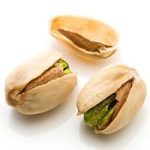
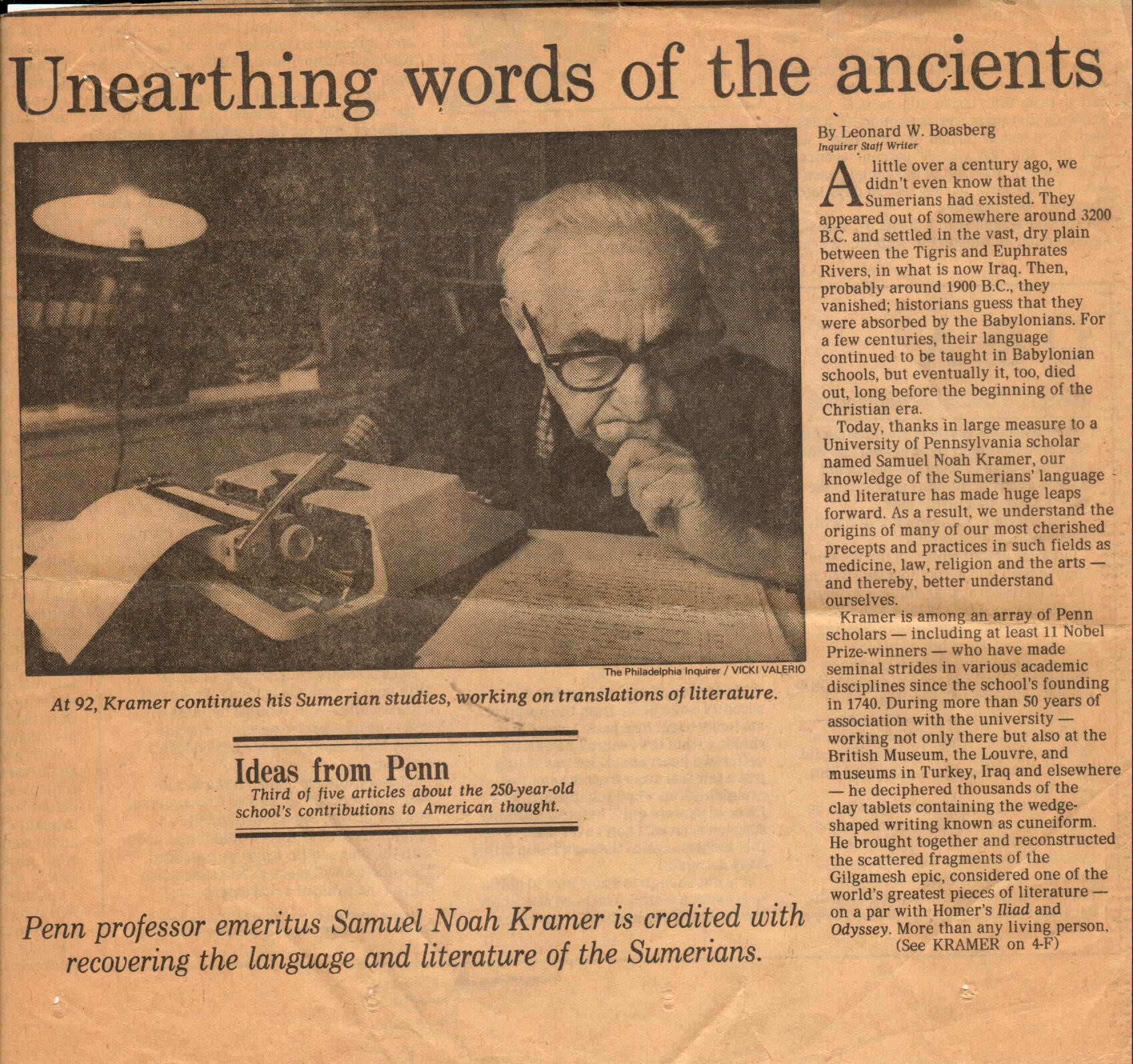
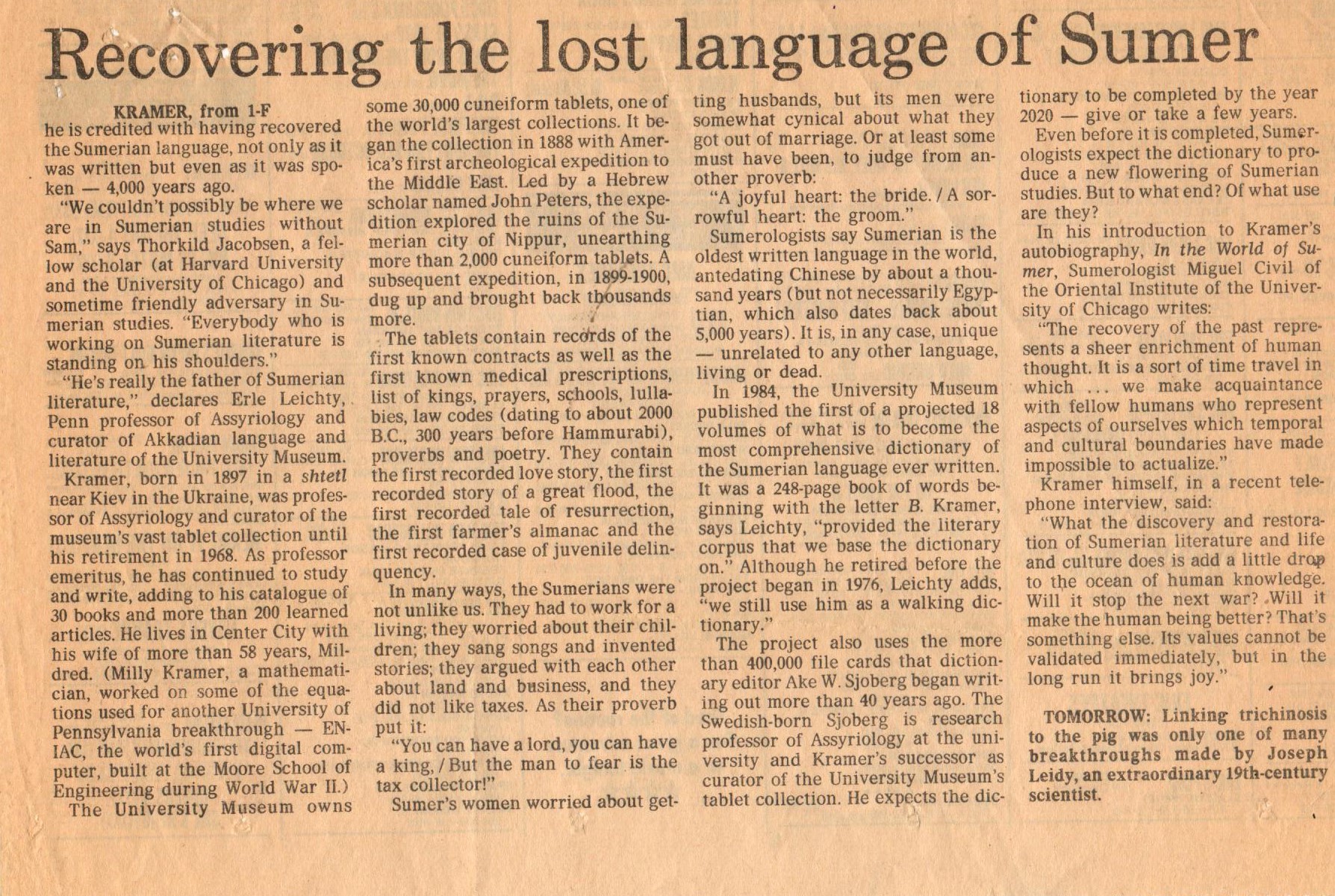

Jack and Sue were sitting on their brick-bench in the orchard underneath the pomegranate tree. Her face lit up when Harry and I entered. She introduced me as the woman who was in love with her Pikki-Me and had suggested that Harry and Jane together with Bill, her father, trade baked images of Pikki-Me. With a huge smile on his face Jack left. Sue pointed to the empty seat and I sat next to her. Jack returned with what looked like a large sack.
‘Harry,’ Jack said, ‘what I’m going to show will be terrific for trading.’ He held up the sack that had two long sling-loops on either side. ‘Hold out your arms so I can demonstrate.’ Jack put the sack at Harry’s back, took a sling-loop, and put it through his extended arm until it reached his shoulder. He did the same with the other sling-loop. He pulled at the opening of the sack, saying ‘Sue . . . now Harry has his hands free. He can carry on his back the images when he goes from door to door.’ Sue took two pomegranates and dropped them in the sack, saying ‘Back-sack!’
Jack then showed Sue that if she put the sack in front, the opening was now in the front. ‘For carrying a baby,’ he said pointing at his belly, ‘a baby pouch.’
We laughed. I was dying to know more about these sacks. Jack said, ‘I met at the market of Susa a group of women weavers who run a workshop. Their husbands are herders and give them the sheep wool so they can weave and trade their cloth. One day at the temple, they decided working together—making these travel bags.’
I clapped my hands and shouted ‘A back-pack, Jack!’ I then told them about my pita-pot that I needed for serving my barley-hare-soup. They were enthusiastic, eager to help me. Jack promised to experiment with the flour and make the perfect pot. I offered them a portion of my take-away food gains.
Harry came with a jug of beer and four cups to celebrate one more deal.

The wedding of Victoria and Darwin at Flour Power.
For this occasion the shrine had been moved to the center of the market place. Boss Alex had ordered that the village girls bring flowers-of-the-field to pretty-up Pikki-Me. Neena told me that a birdie had told her that Vicky’s parents had given the boss enough barley in exchange for jugs of beer for the party. They also had given Alex bowls of flour to serve enough pitas for 60 guests. Neena was curious how much gold the parents would give their daughter. Vicky would wear bangles; the more bangles the more she was protected from starvation, the fear of hunger. I had no parents; they had perished when I was a little child. I should tell Adam to start thinking of accumulating gold for when Rose would marry. Neena and Barb had asked the village seamstress to make them and Jane new tunics. Adam gave me a young goat as exchange for Rose’s and mine outfits.
Before sunset we got dressed. With thin thorns Neena pinned pink flowers on the shoulders of our tunics. She had made belts by braiding strong grasses, adding flower tassels. So when our party walked to the market place, we looked like “fashion plates”; the tassels swung as we moved.
White flowers in clay pots surrounded the well. On the brick-bench underneath the two shade trees sat the parents with their daughter. Darwin stood with boss Alex at the shrine. When we approached, Darwin greeted Adam and Bill, saying to Alex that he should thank Bill for being our sponsor. That our family of four was an asset to Flour Power—bringing prosperity. And that Joe and Rose, putting up roots, would turn out to be a blessing for all villagers by becoming shopkeepers. Someone clapped hands. Jack and Sue had sneaked up; wanting to know what was being discussed. Harry took Jane and Rose by the hand and they left. Neena took the opportunity to chat with Vicky and her parents. Alex inquired after my take-away food adventure. I took Sue’s hand and told him that she and Jack would make pita-pots for serving the barley-hare-soup, and that Adam had talked with the kebab shop-owner who was willing to share his place with me. Alex smiled from ear to ear.
Three boys sitting at the entrance of Alex’s pomegranate orchard started the festivities by slapping drums with their hands. Guests streamed into the market place. Alex gave a sign to the men at the beer-shop to serve the whoopee-water. Girls wearing necklaces of fresh flowers joined the drummers. Dancing, two clapping castanets, they sang.
The merrymaking was in full swing when Alex and Darwin escorted the bride and her parents to the shrine. Pikke-Me was adorned with garlands of rainbow-colored flowers-of-the-field and surrounded with baskets heaped with fruits. The drummers stopped playing and the girls stopped dancing and singing.
All eyes were on Victoria’s blue beads cascading down her cream-colored tunic. Five necklaces, Neena gasped standing behind me. Vicky’s hair was bedecked with white flowers and gold loops dangled from her ears. The flashing bangles on her arms were studded with green and dark red stones. Neena put her lips at my ear, saying the parents’ tribe was from the Kundus river region where precious stones were traded. Victoria was set for life by her parents. Knowing where to get those stones when he and Vicky needed more for her shops, no wonder Darwin would become boss of the settlement.
Alex and Darwin raised their arms to get attention. The guests were asked to face the ceremony. Alex asked Darwin to step up. Then he nodded at the father, who stepped up holding Vicky’s hand. Alex asked the father for permission to hand over his daughter as wife to Darwin. The father said yes; Vicky and Darwin held hands. The mother stepped up with a basket and put rose petals over their hands. The couple was now officially married.
The boys banged their drums. The girls came over and danced around the shrine. Some of the women guests joined the dancing. Men went to the beer-shop and returned holding cups, shouting their approval. The bridal party went to the brick-bench. Sue, Barb, Neena and I wished the couple much happiness. They were leaving the following day so we said farewell; and a message for Nana, Tim and Tom that their Eva sent kisses and wished them many moons of plentiful barley.

Adam urged me to get help with cooking the soup. Barb took me to the shade tree outside Bachban gate. She introduced me to Nancy, who liked working in the kitchen. We made a deal that she could take home 5 pitas and a portion of my soup as her contribution for working. Barb gave me for free greens and onions.
Recipe for Barley-Hare-Soup: One skinned hare—cut up meat in small pieces. Put water in pot; add carcass, greens, onions and two handfuls of barley. Boil. Simmer until water is tasty. Take out carcass. Add meat and cook until done. Garnish with finely chopped turnips.
Adam had made a deal with Steve, the kebab-shop owner, that I use his kitchen. My heart was in my mouth and butterflies were kissing in my belly on my first day of work. Rose insisted holding my hand. Gosh, Nancy had spread the news of my shop-opening. The villagers queued! And before long, I ran out of soup . . . My customers said that eating the pita-pot had truly been an eye-opener. Rose and Steve’s daughter Wendy became friends. Alas . . . the soup trade did not last long because Tony the hunter informed us that the hares had left the area. Adam chuckled when he said that most likely we had eaten them to deathday . . .
Well, Adam decided that Nancy help me with making the tutti-frutti cake. Neena agreed that I could use her kitchen until . . . well, until Adam had made a deal with someone else. While I was busy experimenting making dough, Nancy cut up the dried figs, raisins, berries, and dates. I made dough with Sue’s special barley flour by adding, instead of water, sweet date spirit. I giggled recalling Nana and the two men calling her sour cherry spirit schnapps. Nancy and I added some of the fruits and tasted; it needed two more handfuls of raisins. The next step was the shape of the cake. We sat on the brick-bench in the orchard discussing this problem when I had my Eureka-flash! Nancy was all for making the cakes like small bricks. When I told Adam, he immediately involved Bill the brick-maker: Could I have a kitchen at his brick-place outside the village . . . Neena and Barb clapped their hands. Deal done: Eureka!
While we were making our Eureka-deal, Rose and Wendy got Steve involved with their plan of using his kitchen for trading their goat-and-lentil soup. Wendy had overheard her father saying to her mother how much he missed the extra trade of kebabs when folks came for my barley-hare-soup. Get this . . . Steve and Adam made a deal for their daughters to trade the goat-and-lentil soup! When Sue heard about the soup she had laughed, because Rose had asked her for the lentils that a trader from Susa had exchanged for her flour. Sue agreed to supply the girls with the pita-pots.

Many moons had gone by when Adam, holding two cups of beer, said, ‘My sweet Eva, let’s sit in the orchard and enjoy looking at the sunset.’ I giggled silently hearing I was his sweet Eva—he was up to something! ‘Darling Adam, you are in the mood?’ and I raised a hand at my ear. ‘Come,’ he said, ‘let’s sit on the bench.’
So we sat. We sipped—and looked. I wondered what he wanted to say so I said, ‘Yes, Adam . . . what’s new?’ He put his arm around my shoulders. ‘Eva . . . I’ve pondered long and hard, it wasn’t easy, but I’ve decided to quit herding.’ My heart came up in my throat—I felt I was going to die . . . because Adam loved being a shepherd. I managed to swallow. ‘Adam,’—I put my head on his chest—‘herding is your life.’ He put his lips at my ear. ‘Eva, you are my helping-hand. I am the family care-giver.’
Hearing him say that I was his helping-hand, I felt like a hen that had her feathers ruffled; I felt like giving him a tongue-lashing, but decided it was better to hold my tongue. I sat up and said, ‘Adam, we came here to give Joe and Rose the opportunity from a life working every day in the fields for food, a hand to mouth work, to a better life, doing something else to stay alive. And now Joe and Rose are traders, putting their barley gains with Alex so they have credit and get bricks to make their own houses.’ Teary-eyed I took his hand. ‘Aren’t you pleased with your kids?’
Adam squeezed my fingers, looked into my eyes, and said, ‘Eva, I’m even more pleased with you. I, also, have a plan. I decided that my family needs me to supervise the shops.’ He smiled when he saw my open mouth . . . I had no words. He took my elbow. ‘Eva . . . let’s give Pikki-Me our thanks.’
In silence we walked to the market place to give thanks to Pikki-Me at the shrine. We stood in front of her image. The word helping-hand flashed in my eyes. A tear ran down my cheek. I said in a soft voice, ‘Your mother’—I pointed at Pikki-Me’s teats—‘gave you milk, her food, and she took care of you until you could eat plants growing in the earth.’ I took his hand and squeezed his fingers. ‘Please, Adam, don’t call her a helping-hand.’
Adam put his arms around me. ‘Eva, Pikki-Me does not need a head and hands because she is the image of life. We shepherds worship creation of new life. When a mother sheep dies we give the little one to another mother sheep to give milk until it can eat grass. Shepherds take care of their flock so the animals can feel safe and eat. And so I decided to take care of my own family. We keep away the wolves.’
My tongue was stuck in my mouth when I went to the foot of the shrine. I took some flowers-of-the-field from a jug. ‘Thank you, Adam, for wanting to look after me and the kids,’ I managed to say as I joined him.
‘A birdie told me,’ he said, ‘that Alex is rubbing his hands because our family working here contributes to the success of his village. The tax collector from Susa is coming. I must look over Alex’s shoulder and make sure that he doesn’t fleece us.’ Adam chuckled. ‘Neena had put her lips to Joe’s ear, saying Alex is foxy; Alex is a squirrel, putting away for himself more barley. To me, Neena said that when you gave the brick-makers your tutti-frutti cake for free, they spread the word that it was very tasty, and that travelers should take these cakes on their trips.’
Adam took the flowers I offered.
‘Sue said’—Adam smiled—‘that Nancy had her hands full collecting wheat and barley. And that she could do with one more helping-hand.’ Eyes shining, he winked at me. ‘I had a talk with Steve. He said that the girls are eager to serve another dish at his shop. They are busy experimenting with a yellow fruit given as exchange for their soup.’
‘Rose didn’t say a word about this to me,’ I said, feeling hurt she hadn’t said anything. ‘What’s this new fruit smell like, do you know?’
Adam chuckled. ‘Steve said that Wendy had told him that the traveler came from a region called Paritakka and called it citron. There’s a settlement called Golestan, famous for roses.’
‘Oh,’ I said, ‘I’ve been wondering about the rose petals. Is that the settlement where Victoria’s mother got them for the wedding?’ Adam took my hand. ‘Let’s go back to our bench and discuss your Rose’s pistachio cookie adventure.’
I sat on the bench wondering—if Adam had a deal going on for my cookies. He came and gave me a cup of beer. We sat—drinking.
‘Well, Adam,’ I said, giving him an elbow, ‘have you lost your tongue?’
Adam cleared his throat, took my cup, put our cups on the ground, and looking at me, face to face, said, ‘Eva . . . I’ve set my heart on making a very special house for you . . . and I made a mouth-watering deal with Alex—who is thirsty because his belly is half-starved.’ I opened my mouth to say . . . ‘Eva . . . Alex is giving Bill a special credit’—Adam breathed hard—‘and his brick-makers will start building our house after the next full moon on a plot of land he’ll give us for free in his pomegranate orchard where our Joe will work at his beer-garden. And, Eva, tomorrow we’ll go and you show me where you want your house.’ He got up.
My heart dropped to my feet because he wasn’t talking about my pistachio cookies. ‘But Adam . . .’ Adam took my hands and pulled me up. We stood facing each other. ‘Eva, I jumped at the deal!’
‘Adam’—I was teary-eyed—‘that is wonderful, but we were going to talk about my Roses’s pistachio cookies.’
‘Eva,’ he said all smiles, ‘that was the big deal! Your name is famous as a baker. The Eva Tutti-frutti Cakes are traded even in Susa. That’s why Alex also jumped at the deal, him saying that your cookies will be the talk of Luristan . . . thanks to the traders. And Alex, following his nose, is a foxy trader.’ He put his arm around my shoulder. ‘That’s why I got this terrific credit deal for building our house.’ I sniffled, murmuring silently the word helping-hand.
‘Look, Eva! Look . . . a shooting star!’ Adam took my hand and pointed at the dark sky. ‘That’s a sign of promise!’
‘Sue said that stars are messengers . . .’ I squeezed his fingers.
‘Eva, your famous cookie,’ he said, ‘will travel to faraway places . . .’

I sat underneath Lucy’s favorite pistachio tree near her house as my inside-eye traveled. As a herder, Adam was farsighted—always watching the sky: at the moon, the night light coming and going, and the stars . . . traveling. How far I had traveled from being a cave-woman foraging for food, but there had been days my hands were idle too, watching from the cave the animals . . . always watching for danger. My days at the settlement: working, cooking for the community, always cooking. Darwin’s words: promises. Joe so eager to see Flour Power, a different place: exciting. How my inside-eye had worked every day by watching the people and the shops. And how I wanted . . . our sponsors were very kind but I longed for living under our own roof. Yes, without the help of Bill and Barb we would have returned to the settlement. Joe and Rose had indeed put up roots; they had learned their tongue and worked. The villagers welcomed them with open arms. But I had heard whispers in the market place that Eva the newcomer, making a name with her food-shop, had travelers speak about her at far and away places. Adam had said: Watch your tongue, Eva.
Lucy called my name, saying old-nana wanted to speak with me. I knew it was about her pistachios, and smiling I went inside the house. As always, old-nana sat in her recess, feet resting on a footstool. Lucy had pulled up a wood bench for us so we could have a talkfest—that’s what old-nana liked most.
Cackling, eyes twinkling, old-nana held out her hand to Lucy and pulled her close. She mumbled in her tongue, Lucy nodding her head. Laughing, Lucy sat next to me. Old-nana had given her secret to me so my cookie would travel by stars into yonder. The secret: I should not use barley flour. And the shelled nuts should dry in the sun and only then be grinded for flour. I should mix this pistachio flour with wheat flour. I clapped my hands, saying to Lucy that I’d like to rename the cookie after her. Lucy said her old-nana had no special name and that Rose’s Pistachio Cookies she liked most.
A deal was made that Tony would recruit village workers picking nuts and transport the filled sacks to Flour Power. The family would receive a portion of my gains; as I had promised Lucy when we first met and old-nana had wanted me to make a pistachio pita. Tony held out his hand—to seal the deal the three of us shook hands.
Lucy served red water that a trader had given her, saying it was fermented grape juice. We all got very merry—Bella danced! I was amazed at myself: how easy I had adapted to this lifestyle . . . I pressed my lips—watch your tongue, Eva—to make sure I wouldn’t talk about the house Adam was going to build.

Sue was serving us sesame pita in her orchard. Neena came with a homebrew she made with root-flour of a plant a trader had given her. Joe called it ginger-beer. Nancy and I had to “test” it. It was delicious so we gave thumbs-up. Neena smiled from ear to ear. So we sat drinking and eating. I wondered how to start talking about the deal I made with Lucy and her family.
‘So you know, Eva,’ Neena said, ‘my friends on the bench at the market place can’t wait to eat your pistachio cookie. Tony has been recruiting workers. They spread the word.’
‘That’s why Nancy and I are here. To discuss with Sue’—I smiled at her—‘about the flour I need.’ I reached for another sesame pita. ‘Adam and I want you and Jack to join our venture. We already made a deal with Lucy and Tony.’
‘How about us, Eva.’—Neena filled my cup with ginger-beer. ‘Barb is Lucy’s friend. And I also want to get involved.’
‘Of course, Neena,’ I said, ‘you are our best friend. Adam intends to talk about the deal with Bill.’ Silently I murmured watch your tongue, Eva.
Sue began to laugh . . . her belly shook. Nancy joined the laughter. Soon we all laughed, holding our bellies for dear life. Nancy held up her cup and said that this beer was the merriest!
I told Sue that I needed the finest-ground wheat flour as well as coarse-ground dried pistachios. How to make the perfect dough I planned to experiment by mixing the two flours. Sue and Neena clapped their hands. Then we kissed each other on both cheeks. When Nancy and I were leaving, Neena shouted, ‘We will miss you, Eva, when you move to your own house!’
When I told Adam that Neena knew about our house he laughed, saying she had seen us walking around the orchard with Alex, looking for our house plot. She had asked Joe . . . and Joe had told her about our deal with Lucy. My kitchen at Bill’s brick-place making cakes was famous and the workers had exchanged words with the workers Tony had recruited and so . . . Adam put his arm around my shoulder. With his lips at my ear, he said, ‘Eva, words that go around and around is called gossip. So . . . watch your tongue. Watch your words.’
Bela the tax collector from Susa came. He and Alex went around the market place talking with shop owners. Then the two went to see Bill at his brick-place. Joe showed Bela his beer-garden to be opened soon. Neena greeted him like an old friend and with a big smile offered the two men ginger-beer. Bela liked it, so he had two more cups. Then the two came, holding each other, to my kitchen. Adam invited them to sit on the bench reserved for Nancy and me. Giggling like little girls, the men ate tutti-frutti cakes. Bela asked Adam for some to take to Susa; he was interested in making a deal with Adam trading my cakes at his own shop. Belly-laughing, Bela took the sack I had filled with cakes, and said to Alex that they had to go into marketing –from one market to another market.
Alex informed all shop-owners that Bela wanted them to get a personal mark, a sign, that they were the makers of the goods they traded. To show that everything came from Flour Power, Alex had chosen two dots representing wheat and barley: Made in Flour Power as the village’s trademark. Without saying anything to me, Adam had gone to Victoria’s parents and had asked them to make for me the sign of a rose on a stone. He had chosen a stone called carnelian. He also found out where they got the rose petals, and had asked them to get me two rose bushes. Later I found out that he had traded half of his gains of the herd he had tended: 30 goats in exchange!
After having walked for days around the pomegranate orchard, I chose to have our house constructed just outside Anor gate instead of near the rocks facing the wide open spaces that recalled my cave days. I had to be practical; I knew I had to be within easy reach of my kitchen. I told Adam about my choice and he took me in his arms. Joe and Rose were also thrilled with the prospect living with us until they could have their own houses.
Adam was a bit of a show off . . . he and Bill got together, hold your breath, Bill was going to make us a four-room house! The brick-makers, directed by Mason, Bill’s right-hand, made sure that the bricks were of top quality. The plot near Anor gate was cleared. And within two full moons my four-room house was ready. I was happy, singing like a lark, when Adam showed me the floors that had a zig-zag-design of bricks instead of a mud-packed-floor. This was unheard of in Flour Power . . . and words went around and around; the word jealous was cooked up by Tony. He said not to trust people with green eyes: they were monsters. Gosh, we got the picture that being successful was dangerous; that jealousy, a feeling of the green eyes, was our enemy. So Adam, Tony and Jack had a talkfest; they decided to stay in the shade for a few moons.
One day, Tony and his workers arrived with a pistachio-tree and planted the tree behind our house, saying it was a gift from old-nana. He told me to give it water every day for a few moons until the tree had put up roots.
And then Vicky’s parents and four men showed up with two rose bushes. The men planted them next to the two brick-benches on either side of my front door. The couple gave Adam the carnelian stone—a lovely pinkish-brown color—saying the stone was not large enough for a full-blown rose. It had a carved rose-bud: my personal trademark for Rose’s Pistachio Cookies.
And then a courier from Susa arrived with a consignment for Adam. Alex was so curious that he came with him to the house. Adam jumped for joy, and told Nancy to get Jack so we could open the parcel. Smiling from ear to ear, eyeing the parcel, he winked at Adam. Then Adam gave me the parcel. I should open it. My hands trembled when I unstrung the rope of the sack. Gosh, a wooden box! Adam helped me open the top; I was shaking like a reed. He took out another sack that held an object; and he took it from the sack. My heart was in my mouth, I had a flash-moment, as I held out my hands to take the most beautiful, shallow bowl my eyes had ever set eyes on. The white-and blue bowl had a neck and sat on a platform that had clay pistachios. Alex, Jack and Nancy clapped their hands showing their admiration. I couldn’t keep my eyes away from this precious plate. Adam thanked the courier, gave him a sack with tutti-frutti cakes, and he left.
Then Jack told me that Adam had asked him to get me a fancy plate for my pistachio cookies. So when he was in Susa he had asked his pita-flour customer to order a bowl for a friend who was in the pistachio trade. He had given him in advance 10 sacks of flour in exchange. The pita-flour customer had talked to someone trading with a city in Sumer where they made pottery for their temple. This plate was master-workmanship and worth every sack of flour, Alex said, knowing about pottery because of his friends in Susa.
Nancy went to the beer-garden to get Joe and Neena to admire the plate. Joe got ginger-beer so we could celebrate and I could give the plate a name. Adam had really spoiled me so much that I no longer held it against him for having called me helping-hand. So when they held up their cups, waiting for me to name the plate, I took Adam’s hand. And pointing at the plate, I announced: “I name thee . . . The Pistachio Cookie Server!”
The cookie server sat on a small brick-bench inside our house near the front door. Looking at the blue-and-white plate, I got really involved creating my cookie and decided that it should have the color pink. But I needed more help in the kitchen. Nancy was my right hand. Rose should be included, involved, as she would inherit the recipe. Adam suggested that Lucy be ‘embraced’, Winking, he said that I should look out for the green-eyed monster. So, Nancy recruited two extra helpers: her nieces. We tasted the baked cookies after each batch. To make my story short, the final dough consisted of two scoops of wheat-flour, one scoop of pistachio flour and half a scoop of sesame oil. How we made the color pink was THE TOP SECRET; only we four knew. I will reveal that it took one full moon when finally I shouted Eureka! The first cookie batches I gave for free to the brick-makers, Mason, Alex, Sue, Neena, and Barb. They raved about the color, their eyes feasting. They rolled their eyes with pleasure, smacking their lips, saying this was the best food in all of Luristan. Alex, the foxy trader, said to Adam that he was giving our house the name VILLA EVA: because it was the largest and most famous house in his village.
The green-eyed monster arrived in the market place. Her name was Medusa, but she was better-known as Doozy. Alex told Adam that Doozy was a pain in the neck; she was related to his mother. Doozy had told him that she was trading cookies to match Eva’s cookies. Hers, called Pommie cookies, were made with pomegranate water and also were pink. Sue ate one, made a face, and said we should not worry. However, foxy Doozy traded her cookies at a very low exchange: Five pommies in exchange for one pistachio cookie. The trade war started. Adam consulted Alex, who said that he would take care of Doozy; she would leave his village. Sso said so done—Eureka!
While the trade war was in full bloom, I baked cookies for the wooden box; to be sent to the potter in Sumer as a thank you. Working every day, standing on my feet, was exhausting. Besides taking care of the bakery, I also ran the housekeeping. Joe and Rose were living with us. Adam took care of the distribution of the cakes and cookies; he had organizational talent and bartering was in his blood. He made sure to be on excellent terms with Bill and Barb’s two sons now living with them as well as Jane. The family was much involved with Sue, Jack, and Harry making clay images of Pikki-Me.
Eating greens was still a large part of our daily menu; Barb supplied us with her choicest. She was growing three new greens: called eggplant, cucumber, and anise. For the mixed greens I made a salsa of sesame oil, white grape water, and crushed mustard seeds, or mashed parsley. With the cucumbers I liked serving a salsa of yoghurt, sesame oil, and crushed garlic. The seeds of anise I used for making cookies.
Adam had bought me a slave girl from Susa who rubbed my aching feet, fan my face, and fetch me water when thirsty. Her name was Uta. For sweeping the floor and watering the rose bushes as well as the flowers I had planted in clay pots, we employed an old villager. He also acted as doorman when we were away so nobody could take my beautiful pottery collection. Anyway, I complained that I felt tired; I pointed at my heart. Adam suggested that I take a rest. Lucy told him that old-nana would be happy to see me. Tony took me to the family’s pistachio orchard.

As I was dozing underneath a pistachio tree, I heard a bird telling another bird . . . that he had heard from another bird that told him that in a land far away people grew food ‘under the earth’. Well, let me tell you about this country I visited myself, the other bird said. These people grew food ‘in water’. . .
I awoke, wondering about the birds telling their stories. How wonderful to know that everywhere people were struggling as we did—to grow food . . .

A messenger arrived at our door from the city of UR in Sumer. He had a very special message from Priest Inbatuk for Lady Eva, creator of Rose’s Pistachio Cookies. Inbatuk was priest at the temple of moon god Nanna, the deity and ruler of Ur. The priest thanked me for the cookies I had sent the temple potter. The message: Priest Inbatuk invited me and Adam to Ur. He wanted me to supervise the temple’s pastry kitchen! And I must give him the recipe for my divine pistachio cookie. I was speechless—I had no words—hearing that I was summoned to far away Ur, a famous city in the land of Sumer.
‘This is a big honor,’ Rose said as she put her arms around me.
‘No way,’ Adam said, ‘I’m running our shops. I can’t leave.’
Rose looked at Adam’s face; her eyes traveled to the messenger and me. I licked my lips. Rose smiled at Adam, saying she was taking the messenger for a beer at Joe’s. She held out her hand to the Sumerian and they left. In a flash I knew what to do, and said to Adam, ‘I’m going to Pikki-Me and ask her for advice’; and I left before he could say a word. I had learned that to change Adam’s decision—NO WAY—was next to nothing impossible. I once overheard someone say that he was a control freak. Well, he was efficient, confident, worked hard, and was very smart: it had brought him success in life. I could read his moods. We seldom had marital troubles due to my ability to compromise—so to speak: my flexibility.
I went to my kitchen and put shelled pistachio nuts on a plate. I went to the market place and put the plate as an offering at Pikki-Me’s platform between the flowers and fruits. I folded my hands, closed my eyes, and softly spoke that I was ready going to Ur, but . . . Adam . . . Lo-and-behold, her image appeared in my inside-eye—she smiled! Then she told me what to do . . .
I returned to Villa Eva. I put bowls with freshly cut roses on the floor in a corner. I put two wool-stuffed sacks on the bench near the door. I took handfuls of dried flowers-of-the-field and sprinkled them like raindrops around the room.
Then I went to my kitchen and prepared Adam his favorite soup: Bird-broth with turnips and leeks. I took the pot home and put it in the courtyard oven. I returned to the kitchen and took from a shelf a jug of fermented red grape water. I returned to the house and put the jug on one of the benches outside. I took from the recess in the wall above this bench two pretty, yellow cups and put them next to the jug. Then I went to our ‘room for private moments’ and changed my tunic. I dabbed attar of roses behind my ears.
I sat on the bench next to the jug and the cups—ready to say what Pikki-Me had told me. Adam waved as he approached. I took the jug and filled the cups. He said as I offered him a cup, ‘And . . . what Pikki-Me advised you?’
‘She said that we should have a toast first.’ I raised my cup. He laughed, raised his cup and we toasted.
‘Well, Eva, tell me about her words, I’m curious.’ Adam filled up his cup and then sat next to me on the bench.
I smiled. ‘Adam . . . let’s eat first, I made Bird-broth. And then I’ll tell you what Pikki-Me told me to do.’ He put his lips at my ear. ‘Is that attar of roses our Rose got from Vicky’s mother?’ I nodded. “She gave me some.’ I got up. ‘Let’s eat inside. You take the jug. I’ll get the pot.’ And I went to the oven.
Adam had pulled up a small wooden bench for the jug and cups. I put the pot on a flat stone next to the bench so I could serve him. Adam sniffed, saying it smelled delicious. He handed me his food bowl. I watched him slurp the soup, his eyes half closed. Suddenly his belly shook and shook. He put his bowl on the ground and laughed loudly. ‘Eva,’ he said reaching out for me, ‘are you preparing to tell me that we go to Ur so you can work at the temple pastry kitchen?’
I had not expected him saying this and I was lost for words. ‘Oh, no,’ I said, recovering, ‘Pikki-Me said that you are needed in Flour Power and oversee the shops and that I must stay with you because I am your wife.’
Adam stared at me, eyes wide. ‘I like your Pikki-Me’s advice,’ he said with a nod. ‘I’ll pay her a visit and bring her flowers.’ He reached for the jug and filled the cups. ‘Let’s toast. And then you tell me what she told you.’
‘Pikki-Me proposed that some day we set up shop in Sumer and we must prepare ourselves today.’ I took a sip of grape-water that I had sweetened with honey—it was delicious! Adam filled our cups, chuckling softly. ‘She said you know that trade is the breath of life.’
‘You bet!’ Adam cried out waving his cup.
‘And trade requires travel.’ I laughed, giving him an elbow. ‘So she proposed as follows.’ I held out my cup for a topper.
Adam roared with laughter. ‘Tell me! Tell me about her plan!’
‘Well,’ I said, ‘we must not hurt the priest by refusing to come to Ur. Rose said that it’s a big honor. So how about if Rose and Nancy go instead of us. And Tony prepares a caravan that includes his pistachios and Jack’s wheat grains so they can set up shops. The Sumerian messenger can guide them. Bill’s son Jim, married to Wendy, must join them because Jim had been in Sumer.’
‘You can’t let Nancy go,’ Adam said, sitting up straight. ‘You need her.’
‘I pondered about that,’ I acknowledged. ‘Uta will take her place. She told me that she is an Elamite whose ancestors came from the Indus river region. Uta likes working in the kitchen. Nancy and I can train her. No problem.’
Adam sat quietly staring at the bowl with roses. Then he looked at me and said, ‘I’ll have a talk with Nancy about Pikki-Me’s proposal.’ All smiles, he offered me his food bowl for a second helping. I knew it was best to hold my tongue.. Nancy would inform me.
I took the empty bird-broth pot and put it outside for Uta to clean. Adam joined me, embraced me, and putting his mouth to my ear softly bit me, saying, ‘Let’s have a private moment.’

All flustered, teary-eyed, Sue came to tell me the big news that her Harry had left for Susa with Jane. Jack had told the couple to marry but Jane had refused, saying she wasn’t ready to commit herself starting a family. She was eager to see Susa for herself, and determine, for herself, of setting up shop in that city. Jane’s role model was enterprising Vicky!
I wanted to know how Barb felt about her daughter’s elopement. So I went to see her. Get this . . . Bill said he would go to Susa and talk to Jane and make a deal. He would arrange with a brick-maker buddy to make the Pikki-Me clay images. In return, Jane would marry Harry. Bill was getting ready to leave in a few days. In a flash, I saw Joe and Bella’s wedding day coming up. I had to start preparing! But then Uta put her lips near my ear, saying she had overheard Nancy and my husband talking about a trip to Sumer . . .
It came as a shock to me that Nancy and Adam had made their own plan. Jim’s brother John, who worked for Joe—that had been Neena’s wish—was to join the caravan and learn about beer-brewing in Sumer. Nancy had told Adam that I was hoping Rose would marry John. I was furious hearing this because Rose had let me know that she had set her eyes on Lami, the son of Bela the tax-collector from Susa. Rose wanted to move on, live in a city. She wanted to open a family eatery with women serving. Lami had strings to pull and she would be successful.
So I made my own plan: Uta would replace Nancy. She suggested a magic drink so Nancy couldn’t leave Flour Power. She had seen a plant growing on the road to Susa that would do the trick; like the carrots Barb grew, this magic plant came from the land of her ancestors.
Adam agreed to Pikki-Me’s proposal. He, Tony, and the two brothers prepared the caravan that involved many village workers to carry the food. Nancy and her nieces started baking. I filled the wooden box with Rose’s Pistachio cookies wrapped in wool-cloth. I suggested that we give a party and ask Pikki-Me for her blessings.
Well, the caravan party assembled at the market place. Alex asked Pikki-Me for a safe trip and return. Beer was served with Jack’s special sesame pita. Suddenly there was a commotion at the benches near the well. Nancy had fallen on the ground. Rose was holding her head. To make this story short, Nancy was unable to walk. Rose decided to stay with her and told Adam she wasn’t going to Sumer. I then suggested that Uta take her place and deliver the cookies to priest Inbatuk. Adam was so distraught that he merely nodded. I took Wendy by her hand—she was Jim’s wife—telling her to be Uta’s helping-hand; everyone knew Uta was my slave. I also informed the Sumerian messenger that Uta was my mouthpiece and would deliver the cookies.
Alex and Adam told the caravan party about the changes that: with their blessings, Uta was replacing Nancy and Rose. Five boys thumped their drums and led the party out—on the road to Sumer.
My attention was now focused on the wedding of Bella and Joe. I decided to pay Lucy a visit. Tony was gone—I had to put out feelers who would give away the bride . . .
Nancy moved into Villa Eva nursed by Rose in her room. Bill had left for Susa to negotiate the deal with daughter Jane. Joe, now without John his helping-hand, had little time for a chat with me; I decided to surprise him. Adam had recuperated and was glad that Rose took care of Nancy; who by now was part of our family. So when I told him that I needed a rest and wanted to visit Lucy, he said he would arrange for an escort to take me.
TO BE CONTINUED
Email your feedback about the story to the author at rosecamelia@verizon.net.
July
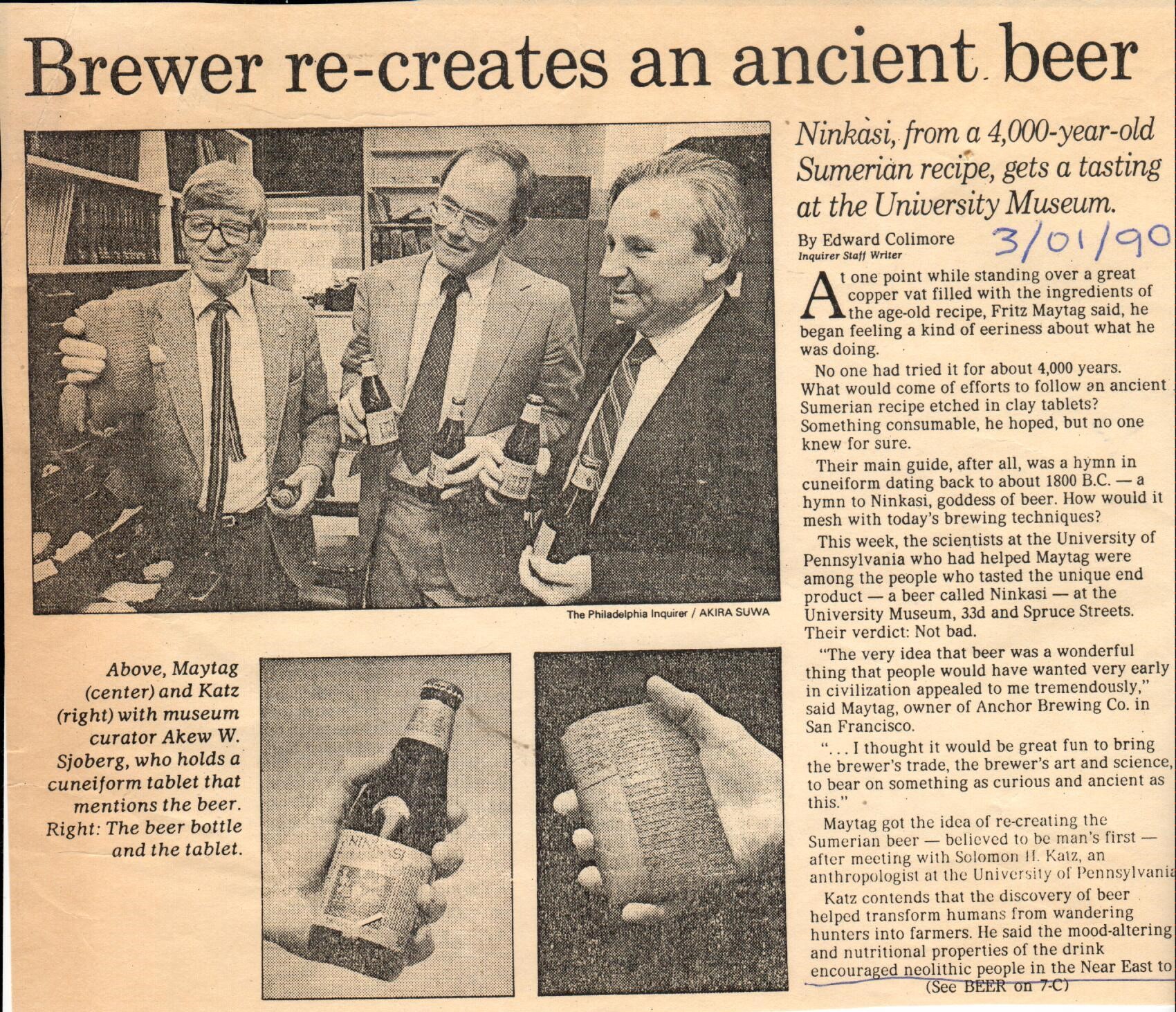
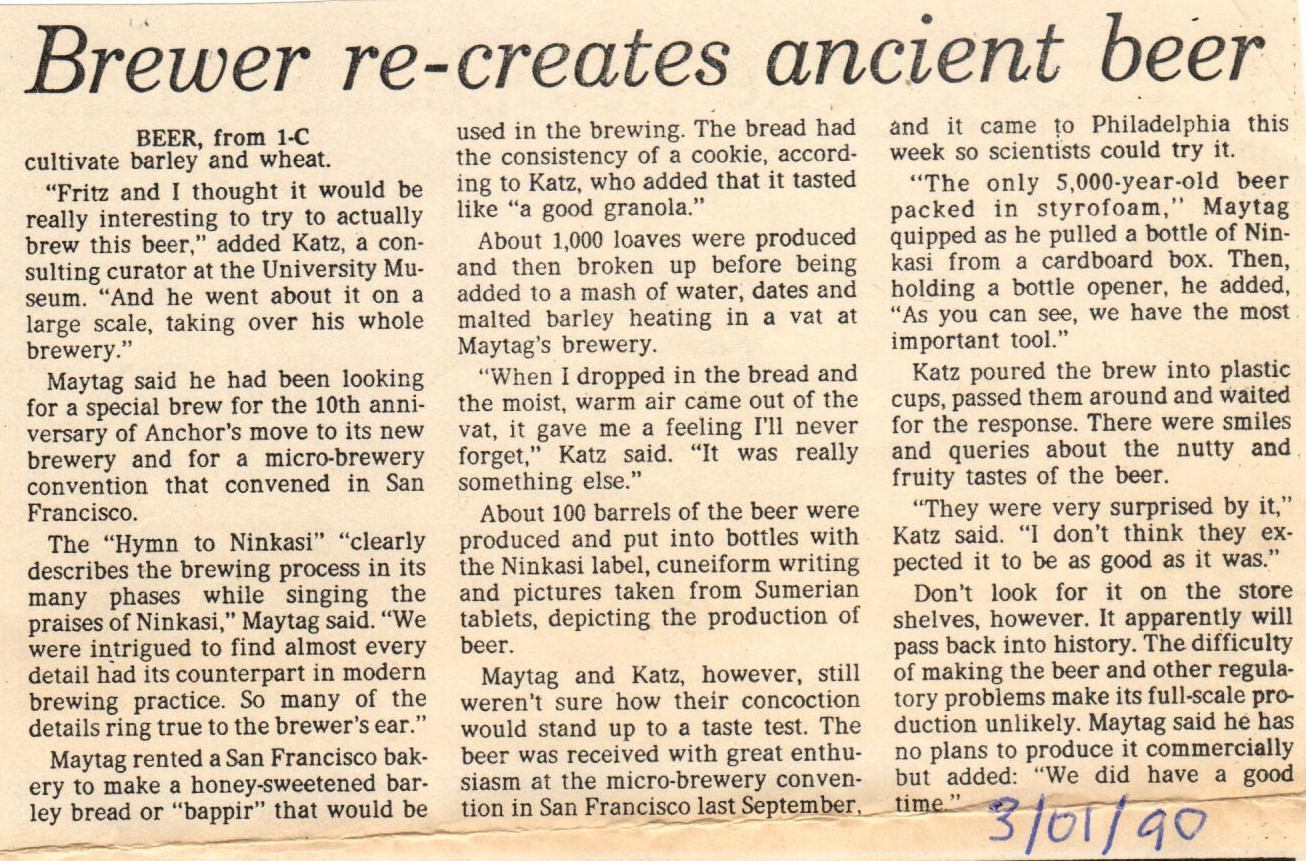
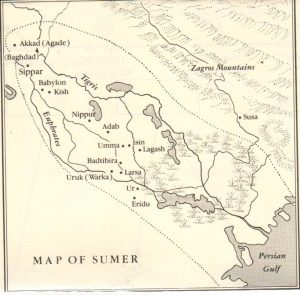
A MAN-MADE WORLD
The tiny city of UR earned its living by extending its commercial operations right down the Persian Gulf into the Indus basin and up the valleys of the Euphrates and Tigris into Anatolia and Kurdistan.
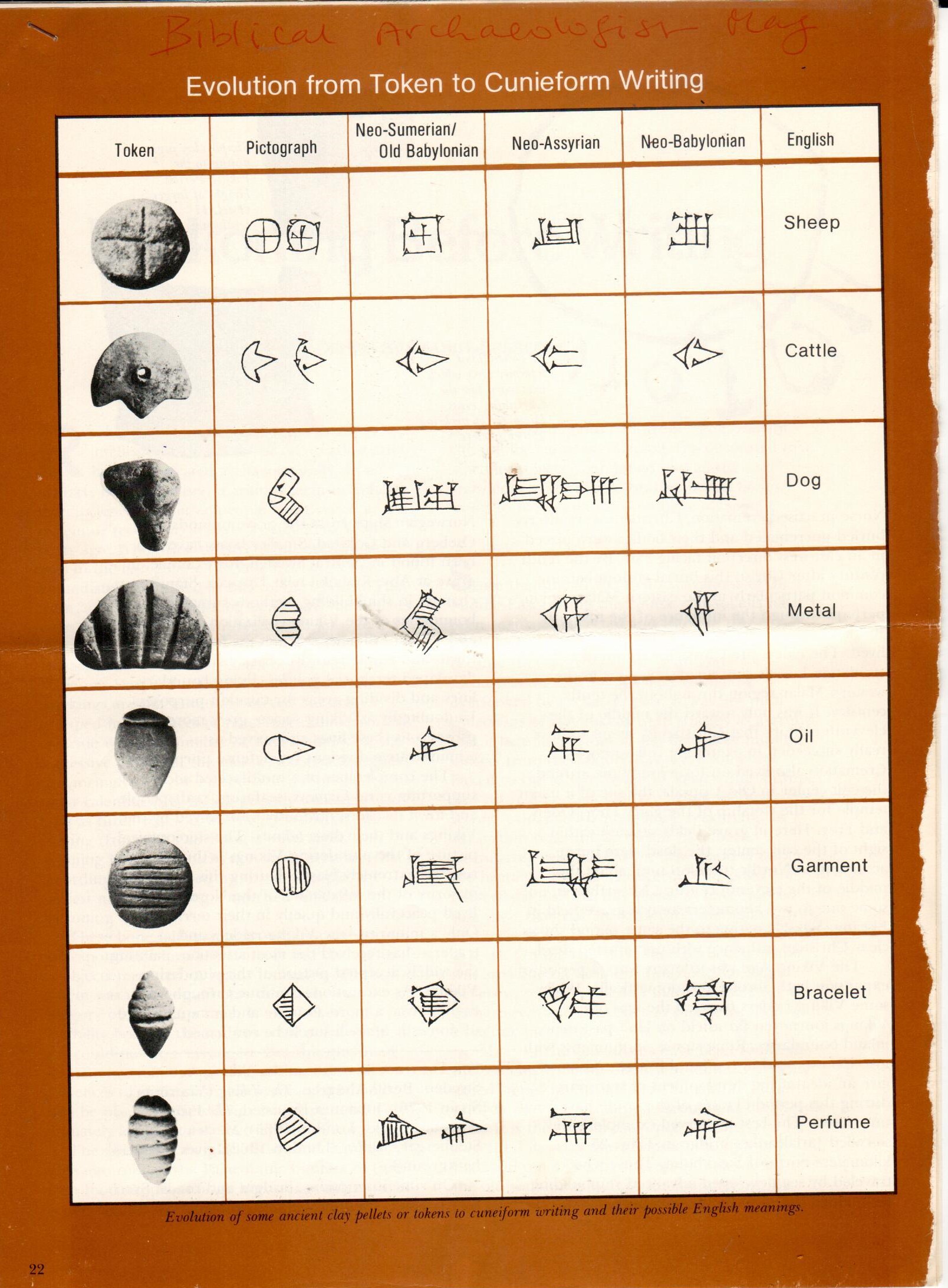
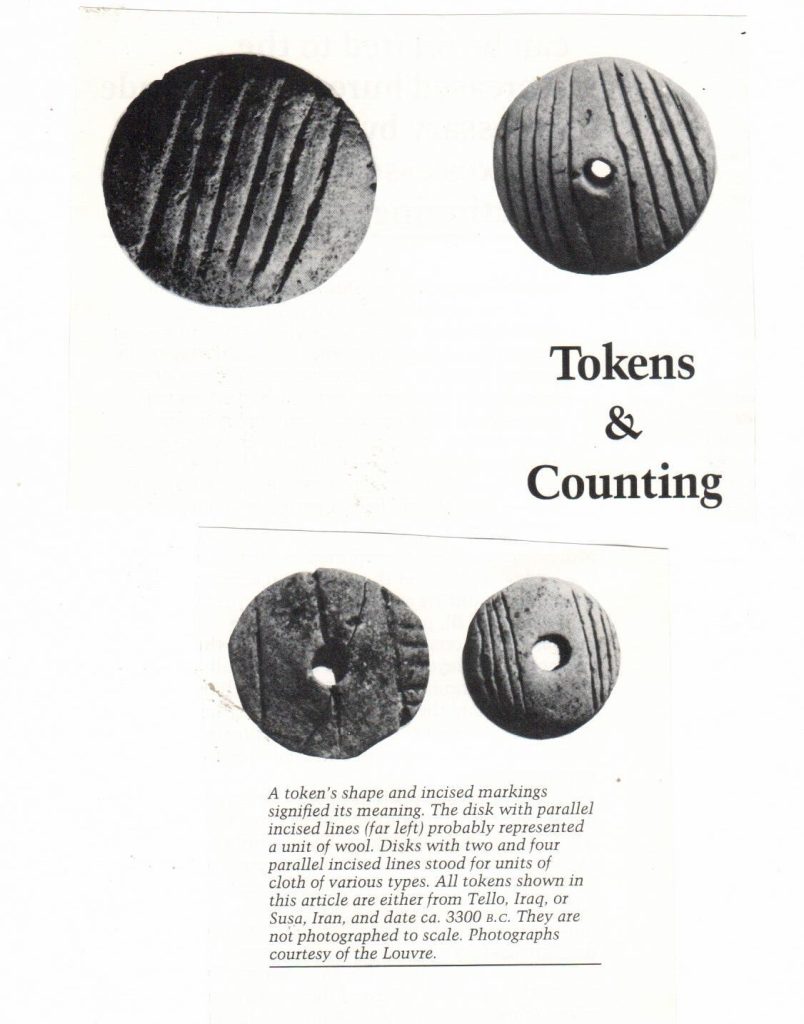
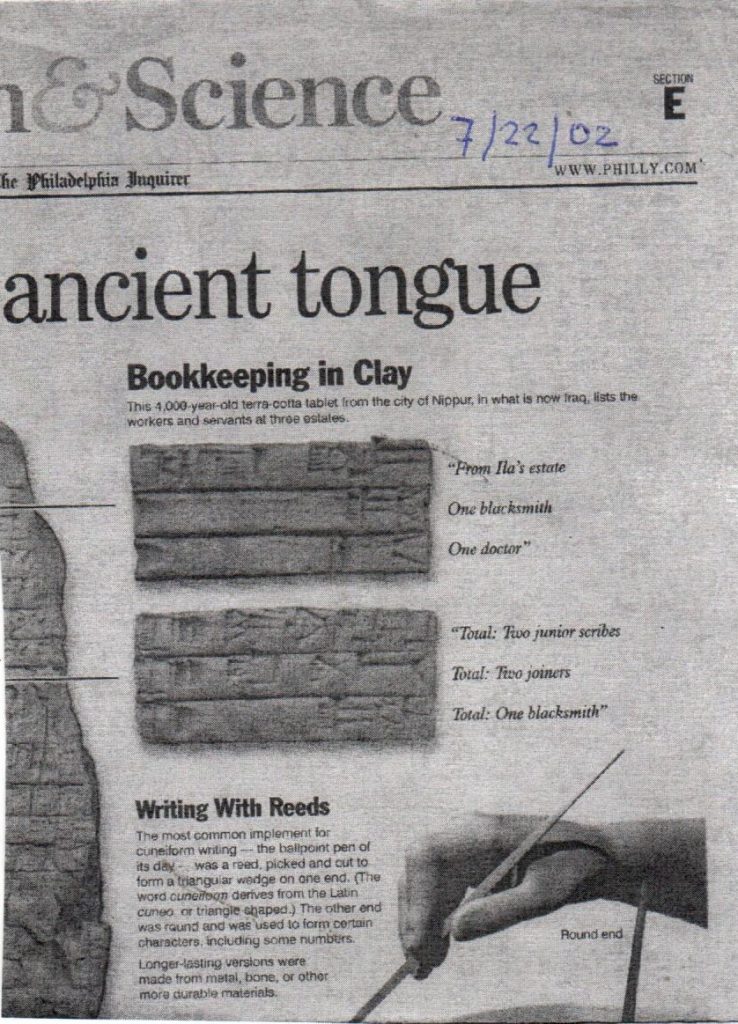
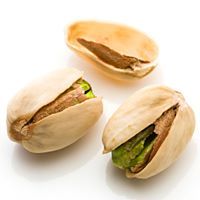
I sat under the pistachio tree near Lucy’s house wondering how to tell her about Bella and Joe’s wedding. Tony was not expected to return soon—so who would give away the bride?
Lucy came with two cups of grape juice, saying we had to celebrate my arrival. After a few sips, she giggled, saying she had heard about the elopement of Jane—it was the talk of Flour Power. I took this opportunity to say that Joe was now free to marry Bella. Lucy clapped her hands, saying we should tell old-nana.
Well, the little woman cackled and said that she had been told by Rasmi her grandson, one of my escorts. I took this opportunity to ask her who would be giving away the bride. Old-nana sat up straight and told Lucy that her great-uncle Marishu would have this honor. He was the first-born son of the clan’s founder, Methuselah. Bella’s father, member of another tribe, had died before Bella saw the light of day. Mother and daughter stayed at the pistachio orchards.
Old-nana asked for grape juice—her throat was dry—so she could tell us about her kin, patriarch Marishu, a real character. Married twice, his first wife had given him five sons. The patriarch settled down on the plain of Kerman where he operated a tanning workshop producing hides for tunics, sandals, travel bags, and lately portable houses called tents. The families lived in tents so they could move around and trade. Patriarch Marishu’s second wife, Nunush, was much younger. Old-nana had not met her but she had heard that Nunush had a nose for trading and was Marishu’s mouthpiece.
After much deliberation between us, grandson Rasmi would deliver a message to Nunush as follows: Joe, son of Adam and Eva of Flour Power, wishes to marry Bella. Tony went to Sumer so Eva was told that patriarch Marishu would have the honor to give away the bride. The parents wish to meet the “father-of-the-bride and his wife” to discuss the wedding. Old-nana can no longer travel to Kerman because of ill-health and wishes that the ceremony be held at the families’ pistachio orchards.
When Lucy told Bella that old-nana was planning her wedding to Joe, she wept for joy. She rushed to see me and we embraced.
Before Rasmi left for Kerman, old-nana put her lips at his ear . . . he beamed!
Less than a full moon later Rasmi returned with Nunush and Rastgu, her only son by patriarch Marishu. Old-nana was in her element, telling us about the old days when she lived with her father and Methuselah; they were sheep and cattle traders.
Rasmi and Rastgu went to Flour Power asking Adam and Joe to join me and make arrangements for the wedding. The meeting of the two families was joyful. Holding Bella’s and Joe’s hands, old-nana sat on the bench underneath Lucy’s pistachio tree. Sitting on grass mats in front of them were Nunush, Rastgu, and Lucy. Adam and I sat facing them.
Rasmi served grape juice. Old-nana cheered, and we toasted.
I had told Adam that Nunush was the mouthpiece of the patriarch and that his youngest son, Rastgu, was witness to the wedding deal-making. So Adam started by saying that, regretfully, Joe’s sister Rose could not come to this meeting but she would attend the wedding. Old-nana cackled when she said that Lucy loved Rose and she was eager to welcome our daughter into her family.
Rasmi came with a jug and went around filling up our cups. A cousin of Bella passed a plate with pita. The deal-making was easy. Bella had inherited from her mother her plot within the orchards. Nunush had agreed that Bella should have an additional plot adjoining the mother’s inheritance as a wedding gift. Adam offered as his gift two rooms at Villa Eva. Joe already owned, together with Neena, the beer-garden brewery.
The wedding day was to be held after two moons. Alex would officiate.
Rasmi served beer from Joe’s brewery. Everyone toasted. The merry-making started . . .
I asked Nunush if I could contribute food for the up-coming feast. She asked Lucy about the menu. We sat down and planned. To make Barb feel special, Lucy suggested that we serve her famous pomegranate-sour cherry spirit punch. I clapped, and gave Lucy two kisses to seal the deal. Nunush laughed. She said that she would provide the assorted meats to be made into stews/gushte at the orchard; her favorite was gushte Hamadan. Lucy would prepare her pomegranate-apple chutney, and a cucumber salad with dill and yogurt. I offered, besides my tutti-frutti cakes, Rose’s Pistachio Cookies and anise cookies, my special fruit compote, as well as several breads: hazelnut, walnut, and almond-cherry. Their final selection was the almond-cherry loaf!
FRUIT COMPOTE: use fruits in season. Cook every fruit separately. Arrange the cooked fruits in a large bowl. Cook the juices with saffron, cumin, anise and rosemary. Cool. Then pour over the fruits in the bowl.
ANISE COOKIES: use the finest wheat flour. Make dough with freshly crushed anise seeds, some water and some oil. Make round cookies; sprinkle with anise seeds. Top with half a red cherry and bake until done.
ALMOND-CHERRY BREAD: soak dried cherries in cherry syrup. Use medium-fine wheat flour and equal amount of medium-fine almond flour for making the dough. Add yeast and then oil. Roll out the dough into thin layer. Take the puffed cherries from syrup and finely chop these. Spread on the dough. Roll up the dough; brush with oil. Bake until done.
Then we planned the guest list:
Nunush said that besides herself and son Rastgu, still single, patriarch Marishu and three older sons and their wives would attend Bella-the-bride’s wedding. Two sons had to stay in Kerman supervising the tanning-shop and their trade-shop in Hamadan. Also to be fed were the slaves carrying tents and household items. Old-nana insisted that fifteen family members living with her, as well as Rasmi, would be included.
Lucy and I agreed to invite Barb, Bill and Neena; Sue and Jack; Nancy and her nieces; stingy Steve, and Alex, boss of Flour Power. Lucy told Nunush to bring three tents for the groom’s guests; she expected the feast to last as long as there was food. She laughed; her belly shook.
Rasmi, Rastgu, Adam and Joe went around the orchard looking for a space to pitch Marishu’s tents. Rasmi would have the area cleared of brush. Nunush suggested that Bella join us at Villa Eva so she could be prepared living with us. I agreed right away, though I worried because Rose and Nancy had not met her before. Then Nunush decided that Rasmi would take her after she and Rastgu had left for Kerman. The happy couple, Bella and Joe, embraced. We parted shaking hands with Rastgu and kissing Nunush, saying we were eager meeting patriarch Marishu. On our way home Adam said that Nunush was a clever woman. Once Bella was with us, we had to guard her virginity. I decided that Bella would join us in our room for private moments. Adam made a face but agreed; our “living room” was unsuitable for a virgin sleeping alone. Wolves were always on the look-out . . .

Well—escorted by Rasmi and Lucy, Bella arrived at Villa Eva. We were waiting indoors, ready to toast her entrance. Beaming, Joe stood at the door with a bouquet of roses to welcome her. Knowing that her brother was smitten with Bella, Rose stood behind him holding a jug with flowers-of-the-field. All flustered, she led Bella inside, followed by Lucy, Joe and Rasmi. We embraced and kissed her. The bride-to-be wore sprigs of pink flowers in her hair. I put the roses in the jar next to my blue-and-white Pistachio Cookie Server on the bench next to the door. Adam gave us cups of ginger-beer laced with fig juice; it was yummy. Soon we laughed, raising our cups. Nancy’s nieces served tutti-frutti cakes and my pistachio cookies. Rasmi had his eyes on the youngest niece; she smiled coyly. The next day we took Bella to meet Nancy. Rose had smoothed the path of introduction between the two women so Nancy welcomed Bella with open arms.
Two moons only for preparing food and drink for the wedding kept us very busy. Nancy asked for two extra helping-hands. She also invited Bella to join her team baking sweets. Bella smiled when she said that she was Nancy’s yavari making shirini; this was her ancestors’ Kerman tongue. She had told Joe that a bride who marries outside the tribe was known as a parvane, meaning butterfly. So, guess what . . . Joe called her Parvane: his very own butterfly! Adam chuckled. I put my lips at his ear saying the word feather-heart. He grinned, took me into his arms, and said that our son had inherited his strong tongue of passion. And that keeping the wolves away, being a shepherd again, was hard work. He couldn’t wait for the bride to be living next door!
Rasmi took many trips with instructions from old-nana to Villa Eva. Lucy also kept us informed through Barb. Joe had engaged two workers helping out making ginger-beer and with the help of Rasmi and his crew dozens of jugs were transported to the orchards. According to Rasmi, the party celebrating counted 37 adults.
The message from old-nana that patriarch Marishu had arrived made my heart beat in my mouth. I had to swallow several times before I could speak. I went to see Pikki-Me and asked for her blessings.

At sunrise Adam, Rasmi and Alex assembled our caravan in the market place. I had asked Barb to do us the honor and place flowers at Pikki-Me’s platform and ask for a safe and blessed trip. I was grateful that she and Bill had given us their hospitality and that she had introduced me to Lucy. Also, Adam had warned me to keep an eye on the green-eyed monster lurking in unexpected places.
After Barb said her prayer and put the garland of flowers at Pikke-Me’s feet, I followed Adam with Rose, Bella, Barb, Neena and Sue. Two workers related to Nancy carried her in a sling net that fishermen use to catch fish with; her nieces were at her side. Behind us the workers carried jugs and travel bags with my PICNIC WEDDING GALA FOOD made two days before: the fruit compotes and almond-cherry breads. The cookies and cakes were already at the orchards as well as baskets loaded with barley bread for the workers, donated by Sue and Jack
Joe, Bill, Jack and Steve made up the tail end of the caravan to make sure nobody stayed behind. The trip to the orchards had been taken so often that everything went smoothly and we arrived quite early, long before sunset. Rasmi had gone ahead to tell old-nana that we were approaching.
So . . . we were welcomed by three dancing women: one played the tambourine, another held clappers while the third woman sang. All smiles, Lucy came to us with open arms and we embraced. Then old-nana cackled shouting Bella’s name.
Old-nana made the introductions with patriarch Marishu beside her—he was even more shriveled-looking than old-nana—and next to him his wife Nunush. The bride was kissed twice. Then it was my turn, and next my entourage. Then Joe was introduced, and Adam and his retinue. The Kerman protocol ended with the patriarch presenting his three sons and their wives: the dancing trio. Sombol/hyacinth, wife of first son, played the tambourine. Lale-abi/anemone was wife of second son and played the castanets. Shekufe/blossom was wife of the fifth son; she sang so beautifully that she was known as Bulbul/nightingale.
Old-nana elbowed Marishu. He clapped—the finale of introducing the two families. Nunush then told Lucy to start serving that wonderful spirit-punch made by Barb. Instantly, some female members went around with cups filled to the brim with her nectar. Rastgu went to Adam and put his mouth at his ear; Adam nodded and went to sit next to patriarch Marishu. They looked each other in the eyes, the patriarch winked at Adam, and then they lifted their cups, shouting hip-hip-hooray! On cue, everyone drank. Some licked their lips and held down their cups to show they needed more. The female servers came with jugs for a refill. And baskets with my tutti-frutti cakes were passed around. Happy faces everywhere.
This was the beginning of the merry-making . . . first the marriage vows had to be observed and the blessing by patriarch Marishu. The dowry arrangement had been witnessed by Rastgu and was valid. So . . . Adam asked Alex to sit with them and old-nana, Bella, and Joe, to perform the ceremony. Alex faced Marishu and asked who would give away the bride. The patriarch responded by saying he was. Old-nana cackled. Alex took Bella’s and Joe’s hands in his hands and pronounced them married. He told the patriarch and old-nana that it was important to have this legally settled because otherwise the bride could be kidnapped and her dowry with her. Adam took hold of old-nana’s hand, saying hungry wolves were always at the door. Nunush nodded. Old-nana elbowed Marishu. Hc clapped.
Rastgu went to talk with Joe. They went to Rose who was chatting with Bulbul. He asked his sister if Rastgu could keep her company during the festivities. Bulbul chirped that they would name her Gole sorx. She was a red rose, the rose of love and passion. Gole sorx blushed; her brother laughed. I felt uneasy, knowing my daughter’s plans for her future; Adam would be upset. I decided to keep an eye on Rastgu and his intentions.
Shaking and clapping their instruments, Sombol and Lale-abi danced. Soon, some of the guests started clapping their hands in rhythm, shouting their approval. Then Nunush and Bella joined the performers. The four women swirled in a circle. Ajib-ajib, Marishu shouted as he and his three sons clapped. Lucy took my hand and pulled me into the circle. In no time Sue, Barb, and Nancy’s nieces also joined the merry-making. We had a great time and the guests as well!
Face flushed and panting, Nunush sat next to her husband. She called out to Lucy that she needed a beer! The patriarch said that he was hungry and would like a bowl of her delicious gushte Anshan. Joe’s ginger-beer and Nunuth’s beef-stew laced with cumin and garlic were served.
I sat next to Sombol and her husband and, as we were eating, I overheard some interesting conversations. That up north in the Kurdistan there was a settlement where the men smelted mountain rocks in huge ovens to get what they called copper. They made and traded copper beads. They also produced from other rocks an ore called tin. They made and traded tin bracelets. That Methuselah had put up roots in Kerman because oak trees grew there abundantly. They made tannic acid from oak-bark to treat the skins and turn into smooth leather. That boar skin was best for making water-bags. That when he was younger, before his marriage to Nunush, patriarch Marishu had gone to Sumer to do some trading. But he decided to involve a middle-man who knew how to navigate the food trail that followed the many rivers cascading from the mountains. This middle-man and his crew made capes from the hides Marishu traded for barley and wheat. Leather capes were in great demand in Sumer.
I took Sombol’s hand and got up, saying we should pass around my anise cookies. Cackling, old-nana took one and said to Nunush that Bulbul must sing a good-night song and we should then go to sleep. She would serve her famous breakfast dish: porridge of barley and chestnut flour, and berries. It sounded yummy.
So . . . Bulbul sang her sweet song. And we clapped. And then we went to our tents. The bridal couple would sleep with old-nana in her room together with Nunush. The virginity test; I giggled silently.
After old-nana’s mouthwatering breakfast, Adam and I sat next to patriarch Marishu. ‘You are here,’ I said, ‘because Tony went to Sumer, hoping to start a pistachio trade at Ur. We can’t wait to hear his story when he returns.’
‘A little birdie told me,’ Adam said with a chuckle in his voice, ‘that you went there. I wonder what your impression was of the peoples in the land of Sumer.’
‘I went there after my second son was born.’ Marishu took a tutti-frutti cake offered by Nunush, who then sat with us. ‘They speak a different tongue. Thankfully, I met a man who could, and he showed me the way to a city called Lagash. Then we walked to Uruk, and from there to Larsa. I didn’t make it to Ur because I ran out of hides. That’s when the man, a merchant, offered to do the trading for me. I accepted.’
‘Adam wants to know,’ Nunush said, ‘your opinion of the peoples that live there.’
Marishu heaved a sigh. ‘All the cities,’ he said, ‘have as their market place a temple, much bigger than the one in Susa. In these temples they worship their god whom they consider as the owner of that city. The god has servants who run his estate and provide food and drink for this ruler.’ Marishu took a bite of tutti-frutti. ‘The peoples worship their gods day and night, and that’s what I did not like. Everyone must work to supply the temple wheat and barley.’ He nodded. ‘The city is the god’s workshop.’
‘You can’t escape the gods,’ Nunush acknowledged. ‘Our merchant has to deal with the temple priests.’
‘I received an invitation’—I looked at Adam, who nodded—‘to work at the temple in Ur.’
‘She would supervise the temple pastry kitchen.’ Adam was all smiles.
‘You are moving to Ur?’ Nunush got up.
‘No way,’ Adam said, pulling me up to leave.
Sombol, Lale-abi, and Bulbul sat with Nancy and old-nana, who had asked them to sing her favorite songs. Eyes shining, she clapped her hands while mouthing the words. I joined Lucy and her grandmother making old-nana’s famous onion/barley soup. I asked what the magic ingredient was; the smell was nostril-exciting. Grandmother showed me a big beef bone, saying the marrow was the magic and two sprigs of rosemary. Barb joined us. After some chit-chatting, she took my elbow, saying she had to tell me something important.
We strolled away while telling me that Lucy had told her that Nunush had told her that son Rastgu would inherit her estate, a considerable tract of land in Hamadan. Barb put her mouth at my ear, saying Rastgu was a catch, and I should know this because her son had set his eyes on Rose. I thanked her for the information.
Without workers there would be no trade—so Alex had told our villagers to mingle with the Kerman workers and get information on what items they wanted. Joe provided them with beer and Jack with sesame pitas. Steve had joined the crew, supervised by number one son, husband of Sombol, making the sheep stew-gushte, saying to me that he missed daughter Wendy making her goat-and-lentil soup; those good old days, he sighed. The bridal couple spent the day in old-nana’s room . . . only joining us for a taste of the wedding spread given in their honor. We left them in peace so they could get to really know each other.
Bill and Alex held talks with son number two, husband of Lale-abi, about the return of Tony and Jim and trade. John would report about beer-brewing in Sumer.
We spent the day eating, drinking beer, and talking. At mid-day we had the onion soup and then my almond-cherry bread. Before sunset our trio danced and sang, entertaining us; Nancy’s nieces joined them. Then the sheep-stew was served with Lucy’s chutney and cucumber salad. Afterwards we had my pistachio cookies!
Patriarch Marishu announced that his party was leaving in the morning. He would provide kebabs for breakfast and Nunush her spicy grape juice. Steve offered his help making the kebabs. Rastgu shook his hand. Old-nana’s family would make the pitas.
So we went to sleep in the tents. Adam put his lips at my ear, saying Joe had told him that Rastgu would join us to Flour Power because he wanted to learn about beer-brewing and start a beer-shop in Hamadan. Joe would teach him. Rastgu would stay with Steve and his wife; they missed the company of their daughter Wendy. I decided not to tell him what Barb had told me that Rastgu had set his eyes on our Rose.
At sunrise Sombol went between the tents shaking her tambourine, shouting to get up and enjoy a merry breakfast. Rastgu and Steve sat next to heaps of pungent kebabs, giving each of us two. Old-nana gave us the pitas and Nunush cups of her merry brew.
We sat in groups, chatting, some making plans to visit each other. The families of Kerman and Flour Power had created food bonds; exchanging family recipes. Nancy told me with a big smile that she had traded our anise cookie recipe for two of their stew recipes.
Hand in hand, Bella and Joe stood next to old-nana under her pistachio tree. They thanked us for their wonderful wedding celebration. They embraced patriarch Marishu and wife Nunush, and the three sons and their wives. Bella gave Bulbul a long hug, promising to meet again. We also embraced the Kerman family. And then Bella and Joe led the way to Flour Power as Lale-abi played her castanets and Sombol shaking her tambourine.

Once home, I made plans, thinking of Rose and her future. At the market place Jack was in his pita shop, so I dropped by for a chat. I asked after son Harry, by now married to Jane. All smiles, he told me that soon he and Sue would become grandparents. I congratulated him. Then I asked if Harry knew Lami, Bela’s son. When Jack said that Lami often came to Harry’s house for a beer and chat, I said that I had something to tell him but that it was very private, a secret, and not even Sue was to know . . . I waved toward the bench underneath the shade trees. He nodded.
So we sat in full view. ‘Jack,’ I started, ‘Rastgu wants to learn beer-brewing because he has his eyes set on Rose.’ I swallowed. ‘Adam knows that the patriarch’s son is a catch. Barb told me that his mother Nunush is a landowner in Hamadan and he’ll inherit her property. So Adam will be happy to give away Rose the bride. But I don’t like it. Jack, I prefer she marries Lami and be near Harry and Jane.’
Jack snickered when he said, ‘So you want me to arrange that Lami visits Flour Power?’
‘Thanks, Jack,’ I said. ‘But please don’t tell Sue. It’s a secret between us. Promise?’
‘Sure, Eva.’ Jack got up, all smiles, and with a wave of his hand returned to his shop
I decided to have a chat with Sue; congratulate her that Jane was with child. Her face shining, Sue told me that Jane was coming home; she knew the village mid-wife and trusted her. Harry would stay in touch and visit often.
Now I could plan: Nunush was a landowner and Rastgu her heir!
I paid Alex a visit at the market place barley-shop. First inquiring after his health, I then asked if he was on good terms with Lami, Bela’s son. He laughed, and said that Lami was “a smart cookie”. I jumped on that word! I said that I wanted to open a cookie-shop in Susa as a wedding investment for my Rose so she had her own property. As I couldn’t be in Susa to run the shop, I needed a trustworthy trader to do so. And I wondered if Lami might be the right person. Alex nodded, saying Lami was an excellent choice.
So Alex and I made a deal. He should keep his lips sealed while negotiating with Lami on my behalf. In return he would get my license to trade Rose’s Pistachio Cookies in Elam. The cookies would be baked in my shops. We sealed the deal sipping honeyed grape juice I had taken along in a jug. We parted with a big embrace and even bigger smiles!

Rasmi showed up at Villa Eva. I wept when he told us that old-nana had joined her ancestors. He and Lucy had put her to rest under Lucy’s pistachio tree. I asked Adam to come with me to pay old-nana my respects. I told the old man to put a rosebush in a sack. Rasmi carrying the sack, we went to the orchards and wondered if this was my last trip.
When Lucy saw us coming up the path to the house she ran towards us. Teary-eyed we embraced; we had a very special bond with matriarch old-nana. Lucy showed Rasmi where to plant the rosebush honoring the memory of old-nana’s ‘pistachio-pita’ and the recipe she gave me. Then Lucy told us the sad news that patriarch Marishu had passed away. And that one of his last wishes had been that son five and wife Bulbul put up roots with Lucy’s family. So Lucy was looking forward having Bulbul live with them. I thought of Bella, who would be over the moon to have a female family member close by. I wanted to know if Rastgu knew that his father had joined their ancestors. Lucy said he knew, but that he was waiting to tell us the news because the first son, his brother, would become patriarch according to tradition but Nunush was contesting this tradition, saying Rastgu was her first son and he should share the position. The news upsetted me, and I pondered if I should inform Alex.
Rasmi offered us grape juice and sesame pitas. I looked at him with new eyes, recalling his interest in Nancy’s youngest niece, Mary. If Rasmi would marry her, then they could set up the shop in Susa with Lami. On the return to Flour Power, I invited him for a beer and chat the next day at Villa Eva.
I went next door and told Rose the wonderful news that Bulbul and husband were to join Lucy at the orchards to put up roots. All smiles, Rose said she would tell Bella and left. So . . . I had a nice chat with Nancy about her nieces; that Rasmi had his eyes on Mary, and that an important resident of Susa was keen on Anne. I put my lips at her ear, saying the girls would get from me a dowry share in a cookie-shop. I put my finger on her lips, and then kissed her. Nancy’s eyes twinkled as she put a finger on her lips, nodding vigorously. Bella and Rose entered. We had a beer and raised our cups to the health of Bulbul and Bella; that they become friends of the heart.
The next day Adam said that he had to talk to Rastgu about Nunush contesting the claim of Sombol’s husband as leader of the clan. So when Rasmi arrived at Villa Eva we sat oudoors chit-chatting on the bench. I decided to speak from the heart and told him about my intentions of opening a pastry-shop in Susa and that I had been looking for a suitable trader to run the shop: my dowry contribution for Nancy’s nieces. That Alex had recommended Lami, son of our tax collector. That Mary, the youngest niece, was thrilled to join Jane and Harry. But Nancy had insisted that Mary must get married before leaving Flour Power. When Rasmi was leaving he was so overcome with joy that he kissed my hands! Adam waited until he was out of sight and then, frowning, asked me what was going on . . .
I gave Adam a cup of beer and asked him to sit next to me on the bench and I would explain. So I told him that Rasmi had his eyes set on Mary; if I would be so kind and put out feelers if Nancy would object. With a chuckle in his voice, Adam said that I was a match-maker. Then he told me that he and Rastgu had made a deal about sending hides to the pistachio orchards and he would trade them. Charlie the sandal-maker had agreed to make capes and skirts for the Sumerian trade. Adam didn’t mention the claim issue so I pressed my lips together; people often had a change of heart.
Out of breath, having run from her garden to Villa Eva, Barb announced that Lucy had told her that Nunush had passed away very unexpectedly. We went next door to find out more from Bella. She asked us to wait at my door. All flushed, Bella told us that Rastgu had already left for Hamadan to claim his estate. Joe was now all by himself running the beer-garden as Neena was often falling asleep on the job. He would look for a helping-hand until John returned from Sumer.
Sue came to tell me that Jane had a baby boy: his name was Jahar, a combination of Jack and Harry. After the next full moon she and Jack would accompany the young family to Susa and help supervise their Pikki-Me shop until Jane was ready again to be Harry’s helping-hand. Jack had asked Bill and Barb to look after his pita-trade; he and Sue would do the same for them when they wanted to visit their Jane. It was a deal made from the heart, benefitting both families.

I was putting a plate of cookies as an offering at our Pikki-Me shrine when Alex joined me. He said that Lami was arriving in a few days and we should meet. I suggested that I would rest on the market bench under the shade trees with a basket next to me. Lami would stroll up, sit next to me in full view, and would start talking. When I wanted Alex to join us I would put the basket on my lap. Alex agreed that it was an excellent suggestion to meet the son of Bela the tax collector at the market place bench; it would stop gossip. I wanted to know exactly what he had told Lami about . . . setting eyes on Rose. As he was leaving, Alex grinned and said that Rose’s mother was looking for a right-hand in Susa to run a cookie-shop; a gift, a daughter’s dowry . . .
Back at home, I sat indoors, pondering about my project of opening a Susa cookie-shop. I had not counted on the death of Nunush, and Rastgu rushing to Hamadan. Perhaps he would stay away for many moons and might set his eyes on a flower of Kerman; those girls were easy on the eye. I was looking at my beautiful Pistachio Cookie Server on the bench next to the door when Adam entered. He told me that he had been with Lucy and Bulbul, talking with her husband; his name was Barakat—meaning blessing. The news about Rastgu was that he had bought brothers one, two, and Barakat their share of the inheritance of Marishu with the proceeds from his mother’s real estate and trading shops. Rastgu was now the wealthiest man in Hamadan. Bulbul had told him that he was setting up a very large brewery. I wanted to know if Rastgu was planning to return to Flour Power. Adam took my hand and we went outside.
We sat on our bench. He put his arm around me and with his lips at my ear said that absence . . . makes a man’s heart grow more passionate . . . he nibbled my ear . . . and breathed ‘How about a private moment?’
Alex came to Villa Eva. He said that Lami would meet me the next day at high noon. So I would recognize him, he’d be holding a pita. Ready for the encounter, I sat in full view with my basket on the bench. I had a sleepless night pondering which direction to take: Rose and her wish to move to Susa and start her eatery, or Adam’s wish that she marry Rastgu. The news that he was setting up a brewery in Hamadan had been a shock. Rose leaving us for Hamadan! A small man in a short leather skirt strolled through Bachban gate and walked to the pita-shop. Munching, he came to the bench and with a nod sat down. One look at Lami, and I knew what to do. Me smiling sweetly we chit-chatted for a while. Then, as I got up, I invited him to Villa Eva, before sunset, and meet my daughter. I walked home with a relieved heart, swinging my basket.
I decided to prep Nancy. I entered Rose’s room and told Nancy that the resident from Susa had arrived and he was coming for dinner. I winked at her when I said that Rasmi would also join us. She should tell Mary and Anne to prepare Bird-broth for eight people and serve us. I told her that Mary should flutter her eyelids at Rasmi, and to tell Anne that the resident had set his eyes on her. When Rose entered, I told her to come for dinner and meet Lami. Rasmi was helping out Joe in the beer-garden serving customers and I invited him for dinner, saying Lami was also invited, and that the nieces would serve us Bird-broth, Adam’s favorite dish.
The scene was set for an outdoor meal. The two wood benches from indoors I put opposite the benches at the door. Mary and Anne stood at the oven tending to the pot, dressed as if attending a festival. Nancy had done a proper job preparing them with an eye to matrimony.
First to arrive was Rasmi, he had changed his tunic, followed on his heels by Adam who went to the girls. He sniffed the air, saying this was his favorite dish, and was it a special event? When Lami arrived, he wore a long skirt and short cape, Rasmi got up from his bench: he towered one head over the Susanian. As Lami was being introduced to Adam, Rose came with a plate of ginger cookies; she had asked Joe for some of his ginger root-flour. One look at Lami and she pressed her lips. Swiftly she joined the girls at the dinner pot.
Adam looked at me. I nodded my head toward Rasmi. He grinned, mouthed the word match-maker, and I smiled. Our guests enjoyed eating the dish. Adam asked Mary and Anne to join us and drink schnapps made by a date trader introduced to him by Rastgu. Gosh, this brew was made for amorous encounters! Because soon, Mary, fluttering her eyelashes, was sitting next to Rasmi, and Anne had her arm around Lami. Rose sat with us, watching them. She said that her eyes were opened when she saw Lami in the flesh. She had expected to meet a younger version of Bela. Giggling, she said that she no longer wanted to move to Susa: NO WAY!
Now my problem was how to tell Rasmi and Lami that the Susa cookie-shop was no longer a deal . . .
When Sue came to tell me that they were leaving for Susa with Jane and Jahar I got my Eureka-moment: Were Bill and Barb taking care of their pita-shop in their absence? When she said they were, I proposed that she engage Rasmi and Lami; their hands were free—no workshops to deal with. Rasmi she knew. Bela was the father of Lami. Sue was all smiles and said she’d tell Jack.
Well, three days later Jack, Sue, Rasmi and Lami met with Alex to properly seal the deal with Bill and Adam as witnesses!
I was so happy that I gave a party, inviting also my co-helper Nancy whose nieces had saved my day. Smiling, Joe and Bella joined us. When our guests had left they asked us to sit down. I knew what they were going to tell Adam and me because Nancy had put her lips at my ear earlier. Of course I had to pretend not knowing that Bella was with child. Adam was over the moon and embraced his son. I hugged Bella, thanking her for giving us our first grandchild. We toasted with cups of Adam’s schnapps.
Two days later Rasmi came to Villa Eva; we were sitting underneath the pistachio tree. He told us that he had heard from Barakat that Rastgu was coming to the orchards. Barakat had to make sure a place was cleared for five tents. Rastgu intended to stay for a while. Bulbul had to prepare the meals. Rasmi said, with a wink at Adam, that Rastgu was looking for a wife. All smiles, he left, with a wave of his hand at Rose and Nancy sitting on the bench in front of their room. I joined them. With a wink at Nancy, I told Rose that Rastgu was coming and that he was looking for a wife. Immediately, my doxtar said that she was not moving to Hamadan: NO WAY! Nancy chuckled. As Rose put her arms around Nancy she said that she had to look after her. Nancy gave me a wink, saying that maybe she might want to move . . .
Rasmi made sure that Rastgu was ‘looking for a wife’; the news became the talk of Flour Power. Out of no-where Doozy the green-eyed monster showed up, saying that as a relative of the boss, she had first claim and had a substantial dowry. The brick-workers spread the word that Rose was their front-runner. Rose . . . just raised her eyebrows and continued working at the bakery, where, of course, our helping-hands rooted for her.
As this drama was playing out at the market place, a man arrived announcing that Tony and his caravan were approaching. Instantly, everyone focused on this news and they were eager to hear the stories the returning village workers would, at sunset, tell about faraway Sumer. Gosh, I was amazed that news spread that fast . . .
Adam had his hands full with running the shops, worrying about Rose’s future and about Tony and Uta’s arrival . . . so he was short-tempered! Bill and Barb were looking forward seeing their John and Jim again. Steve and spouse couldn’t wait seeing their grandchild; before they left Wendy had told them that she was with child. Bella had joined Bulbul for some ‘fresh air’. Joe was glad that John would be back at the beer-garden, though Rasmi was a good worker.

I was sitting underneath my pistachio tree when Nancy called out to me. I got up and joined her, sitting in front of their room. She had her hands folded and smiled. Then she said that Mary, Rasmi’s bride-to-be, had told her in confidence that Bella had gone to see Bulbul to arrange so Rose would marry their Rastgu; though she had said: NO WAY. Nancy put a finger to her mouth and waved at me to come closer. She then said in a low voice that, and this was top secret, Rastgu was planning to offer Joe the chance of setting up a large beer-brewery in Hamadan and that he would become part-owner. Rastgu hoped that Joe would beg his sister to marry him; that was the condition. And that Joe would tell his father and that together they would change Rose’s heart. The deal depended on Rose’s decision. Nancy pulled my head closer and putting her lips at my ear, said that she had advised Rose to be hard to catch—so that when she agreed, the men would believe they had worked hard for this deal. Nancy chuckled winking . . .
I went to sit at the bench next to our door pondering of what Nancy had just confided. When Adam joined me, giving me a cup of ginger-beer, I asked if he recalled Rose saying NO WAY that she’d move to Hamadan. He nodded, took my hand, saying that once Rose was married he could relax. Laughing, he said that being a grandparent was great and he hoped that Rose would follow in Bella’s footsteps. A commotion at Anor gate interrupted our conversation. Adam went to inquire. All flustered, he returned, saying that Tony and Uta had arrived! He took my hand and we rushed to the market place.
When Tony saw us he came holding a woman by her hand. Gleefully, he said, ‘The Sumerian tongue is very difficult to learn by heart.’ He put his arm around the woman. ‘This is Nindoodee. We got married with an official contract in Uruk. The two men next to her’—he pointed —‘are Nindoodee’s uncles Kikakki and Lalulli. They are interested in establishing a trading post.’
The uncles folded their hands as if in prayer; nodding, they smiled broadly. We returned the greeting.
‘Where is Uta?” I wanted to know.
Tony looked over his shoulder. ‘Uta is with John and his parents.’ He turned to face us, and said, ‘Get this . . . John and Uta are engaged!’
Shocked, openmouthed I looked at the couple talking with Barb and Bill. Adam put his arm around me, saying ‘Eva, I know you wanted Rose to marry John, but it looks like John is in love with Uta.’
‘How do you know that I wanted Rose to marry John?’ I was now angry at Uta for having overheard Adam planning.
Adam took my hand. ‘Nancy told me.’ He smiled at Tony and his Sumerian relatives as he said, ‘Tony, please join us at Villa Eva for a ginger beer. We must celebrate.’ He waved at the uncles to follow us.
As we went through Anor gate we met Rose. ‘Doxtar Rose, tell Joe that Tony has returned and we must celebrate. And get this, doxtar . . . Uta is engaged. Rush!’ I walked slowly so the news could spread like fire. By the time we arrived, Bella had put a jug of beer on a bench and the old villager was sweeping. I joined Bella.
‘Tony,’ Adam said, ‘we are happy that you returned safely, but most of all that you came home with Nindoodee your wife.’ He turned to the uncles and, folding his hands, bowed, saying ‘Kikkaki and Lalulli, welcome to Flower Power.’
Bella and I passed cups of ginger beer served on reed trays; each tray, made in Susa, in exchange for five pistachio cookies!
‘Tony,’ Adam said raising his cup, ‘patriarch Marushi would say hip-hip-hooray!’
When Nindoodee shouted hip-hip-hooray we laughed—and toasted.
Then Joe and Rasmi arrived carrying more beer jugs and Lami, Mary and Anne with baskets of pita. Face aglow, Rose came followed by Uta, Jim and Wendy holding a baby boy, as well as John, Bill, Barb, and Steve and his wife.
Hostess Eva decided to look after the well-being of the Sumerian uncles. So I went inside the house and returned with a jug of Barb’s spirit punch. I joined Kikakki and Lalulli and, smiling, waved my hand that they should follow me to the pistachio tree. I pointed at the bench and filled their cups, and then put the jug next to them. I smiled and folded my hands. Then I returned to the party and asked Rasmi to bring them a basket with tutti-frutti cakes.
Tony, John and Jim were the center of attention—everyone eager to hear about their trip and having a good look at Nindoodee. After a while, she sneaked away to join the uncles.
‘Friends,’ Rose said, ‘I have big news!’ She went to Uta who stood next to John, took their hands, saying ‘The big news is that Uta and John are engaged!’
A moment of silent surprise . . . then everyone clapped; some villagers had entered and heard the news.
‘I am Eva’s slave,’ Uta said, ‘and I need her permission to get married.’ Holding hands the couple came to me.
Tony stepped up and said, ‘Eva, congratulations! Uta has been your mouthpiece in Ur and did a wonderful job. I can testify to that, as well as Nindoodee’s relatives. Uta has been like a daughter to you. May I suggest that you adopt her?’
‘Adopt!’ I exclaimed; still angry at Uta.
Tony looked at Rasmi. ‘I have heard that Joe and Bella are perhaps leaving for Hamadan. Will John then take over the beer-garden and Rose join her brother?’ He looked at me, saying in a low voice, ‘Eva . . . who will be running your pastry shop?’
‘Friends,’ Adam said as he stood on a wood bench, ‘come at sunset at the market place. Eva and I will provide food and drink so John can tell us’—he waved at the villagers—‘about beer-brewing in the land of Sumer.’
Everyone clapped; the villagers left. Adam arranged for Tony and his relatives to stay with Bill and Barb. John, Lami, and Rasmi were joining Bella and Joe. Uta would stay with Rose and Nancy. Jim, Wendy and baby moved in with her parents. Before Tony left, he told Adam that by adopting Uta she would have the same rights as Rose. He had heard from a birdie that after his marriage to Rose—he winked vigorously as he raised his brow—Rastgu would sell the pastry shop to Alex . . .
‘NO WAY!’ Adam hissed, red-faced, as we went indoors.
‘Do you want me to adopt her?’ I asked. ‘Nindoodee can help us because Tony said they got married officially. Bulbul told Bella that they use clay tablets and make signs with a sharp reed. The tablet is legal.’ I sat next to him on our bench. ‘Adam, get this . . . no longer shaking hands!’
Still fuming, Adam said as he arose, ‘I’ll have a chat with John before talking with Tony.’ And he left.

I had to take care of the party at the market place at sunset. The villagers always showed up when a party was mentioned. Mary and Anne would serve beer and Rasmi and Lami the pitas.
So I went to see Rose, but she wasn’t home. Nancy sat in a corner fanning herself with a reed fan from Susa. Rose had acquired the item for six tutti-frutti cakes! I sat next to her. ‘Nancy . . . did you tell Adam that I had told you that I wanted Rose to marry John?’ I took her fan. ‘Now, Nancy . . . that was a big lie!’ I fanned myself. ‘Shall I tell Adam the truth?’ Nancy snatched the fan and shouted ‘Leave me alone!’ Tears welled up in her eyes and she hid her face behind the fan; the poor woman was shaking. I got up and stepped outside. To my surprise I nearly collided with Rose and Uta. I nodded, pointed inside mouthing Nancy, and ordered Rose to come with me.
We sat indoors so no one could overhear us. I was very frank with Rose, saying I wanted to retire and had to plan for the future of my pastry shop. And that I had decided to adopt Uta as suggested by Tony. I looked her in the eyes when I said, ‘In case you marry, Rose, and leave Flower Power’—I took her hand—‘Uta will continue my venture.’ I put my arm around her shoulder and, putting my lips at her car, said, ‘Rose, you are free to do what you want . . . just in case, dearest doxtar.’
When Adam returned from his chat with John he put his arms around me and we hugged. He put his lips at my ear, saying ‘Bill, John and Tonyy have a plan. Let’s go inside so no one can hear me.’ As I sat down on our bench, he drew the reed curtain. I wondered what the men had been plotting that it was necessary to be so secretive. Adam lit the oil stand in the center of the room. Then he poured fig-spirit punch in our cups, gave me mine, and sat next to me. He chuckled when he said, ‘The plan is that Tony will tell Alex that Lami, son of Bela, will keep a keen eye on his trading ventures and will report to his father if he notices irregularities.’ Adam elbowed me and laughed. ‘Alex the fox will take his gains before he’s caught with his hands in the cookie jar and will leave as fast as he can.’
‘But . . . who will replace him as boss?’ I was stunned hearing this scheme.
Adam got up and stood in front of me. ‘Bill wants me to take that job!’
Surprised, speechless, I spilled punch on my tunic. Truly tongue-tied, I just stared at my husband. He stared back. I knew I had to say something, so I arose and, holding my cup next to his, said, ‘Boss Adam . . . that’s wonderful news!’ and we clinked cups.
‘Pedar’ Joe shouted, ‘John is waiting for you to show up so he can start his beer story!’

Our shrine was put in the center of the market place facing Kushki gate so the villagers streaming through Bachban had a good view of her platform with their donations of grains, fruits, plants, and flowers.
John stood on a wood bench and on either side: Bill, Alex, Tony and Nindoodee—she preferred to be called Doodee—as well as the uncles. When we, including Joe, Rose and Uta, arrived, Alex invited us to join them. Adam shook hands with John. The villagers clapped their hands and shouted hip-hip-hooray; legacy of patriarch Marishu. John folded his hands and bowed towards the Sumerians.
Then he started his story about beer-brewing. [In Servisia Veritas]
‘We at Flour Power thank our Pikki-Me, magic of life, for looking after us. Now . . . we know HOW TO GROW FOOD.’
The villagers clapped. Alex stepped up. ‘Please, no more handclapping until John has finished his story.’ He waved at John to continue.
‘In Sumer they speak a different tongue. Barley-beer is called KAS.’ He looked at Doodee. She nodded.
‘The people worship likenesses made of wood or stone. Instead of Pikki-Me, they worship NINKASI, the Lady who fills the mouth.’
In a flash, I got it—NIN was the WORD for LADY; that’s why Nindoodee dropped the Nin-word! I wondered about the WORD Doodee.
‘The foods they want most to accumulate are WHEAT and BARLEY. If you have huge piles of grains’—John chuckled—‘you live in clover my mother the gardener would say.’ He looked at me. ‘Eva, you once mentioned to my mother that what you want is plenty of dough.’ He rubbed his thumb and forefinger. ‘My grandmother Neena made us her delicious homebrew and any leftover;--he pointed at her—‘she exchanged for stuff that we kids wanted.’
Neena and Barb shouted hip-hip-hooray!
‘In Sumer, cities have ale bars where the people are served by beer maids. I was impressed seeing two-storey houses. The female beer vendor, called EANISHA, serves customers at the street level shop of her house and lives on the upper floor. They make 19 types of beer using sweet water. For dark sweet beer, the Eashina roasts the barley, grinds it into flour, and then adds a broth made from sweet plants.’ John took a deep breath. ‘When the Eanisha gets her hands on honey-sweetened barley bread from the bakery, she takes chunks, rubs them between her fingers, and adds these fine crumbs to her dark beer. I think my grandmother would be interested trying out this recipe.’ He smiled. ‘At the temple breweries, men make clear bitter beer guided by their brew-master.’ He nodded at Joe. ‘Our ginger-beer would be popular at their numerous festivals where there’s music and dancing—great shows. I can tell you that the temple at Susa is smaller than those in Sumer. And that’s because of the huge piles of grains produced by the people. The grains are stored at these safe, temple places that they consider sacred.
While traveling from place to place, I saw all the canals dug by workers and slaves, and the irrigated garden fields where foods were grown. It was like one huge grass mat, with cattle also grazing.’ He looked up at the star-studded sky. ‘You have to see it . . . to believe it.’
John looked at Lalulli when he said, ‘I asked what they traded, in exchange for their grains, and I was told that what the people needed—and that was wool to make garments.’ He waved his arms. ‘Folk, you should see their huge work-houses where men weave cloth and the work-houses where they make garments in exchange for barley bread and bitter beer, their daily wage.’ He looked at Tony. ‘Do you recall patriarch Marushi trading hides, export, for making leather capes in exchange, import, for Sumerian barley and wheat?’ He chuckled. ‘They traded textiles for timber that they lacked and big stones for making statues.’
John looked at Kikakki when he said, ‘You told me that in the beginning the people at the temple organizing these labors learned by heart about these transactions. But the time came that it was necessary to create a system that could be learned by every person in every place . . . no matter how far away,’—he chuckled—‘and that’s how the scribe saw the light of day and entered Sumer. You came up what is called “a bill of exchange” in writing, making sure there were copies.’
Kikakki laughed and held up the tablet he was holding, saying this was a book-keeping tablet of peoples’ possessions. Ownership in writing, and that included names of witnesses, was necessary so no one could later . . . contest.
Alex stepped up. ‘If anyone has questions to ask John, come forward.’
There was a rush of villagers coming to the platform; they stood in line.
‘Was beer served in cups like at the beer-garden?’ a young man wanted to know; he had applied for apprenticeship making beer at Joe’s.
‘Good question’ John nodded. ‘Their dark sweet beer is sipped from the jug; like our jugs it has a narrow neck with a clay stopper to keep out the bugs attracted by the sweet smell. At the Ale bars, customers use reeds—straws. At the beer-shops people can bring their own pipes, but newcomers use the reeds offered. Our ginger-beer is clear, no reed needed.’
Steve asked: ‘I marinade my kebabs in beer. Do Sumerians also use beer as a marinade?’
John waved at Doodee. ‘Ask Tony’s wife after we are done with questions.’
When Barb’s turn came I knew that John would have a great time. So when she asked about crop cultivation in general, he said, ‘Dear lady, I saw in your garden the same greens growing as in Sumer except for chick-peas, relative of the lentil, with which you make your delicious soup.’ He nodded at his mother. ‘The plant that grows in abundance in Sumer is the date palm. They have date palm plantations that can be seen as far as your eyes can travel.’
One of the villagers, Ordakee, who had been part of Tony’s crew stepped up. ‘What impressed me was that they use boats to transport their goods. My question is: Why don’t we use our river for traveling?’
John looked at Alex. ‘That’s a good question,’ he said. ‘I suggest you discuss this with our boss.’
‘Tony and Ordakee,’ boss Alex said, ‘come with me so we can talk about boat travel.’
Adam put his lips at my ear, saying he was joining the discussion about boat travel so he knew about it when he would take over the boss-job. I said that I would discuss with Kikkaki and Doodee about adopting Uta.
Curious to know about Steve’s question, I joined him, Doodee, Rose, Barb, Mary and Anne. Doodee had learned our tongue from Tony so we had a talkfest about food and beer.
‘Recipes were handed down in families by word of mouth,’ Doodee said. ‘Now we put our recipes on clay tablets—so now everyone can make the dishes our families liked best. Steve’s question about using beer for tenderizing meat . . .’ She smiled. ‘Ninkasi, the lady who fills our mouth, presides over our kitchen called the House of Muhaldim. The cook, called Nuhatimu, meaning the one who makes food with water, also uses beer in making bread.’ She looked at Steve when she said, ‘KAS is barley beer and KAS-GIBIL is freshly brewed beer; sweet beer is KAS-KU-KU; ordinary beer is KAS-GIN and well-aged beer is KAS-LIBIR. As John mentioned, we have 19 kinds of beer. Our beer-vendors experiment with flavors; these beers we consider home-brews. At harvesting of wheat and barley they put up shop near their fields.’
‘Please tell us about those Ale bars.’ Steve laughed.. ‘Are they run by the temple or investors?’
‘By male and .. . .’—Doodee winked at us—‘female investors. Bars became lucrative when musicians and dancers for entertainment were added.’ She sighed. ‘This encouraged’—she cleared her throat—‘prostitution.’
Steve grinned. ‘I’ll tell Jim, my son-in-law, to tell his brother John to tell Joe to consider adding entertainment at his beer-garden..’ Still grinning, Steve left.
Mary and Anne asked Doodee if her scribe uncle could put one of Nancy’s favorite recipes on a tablet; then Barb wanted her famous spirit punch written down as a gift for Wendy. The nieces left, saying they were going to tell Nancy the good news. Barb and Doodee decided to go home, and so Rose and I returned to Villa Eva.
On the way home, Rose told me that Nancy’s sister, mother of Mary and Anne, wanted Nancy to return to their neighborhood so she could look after her. As yet, she had not told Nancy because she wanted my approval. Then Rose laughed, and squeezing my arm, said that she had told her pedar that her modar wanted to retire and that he had told her, Rose gave me an elbow, that finally . . . he got his wife back!
STAY TUNED . . . !
Contact author
Email your feedback about the story to the author at rosecamelia@verizon.net.
August
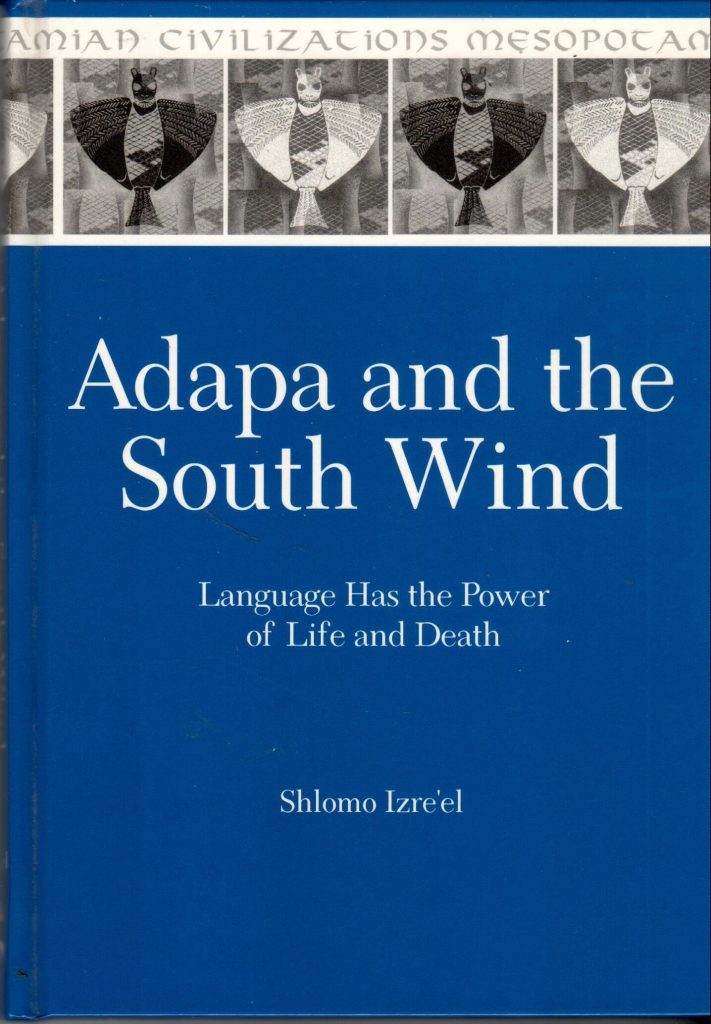
LANGUAGE HAS THE POWER OF ----LIFE AND DEATH
[courts/judges]
WITHOUT LIES --- THERE IS --- NO TRUTH
[in vino veritas]
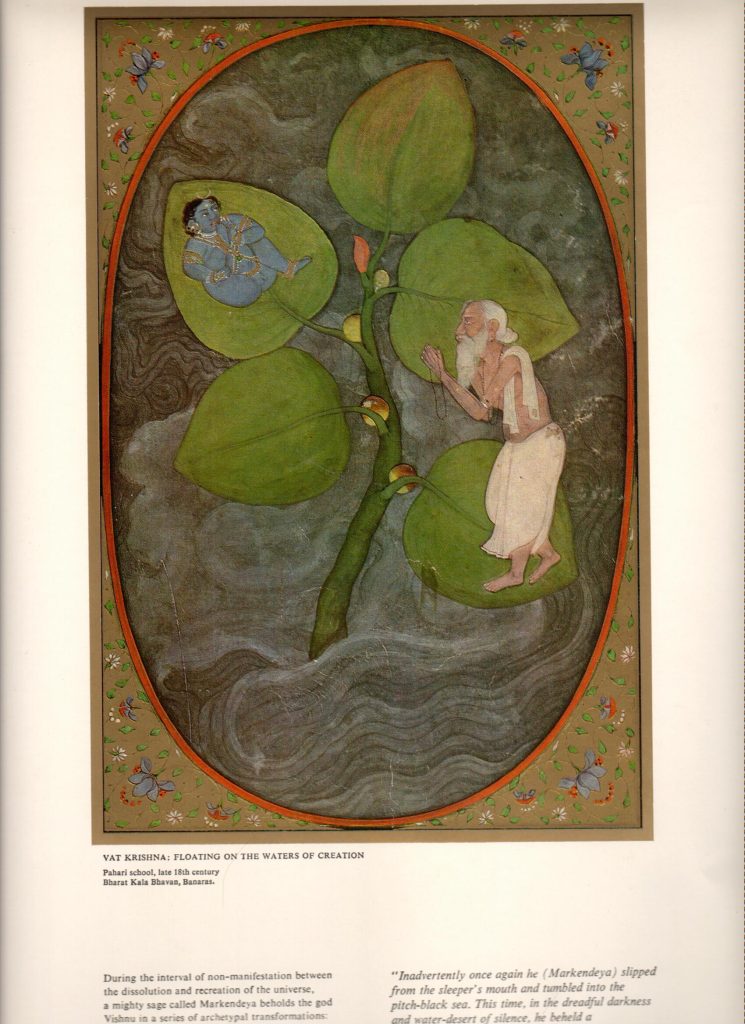
I AM THE SOURCE OF THE UNIVERSE
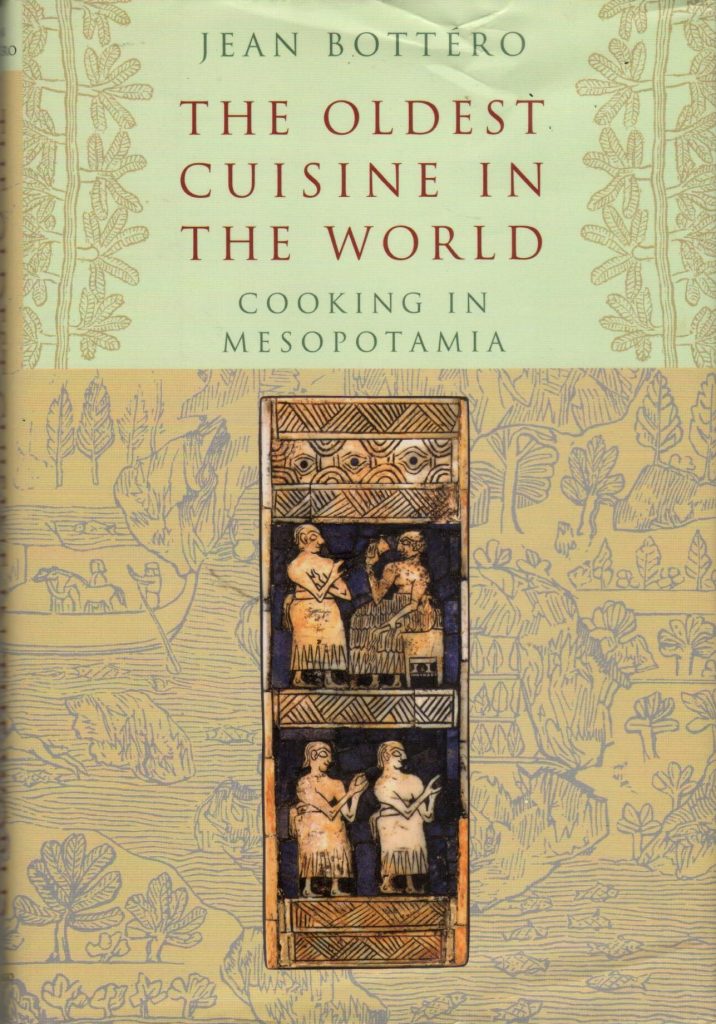
COOKING (in water) IS A CULTURAL PHENOMENON
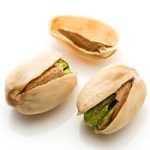
The next day Adam took my hand and said, ‘Eva, let’s sit down.’ So we sat on our bench; I wondered what he had learned from the discussion on rivers and trade. ‘When Rose told me that you are planning to retire, I wanted to surprise you with a gift you deserve.’ He squeezed my fingers. ‘We are going to Ur in Sumer and meet priest Inbatuk. I’ll barter for your famous Rose’s Pistachio Cookies.’
It was as if thunder and lightning had hit me . . . dazed, I just sat there as he continued.
‘Tony and Ordakee told Alex about starting a venture providing transportation by river boats as they do on the River Euphrates. Ordakee’s mother was born in Lagash so he understands their tongue and he’ll get a Sumerian crew teaching the villagers.’
I managed a smile—and nodded.
‘So, first thing this morning, I went to see Tony and Doodee to find out more about travel in Sumer.’ Adam’s eyes lit up when he said, ‘Lalulli then told me that his nephew operates boat trips from Uruk to Ur and back. That’s when I got an inspiration!’ His chest heaved from excitement. ‘Lalulli and I made a package deal: he’ll arrange for us a cruise on the GONDOLA OF HEAVEN and gourmet-chef MATUTU of Uruk will join us and prepare Sumerian Haute Cuisine dishes. And you, Eva, show the chef how to make my favorite Bird-broth.’
I tried to stay calm, so I said softly, ‘Adam, it sounds lovely. But I have nothing to wear for this trip.’
‘Ask Doodee!’ he said cheerfully. ‘Eva, I’ll be busy organizing our trip.’ And whistling, Adam left.
I stared after him—get this . . . whistling! Inflamed by this travel bug, I knew there was no way for me to resist Adam’s enthusiasm.

I had asked Alex, Doodee, Kikakki, John and Uta to meet at Villa Eva. According to Doodee, adoption was a standard written procedure and valid in all of Sumer. Kikakki said he needed four witnesses besides Alex, the village boss. So John got his brother Jim, my Joe, Rasmi and Lami. We watched Kikakki write skillfully—putting words on clay—with his reed-stylus, pen, on moist tablets—two were required—mentioning the names because without them the adoption was invalid. All smiles, the scribe gave me the tablets to be dried in the sun; better yet, baked in the kiln; he nodded at Jim.
Then Kikakki asked me about the marriage contract. When I said that I needed time to prepare the wedding, Uta said that her father couldn’t come to give her away. That’s when Doodee said that a legal tablet was all the couple needed. In Sumer daughters are not handed over by their fathers.
The scribe began to write. The witnesses nodded. Again, two tablets were required. And again Kikakki told Jim tro bake these, so they would last forever. Joe had gone in search for Adam and Rose, and when they arrived, we had a party. Mary and Anne served Adam’s fig-brew. We had a jolly good time, you bet! When John and Uta were leaving, Rose embraced her new sister and I hugged my second doxtar. Adam put his arm around my shoulders and said that life was now perfect; the two sisters would run the bakery . . . and he had his wife back!

Tony came to tell us that he, Doodee and Lalulli were going to see Lucy and Barakat. Lalulli wanted to set up a trading post and discuss this in person.
A pistachio worker came to see Joe. Bella paid me a visit, saying that Joe and Rasmi had gone to see Barakat. I wondered what was going on but decided not to ask about the messenger, having a pretty good picture that it had to do with the brewery in Hamadan. Adam was so busy preparing ‘his trip’ and also to learn more about how to become boss of Flour Power once Alex had left—of his own free will, of course.
Tony and Doodee returned with exciting news. Get this . . . When Lalulli, a widower with two children, saw Lucy, he fell in love. Doodee was their mouthpiece, translating. Lucy liked the Sumerian because he spoke from the heart. She accepted to take care of the kids, welcoming them with open heart. The couple would marry in Flour Power. Kikakki and Alex would draw up the contract. Lucy and Lalulli would join him and Doodee when they returned to Uruk. Gosh, I would miss Lucy and our chats underneath her pistachio tree!
My pretty good picture about the brewery in Hamadan was on the dot. Barakat, mouthpiece of Rastgu, had told Joe that in their tongue they say that one hand washes the other hand and now Joe had to make sure that Rose . . . Well, without much ado, no warning, Bella gave life to a baby boy! Such a commotion . . . Adam whistled louder and Joe joined him; the duet was sheer joy and everyone smiled. Joe asked Bella to name their son. She chose two names: BABR—meaning TIGER, and ASAD—meaning LION. Babr-Asad was presented at Villa Eva and the villagers came to the party: free food and drink!
So when Rastgu arrived—Rasmi and Lami had to move into Sue and Jack’s house—he moved in with Joe, Bella and Babr. John and Uta moved in with Rose, next door! I heard via the grapevine that the plan was that John and Uta might manage the beer-garden. I recalled Nancy advising Rose to play hard to catch—and she took her time!
Anyway, in the meantime the caravan assembled by Ordakee and Kikakki was ready to leave. Get this . . . Tony, Doodee, Lucy and Lalulli were coming along! I had asked Doodee about lady’s garments worn in Sumer. She had told me not to worry, as once in Uruk, her seamstress would make me an Haute Couture wardrobe.
Rose came to see me. I told her that she should accept Rastgu’s offer of marriage. We would celebrate their wedding at Villa Eva after our return.
So Rastgu and Rose showed up asking for our blessing. Adam arranged with Bill to take care of the boss-job until he returned. Excited, Bill and Barb embraced us, informing us that Wendy had named their grandson . . . BILLY!
The villagers waved farewell when our caravan left for Lagash in Sumer.
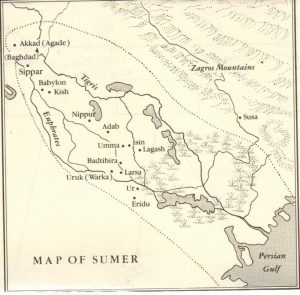
I had been told by my customers from far-away settlements that travel to unknown places opened their eyes. Well, it truly was for me and Adam’s travel bug got under my skin. Ordakee had told Adam that the route from Flour Power to Lagash had become a much-used trail and people had left cold campfires as ‘resting places’. At sunset he stopped at one such place.
Ordakee pitched a tent, provided by Adam of course, for us ladies. As we sat around the campfire, I mentioned to Adam our trip from village Blue Beads, where Vicky was now reigning, to Flour Power and my encounter with that wild mama-boar; and me clinging for dear life to the pistachio tree; and my boar recipe that included pistachios. They laughed, clapping their hands. Kikakki held up his stylus, saying that this pen was his TOOL to write WORDS/MUMMU, stories on a clay tablet now for everyone to know.
Lucy told us about encountering boars in Kerman. Boars like acorns and she, also, fled, flapping her arms to scare them. Tony recalled that when he was a boy how at night he was scared of demons prowling the woods. He would wave a white cloth to keep them away.
Then Ordakee told a story, told to him by his Lagash mother who regularly made the Flour Power—Lagash trip, how she was scared of meeting snakes.
Doodee recounted that when she was a little girl she saw in a ditch a child covered with flies. Maggots and worms were crawling from its flesh. And how she ran home and cried; now knowing what happens when you can no longer breathe. Lucy put an arm around Doodee, crying her eyes out. The men were silent.
Then Kikakki said that in the House of Tablets in Ur, he learned about the story of a MAN called ADAPA, priest of god ENKI, who,—when he had gone fishing in the bitter waters of Eridu [Persian Gulf]—angry that the wind blew so fierce that his boat sank, broke the wing of the South Wind, and cursed him. When AN, the Sky god, heard this, he told Adapa’s father, Enki, god of sweet water, that his son [priest] must come to Heaven where he lives. Kikakki wiped his eyes when he said that this father gave his son advice what to do. When Adapa arrived there were at the Gate of Heaven [two stars] GIZZIDA, Lord of the TREE OF TRUTH and DUMUZI, Lord of the TREE OF LIFE. Adapa followed the advice of his father NOT to EAT the food nor DRINK the water but accept the offer of a garment and oil [symbol of humanity]. So he refused food and drink and accepted the garment and oil. However, what god An had offered was the bread of life and the water of life: eternal life. Kikakki folded his hands, saying father Enki had tricked his son/priest ADAPA: THE MAN. And diseases entered MAN’S MOUTH [the Age of Bacteria]. Man’s suffering on earth began. Man found out the truth: that like the plants they cultivated for food, they also must die.
Doodee nodded. Lord Gizzida asked his wife Geshtinanna, Lady of the VINE: Lady of Healing to help the people. She [Hygia] showed them special plants [sage, mint, rosemary, ect.: a means to dissolve and administer herbal concoctions was WINE] for healing. [Those healing plants—bark of the willow tree/aspirin—are made today synthetically: pills. And European pharmacies used the staff of Asclepius, god of medicine—a staff with a single coiled snake—emblem/advertisement—on their shops. Today: Hygia has been replaced by The Red Cross]

Slaves served us kebabs and pitas. Then we turned in for the night. Someone looked after the fire to keep wild animals away.
The next day we went downhill toward the River Tigris, no longer crossing mountains and rolling hills; the land was flat. Ordakee told us that people had cut down trees for cooking and making wood benches and that’s why the land became parched. So, to grow food, the people dug canals connected with the tributaries of the mighty Tigris and irrigated their fields.
Finally, we arrived at the Tigris. At the dock men offered to take us across by boat. This job took a full day before our party could camp on the other side. We continued travelling. The landscape turned into marsh land with reeds growing abundantly; and water fowl! We ate grilled duck . . . every day! At sunset, while waiting for food being served at our campsite Ordakee told us that in Lagash real estate, the buying and selling of land, was in the hands of women. They knew about the irrigated fields and the water rights. No water—no food, Ordakee said as he pointed at the pitas. However, the herders of cows and goats served milk, and the women made soft cheeses. Sheep wool was bartered for prime wood because their gods were carved out of wood, a living substance. Priests carried these carved deities to the river where they performed a mouth-washing ritual to make them come alive and SPEAK. It was the duty of the priesthood to communicate with the gods and relay messages to the worshipers. Ordakee smiled when he said that the gods were born in heaven and made on earth.
On a clear, star-filled evening around the campfire, while we were listening to the sounds of wild creatures in the distance, Kikakki told us about the Sumerian gods. How Mother Goddess NAMMU gave birth to the first couple: AN, the sky, and KI, the earth. From this union was born ENLIL, god of air [holy trinity]: his wife was Suzianna, and Ninkasi his daughter. ENLIL was the father of NINGIRSU, god of Lagash.
Many moons past, Kikakki said as he smiled at Ordakee, Lagash diverted water from neighboring Umma. Competition for water to grow FOOD resulted in a WAR. Ordakee nodded and said that everyone watches everyone not to steal water from neighbors. Water was precious. I clapped; Ordakee and Lucy shouted hip-hip-hooray!
One sunrise, Ordakee pointed at the sky where large birds were circling, saying we were approaching Lagash. He suggested that Tony and he go ahead and look for a guesthouse in the city. Adam, Lalulli and Kikakki would guard us from the wild beasts and roaming nomads. We settled down underneath a clump of trees; our slaves and workers behind us. I had planned to consult a sooth-sawyer called Abuba, recommended by Alex, and wondered if Ordakee could find him for me. I wanted to know about Chef Matutu and the cooking recipes: Could I include them without creating troubles for my future cookbook?
When the sun settled to retire, the two returned, exhausted. They told us that we couldn’t enter the city because of a riot. The people were fighting about water. It was better to go directly to Uruk. Adam was thrilled; his heart had been pouring out talking every day about the cruise on the GONDOLA OF HEAVEN and Sumer’s most famous chef: Matutu. Smiling coyly, Doodee called him “mister romance”. Needless to say that everyone was curious . . . about the Haute Cuisine of Sumer?
So the following morning our caravan traveled direction Uruk on the River Euphrates. We passed irrigated fields growing LEEKS. Ordakee told us that this was THE GREEN of Lagash. I made a note to ask Chef Matutu for a recipe. The sight of luscious date palms was a feast for the eye, and seeing wave after wave of undulating barley plants made me happy. Sumer was the land of dates and barley-beer! Ordakee told us that at times dust storms devastated their crops. The canals had to be repaired or new ones to be dug; a lot of labor to be organized by priests at their temples.
Ordakee said that we had to cross two more rivers; one a tribute of the Tigris, and then one of the Euphrates. After we had crossed—by boat of course—the last one, we could relax, as Uruk was, so to say, “on the horizon”. We stayed at a guesthouse run by the temple. At sunset, as we sat on the brick-terrace sipping beer, Adam asked Kikakki to tell us about Uruk; and if he knew who had laid the foundation of this famous city.
Kikakki leaned against a small palm tree. ‘According to an ancient tale,’ he began, ‘when our hero Gilgamesh returned to Uruk . . . He had gone on a long and dangerous trip to get hold of the magic plant so man becomes young again at old age, tragedy happened. He wanted to take a bath and put this precious plant on the edge of a well. From the bottom a snake emerged, smelled the fragrance of the plant and ate it. Immediately the snake shed its skin, rejuvenated, and returned to the bottom of the well.’ Kikakki nodded, looking at Adam. ‘To answer your question of who laid the foundation of Uruk . . . Upon his return, Gilgamesh said that seven wise men, seven sages known as APKALLUS, emerged after the great flood that had destroyed all of Sumer. They had the head, arms and feet of humans, but were encased with a fish-garment.’ Kikakki took a deep breath. ‘We have been told that all life came out of the bitter waters. Well, these seven sages laid the foundation of Uruk by teaching the people about civilization, and especially’—he looked at me—‘how to grow seeds and collect fruits for FOOD TO EAT.’
My inside-eye saw Pikki-Me, and I wondered what picture the Sumerians had of how humans were made. ‘Kikakki,’ I said looking at Lucy, ‘can you tell us about how we were made?’
‘I can tell you,’ Doodee said. ‘But first let me fill up your cups with more of this delicious date-flavored beer.’ So we held up our cups for a topper.
‘Kikakki,’ Doodee said, ‘you forgot to tell that after the flood our goddess INANNA threw her colorful necklace into the sky and the rainbow appeared!’ She looked at me. ‘We worship Inanna, goddess of love and desire. But Uruk is the city of sky god An, god of Heaven.’ Doodee giggled. ‘I’ll make it short because we are having steak and I’m hungry!’ She took a sip of beer and then continued. ‘So . . . gods have also to eat. They came to earth looking for food but there wasn’t much. So they had to till the soil, and that’s hard work. One day they decided to make copies [2023: robots] of themselves who would work for them. They killed one of their own gods and then mother goddess mixed his blood with earth to make CLAY. Then mother goddess added the cutup flesh of this god. Then she made from this clay a likeness they named MAN.’ Face aglow, Doodee clapped her hands. A man appeared on the terrace clapping, announcing that food was served.
After enjoying a wonderful meal, we returned to the terrace. Lalulli began to say, ‘Lucy wants to know about goddess Inanna of Uruk. How about’—he looked at me—‘if I tell you her story?’
Everyone clapped. Then Adam ordered a jug of a special brand of spirit-brew recommended by the inn-keeper.
Lucy sat next to Lalulli. In anticipation we sat in silence, holding cups with spirit-brew. Lalulli nodded and began his story. ‘Every year the people witness and participate at a special festival known as the cycle of death and resurrection.’ He took Lucy’s hand. ‘Women wear men’s garments and men wear female outfits. They dance in the streets chanting the URURU: praise to love and desire.’ Lalulli held up his cup. ‘There was plenty of drinking to make merry.’ He laughed and put the cup to his mouth. We did the same.
‘When was this festival of death and resurrection?’ Adam wanted to know.
‘Before . . . ’—Lalulli winked at Adam—‘the sowing season. The people participated at the temple when the Lady of the Granary, the high-priestess of Inanna, her official name is NINEAGAL, Queen of Heaven, staged in the GIGUNU the sacred marriage act with the Lugal/king. Their marriage, witnessed by all, ensured the fecundity and prosperity of the land. Above Inanna’s temple door is her symbol: an eight-pointed star.’
‘And a picture of the copulation act!’ Doodee shouted, getting up, ready to make merry.
Adam put his lips at my ear, saying our room for private moments was our Gigunu. I giggled, tickling his ear.

We were approaching Uruk. The ZIGGURAT loomed ahead. At the top of the platform of the temple—the PARAKKU/Holy House—was within his enclosed room the statue of god An, ruler of sky/heaven. His sanctuary could be reached by stairways. At the foot of this platform was his altar for offerings. The rituals for communication with god An were performed by his priests and had to be upheld. THE COMMANDMENTS—THE ME: The Holy Law of Heaven and Earth. Ordakee had told us that within the walls of Uruk [40 acres] were included the small settlements where greens were grown. About 50.000 people lived here. The walls were erected to protect the city from occasional floods.
We entered through the NIGULLA gate. Doodee had invited us to stay in her house in center city. Lalulli’s house was nearby. Lucy had told us that she was excited meeting his two daughters. Ordakee was Kikakki’s guest. We were to meet again the next day; meeting Chef Matutu was on top of my list. Lalulli would introduce us to his nephew Titimu, owner of the river boat The Gondola of Heaven. Adam’s heart was beating from excitement!
Doodee and Tony’s house had two stories made of whitewashed brick. The courtyard was large. The slaves put the sacks with pistachios in two large store rooms. Tony laughed when he said that this was his private temple for storage and distribution. Then Adam put in a small store room my three boxes with Rose’s Pistachio Cookies to be donated to the temple pastry kitchen in Ur. Also, a sealed box with precious stones he had purchased from Vicky’s parents. Lalulli had told him to pay Titimu for the cruise and the chef with stones, preferably lapis-lazuli, and for our outfits to be made in Uruk. Adam had been adamant that we present ourselves as prosperous folk from Flour Power.
When I entered the large reception room I knew instantly that Tony had married a wealthy lady. In the center of this room stood six high-backed chairs arranged around a round wood table on a woven wool rug. On the wall facing me hung a reed rug. Ceramic bowls were filled with pistachios. On a wood table was a bowl with lilies floating in water. Against another wall, on a long reed chest, were reed baskets with fruits. The window faced the courtyard. Doodee told me that the quarter for workers and slaves as well as the kitchen made up the other rooms facing the courtyard. She showed me a “bathroom” and, oh-gosh, a “lavatory”! We went upstairs; our room had a large wood-framed bed!
So . . . Lalulli came with Titimu. Kikakki and Ordakee joined us. Doodee said that she was going to see Lucy, in case she needed help with running her household. I reminded her to take me to her seamstress.
Titimu took us to the UNUN canal where his boats were anchored. Adam shrieked—there she is!—as he pointed at a 40-feet vessel made of reed bundles. In the center of the Gondola stood a raised platform with a long bench covered in hides. A reed roof shaded the “open cabin”. Titimu pointed at the oxen nearby, saying they would pull the boat to the Euphrates; there, his men would ‘punt the vessel’ all the way to Ur, a 3-day trip. Tony told Titimu that Doodee had a surprise for us, an evening event. Laughing, he turned to us, saying we could leave afterwards. Titimu nodded and said he would notify Chef Matutu accordingly.
When we returned home, Doodee, Lucy and two girls were in the reception room. Lalulli introduced us to his teenage daughters. Knowing about an upcoming event, I asked Doodee to take me to her seamstress. Lucy said she also needed a new dress. Then the girls begged Lalulli to come along.
So . . . we women, as well as Titimu, went to a place called “factory” where thousands of women were at work making cloth. At the entrance was an “office” where the mistress ruled. Titimu told her that whatever we needed should be charged to The House of Titimu. I was in awe when Doodee stold me that the Uruk Elite had established credit houses. The mistress showed us the textiles to choose from: wool, or linen; made from a plant called flax. Elite ladies wore long dresses with the right shoulder uncovered. In the evening they added long shawls. They braided their hair into a pigtail and then bound this braid around their heads. Their head-dress included ribbons or other ornaments. I chose one wool dress and two linen ones; two shawls, one head-dress, and an ivory hair comb! The seamstress told Doodee that the outfits would be delivered the next day. Titimu told me that he would take Adam to get outfitted; he would wear a flounced skirt—KAUNAKE—reaching to his knees, and a long, fringed shawl. On the way home Lucy told me that Doodee invited the TIGI MINSTRELS to play for us, and she wanted me to recite a poem in honor of Inanna with the orchestra playing. Gosh, of course I was pleased, but also scared to perform in public. Adam was excited and encouraged me. So in bed, while he was asleep, I composed a poem, repeating it so often that I learned it by heart. When Adam awoke, I recited my poem. Gosh, he said it was brilliant!
Dressed in our Sumerian finery, we went downstairs to join the invited guests. The event was held in the grand reception room. The chairs and table were removed to make room for the orchestra. A large lyre/harp stood in front of the reed rug with a footstool next to it; and six drums. Facing the musicians, benches were set up for us to sit. I was thrilled when Titimu introduced me to Chef Matutu, a guest; he would tell us after the concert about the Haute Cuisine of Sumer.
When everyone was seated Doodee and Kikakki stood in front of us. Kikakki held up his tablet and, reading, announced: ‘Ladies and gentlemen, we are pleased that The NINEAGAL CHAMBER ORCHESTRA of Uruk will play here. The program is as follows: First composition: “Music of the Spheres” for tigi-drums and flutes. Second composition: “Sir”, a plain-song for the lyre and two lutes/mandolins. Third composition: “Ode to Enki”, one tigi drum, flutes, one lute and the UB-tambourine. Fourth composition: “Dance of Death”, all the drums and one tambourine. Fifth composition: “Morning Hymn”, Lady Eva will recite her poem accompanied by the lyre. Sixth composition: “Wedding Dance”, the UB, the MEZE, the ALA tambourines, and two lutes.’ Kikakki looked up. Doodee said, ‘During the intermission three flute-virtuosi will play popular tunes of Sumer.’
When the musicians filed past us Adam clapped; everyone joined him. Lucy had told me that tigi drums were the most sacred instruments. Drum music had magical power. And indeed, each drum had its own sound and together with the flutes—reed pipes—evoked the morning and evening stars, the IGIGI, eyes of the firmament. The composition Sir made my eyes water; the lyre soloist sang softly as she plucked her lyre with the lute-ladies stroking their instruments. It was a lamentation piece. Ode to Enki was a ballad sung by the performers in honor of god Enki, Lord of sweet water, with the refrain that: water is the source of all life. This composition was followed by mournful drumming and the lone tambourine for the Dance of Death: about Inanna’s sister Ereshkigal, Queen of the Netherworld.
The intermission started with three flute-players and four dancers entertaining us. Refreshments were served. Doodee took me outside; I told her that I had learned my poem by heart, and that Adam liked it, and she shouldn’t worry.
So . . . Doodee held my hand when she introduced me to the audience. The lyre-lady smiled, nodded at me, and started:--‘Oh Inanna-Ishtar, Lady of Heaven,’ I sang with all my heart as she swept her fingers over the strings. ‘Daughter of the Moon, beautiful you are! Oh Joy of Eanna, the House of Heaven! Child of the Night, beloved Morningstar!’ I rejoiced, warbling; hoping that our pearly sounds would reach her. Holding up my arms, I bellowed: ‘Oh Inanna-Ishtar! Queen of Heaven! Shepherdess of the Igigi! benevolent you are! Oh Brilliant One, the Torch of Heaven! Light of all mortals, Oh blessed Morningstar!’
Gosh, you should have heard the curtain-call applause! Adam rushed up, strutting with pride, and took my hand. Then we went to our seats. The Wedding Dance ended the program and was a huge success because the tambourine shakers shook their bellies as well, and the lute-ladies danced along while strumming their instruments.
Doodee, Tony and Kikakki stood at the exit door to thank the guests, still humming the last song, for coming. Titimu asked Doodee permission for Chef Matutu to give a lecture on the Haute Cuisine of Sumer. Well, they were all for it, especially Kikakki, who held up his tablet to take notes. The lecture would be held in the reception room when the chairs and table were put back.
We were 9 adults and 2 teenagers, step-daughters of Lucy, ready for the lecture on
FOOD: THE FUEL OF LIFE.
The six chairs were lined horizontally, interspersed with five benches. And facing us, sitting cross-legged on a cushion on the round table, was Chef Matutu. I giggled silently; Lucy had told me that cooks were highly revered, especially those working at the temple: Eva the pastry chef!
Chef Matutu looked at the teens on the benches and said, ‘Here in Uruk I am not just a NuhatiMU, a gizza—the cook who makes food with WATER—but I have the title CHEF because I serve The Table of the Gods.’ He shook a finger at the oldest who was giggling. ‘At the temple I have my own kitchen—my House of Muhaldim is sacred; it is my sanctuary.’ He looked at me. I smiled. ‘The most important food is MUN/salt. Eating too much salt is bad for you because your head will be hot. And eating not enough salt is as bad; your body will die of starvation. You will return to clay.’ The Chef folded his arms. ‘Cattle, sheep and goats can’t eat meat. They eat wheat and barley. No cooking in water.’ The Chef swept his tongue between his lips. ‘Well . . . when we stopped eating meat every day because the animals had left for greener pastures, we had to look for other food. If a sheep can eat grains . . . why can’t we?’ Matutu raised his brow. ‘So we created the pot that will keep water. And we began to grow the grains for cooking in water. That’s when and why . . . I decided to add salt: the spark of life . . . that is in the blood.’ Matutu unfolded his arms. “You have a question, Kikakki?’
‘I have been told that we trade with Mari up north. They send us timber in exchange for our salt.’ Kikakki held his stylus, ready to write.
Chef Matutu nodded as he smiled. ‘We trade with Eridu in the south for salt. In return they get our wheat and barley.’
‘It’s very expensive,’ the youngest girl piped up.
‘The job of the tax collector is to get food for the temple,’ the Chef replied.
Ordakee laughed.
‘The second most important food is ZU/flour. At my kitchen I not only use flour for making bread and sweets, but also for making sauces with greens like onions, garlic, and leeks.’
I waved my hand. ‘I saw fields of leeks art Lagash. Do you have a recipe?’
‘Ordakee asked for my LEEKS LAGASH recipe, and Kikakki wrote it down,’ the Chef replied. ‘But here it is: wash leeks well and cut in half lengthwise; put in dish with oil, some water, and if you have, pomegranate water to add color. Cook in oven. Add oil, fresh goat cheese and chives. Serve with chunks of beer bread cooked in oil and garlic.’
Doodee clapped. ‘Kikakki, give me a tablet with this recipe!’
Chef Matutu continued. ‘To make a tasty sauce I need SESAME OIL.’
I waved my hand. ‘I use this oil for making my cakes and cookies.’
‘For making sweets I prefer to use butter.’ The Chef smiled as he said this. ‘I make sweets with dates.’ He nodded at Kikakki. ‘Here is my recipe for DATE PETIT FOURS.’ Kikakki nodded at him, ready to write it down. ‘Make barley beer dough. Roll out thin and cut into pieces the size of a large egg, about 12 pieces, and put a date in the center, then fold it. Bake in the oven. Serve with fresh cheese mixed with mashed nuts.’
Everyone looked at Kikakki putting the recipe on his tablet. Gosh, we no longer had to learn by heart!
Chef Matutu continued. ‘Instead of eating kebabs in the morning, we now eat dates, a perfect food that we trade with Nippur. In return they send me figs.’ He looked at Adam. ‘Fig-brew makes people merry, wanting to dance.’ He smiled. ‘Dates and figs are temple foods for our festivals. The priests keep me busy creating new dishes when they add one more festival . . . to keep the people happy and merry.’
‘Our cook says,’ the oldest girl opened her mouth, ‘she can’t cook in the reed pot she keeps for cold foods only. Why, Chef Matutu?’
‘Good question, young woman. Reed pots are cheaper than clay pots and that’s because’—the Chef folded his hands—‘they are lined with beeswax or bitumen that keep the reeds from falling apart. If . . . I put these pots in the oven, the materials will melt. So, young woman, we keep them for cold cooked foods.’
Lucy clapped. Lalulli was all smiles.
I waved my hand, ‘Yes, Lady Eva?’
‘Do you use a special pot when you make your Date Petit Fours?’
‘Indeed!’ Chef Matutu looked pleased. ‘I had to create a new tool. It’s a square ceramic flat plate that holds 12 petit fours. The plate has an ivory handle attached. A wood handle will burn. Now I can take the plate from the oven.’ He looked at Doodee. ‘Tomorrow I have to train some new cooks. I must leave.’ Tony helped Chef Matutu down from his dais.
We bowed, thanked Chef Matutu for his lecture, and we said goodnight to Doodee and Tony.

The important day arrived. Kikakki, Tony, and Ordakee left for Ur, taking along a reed basket with our Sumerian clothes, the 3 boxes with my cookies, and the small box with stones. Adam had settled his account with Titimu who settled with Chef Matutu.
Lalulli took us, Lucy, the teenagers and Doodee to the Euphrates River where our Gondola was waiting. We had been informed that meals would be served on the boat but were being prepared on land by Chef Matutu. Reed boats catch fire easily, Titimu had said.
Oxen and several men were holding the Gondola in place; flowing downstream to Ur, the currents of the Euphrates could be fierce. Titimu and Mutiti, a relative who would be at the rudder, were waiting; as well as our Chef who said that he would serve us his special whoopee-water—PROSECCO GIGUNU—to start our trip on “a high note”.
So we all stepped on board. The girls had been adamant to inspect the river boat. How could Lalulli have refused his daughters? A servant gave us cups, and Chef Matutu poured from a jug his amorous drink . . . bubbles were filling our mouths and soon we were kissing each other. Chef Matutu smiled broadly, pouring more into our cups. Then Titimu announced that we had to depart. Adam and I embraced Doodee, saying we had gained a beloved friend. I was very unhappy to say farewell to Lucy, but then the girls told us that their father had promised to take them and Lucy to Flour Power and the orchards where he was going to establish a trading post. Giggling, they said that they were looking forward meeting boys from Flour Power. Recalling Rose at that age, very persuasive, I knew the girls would arrive.
Adam took me to the platform bench and made sure I was seated comfortably. In front of the boat our Chef had set up a low table with on it two large reed trays with food. Mutiti sat at the rudder, several men holding poles were ready to punt. Titimu shouted, and the oxen moved, guided by experienced men. Adam and I waved at our friends on the river bank. The girls shouted hip-hip-hooray! We laughed, shouting the refrain: HIP-HIP-HOORAY!
A soft breeze cooled our faces as we watched the passing scenery of irrigation canals and the varieties of reeds, pointed out by Matutu when he came with a plate of his date petit fours.. They were, indeed, heavenly delicious! Adam asked for more Prosecco Gigunu. The Chef snickered and I giggled silently. Adam took from his travel bag a reed fan and gave it to me. The Chef served a dish called Gugalgal Salad Kish; recipe—Cook chick peas. Make cold sauce Kish: Mix together oil and sour grape water; add chopped onions, chives and garlic. Add chopped hard-boiled eggs. Add chopped parsley and spinach. Toss. Put chickpeas in dish, pour over the sauce. Do not mix. Serve with pita. I liked the sauce, recipe Chef Matutu had acquired when he visited Kish, a city up north.
Chef Matutu told Mutiti at the rudder that he had to leave and prepare more dishes on land. So the men punted toward the bank; then Matutu waded until he reached ground, where his helping-hands were waiting.
We continued down river; the oxen keeping the boat steady. We watched birdlife between the reeds—waterfowl we didn’t have near Flour Power. Patches with flowers made my heart happy. I’d ask Lucy to bring me seeds. When a servant brought us more food, he told us that our first day on board would be short so that we would enjoy the second day. His Chef had a surprise that day in store for us. Adam got from his travel bag a carnelian bead and told him that his wife wanted to know so she could prepare questions.
The man took the bead and in a low voice said, ‘Chef Matutu has a cousin who lives south of Larsa, on the way to Ur, and this cousin is famous for his garden he calls DILMUN. I have heard that he is the first and top landscaper of Sumer.’ The servant swallowed from agitation. ‘He is known for Gardening in the Shade, written by the scribes of Ur.’ He pulled his earlobe. ‘He grows many shade trees, and between these trees he grows his greens and flowers. His specialty is growing berries. Whatever grows in the land of Sumer, this cousin will try his hands at.’ Adam nodded and wanted to know about the city Larsa. The servant said, ‘Larsa is ruled by UTU, our Sun god. Utu is the brother of Inanna, Queenh of Heaven. They are the children of Moon god NANNA, Lord of Ur.’
‘So,’ Adam said, ‘this Dilmun garden is situated between Larsa and this river?’ The servant nodded ‘And tomorrow we walk in that garden?’ I wanted to know.
The servant nodded again. ‘You will stay overnight in a small guesthouse owned by Chef Matutu and his cousin.’ He got up. ‘I’ll bring you some small dishes I, myself, have prepared, because our Chef will serve you at sunset a special fish dish.’ He smiled and went to the front.
We didn’t have to wait long when a man came to tell us that Mutiti was preparing to land. The servant brought us his “tidbits” and “cocktails”, a refreshing beverage made with citron, mint, and fig water. I licked my lips it was so delicious!
We docked. Chef Matutu was waiting and took us on a path bordered with red flowers to a very nice whitewashed reed house for guests only. To the right was the extensive kitchen; the helping-hands were at the oven. The aroma wafting over made me hungry. Matutu told us to take a nap before returning to the Gondola for our evening meal. We were glad to do so as the sun in the south of Sumer was strong; we were tired, and all those new impressions to digest!
Rested, we boarded and sat on our platform bench; ready to eat a gourmet fish dish. Chef Matutu came on board followed by two servants carrying a very large plate. He pointed, saying that the fish was swimming—he gave a little cackle—in dill sauce. He recited the recipe—FISH ESHNUNNA. Take a large fish, preferably kukunzi, from your pond. Clean inside and outside. Cut in large serving pieces. In pot cook water with onions, leeks, and garlic. Add fish pieces and cook slowly. When done, put on a large dish and add dill sauce as follows: chop 3 handfuls of dill greens. Cook in oil wheat flour. Add dill and milk and cook. Add more dill to taste. Serve with cooked turnips.
A servant appeared with a plate with shiny cooked turnips. Adam smiled from ear to ear; he liked turnips with his Bird-broth. Our Chef served us personally, putting the food on large plates. He then gave us a scoop for ladling the sauce. Gosh, it was out of this universe so good! A great recipe to be included for my upcoming cookbook! With a wink at Adam, Matutu served Prosecco Gigunu.
An old man appeared on board with a lute. He would play for us. And as we sat below the twinkling stars and shining moon, he sang ALLARI: Sumerian Love Songs. Oh, how romantic! Bursting with happiness, his arm around me, Adam gave the man a blue bead! Chef Matutu beamed. I wondered how many beads our Chef would gather from my Adam . . . Oh, well, this was a once in a lifetime trip . . .
We slept well—and eager to visit Dilmun garden, we left the guesthouse. The kitchen workers pointed toward the river—we would have our meal, DUCK UZTUR, on board. As we embarked the Gondola, the aroma of duck welcomed us. I sighed because on the way to Lagash we had duck every day. However, Chef Matutu’s duck stew got from me three stars. He told me to prepare this dish like kippu, but to use only half the amount of arakuku. I didn’t want to tell him that I was unacquainted with kippu and arakuku, so I forgot about them. The next step was to boil water and add the plucked, clean duck without its head and feet. I should add as many greens available in season; to add coriander seeds and cook slowly until done. At the end I should add some oil, some saffron, and freshly chopped lettuces and chives. I should serve this dish with fried bread crumbs and garlic. As I said, this dish got three stars—Adam had a second helping! The home-brew was pomegranate punch; not as good as Barb’s spirit punch, of course!
Chef Matutu asked us to disembark as we would travel in a smaller boat to visit his cousin across; who was waiting to serve us two dishes made in his garden kitchen. The ten men poled/punted the rocking boat steered skillfully by Mutiti; and we stepped on land. We followed our Chef who was telling us what we already knew about gardening in the Shade and Dilmun. We met cousin Ashanti who showed us around his paradise. I praised him for planting the shade trees so the flowers could grow. He and Matutu served the dishes at his kitchen. I wasn’t impressed, so I didn’t ask for the recipes. Chef Matutu, carrying two jugs with berries, said he would prepare a fruit compote for our evening meal.
We returned to the Gondola and relaxed, tired from walking. The servant came with a bowl of sweet water for washing our faces. I asked him for a citron “cocktail”; we sipped while listening to the sound of ducks. Chef Matutu came on board followed by servants carrying our sunset meal. They went to the front and put the dishes on the low table. The Chef inquired if we wanted to drink Adam’s favorite, he winked at me, or perhaps, he pointed at the citron jug? I wanted to know what the main dish was and when he said it was fish, I pointed at the jug. Adam gave thumbs up as he was eating the salted dried fish. I got the recipe for FISH ERIDU. This city is closest to the bitter waters [Persian Gulf]. The people dry the MUN/salt-FISH and exchange it for barley beer. The fish is cooked in a sauce. Here it goes: Cook oil—or better yet, butter, the Chef briefed me—and flour and onions. Add slowly milk and cook. Crush some mustard seeds and caraway seeds and add to sauce. Add pieces of dried fish and cook until soft. Serve with chopped leeks. I thanked our Chef and said that he was a pro at making sauces. My Adam licked his whiskers when he saw food cooked with sauces. The berry-compote that followed the fish dish could not compete with my compote, Adam said. We ended the evening with a jug of . . . you guessed it . . . whoopee-water Gigunu!
The third, last, day arrived. We left our guesthouse in anticipation that at sunset we would arrive in Ur—and Kikakki, Tony, and Ordakee waving. I pinched Adam’s shoulder from excitement. Hand-in-hand we walked the path toward the river. Gosh, our platform bench was decorated with the red flowers blooming in this area! Tears of happiness rolled down my cheeks. Chef Matutu put his mouth at my ear, saying Adam had asked him doing this as a favor. He was honored having had us, a couple from far-away Luristan, as his passengers; it had been a memorable trip for him as well.
Chef Matutu had prepared three dishes, but the one I liked best was SNAILS URUK. Our Chef told me that I must collect snails from a garden-field at sunrise, and not to forget to look beneath the leaves of the plants, like nasturtiums. The snails should be put immediately in water until I wanted to cook them. Recipe: In a large pot put a little water and cook until steams. Then put the snails in the pot and watch until they leave their houses. Then put the flesh-snails in a dish. The sauce: mash handfuls of greens in season and if available fresh green peas as well, and garlic, of course. Add oil and mix well. Add sour grape water and mix. Then add chopped cooked eggs and mashed cumin. Pour this sauce over the flesh-snails and cook in oven. Serve with fresh soft cheeses.
Snails Uruk really was yummy! We sipped my favorite citron drink.
Our Gondola was ‘swimming’ downstream and the ox-drivers on land had their hands full. Reed fields everywhere we looked. Adam wanted to be prepared for our visit so he asked our Chef to give us in a nutshell directions on what to do in Ur.
Chef Matutu began: ‘The fish-market is the largest in Sumer. You’ll see all kinds of fish; from Eridu tasty smoked fish. Don’t enter the slaughterhouse. It stinks!’ His fingers pinched his nose. ‘This large market has areas for carpenters, sellers of cloth, copperware, leather goods, and potters. The market competes with Nippur and Kish.’ He sighed. ‘Our trade route has become a path of war, especially trading salt, in great demand up north. People can’t live without salt.’
‘That’s why,’ I said, recalling what the teenager had said, ‘salt is so expensive.’
Chef Matutu smiled. ‘Lady Eva, our cooks in Ur use a spice called GAZI for their meat dishes. Beware . . . it can burn your mouth.’ He topped our cups with citron drink. ‘I hope that you will meet Babalu, First Chef of the Royal Temple kitchens. We are competitors.’ Matutu laughed. ‘He won a trophy creating a sweet he called FLAN-TUTU. It truly is out of this universe. I tried to copy it. Lady Eva, it is made with milk, eggs, anise seeds, honey and roasted almonds, all cooked in a dish in the oven.’
‘Sounds like a finger-licking treat,’ I said, laughing.
STAY TUNED . . . !!
Email your feedback about the story to the author at rosecamelia@verizon.net.
September
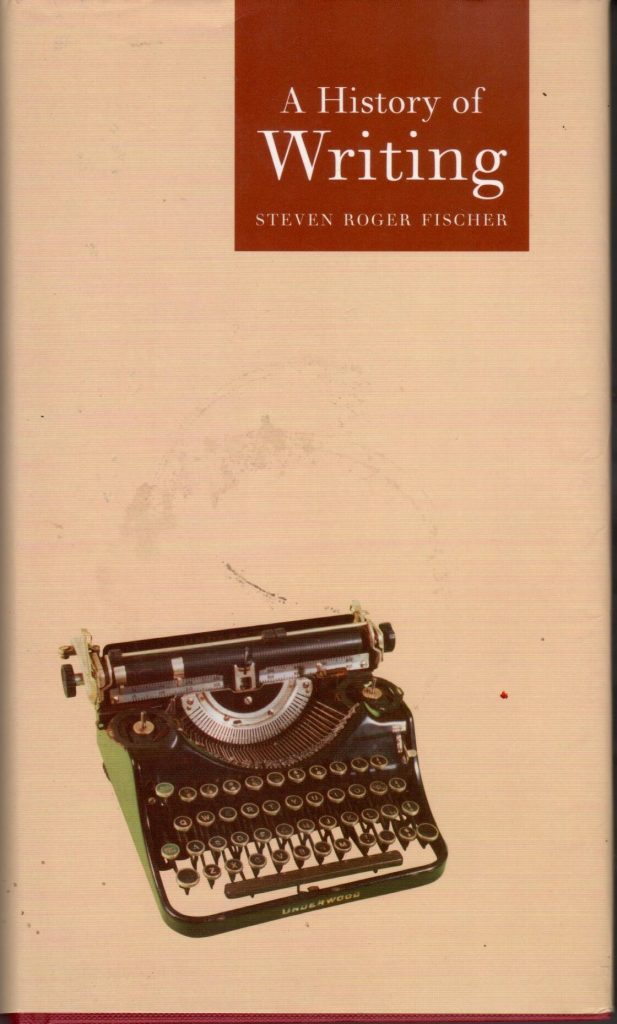
One of humanity’s greatest inventions:
WRITING—the ability to MAKE language VISIBLE—and PERMANENT
And—COMMUNICATE—at—LONG DISTANCES
WRITING IS A CULTURAL PHENOMENON
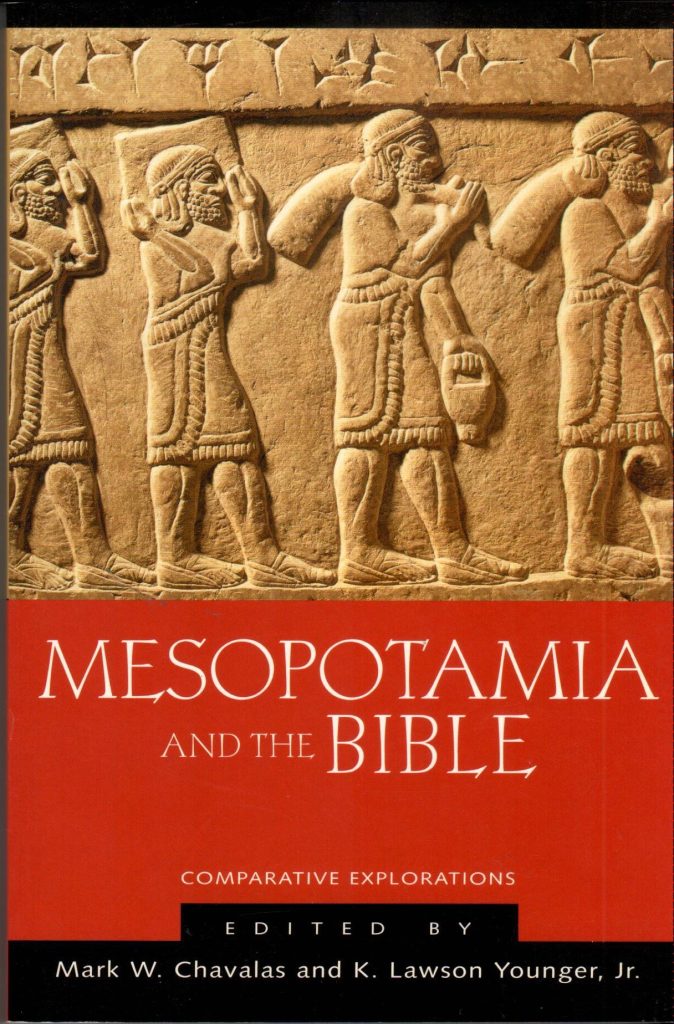

‘Indeed . . .’ our Chef sighed. ‘Babalu also improved popular dishes like TUH’U and TARRU for the slaves who work so hard in the fields collecting wheat and barley. Soldiers are served roasted meats because they have to be well-fed going to war. A punter interrupted him, saying Mutiti was putting up anchor and Matutu had to disembark and start cooking at his kitchen on land. Laughing, our Chef suggested we have a sip of Gigunu whoopee-water and take a nap. Adam also laughed, and said it sounded great, putting his arm around my shoulder.
Adam squeezed me, whispering that our last meal on the Gondola was being served. Rubbing my eyes, the sun was still ablaze . . . I saw Matutu climbing the ladder and stepping on board; his retinue following with the dishes. A bumble-bee honeyed within my heart—I had to swallow hard. To see with the inside-eye the contract for Rose’s Pistachio Cookies—making my picture come true. My destination meeting Priest Inbatuk at the temple in Ur was in sight!
Chef Matutu, his servants and slaves were busy up front. Followed by a slave carrying a blue jug, our Chef came holding two cups. They were gorgeous ceramic ones with a “spout” so drinking was easy. Beaming, Matutu poured us Prosecco Gigunu, saying this brew, his tongue swept between his lips, had been aged for ten moons! We drank heartily; then linking arms with Adam, I shouted ‘Hip-hip-hooray!’ Behind us Mutiti shouted the refrain and from the front the chorus shouted ‘HIP-HIP-HOORAY!’
Chef Matutu said that these cups were his gift, a souvenir to remember the Gondola of Heaven. The cups were made of the finest, thinnest clay, the color of salt. I thanked him profusely, telling him that these cups would be cherished, a wonderful addition to my pottery collection MADE IN MESOPOTAMIA.
Well, as we toasted with Matutu’s special, aged whoopee-water, the aroma of saffron wafted from the front. It whetted our appetite—gosh, our last meal! The Chef came with two oval bowls. He was followed by two helping-hands holding the ears of a large bowl. And behind them, a slave carried a basket. All smiles Chef Matutu said, as he gave us our bowls, that this was his version of: Shellfish Medley Ur served on festivals at the temple. And he ladled some in our bowls. My nose tingled! Recipe: Gather shellfish like marooroo, tamooroo, finoo, and sproozi. Cook quickly in water. In other pot cook oil, wheat flour, onions, garlic, and greens in season. Add the fish water and cook sauce. Add saffron and the flesh of the fish. Mix.
Believe me, this shellfish dish is sensational! Adam’s tongue licked the sauce like a doggie. Chef Matutu reached in the basket and gave us slices of what he called WONDER BREAD, it was fluffy and white as salt. Adam soaked the bread in the sauce. Our Chef filled our bowls. We ate as if we had been starved for days. Overwhelmed, I pulled our Chef close to me and, carried away, kissed his cheek. Matutu swept his tongue between his lips and said, as he looked at Adam, that I could do him a favor and mention his name in my cookbook . . . you bet, I said with a nod.
Adam suggested that we take a nap after this sumptuous meal. Matutu said that he would disembark with us but his crew would stay on land. He would let us know when Ur was in sight

Hip-hip-hooray, I whispered when the ziggurat of Ur loomed ahead. The oxen were pulling, and the punters worked their poles to keep the Gondola from rushing downstream. Chef Matutu stood in front signaling with his hands directions for Mutiti at the rudder. His chest heaving, Adam took my hand, saying he saw the dock with people standing to welcome the Gondola of Heaven. Slowly the boat glided toward the dock. Someone threw a rope and one of the punters who had joined the Chef caught it, holding on to it for dear life.
‘Hip-hip-hooray!’ Tony shouted, waving; next to him were Kikakki and Ordakee.
We stepped down the ladder on to the dock. There were lots of smiles and hand-shaking, and a big hug between Tony and me.
Adam took Kikakki aside and told him to give Chef Matutu a gift of precious stones. After much give-and-take between them, our Chef was to get two amber-beads, stones from a far-away country, two lapis-lazuli beads and two carnelian beads. Kikakki said that this was more than enough.
We said goodbye to Chef Matutu. And then we went to the guesthouse Tony had rented. We had two days for ourselves until our appointment with Priest Inbatuk. We went to bed early. Ordakee had arranged for us a morning visit to the Royal and Temple kitchens.
The temple district was huge! Besides the shrine of god Nanna there were the stables, treasury, houses, and kitchens. But the most important building was the Granary: store rooms for their SURPLUS—FOOD: the grains wheat and barley. Kikakki said that control of the food supply meant power. Palace economy depended on FOOD AND LABOR. Adam wanted to know what would happen if the workers, god Nanna forbid . . . were to die? Our scribe replied that the ruler and the elite would raid another city for slaves; because if they would not, the city of Ur would no longer exist. Tony snickered: ‘No slaves, no state.’
Ordakee took us to the main kitchen where he introduced us to Chef Babalu. My head was spinning when we went from one kitchen to another kitchen. Each kitchen cooked different foods; one only made bread; another sweets, and they had a special kitchen for making sauces. We were introduced to the head chef of the kitchen where kebabs and roasted meats were prepared for the priesthood and the aristocracy.
Then Chef Babalu asked me if I wanted to look at their precious Temple ceramics for ceremonial meals. Gosh, how lucky I was to visit this ‘museum”. All the dishes had pedestals—so everyone could have a good look at the food. There were also large drinking cups with scoops, and fruit vases. With pride, Chef Babalu showed me jugs with handles/ears and spouts. One jug caught my eye because it was the color of salt and shined like the pearl beads I had seen in a shop. He told me that this jug was the work of a famous artisan, and was very valuable. Adam whispered to me he was glad that he had not been stingy when he gifted Chef Matutu all those precious stones.
Ordakee told Chef Babalu that we had an appointment to visit the EDUBA, the Tablet House. So we left.
Kikakki guided us to the Writing School. He introduced us to the UMMIA, headmaster; who told us that goddess NIDABA was in charge of writing and the scribe NABU—he who wields the reed-pen—was secretary of the gods. And that Nippur, owned by god Enlil/air, was the home of the Scribal Academy-Library. The headmaster explained that his school trained scribes; the fees were stiff; his students came from the elite families. The ability to write and read was a highly respected profession, he said, nodding. The temple’s economic administration depended on written accounts: business accounts, and monthly statements of the merchants of Ur. With a wink at Kikakki, the Ummia quoted a Sumerian proverb: Who has not supported a wife or child has not borne a leash . . . We laughed. I then told the Ummia that I collected recipes of the Haute Cuisine of Sumer and asked, jokingly, if he could write them down for posterity: ‘First Cookbook of Our Universe’ would be the title. The headmaster laughed and replied that nothing was impossible . . .
On the way to the guesthouse I recalled Doodee saying that in Sumer daughters were not handed over by their fathers when they got married. Women had legal rights. And before we entered Uruk, she had told me that even after a divorce the wife could hold property in her own name and engage in business. Doodee had nudged me, and then had asked me with a wink: ‘Who owns and operates the Rose Bakery in Flour Power? And who was asked the honor of supervising the Royal bakery in Ur? It was you, Eva!’ She told me that material goods were the foundation of wealth and happiness of Sumerian civilized ways of life. I should be very careful when—making the contract; independence is independence, she had said. Well, as we were walking, I told Adam what Doodee had advised me. He took my hand, saying what Doodee had told me was very interesting.
We arrived at our guesthouse. In a corner of the courtyard a group of servants huddled, agitated, watching a man perform something. Ordakee said, holding my arm . . . that we should wait—a MASHMASH/exorcist was busy doing his job. As we waited, Kikakki said in a low voice that several temple servants and slaves had lately died.
Ordakee returned and told us that a faithful servant had fallen ill and the AZU/physician had said that this servant was on the doorstep of entering the netherworld. PAZUZU, the dangerous demon, had entered the man’s soul and body, and he was struggling with Pazuzu for life and death. The tongue of the vicious serpent-dragon MUSHMUSH was consuming him; fire swept his body with fever and pain. Kikakki said that only the mashmash could help him because he had the formula for protection and make the proper amulet.
Adam wanted to watch the mashmash; so we had a look. The sick man was gasping for air. To my horror he was infested with bugs! Kikakki shook his head, saying fleas were a nuisance. Later, before sunset, Ordakee told us that the poor man had died. I sobbed quietly, not wanting to be scolded by Adam; having once been visited in Flour Power, before our trip, by Pazuzu . . . such a horrible picture!

We wore our best Sumerian outfits for our morning audience with Priest Inbatuk at his temple office. Adam had asked Ordakee to come along in case we had difficulty communicating, but Tony said that he and Ordakee had an appointment with a merchant. Kikakki should join us—adapt at hearing other tongues, he had mastered ‘Luristani’. And so we went with six slaves carrying the 3 boxes with Rose’s Pistachio Cookies. My heart was in my mouth and I told Adam that I’d rather wait at the market. Kikakki took my hands, saying Priest Inbatuk was a highly skilled administrator, and it was an honor to meet him.
Well, Priest Inbatuk turned out to be a most wonderful host! I sat next to him, and he, personally, gave me a cup of temple-brew. After a few sips I relaxed. Adam had a lot of questions, especially about his job. And the Priest replied—Kikakki whispering his words into Luristani.
THAT . . . looking after the welfare of the gods was his first, main duty; then the running of the Temple Lands. Land was coveted; a landowner was a “somebody”.
That . . . half of these lands (50%) belonged to private citizens—whose ancestors had founded Ur. That these lands could be sold and traded; but the transactions had to be recorded at the temple.
That . . . the remaining (50%) land could not be sold as half of which (25%) was property—NIGENNA—of god Nanna; to provide for his upkeep. Payment for services called KURRA included using this land for growing grains. URULAL was land worked by individuals for a share of the crop: supplement of income.
That . . . the remaining (25%) land belonged to the nobility: the King and his family, priests, the high administrators, and ministers. These lands were worked by servants and slaves.
Adam said that it was a fifty-fifty deal; fifty for regular people, and fifty for the god, the king and people running the temple precincts. Kiakki nodded.
Priest Inbatuk continued: That . . . because the temple lands did not produce enough income, it was supplemented by other means, like deeds of sale; building and selling houses; transfer of fields; cattle ownership—whatever was traded—and for making wills, marriage contracts, and loans/with interest.
Priest Inbatuk asked Kikakki to have the contract for the cookies drawn up at the Eduba, the Tablet House. The baking of the cookies would be done outside the temple grounds. A shop, rent-free, for selling the cookies, would be set up near the shrine so that the worshippers could buy them as offerings for god Nanna. Half of the proceeds, sold by servants working for free, would be temple income. Priest Inbatuk told Kikakki to bring along the witnesses. As he was leaving, Kikakki told the slaves waiting at the entrance with the 3 boxes to bring them to Adam. Gesturing at the boxes, he told the slaves to take them to me, saying that I was the owner of Rose’s Bakery.
Priest Inbatuk nodded as he said that, indeed, women in Sumer had equal rights and were excellent merchants, providing much needed income for his temple. Then he asked for our seals. Alex had given us the Flour Power seal and I had my rose-bud seal. Adam showed the Priest his lapis-lazuli seal: a circle with 3 dots; explaining that this symbolized wife and two children. The Priest smiled.
Then Adam asked Priest Inbatuk if he could draw up a marriage contract for us, because in Flour Power writing did not exist; all contracts were finalized with a hand-shake. He said, looking the Priest in the eyes, ‘I have to keep the wolves away.’ The Priest understood the message, and laughing, said it would be free of charge: his gift. He explained that marriage was a legal contract with the dowry of the wife specified and returned to the wife if she were to be divorced, plus compensation. If the wife divorced the husband, she forfeited her dowry and she had to pay him compensation as well. A husband could take a second wife if no children were born. That divorce was easy. However, she could hold property in her own name, engage in business and qualify as a witness. Affixed to this contract, twice each, were the names of the witnesses: 8 males, 2 females, the scribe, and the notary.
Kikakki arrived with the Ummia and the witnesses. The headmaster greeted me with a broad smile, saying he had enjoyed drawing up the cookie contract. So . . . Priest Inbatuk and I signed with our seals the two tablets for Rose’s Pistachio Cookies. Kikakki was my special witness. Then, to everyone’s surprise, Priest Inbatuk told the Ummia to draw up a Marriage Contract between Adam and Eva, because the cookie contract was a Sumerian contract and that without a Marriage Contract, Adam could not inherit automatically my business.
Adam then asked the headmaster if he could include a special message for his wife. The headmaster nodded and took a tablet and held his pen up. Adam dictated: ‘Eva, marriage is a trip on the Gondola of Heaven and not some business troth. I love you, forever yours, Adam.’
Priest Inbatuk, Kikakki and the Ummia smiled from ear to ear. Then I said to the Ummia: ‘Can you add my reply?’ He nodded, his tongue swept between his lips. ‘I’m waiting.’
‘Adam, I agree with all my heart. Yours forever, your feather-heart.’
They clapped!
Then I went to the Ummia and asked him to write down for posterity’s sake my SECRET COOKIE RECIPE; and putting my lips to his ear, I asked to add a postscript: My thanks are for Chef Matutu of Uruk cooking Sumerian Haute Cuisine dishes for us on the cruise boat The Gondola of Heaven. And to future cooks:—Please, take the ancient recipes with a grain of salt! The headmaster snickered, nodded, and left; the witnesses stayed.
Well, Priest Inbatuk served Kikakki, Adam and me a light luncheon on the terrace of his office. By the time we were having dessert, the Ummia returned with the tablets. We duly signed them. One tablet with the recipe . . . I gave to Priest Inbatuk, saying that it was my gift for having the honor of meeting him.
Before departing for Flour Power, I want to thank from the bottom of my heart my readers for ‘listening’ to our story—STONE AGE CUISINE.
ROSE’S PISTACHIO COOKIES
Cook lots of dark-red cherries, covered in water, until the liquid is very thick
Roast and grind the pistachio-nuts; make a very fine “meal”/paste
Mix this meal with the finest, whitest, wheat flour
Add the cherry liquid and some quality butter or oil
Let this dough rest for some time so the liquid is absorbed by the flour
Make round cookies as thin as possible
Before baking the cookies—stamp lightly with my rosebud-seal
Bake in oven; but not until done—take three very green pistachios and put in the center of each cookie; and return to oven to finish baking
The cookies look very pretty, they are UNIQUE—a beautiful pink color and decorated with three green nuts.
BON APPETIT !
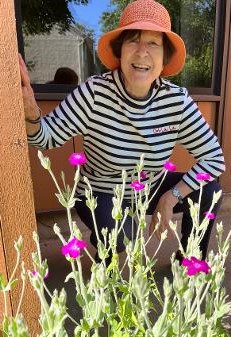
CAMELIA-OLGA: May, 2023
ROSE CAMPION [LYCHNIS]
Since 1990, Rose Campion has flourished in my garden
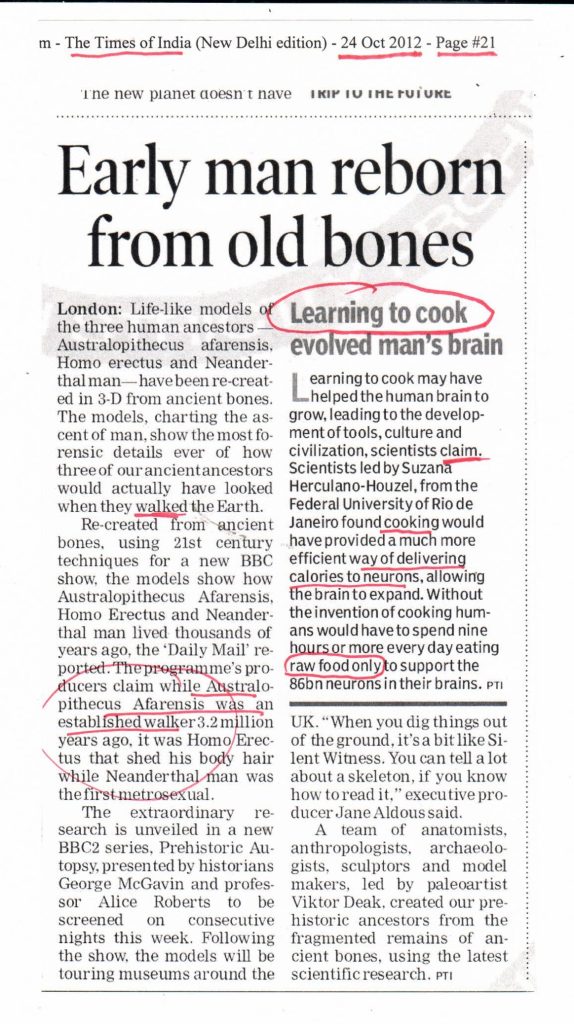
WE ARE COOKIVORES
THE POTATO
SOLANUM TUBEROSUM
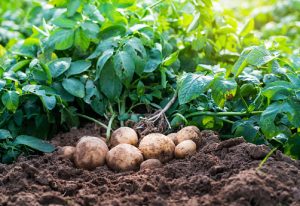
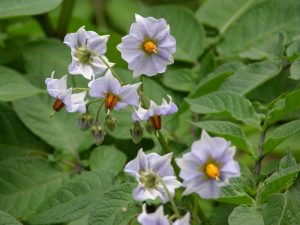
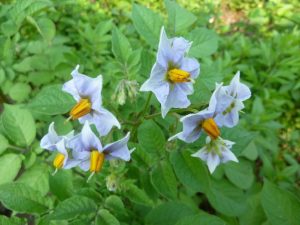
POTATO FLOWERS
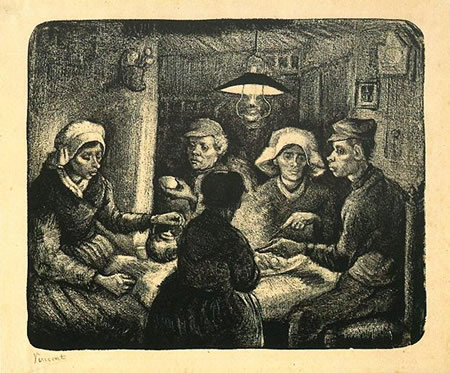
THE POTATO EATERS byVan Gogh

PERU--BOLIVIA
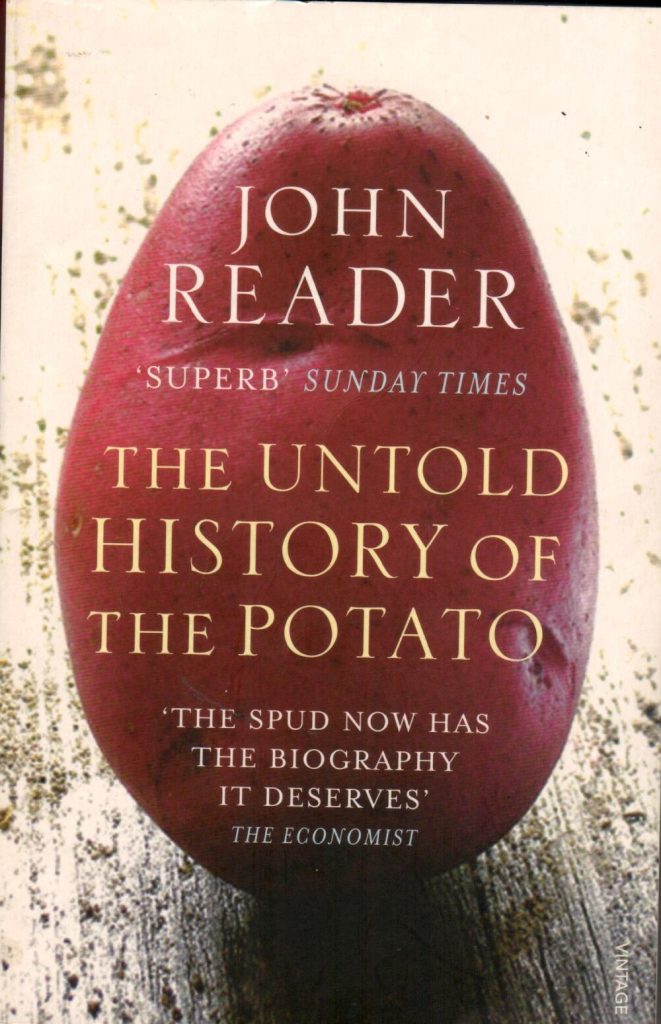
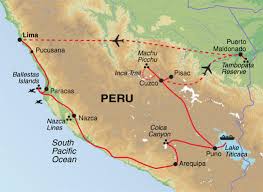
The mountain Aymara belong to tribes that migrated from North America along the coast of Mesoamerica to South America and circa 3000 BCE had settled in the area around Lake Titicaca. They were the first cultivators of the “white potato” of which they had over 200 varieties. The INCA emperors ruled Peru circa 1000 CE until the Spaniards arrived in the early 16th century. The Incas worshipped god Viracocha.
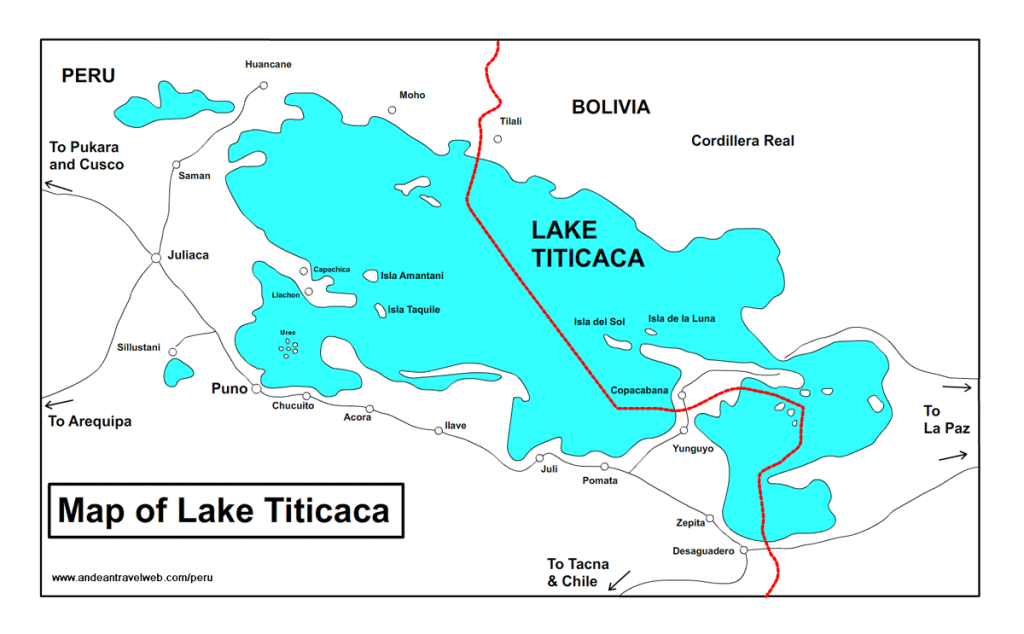
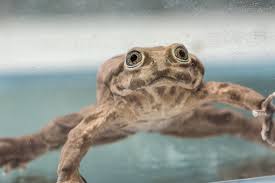
Hi!
I am EVE. I live at Lake Titicaca high up in the Andean mountains. The highest peak is ILLAMPU and the snow glistens like the stars. Down the mountains are the valleys with rivers. I was born here—that’s why my country is so beautiful! The rugged mountain range is called ACHACHILA—‘earth spirit’ or ‘uncles’: these ancestors keep our family secrets hour after hour underground.
We, my husband Adam and I, belong to the tribes of the AYMARA. We have two daughters—Tati and Pati—and we live with Adam’s parents and his two sisters in the same house. Don’t you think that we are rather a little crowded? Adam wants a son. Build me a house and I’ll give you a son, I said. May the frog, our house-spirit, spirit of fertility, bless us! Adam is now busy building a house of stones to my liking; be sure that he does a neat job, our houses last forever. I promised not to peek . . . so I can’t tell you how he is getting on.
Adam’s family is better educated than other farmers. His father is a harvest supervisor, assistant to our tribal chief. He is teaching Adam all the secrets of this job: reading the signs of nature to determine when to plant and when to harvest—so he can take over his duties in the future. He also must learn the secret of seeds—collecting those that will resist frost and snow.
We worship INTI, the sun—born each morning—and MAMA QILLA, the moon. And all the stars—all the heavenly spirits! We fear THUNUPA, god of thunder and lightning. But most of all we worship mother Earth: PACHAMAMA.
We cultivate our crops on terraces called ‘andenes’. The people in the valleys grow different foods than we do at the lake. Our llama and his cousin the guanaco are our pack animals; they safely walk up and down the steep mountains carrying our food. The alpaca and vicuna we keep for their fleeces to spin yarn.
Our village is a one hour walk from Lake Titicaca. The water softens the air and that’s why we can GROW PLANTS FOR FOOD. The food of our llama is ichi-grass. Ichi is tough; the men make rope with it. Around the lake reeds grow that we use for making mats—for the floors and walls of our houses, and for around the house to keep the ground dry. Adam makes reed-boats, small ones, so he and his father can travel on the lake. He makes reed-flutes; he’s an excellent flutist. His cousin is very good at roof-thatching, using only the best reeds mixed with clay and, sometimes, stone slabs. He also makes bridges with reeds; bundled together they float on the lake. Our long-tailed hare, the viscachu, lives in the shrubbery. Lower down the mountains Adam and his friends like to hunt deer with nets; it’s sort of a hobby, a sport, although we do eat the meat. On feast days we roast guinea-pigs [cavia porcelllus]. The meat is white and soft, we like eating it. But our every-day food is: water with all kinds of potatoes and tubers. We, house-wives, add to it whatever is available—most of the time ‘nothing’. I’m ashamed that I can’t give you any ‘favorite family recipes’—our pot-food is simple.
Adam’s younger brother is away. Domi works in the valleys, learning HOW TO GROW CORN. This food came to our lands when some families from far away in the north traveled along the coast and settled down here, in the valleys. When Domi returns with his bride, a girl from the valley, he will take over the duties of younger son: live in his parents’ house and look after them. This is one of our tribal customs. Adam has two sisters: Imi is ten and fourteen-year old Isi, who will soon marry. She will need a dowry: wool blankets, clothing, and some llamas of her own. What a problem!
Oh well . . . let me go on with my story!
I’m not to reveal this to you . . . but I decided to do so anyway because my mother and older sister died last year in a rock-slide and the burden of high priestess is now on my shoulders. We inherit this job via the maternal line. My mother’s ancestor was high priestess of the water flower plant. Mother was from the land beyond our mountain range where the big rivers flow and the coca plants grow. When she came with her husband, an ancestor of my father, she had taken with her the water flower plant and also some seeds.
Mother planted the seeds. The flowers were growing between the lake-reeds, a safe place. But then the cold winds killed them. She cried her eyes red because she was a water flower priestess and could no longer perform her tasks. An old woman who was good at making reed-baskets said that she could make her a water flower plant with lake-reeds. And so the woman braided with the finest reeds a very large, green-colored lily-leaf. She then fixed on it white and pink plaited flowers. The men attached ropes on this giant reed-plant and fastened it with sticks in the ground at the edge of the lake. Women planted flowering reeds around it to protect this amazing reed-plant flower. Now I, high priestess, and my two helpers, priestesses of two families that have the honor to serve with me, continue to worship.
I’m going to reveal to you the story of the creation of KIKOTA. And I shall unveil our rituals for each month—because our lives are ruled by the heavenly calendar. Every month the three of us celebrate for a reason—each month there is a different song and dance ritual. We always bless our FOOD—nothing to eat means that we starve. We must do everything that is in our power to make the spirits grant us FOOD—grant us LIFE!
KIKOTA—AND THE WATER-LILY PLANT
In the beginning there was the lake. Water is the source of all life. And the spirit of TA was moving—in and out of this water.
Ta created the mists; he created the mists . . .
Ta created all living creatures in the water and the plants surrounding it. He created all of them . . . duck and geese, our water fowl.
Ta created suche, our tasty fish, and the frogs: Kiki and Koko. He gave them the sacred big rock in the lake as their home, and surrounded this rock with water-flowering plants—creating a paradise for them.
Kiki and Koko were pleased and one day asked Ta to give them a baby frog. Kiki was all female and Koko all male; so Ta told them that they needed the spirit-gift POO. Well, Ta told them to dance THE SACRED POO. They followed his instructions and for three days they danced. And then was born KIKOTA: half female and half male. And the spirit of Ta was with Kikota. This is the sacred name of our spirit of fertility—only known to me, his high priestess.
Kikota’s badge is the water-lily—on which I perform my ritual prayer every third day.
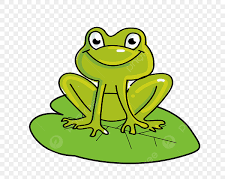
On the first day of spring [September 21] we, water-lily priestesses, dance THE SACRED POO. I shall unveil to you all the secrets . . .
How else will you know?
Besides helping with the field-work, I do my incantations each day—every month! At home I say my prayer to Kikota, asking for his daily blessing. And every third day I go to the water-lily lake-pond to recite the ‘Morning Hymn’.
I get up before dawn to prepare myself for the one hour walk in freezing weather. I make a potion in a special gourd container by dropping hot stones in the water, then adding some coca leaves and let it simmer. I drink this heady brew before I leave.
When I arrive at the lake-pond I go to our sanctuary. The temple precinct—half sunken—is not big. The altar is in the center. I go down the steps. To the left and right are small rooms. The one on the right is for our garments; the changing room is also used as a resting-room. On the left is the room for things we need for our rituals; there is an image of Kikota that we use for the Poo dance only; rattles—dried gourds painted red with white stones inside—drums, flutes and stone bowls with dried water-lily seeds. And special reed-torches!—the secret for burning bright is alpaca grease.
I wear a cloak that is deep green in color and embroidered with white water-lilies. My cap is made of guinea pig fur for in winter that has green bands hanging down with tips ending in lily-buds. I need seeds, a flute, and a torch for the ‘Morning Hymn’. Having collected these, I walk toward the altar—a small circle made of stones as high as my legs. I put the torch in the center and the stone bowl with the seeds between the torch and myself.
I face east.
The gray mist is around me. I’m facing the spirit of mist.
The dawn is rising. I’m facing her spirit.
I must wake up all the spirits of heaven and earth and of all our ancestors. I have to greet them and give our thanks . . .
I lift my hands and say the holy hymn—too holy for strangers’ ears. My voice and heart will be heard by all spirits.
I give thanks—thanks for having survived another day and the start of another one. I light the torch to drive away the evil spirits, the devils and demons: so many of them surround us!
Smoke is rising, thick plumes, as I walk with my flute from the altar and up the stairs to the water-lily pond. I step from stone to stone until I reach the very large stone surrounded by a clump of water-flower plants. This is our water-lily altar.
I face east.
I face all the spirits—I kneel . . . and play my flute.
I must awaken all the spirits: Oh potato spirit, bless us, secure our lives! Oh spirits of quinua and canihua, save our lives! Oh spirit of corn, bless our people in the valleys! I play softly, very softly, to let them gently know that another day has come . . . and then louder and louder, to remind them to look after us. I play with all my heart. I play with all of my souls; with all my three souls . . .
When dawn has given way to day, I arise and return to the altar in the temple.
I face east.
I say: “Praise to plenty! Praise to Kikota!”
I lift my hands and say: “Hail to the spirit of the new day!”
I scatter the seeds from the stone bowl around me.
Carrying the empty bowl and my flute, I go to the resting-room. I take off my cap and the cloak. I sit down. I’m tired and hungry, and eat a grain-cake I had taken with me. On my return trip home I want to visit a sick friend. I don’t have to hurry because Adam’s sisters always look after Tati and Pati.
When I arrive at the house of my sick friend that she shares with her husband, two children and in-laws, I see that everyone has left for work. My dear friend Sutu tells me that all night long the Lari-Lari, the demons, were trying to get one of her souls; and that the devil Supaya and the Ichik were staying outside the house, waiting for her soul. You see, people without a soul get sick and may die! That’s why we have three souls called Kamasa; in case the demons catch one, we still have two left. But with only two souls life becomes risky! Fortunately demons sleep during the day so she can relax for a few hours. Reciting the special demon-prayer, I walk ten times around her house while, standing at her door, she watches me. I take her by the arm and we go inside. I tell Sutu that she will be safe. From the pouch that I always carry on my chest, I take bark of the bitter tree and put it in her cooking pot. I make sure she drinks the potion so she’ll sweat. I also tell her to sleep as much as possible. She is very grateful and hugs me. Promising that I will come by in three days, I leave.

My companion priestesses are older women, my mother’s age. Tulu is from a village in the west; her father is the grand magician of god Thunupa. Malu is from the east; her mother was the daughter of our old tribal chief. Together they have five daughters so our priestess-hood is secured. Listening and asking questions, I learn a lot; especially about the plants and their uses. For every demon and devil spirit there is a special cure. All you have to do is to find out from your patient which plant is doing the job. Tulu and Malu instruct me what questions to ask, and how to ask . . . they tell me that’s very important! They know what makes people ill—it is FEAR. My companions are wonderful teachers, they have knowhow and wisdom—as my mother had. I miss her so much! I have a lot to learn being twenty-one years old and my own daughters are only four and two.
A week later Tulu and Malu ask if they can join me celebrating the ‘Morning Hymn’. They are wearing gray-striped cloaks and woolly white caps with colorful feathers attached. They chant, dancing around the altar—while I recite my prayers at the lily-pond. Afterwards we chat outside the resting-room.
I leave earlier because I want to look in on Sutu, how she is recovering. Also, I am eager to try out my newly gained knowhow! She is such a fearful woman, at times out of her wits. And, indeed, stepping inside her house I notice her crouching in a corner, crying, whimpering—calling out my name when she sees me. I remember Malu telling me that crying is a good sign. So I cheerfully tell her that she is on the road to recovery because the spirit of the water-lily had told me so. I keep reassuring her, and soon a smile is on her lips. I take her by the arm and we step outside. We walk around her property to get rid of all the ‘space-spirits’ that she fears. I use my small rattles; we all know that noise scares spirits away. I tell her to throw stones at each place where she thinks they are. Finally I tell her that they have all left for ‘other places’. I advise her that to protect her from the Lari-Lari at night that she should have next to her anything that makes noise. She is relieved and nods. We part with a hug.
When I arrive home I find that Imi is tending the fire and cooking the soup while Isi is looking after Tati and Pati. Along the way I had collected plants in my net and I give these to Imi to add to the pot. Some are to be dried for infusions.
To do my share of work, I walk to our village fields—the land belongs to our AYLLU: village commune. The only private properties we have are our houses and the little plots of land that go with it. The youngest son always inherits this property. I have special privileges because I am the high priestess of the water-lily. My field work is mainly of a religious nature: blessing the lands, putting magic into the soil, and helping our sick. I also assist at funerals together with the grand magician, who is priest at the temple of our chief god Thunupa, god of thunder and lightning. You have no idea—you can’t imagine how awful it is to describe our feelings when this god thunders in the heavens and skies! We shake, shiver and tremble until we fall prostrate on the ground; and when lightning strikes, claps and clangs . . . some will have to die. We have many funerals when that happens. Most of my people die from . . . sheer FEAR! I should know! The temple of INTUILLAPA, god hail, is on the south end of the lake. Hail ruins our crops—it is after drought the worst that can happen to our fields and plants. I bless everyone and inquire after their children and sick. I am welcome everywhere with great respect. At the end of the day, before sunset, we all return to our homes.
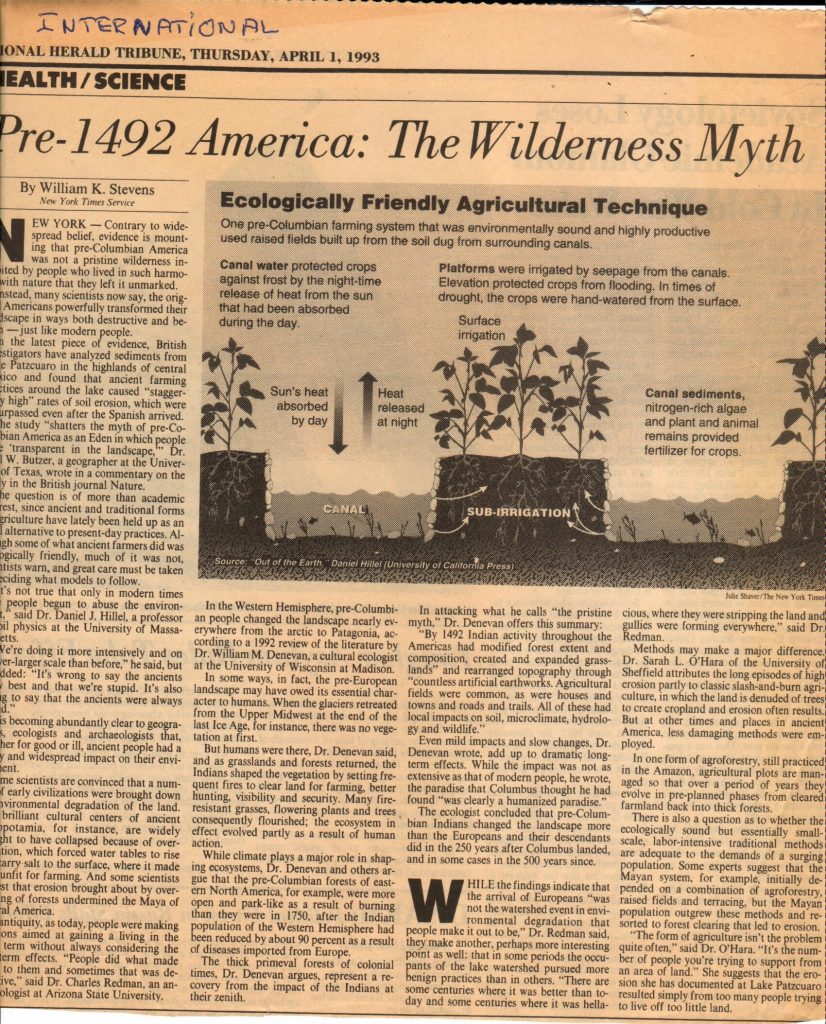
IT IS WINTER
[July and August]
The harvest is over and the fields are barren. We now have to prepare for another year of GROWING FOOD.
This is our dry season.
First we must prepare the fields. Our TACCLA is a hand/foot plow; a wood digging-stick with a footrest on the lower half with a curved handle. Then we have to fertilize the fields with llama dung. And then we repair the irrigation ditches. This agricultural work, preparing the fields, involves our entire tribe—from the lowlands to the highlands. We are busy as the ants that live in the jungles on the other side of River Urubamba in the great valley.
The days are pleasant, warm afternoons and cold nights. We wear our ‘layered look’ when we leave for the fields. About noon we shed two layers—working in the sun makes us hot and wet. Before sunset we put them back on—the evenings are very cold. At night we add another layer and bundle; the homes are unheated.
In my village everyone is busy repairing and preparing our very special ‘raised-fields’ on which we GROW OUR CROPS. These fields are like islands irrigated by canals—keeping the soil moist and also fertilizing the surroundings; thanks to the aquatic plants that grow in it.
We worship at mount KAATA where we have our earth-shrines. We put piles of rocks next to them so we know where they are. Our first duty is to feed the mountain coca at these shrines so Kaata will feed us. It is a matter of life and death, believe me! We identify with the mountain—we are the mountain! Our lowlands are the crotch and legs; the central lands are the chest and shoulders; the highlands the head and the lakes the eyes. The chief diviner (wizard) has to prepare a ‘table of food/produce’ [banquet] offering corn, oca, potatoes, quinua and canihua from the communes—starting with the lowlands, the central lands, and then to the high top of the mountain. It is important that we do what we can to please Kaata to feed us—and so in return . . . we feed our mountain!

Before I know it, the time has come to perform the ritual song and dance of Blessing the Grain Spirits corn, canihua and quinua [Chenopodiaceae]. Quinua has red, white and black seeds and grows at higher altitudes than canihua. We plant them together so that if the weather is rather dry, canihua will survive, and when it is wet, quinua will thrive. We prefer quinua because from this grain we make our beer called CHICHA. The seeds are allowed to sprout. Then we grind it into a paste, add water and cook. After it has cooked long enough, the pot is covered and put aside for a few days to ferment. We also grind the quinua seeds making flour, and mixing this with corn-flour to make little cakes. Most of the time, we just cook these grains in our pot. I can tell you nothing about corn because we still do not grow it up here. However, when Domi returns I will ask him to tell us about this wonderful food. Our people on the coast and in the valleys grow and like it. I know about the corn-flour because Domi brings it when he comes and we make the little cakes.
We start planting the quinua and canihua two weeks after the Blessing ceremony that is similar to our ‘Morning Hymn’ except that we add more hallelujahs to the grain spirits. One week later, the planting of corn starts in the valleys. Once the planting is over, the priests worship the gods and spirits in their temples, asking for blessings: for good weather, enough rain, no hail, and another year of abundance!
And on the first day of spring [September 21st] we, the three water-lily priestesses, perform our most sacred ritual: THE DANCE OF THE SACRED POO.
I am too frightened to take you along and let you in on our secrets while we perform this most sacred dance for fear that Kikota will punish us all. This ritual, I am hesitant to say, is a sort of mating-dance. So I will only describe some procedures.
We arrive the day before at the temple-precinct to prepare ourselves for this ‘three-day ritual’ by taking with us plenty of fresh coca leaves, lime, grain cakes, and jugs of water. We settle down, make a fire in our resting-room, and discuss how to perform the dance. This is the second time that I will officiate and I’m still nervous. We rehearse by talking about the performance—much of it is repetitive; Tulu will dance the major act.
Our garments are very special: white with embroidered golden-yellow water-lilies and green borders. Our head garment is a white, fuzzy cap topped with an effigy of Kikota. We use tambourines, drums and flutes alternately. I am a specialist tapping the tambourine; my mother always thought I had great talent, and my dancing is also excellent. I shall perform well, after all . . . my companions are grandmothers and I am young and slim. Kikota will heap his favors on me!
We relieve each other every so often during this dancing ritual that starts at pre-dawn and lasts until sunset. Sometimes we’ll sing, or rather rejoice while shaking the tambourines, and we’ll chant while playing the drums. We like using refrains—a sign of magic—repeating requests so the spirits will finally . . . listen! As I said, it is a sort of mating-dance. Kikota, his effigy, is brought back and forth—from the altar of the temple to the water-lily altar. More I will not divulge. I feel . . . that already I have said too much!
But . . . how else will you know?
So . . . I’ll tell you about our belly food, our life-saving CHUNO potatoes that we can store for many years!
Our valley cousins join us when we start planting potatoes in October. Pachamama told her secret—how potatoes get children—to our ‘uncles’: our ancestors. That’s why we give our dead people for their trip to UMA PACHA—place of birth—a gourd filled with our belly food: CHUNO. The secret is that we cut the potato in pieces—making sure that each piece has a ‘peep-eye’ from which a plant will sprout. Next, we make a hole in the ground. Then we put the piece—peep-eye up—in the hole and cover it with soil.
The white potatoes we eat, after harvesting, in winter. From the small, bitter potatoes we make chuno. We freeze the potatoes at night. In the early morning, we crush them with our bare feet, stomping on them until the skin loosens. Then we dry them in the sun so they shrink [freeze-dry]. They are ready for storing! Chuno is our food that keeps us alive when hails or whistling winds destroy our crops. Before we put chuno in our cooking pot, we soak them so they puff up. But do not cook them too long or they will become mushy!
For a change in cuisine, we devote some terraces growing other tubers: OCA [[Oxalis Tuberosa] and ULLUCCU [Ulluccu Tuberosa]. The wrinkled oca is our ‘old lady’. At special times, when we celebrate an event, we’ll eat old lady’s flesh together with the sweet vine potato. We also eat the flowers. The shiny ulluccu is pretty—she comes in stripes, bright purple, yellow and pink. We make chuno with ullucco because her flesh is tasty. Another root food we grow is RUMU [Ruellia Tuberosa]—with the root flour we make cakes. The large, flat, white beans [Phaseoleae Lunatus] we dry in the sun; they store well in our gourd containers. These lima beans we add to our pot when we have no fresh food. The pumpkin is the only gourd we eat; pretty gourds we use for containers and cooking pots.
We grow lupine plants [Lupinus Mutabilis]. The seeds are bitter; we soak them. After rinsing, we cook the seeds. They are then dried on reed mats. Lupine seeds are a great snack for all children—big and small!
On October 21st, we celebrate the ritual dance: ‘Blessing of the Potato Spirit’. Potato spirits live in the ground. So, to wake them up, we use drums, making a lot of noise.
We wear beige cloaks embroidered with favorite potatoes. To fasten our cloaks, we use thorns from plants that grow down the mountain. Our caps look like a potato and have green-colored strips of material attached with crocheted flowers at the ends in white, pale yellow, dark red and purple. These pretty flowers dance in every way when we move our heads. My cloak belonged to my mother and has white and purple embroidered tubers. The cloaks and caps are passed on from generation to generation; and we also wear them when we celebrate in June the harvesting of the potatoes.
Tulu and Malu are drumming at the altar and I am at the water-lily pond playing my flute as loud as I can. The spirits must listen to us! When the drumming stops, I run as fast as our hare to the altar. Holding hands, shouting to the spirits to wake up, we dance in the precinct until my helpers are out of breath.
I ask my companions to kneel and pray for rain. Mama Qilla, our moon, should be happy because we make a good show of bowing and beseeching her. Then Tulu welcomes the spirits of irrigation. We beg for their blessing. Come to think of it . . . we do a lot of asking! But, to be fair, we do our share too . . . we worship all of them!

After planting our food, we pass the time weaving. In our tribes, men and women weave. Women spin the yarn. But when a woman is having a baby she does not spin—for fear that the birth-string [umbilical cord]may harm the germ-baby, giving troubles when the baby enters ‘the place’—his or her uma pacha!
The wood stick with the clean wool—from which we spin yarn—has two birds on top. Birds weave nests! We carry the stick in our left hand, under the arm, and the spindle in our right hand. Even while walking, we spin! In our back-packs we carry small looms and, so, we can spin and weave when we feel like it. Adam weaves rugs and wall hangings on his big back-strap loom. Sometimes I help him out, as I do now; he is busy finishing our house—a first!
For dying the wool we use plant and fruit juices, and the sap of a beetle that gives us the colors red and purple. With us, Aymara, colors have meaning! White alpaca wool dyes best and we use it for the bright colors. Llama wool gives us brown, white and black yarn for daytime outfits. Vicuna wool is not dyed; with their shiny, soft yarn we make ‘sparkling-divine’ materials for temple festivals. The garments for ritual ceremonies are called Q’EPI. They are the heirlooms of every community.
We weave materials for every ‘life-period’: for winter the material is thicker than for summer. The accessory I like best is the CHUMPI—a belt with long, braided tassels. Aymara like tassels! My every-day chumpi is red with dark blue, green and white bands. You can be sure that I have many chumpis! For temple and agricultural festivities our chumpis show special motifs.
I have two LLICLAS—shoulder wraps. These keep me warm in winter and are also useful for carrying things, as well as carrying babies! We women weave patterns like flowers and birds in bright colors. I like pink and green on a dark yellow background. For my family I make short and long tunics; cloaks; wrap-skirts for myself; loin-cloths for Adam: head bands for summer and . . . coca pouches! Adam is very happy when I make him a very special CHULLUS—a cap with ear flaps; and CHUCUS—a conical cap. I made him several, for every season.
AKSUMAMA is our goddess of weaving. Of course she has her own temple and chief priest. But we priestesses also like to worship her. Everyone needs her blessings for plenty of good wool. As you know by now, it’s a big job making clothes for our families!
So . . . on November 21st, our ritual song and dance is to Honor Aksumama.
STAY TUNED !
Email your feedback about the story to the author at rosecamelia@verizon.net.
October
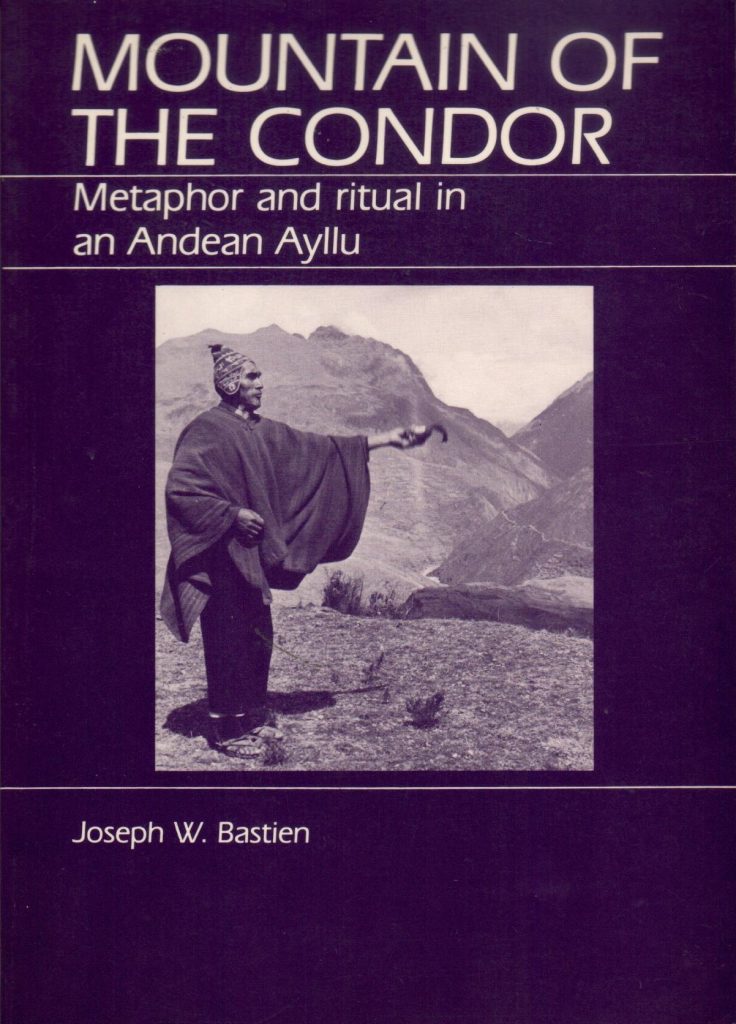

QUINOA FIELDS
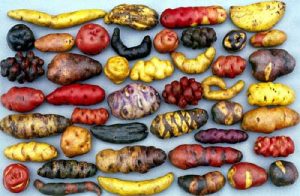
CHUNO POTATOES
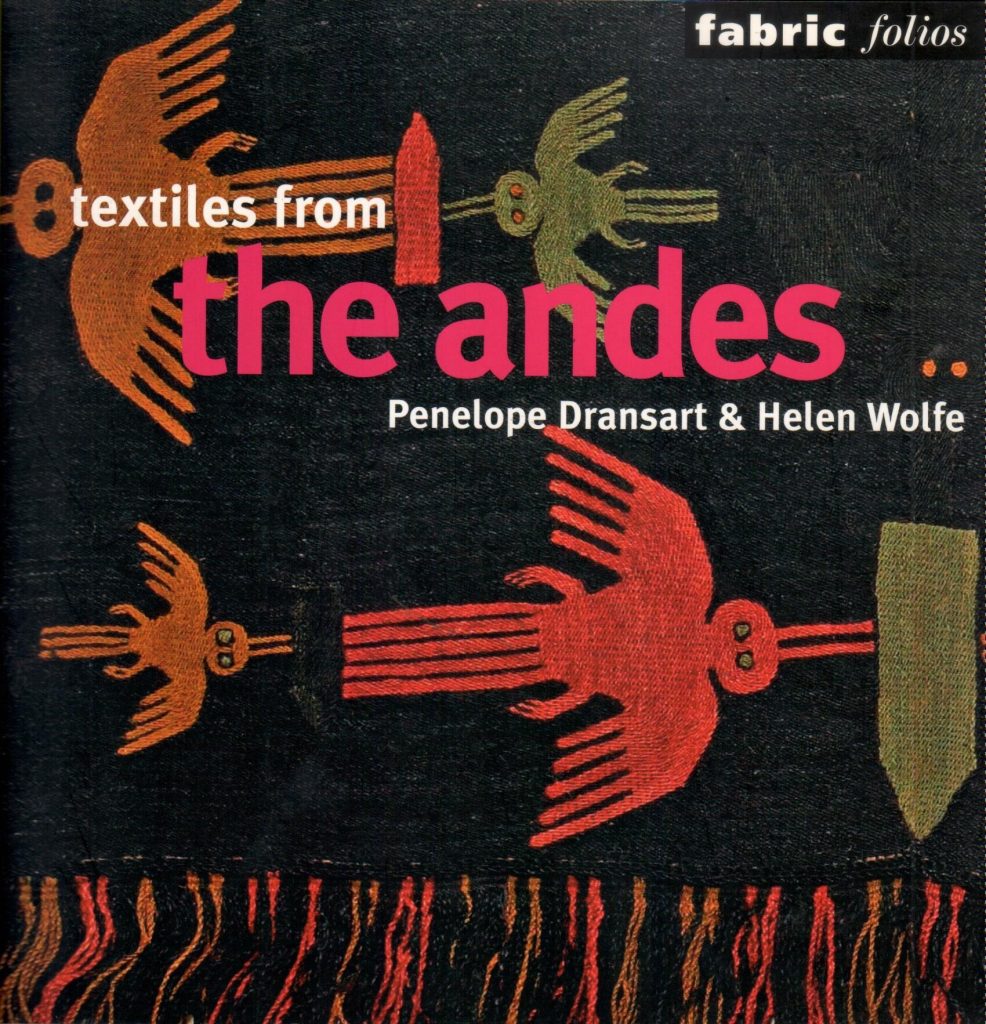
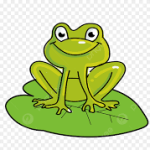
I asked my helpers not to wear matching outfits but their own favorite cloak and cap. Mine is red with a pink snow-flake design—I finished making last month. I’m eager to show off my brand-new cloak in honor of Aksumama. My companions say that red is our goddess’s favorite color.
Dancing around the altar, we swing our spindles in tune as we keep on shouting—repeating over and over again, “Thank you, Aksumama!” This creates magic!
We beg our goddess to bring us rain.
You should know that llamas must get soaking wet so we can pluck bugs and plant-lice from their fleeces. I’m ashamed to say it’s not a job I like—so I cheat, pretending to look after patients. Anyway, after this job, the real hard work starts: that of shearing the llamas. The men put all their effort doing this with their tools. On their trips they always collect stones for making tools.
We women have a great time chatting while we wash and then comb the wool. We make combs by attaching large thorns on both sides of a thick strip of material. My oldest girl, Tati, likes it when I comb her hair and add a string of red wool in her braid.
The entire month of December we are as busy as ants with the wool work. I should not neglect my daughters because of my hectic schedule, so I make time to play with them. The girls like hide-and-seek and shriek when I chase them.
Time flies by!

On my daily trips I collect plants from which I get the colors for dying the wool. Indigo-blue from a plant with dark leaves [Indigofea Anil]. For black, I pick the leaves of a rather ugly plant [Kageneckia]. To make the color green, I mix the juices of three plants. [Dicliptera; Lafoensia Acuminate; Piper Kineatum]. I collect many other plants that grow down the mountains which I exchange for those in my area. To my medicine pouch I add for heart pain the seeds of the shiny yellow flower [Thevetia Peruviana]; for thin stool the beans from a low-growing bush that has prickles [Aniba Puchury-minor]; against fear, the seeds from the white-flowering tobacco plant [Nicotiana Tabacum]. The berries of the UCHU-UCHU plant I give to my patients if they can’t sleep and the beautiful red flowers we use to decorate our altar. The ARRACACIA plant [parsley] has fleshy roots and I use the roots and leaves for belly troubles—likewise infusions with the leaves of plant salvia. The three souls, you know by now, live in our stomachs!
But the one medicine we need most is COCA leaves. The coca—our divine plant— grows on the other side of our mountains where the Urubamba flows toward the jungles in the great valley. Jungle air is steamy and that’s why the coca plants grow so tall and the leaves can be picked all the time. But the best coca grows on our lower fields where the air is not as steamy. The leaves are dried on reed mats facing the sun. Coca leaves must be kept dry; I put them in crocheted nets made from ichu-grass.
On a string around our necks we carry a coca bag with leaves, a tiny gourd with ash of CHINCHIRCUMA [Mutisia Hirsuta], a shrub with yellow-orange flowers that hummingbirds like, and the dipping stick. When we need to feel good, we take some leaves and add ash, using the stick, and chew—making a small wad. You want to know the secret of how to use coca? Move the wad with your tongue and—suck-suck-suck! Especially for the three-day Poo dance we need coca. You see, coca keeps us ‘going’. But most of all coca takes away pangs of hunger. That feeling, of hunger, believe me, is very painful. I weep inside my heart when I hear the cries of small children. I kneel on the ground—kissing the earth—and shout: “Be gone pain and hunger! Oh, Pachamama . . . give us our belly food!”

On December 21st, Tulu, Malu and I plead with all the gods. But especially with Thunupa, god of thunder and lightning because we fear him so much. When he strikes, we run inside a cave or a nearby house. And we beg Intuillapa, god hail, to have pity on our plants. Hail ruins our crops and is, after months of no rain, the worst that can happen to our food supplies. At Intuillapa’s temple at the lake his priest offers bowls with grain seeds.
We pray to all the weather spirits, clouds and mists.
We kneel—and keep on begging and begging for plenty of food at harvest.
Summer has started.
We are waiting for our food to grow. The Ayllu, elders of our community, tell every household what to do.
The men show their sons how to make tools from special stones. The older women go to the lake and bring home in their gourds the soft soil for making large pots. These are for holding the grains and chuno that are kept in our community store houses overseen by the Ayllu.
I’m a priestess and have no time for making pots; my duties are to heal the sick. On my daily outings I visit a woman who is popular for making clay storage pots that look like the pretty green and yellow striped gourds we use for cooking. Her pots have a flat base and a wide opening at the top. She tells me that these pots are for keeping chuno. I watch her—at times dipping her hands in the water bowl—shaping the clay making a pot. I admire her a lot and say so. She is pleased and shows me rows of pots drying in the sun. Later, she says, she paints them and then puts them in the fire to make them real strong.
For keeping the grains canihua and quinua, her cousin makes smaller, plain round pots with three small ‘legs’ for standing. She makes a small opening at the top and adds a tall funnel that she decorates with stripes, showing me the sharp thin reed she uses. On the side she puts handles for holding the pot. I am thrilled when she gives me two small pots—gifts for my daughters!
The younger women—like bride-to-be Isi—spend this time making peace offerings: gifts. The men go crazy for the feathers of our condor bird, so they attach them on headbands. The condor is the only bird that likes the lake. The air is too thin for the small, chattering birds that live down the lower mountain. Once Domi came carrying little yellow birds in a net. We felt very bad when they fluttered their wings and died.
We show our daughters how to make bracelets and necklaces. We like colored beads. In the center of large, fresh white beans we make with a strong, thick thorn a hole and then soak them in plant juices. We dry the beans in the sun until they are like stones. Then we put the beads on a string made from ichu-grass.
LOOK—heirloom necklaces!

On January 21st, our seventh month of Song and Dance, we worship the Sprout Spirits.
When everything is sprouting and blooming, the earth covered in green—we are enchanted, thrilled with the prospect of abundance. The spirits have favored us—it rained a lot and, so far, no hail destroyed the tender plants and the sun is shining. What more we want! So, giving thanks to the sprout spirits, we hop around joyfully around the altar, shaking our tambourines and . . . we sip chicha-beer.
It is February—high summer.
We are watching the grains sprouting; the spirits have favored us so far. Begging Mama Qilla for rain has been answered—we weed and weed!
The men kill old llamas and cut up the meat in long strips. The women put these on the stone walls to dry and then store them; adding to our cooking pots when fresh food becomes scarce. The skins are prepared to ‘roast in the sun’ until they are dry. With the hides from the past year the men make sandals and covers for playing the drums.
We all are busy doing our chores before the harvest season starts. I’m very excited. I got the bright idea to include the older daughters of my companions in our ceremonies. Yes . . . I have wonderful ideas to make our rituals into shows we all enjoy.
LIFE is too short—we must have some FUN!
Down the mountains toward the valleys we grow many fruits; alas, we have to eat them right-away as they can’t be stored. The pineapple [Ananas Comosus] is juicy and so is passion-fruit [Passiflora]. In the lower andenes grow the four Annonceae: the cherimoya, the soursop; the sugar-apple and the custard-apple.
The avocado [Persea-americana Lauraceae] tree grows here and the lukuma [Lucuma-fibera] tree. Along the walls in the andenes we grow gourd [cucurbita] vines. The cucurbita-pepo we use for containers and cooking. The one we eat is the pumpkin; the yellow-orange flesh can be stored for a few months in a dry place. The one we must eat when it is ripe is the squash that we add to our pot. The TUCTUCA, sweet potato [Ipomea], has starchy, fleshy roots; the children like eating it very much.
We also must eat—they can’t be stored—the tomato, the frenchbean-haricot and the peppers [Capsicum Solanaceae]: green, red and yellow.

On February 21st, we celebrate the Dance of Sacrifice with the Hymn of Great Ripening.
We priestesses do not perform, neither do we assist. It is a holy event and my people are very emotional about it—we are grateful to the gods and spirits who bless us with such abundance. We make sacrifices to show them how sincere we are. All the chief priests in the lands perform the sacrifices in their temples. White, pregnant llamas are sacrificed and their fetuses are placed on the altar.
On the day before, the 20th, Tulu, Malu and I go down the mountain to collect the red uchu-uchu [fuchsia] flowers. Before sunset we decorate our temple with these sacred flowers. The altar looks magnificent—ablaze in red!
We stay overnight in our resting-room. I had made a special stew and I brought it along. I call it: Cream of Lima-bean soup. It takes a lot of work, believe me. I boil the dried beans in water until they are cooked and then I peel them and mash the flesh; I can make the soup as thin or thick as I want by how much water I add. I can also add other tubers like arracacia and some chuno. I add finely chopped leaves of watercress. You bet my companions wanted the recipe!
On the morning of the 21st we sing at our temple the ‘Morning Hymn’. After sipping our second cup of coca-infusion, we change into special red robes that have borders with white and golden yellow water-lilies. Our heads are crowned with wreaths of uchu-uchu. We wait until the sun is high over our heads and we know that the altars are laden with the sacrificed llama fetuses. The priests offer thanks and all our people prostrate and give thanks—their voices are carried by the winds.
And we start our Hymn of Great Ripening. We walk around the altar while chanting holy phrases—first softly, then louder, soft, louder, we are building up momentum. Then Tulu stops—and we stop too. She raises her arms high up—and we also raise our arms.
She starts reciting . . . and we, her chorus, repeat: Oh Mother Earth—Oh Pachamama! Blessed be your name! Oh Lady of rain—Oh Mama Cocha! Blessed be your name! Oh Holy Pachamama! Oh Holy Mama Cocha! Oh Heavenly Spirits! We request you to grant us the great ripening of our sustenance. Bestow on us your favors! Bestow on us your benediction!
We are surprised when Tulu ceases the incantation. We look at her. She points toward the heavens . . . lo and behold . . . Lady Cuycha has appeared, our beloved rainbow!
Everyone has seen the sign of the rainbow, a wonderful omen. In the evening the villagers celebrate, drinking chicha. And in the coming days we keep on weeding and, if necessary, irrigate. We also weave, and most importantly . . . gossip!
The ninth month, March 21st has started. We celebrate the sun—born every morning. And we plead with the jaguar, god of the felines, to have mercy and not molest us in the fields. They like to eat our flesh.
Inti’s high priest worships sun at his temple on the highest mountain peak: Illampu. The priest had told my mother that the bright rays are the god’s beard. And we must hide our eyes when he shines high in the sky.
We, priestesses of the water-plants, worship the sun by playing the ‘Song of the Reed Flute’. To keep god sun happy we dance in the round while playing our flutes at the lily-pond altar wearing . . . our yellow skirts only! I giggle, looking at the bouncing breasts of my companions. We ask sun to give us light every day. You see, at times there are thick clouds in the skies, darkness is all around us, and potatoes need light for growing. What we do without food . . . we fear starvation.
We return to our sanctuary. We put on our short yellow tunics. Now we must appease god Jaguar. With a finger to our lips, we walk in silence, looking around for him to appear. We sigh when he doesn’t. Quickly we enter our resting-room, change clothes, and return home.
The fields are abloom with waxy begonias—shiny and leafy, the flowers, although small, are a lovely white-rose. The orchid-like schizanthus,—I call them butterfly bushes—showing their brilliant colors, are really exotic. Later on, the verbenas with their strong colors give us inspiration when weaving. The red bromeliads carpet the ground and perch on trees. They thrive from the coastal deserts toward the treeless andenes and on to the great green valley. The flowers are lily-like. All bromeliads are native to my country. [Exception: Pitcairnia-feliciana in West-Africa]
Adam is busy finishing our house.
It is April:
The people in the valleys are preparing for the CORN harvest. They say that we have never had such abundance, all due to the perfect weather conditions. Some of the men in our village went down to help out.
While the harvesting of CORN is being accomplished, we celebrate: the tenth month, April 21st: The Blessing of the Corn Spirit. And of course we give thanks also to our grain spirits quinua and canihua; to all our food-spirits harvested one after the other. We must not forget them. Our tenth month ritual is filled with gratitude and we are sincere in our heart-felt thanks as we worship at our altar and lily-pond.
Everyone is excited: the crops of lima-beans, oca, ullluccu and the grains—foods that can be stored for the future—are beyond our imagination. In all the lands our store-houses are brimming over. There is talk of building additional store houses!
One of our men returned home and told us that soon Domi will arrive with friends, taking along some of the corn food. Adam’s father was thrilled and told his boss, our tribal chief, —Datu is his name—who said that he would arrange a meeting, everyone was welcome, in his large patio to hear Domi tell us about this exotic plant food. So, on my daily trips I tell the people to come and hear THE STORY OF CORN [MAIZE].
Well, Domi and his friends arrived, showing us the fresh corn-food. Isi and Imi were interested learning how to cook this food. The friends said that after Domi had told his story, they would teach them how to make corn flour.
The entire village population gathered at chief Datu’s patio. In the center were sitting Domi and his friends with a pile of corn plants. Adam and I, the parents and his sisters sat with chief Datu and his family, eager to hear the story.
Domi started:
“As we all know, many, many years ago, a tribe calling themselves INCA conquered the valley peoples, and then us in the andenes.” He looked at chief Datu. “Soon, they’ll come to Lake Titicaca!”
Chief Datu put up his hand, saying the Inca people were building a city named Cuzco. For this work, the Incas were recruiting men and we should not resist . . . we’d get killed! The chief got up, and facing the villagers said that the Incas worshipped a god by the name of Viracocha. He planned to add god Viracocha to temple worship as it could not hurt to worship their god.
Domi nodded and continued:
“But they taught the peoples in the valleys the know-how about this food plant.” He took one from the pile and held up, for us all to see, an ‘ear’—the leaves hiding the food. He began to peel (husking)—showing silky green threads. “These threads,” he said, “they use for medicine; for when you have difficulty with holding your stomach water [bladder].”
Having peeled away all the threads, he said, “This is called the cob. And these grains”—he pointed—“are called kernels. They come in colors of yellow, like these, white, shades of red, blue, or brown. My sisters will use a knife to take off the kernels and cook them in water until done. That will take . . . counting to twenty!” Domi smiled. “Very ripe kernels are boiled, then dried in the sun, and are called CHOCHOKA. In the valleys we grow MANA [pop-corn]; the kernels are heated over a low fire in clay vessels. Small corn ears”—he took one from the pile—“are parched over fire and called KANCHA, a finger-food. They take kancha on trips. Our valley friends like growing soft flour corn that has large kernels.”
A friend pushed a pile of plants at Domi, who nodded. “Rough ground dried corn is called LAWA, and when finely grounded is called API. For CHICHA-beer they use red corn kernels.” He looked around. “Any questions?”
A villager wanted to learn more about the plant; like knowing when the food was ripe. So Domi told him that they check by peeling the cob. When the plants are ripe, the whole plant is cut with a sickle. The husk, the leaves, is used for fuel and for wrapping food. The empty cobs are for fuel. The stalks and leaves are used for fodder.
Then Domi took the pile of plants that his friend wanted him to show. He took a plant that had fruits like the potatoes. He smiled at me as he said, “This is a peanut plant [Arachis Hypogaea]. The beige fruits are dried, shelled, and then the seeds are roasted. This is also a food people like taking on trips. I was told that this plant came to the valleys from the land of the great green valley where the River Urubamba flows.”
Chief Datu got up and looked around—nodding at the men—and said, “I have had talks with some Inca chiefs because I want no quarrels about our food. I was told that from where they came, they knew nothing about potatoes and our grains were also a new food.” He took a deep breath. “I made an agreement to share some of our harvest.”
A few men raised fists and shouted.
Chief Datu held up his hands to stop them. “You want to live in peace?” He pointed at Adam’s father. “We don’t want you to become their slaves!”
The women clapped.
Adam’s father got up and said, “I have been learning from them how to tally-up our harvest and share our food. Soon, we’ll harvest our potatoes. When they come, I shall assist them . . . for the sake of our children.”
IN PURSUIT OF CORN AND ITS ELUSIVE ORIGINS
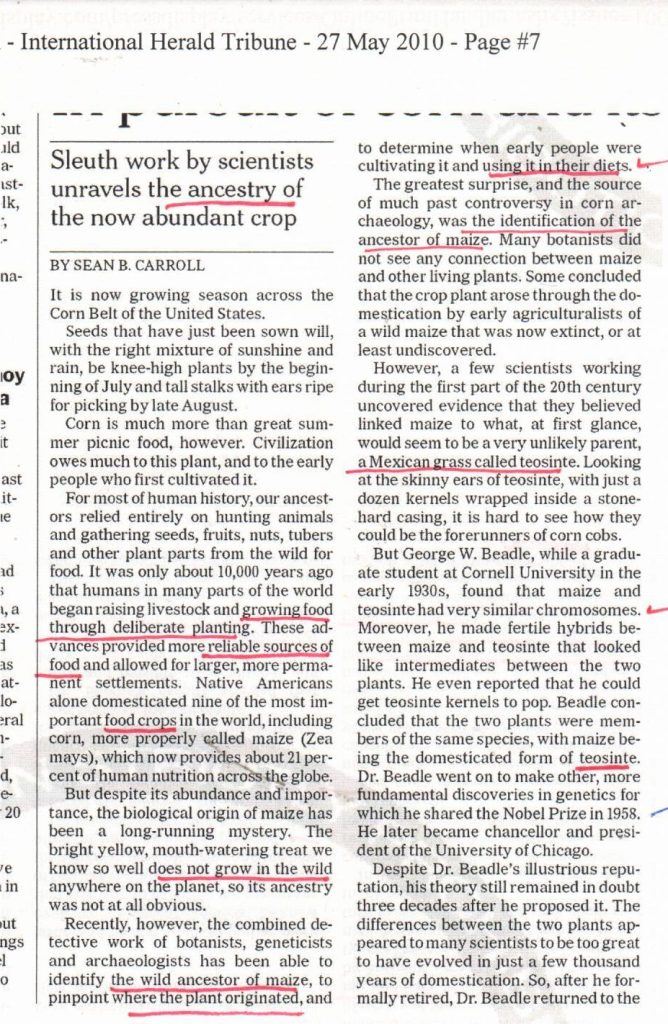
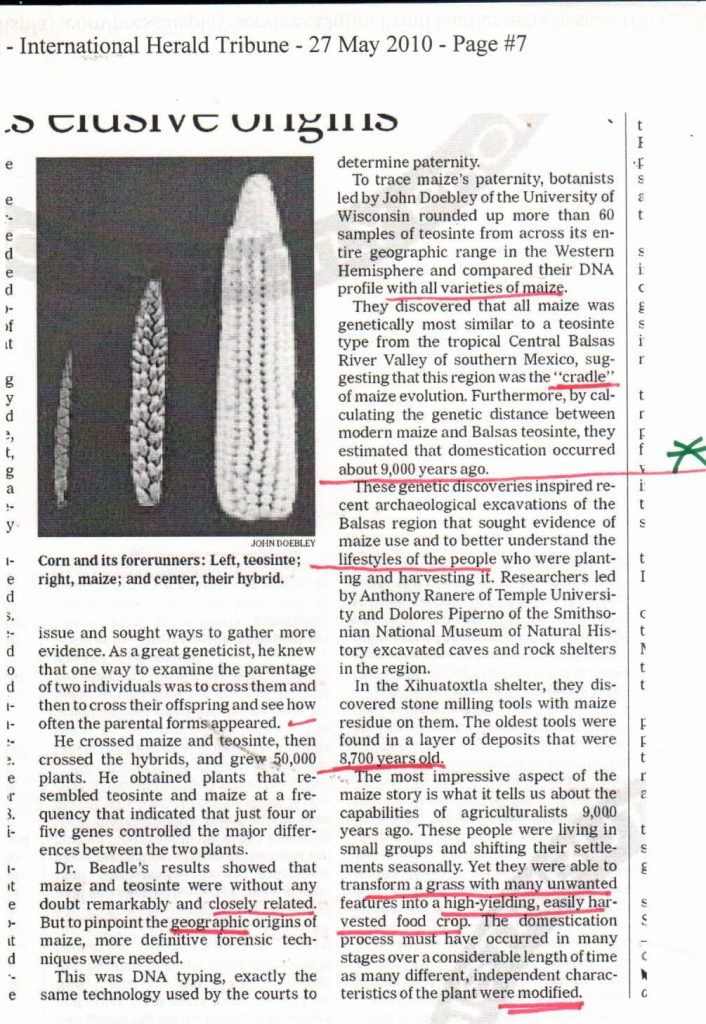
MAIZE can only be reproduced with human assistance
AGRICULTURAL FERTILITY RITUALS DEVELOPED INTO STATE RELIGIONS
It is May:
For ten days, with the help of our valley friends, we harvest our white potatoes. These potatoes will nourish us during the winter. Next month, we harvest the small, bitter potatoes with which we make CHUNO—those will last forever!
Tulu, Malu and I now pray every day to the sun god and the potato spirits while also reciting the ‘Morning Hymn’: quiet unusual. But . . . it does not hurt to keep all spirits content!
I have wonderful news—Adam will be thrilled. I’m getting a child! I kept it a secret because I want to pay a visit to a famous ‘seeress’ living on the other side of the lake. We have great respect for diviners. The day after Mama Qilla winks, after having shown her full face, this foreteller sees her seekers. Well, I am ready!
I take with me three pouches with healing plants and a separate pouch for the divine coca leaves in exchange for telling me the signs . . . about the fetus! Will it be a girl or a boy? Walking at this time of the year is comfortable and four hours later I arrive at the roofed meeting place where seekers assemble and wait. Two men greet me respectfully, noticing my medicine pouches. They tell me that the foreteller, known by the name of Qillamu, is busy; they are waiting their turn. So, I sit on the floor where the sun shines to keep warm. Soon, a woman holding a baby walks down the reed bridge and steps on land. All smiles, she passes me. The two men, father and son, nod at me and, carrying coca-pouches for Qillamu, walk up the bridge.
I wait—and wait. A young woman carrying a pouch with fresh potatoes joins me. She says that she needs advice about marriage—which man would make a better husband. She opens her heart to me. Nodding, I say it is a decision of life and death. She wants to know why I came. I show her my belly and whisper that I need a son to make my husband happy. As we chat, the father and son walk down the bridge. When they pass us, I notice that the son’s face is gloomy whereas the father is all smiles.
I get up. The young woman wishes me luck. And as I walk up the bridge, I pray to Pachamama, mother Earth, for her blessing. At the end of the bridge is a path. I look around. My diviner grows pumpkins. For snacking on my trips, I always take along roasted pumpkin seeds. I’ll give her some to make her smile.
I continue walking until I reach a stone house that has a stone/reed thatched roof. At the door sits a bundle of blankets: Qillamu. I approach the diviner. Her face is wrinkled like old chuno and her dark eyes shine like stars. She extends an arm and waves at a boulder a few feet away. I open my pouches and put them on the ground near her for inspection. Then I sit on the smooth stone—my heart is thumping.
The foreteller, holding a stick, pulls a pouch toward her. She sniffs and smiles. The second and third pouches also make her smile. When she sniffs the coca leaves, she cackles and then blows me . . . a kiss! Now I feel good, and boldly I go to her and give her the small gourd with the fresh roasted pumpkin seeds that are—I should know . . . oh, so tasty! Her nostrils move rapidly and she eagerly takes the container from me. She nods vigorously when she puts the snack next to her. Then she mumbles, I see she has few teeth left, that I should tell her what my problem is. I tell her that I want to know if I’ll give birth to a girl or a boy.
She wants me to stand in front of her and expose my belly for inspection. I lift my skirts. She tells me to spread my legs. My heart is in my mouth, wondering what I have to do next. Unexpectedly she puts a finger in my irrigation field and then into my canal. She wiggles her finger . . . I’m holding my breath from fear. All of a sudden she cackles softly and takes out her finger. I pass gas. Qillamu puts her wet finger at her nose and sniffs. She nods. Then she asks me to put my mouth at her nose and breathe out so she can smell my breath. I do what she tells me . . . my tongue is dry from fear. She nods again. Then she tells me to sit on the stone while she consults the frog spirits; with their tongues they smell for miles ‘everything’—especially fertile fetuses. Qillamu goes inside her house. I look around and notice several poorly-looking lupine plants. The seeds make great snacks; I giggle.
When the diviner comes outside she is holding red and blue woven bands. She calls out to join her. She asks if Datu is chief of my Ayllu. I nod. She then hands me, now smiling brightly, the bands, saying my fetus is a boy. I am embracing the bands as my heart jumps for joy. Tears are slowly running down my cheeks. She tells me to hang these bands on our house at the celebration of the 12th month so the villagers will know that a boy will see the light of day in the spring . . .

And so, on May 21st, the eleventh month, we dance the Ritual Song and Dance of the Potato Spirits.
We wear the same robes as we did on October 21st, the fourth month. But we decorate the altar with the brightest, shiniest chuno potatoes. We involve Malu’s two older daughters in our dances; they giggle a lot. So I thought it would be fun for Imi to join them next year. The girls can teach my Tati and Pati when the time comes. Needless to say, I danced this eleventh celebration with all my heart, thanking all the spirits of our mountains.
It is June:
Everyone is eager to harvest the colorful chuno potatoes, our spare-food when we have nothing-else to eat. As foreseen, the crop spells abundance.
In the meantime, I must prepare the final Ritual Song and Dance for June 21st, the twelfth month. I had noticed that the grandmothers can’t remember too well anything that is new—I must stick to routine. We will wear the same red robes that we used for the 8th month ritual. However, we’ll weave a new headband with chuno potatoes—our life-saving food.
Our Ayllu Grand Chief has ordered that at our temples we give special thanks to the Inca god Viracocha, considered to be the supreme creator of all gods and spirits. We water-lily priestesses are excited because we never had to worship a new god. It will be a brand-new ceremony—such a novelty; a unique opportunity to create for next year another Song and Dance. Viracocha is so holy that no one can ask him for any favors. We must thank him—as all the gods and spirits do! Our Grand Chief has ordered that instead of llama fetuses offered at the temples we must sacrifice one virgin girl and one virgin boy. We water-lily priestesses are exempted from offering BLOOD—we worship fertility: KIKOTA. The priests at our community temples now consider offering human blood to god Viracocha as an honor. There are families eager to offer their teenagers . . .
Adam and his father are learning from Chief Datu how to use the Inca food information tool called QUIPU. This tool tells them ‘how much food’ is stored and which kinds. This is also a brand-new idea because our lands are community property and everyone gets a share when in need. The Incas want to know—so they get their share without helping out! The quipu has one long, knotted string from which up to one hundred strings are attached/hang. Each colored string shows the item it represents—a green string for white potatoes, a red one for chuno, pink for quinua, yellow for corn, and so on. One single knot in a color represents a number. Adam loves numbers! Like a child with a new toy, he plays the strings.
Adam tells me that . . . my house—is ready! I ask his parents, sisters, brother Domi and valley wife, and Chief Datu to come to the new house at sunset. When we are assembled I ask Adam to hold hands with Tati and Pati. I nod at our chief. I take from a pouch the red and blue bands, and all smiles I drape them over the stick above the door. Chief Datu shouts at Adam that a boy will be born in his house! Our girls start to dance because a brother always takes care of sisters; their wish is fulfilled. Adam puts his arm around me, and eyes aglitter nods at his parents. We enter our house. When we come out, his father is passing cups with chicha . . .
Everyone is preparing for the Grand Festival: Thanks to Abundance, the 12th month. They get new outfits, decorate the temples and make chicha! I am in a dilemma what to do because we do not worship blood. To be honest, I am eager to attend ‘the Sacrifice’ at one of our main temples. This hasn’t been done before . . . if I don’t go—
how will you know?
So I mention to Malu that perhaps we could start our ceremony at pre-dawn and then rush to the big ceremony. I was sure Tulu would like to see her father, the grand magician of god Thunupa, perform this new sacrificial ritual. Malu got the hint! And, indeed, Tulu talked to her father. I nearly fainted from excitement when she told me that he suggested that . . . we three be his acolytes! However, the grand magician had one condition: we had to wear our most precious raiment—our Sacred Poo robes.

So . . . here we are in our Poo robes at our temple at pre-dawn doing a super ‘Morning Hymn’, adding accolades to Viracocha. Then we sit in our resting-room and drink a hot coca infusion. When we leave we make sure we have plenty of fresh leaves in our pouches.
During our two-hour walk to the temple of god Thunupa, I ask Tulu what our duties are as his acolytes. I’m somewhat worried because she is rather vague in her answers. But she reassures me, saying she had instructions from her father. She’ll tell Malu and me what to do once the ceremony starts.
As we walk, Tulu suggests that we chew coca; to keep me from talking? Soon we catch up with villagers on their way to the temples. They greet us with great respect, noticing our special robes. I’m nervous and excited at the same time and swish my wad from my left cheek to my right cheek as if my life depends on chewing. Malu looks at me, nods, and takes my hand.
Tulu directs us to a small house outside her father’s temple. We enter. She tells us to wait here. She leaves. Malu is having trouble breathing, her eyes are glassy; she shakes with fear. Now I, also, become unnerved. She wants water. In a corner is a large vessel, and hoping it has water, I dip my finger. Surprised, I tell her it is chicha. Never mind, she says, give me some. So I give her a cup filled to the brim. I also drink. Within a short time we are in a wonderful frame of mind. And by the time Tulu returns, we are ready to dance. She has one long look at us; but then she seems to be relieved! She motions us to follow her.
We walk to the main entrance of the temple decorated with produce of the earth and uchu-uchu flowers. It is a spectacular sight . . . and we enter. The large temple is jammed with people dressed in their festive garments. The procession aisle is lined with white llamas. In the center, raised on a platform so everyone has a super view of the upcoming ritual, is the altar.
We walk behind Tulu and follow her stepping onto the platform. She motions to sit with her in a corner with view of the main entrance. My heart is pounding, exhilarated in anticipation of our participation in the ritual of sacrifice. How blessed I am to be a water-lily priestess. I have a closer look what’s on the platform. On either side of the altar is a small wood bench and a tall pole. On the altar are torches and empty stone bowls. I hold my breath when I notice the knives . . .
Then the sound of drums:—louder and louder. Everyone’s eyes are fixed on the main entrance. One dozen of the best drummers of our region arrive dressed in white robes and red plumes head ornaments. They are spectacular. The people go . . . ooh, and aah! The men keep on drumming, walking toward the platform. They line up six at each side of the steps.
Tulu motions us not to move. She goes to the altar and lights one torch. Then she joins us.
Trumpets are sounding from outside the temple area. Twelve young men enter and line up at the gate. They wear knee-reaching white tunics; the gold girdles have red tassels. Their head-ornaments are sensational: gold and silver feathers! The people shout enthusiastically.
Tulu gets up and lights two more torches.
On cue, thirty young tambourine dancers dressed in short red tunics breeze through the entrance, their bell-tinkling head-dresses adding merriment. They swirl and twirl—it’s a feast for the eyes. The people are jubilant, rejoicing this spectacle. The performers dance all the way to the platform—surrounding it.
Tulu gets up and lights four more torches.
The sacrificial procession enters. First the virgin male arrives with on each side a priest and then the female virgin, also with a priest on either side. Dressed in white, they walk silently toward the platform. They walk up the steps. Tulu tells them to sit on a bench. Their priests stand next to them.
The drummers start with a slow rumble . . . getting slowly louder. The fanfare at the gateway joins them. Then abruptly the drums and trumpets stop.
All eyes are glued on the gateway. One trumpet calls out—a second replies; two trumpets call out—and all of them join the fanfare to proclaim the arrival of the grand magician.
A gold chaise decorated with uchu-uchu flowers carried by four priests enters. The grand magician is wearing his special festival robes. The drums are beating frantically and the people cheer, their voices swell toward the sky.
I look at the virgins . . . a blessed event for them? The girl’s face is white as snow and she trembles. I wonder if she hears all the cheers. The boy has his eyes wide open—I see fear.
The chaise arrives at the platform steps. The grand magician alights. He walks up—toward the altar.
Silence is around us.
All eyes are concentrated on the grand magician. He raises his arms high, and with a strong voice calls out: “VIRACOCHA!” He repeats the holy name three times.
The priests repeat; they are his chorus.
Tulu gets up and lights the remaining five torches. Twelve torches are now burning . . . one for each month. She comes to me and whispers in my ear to stay seated. Only Malu and she will participate. I nod. I make another wad with coca leaves to calm me, keep me from trembling. I keep on chewing. I don’t hear the shouting around me. I am mesmerized by what I see . . .
The priests take the boy and bind him to the pole. Then they do the same with the girl. They both tremble like reeds. The girl is sobbing while the boy tries to be brave and presses his lips. Tulu and Malu walk to the altar where they each receive a large stone bowl. Malu walks to the boy and Tulu to the girl. They stand one foot behind the pole. The grand magician takes two large stone knives and holds them up—toward the sky!
The people cheer.
The grand magician approaches the girl. Her two priests stand at his side. Then . . . I feel sick to my stomach . . . he pierces her jugular, and then cuts out her heart. He drops the heart—still beating—in the stone bowl held by Tulu. I feel like vomiting: so much blood! The grand magician then proceeds to do the same with the boy—Malu holding his bowl.
The grand magician stands at the altar, Tulu and Malu holding the two hearts in their bowls, and raises his arms, shouting . . . “VIRACOCHA!”
The people’s voices are his chorus.
The drums are beating—loud.
The tambourine-dancers are swirling!
The trumpets are calling out!
The people are elatedly whirling . . .
THE FESTIVAL HAS STARTED . . . !
Aymara daily hodge-podge:
Take six pieces of chuno per person and soak in clean water. Then squeeze the chuno dry.
Bring to boil enough water in a pot to serve the family. Add one handful of canihua or quinua per person to the pot and simmer for about two hours.
Add the dry chuno pieces and any green plants in season.
Cook for half an hour.
For special occasions: add fish or meat when adding the chuno.
Bon Appétit
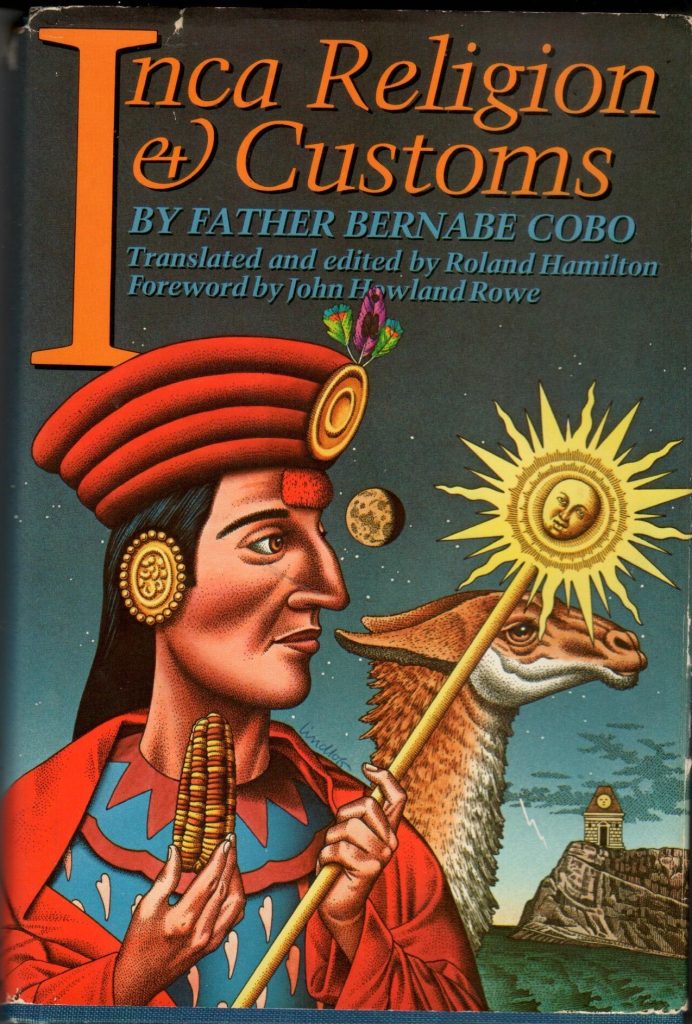
BELIEF essentially means that you are assuming something that you do not know.
You actually believe in something you actually do not know.
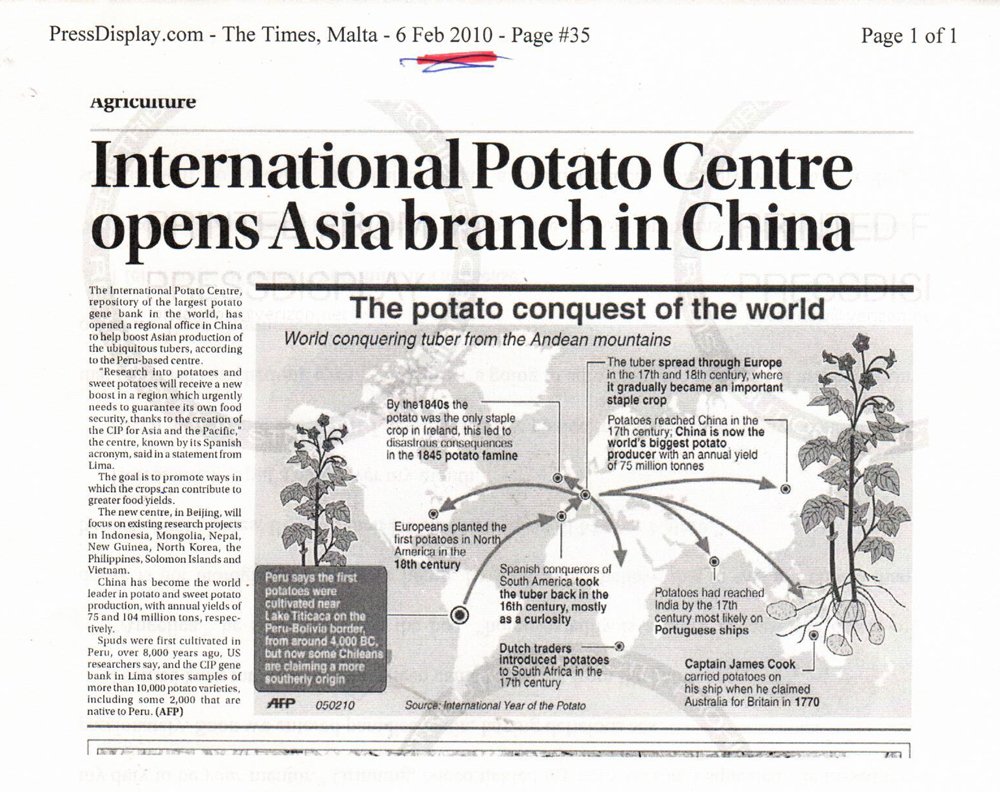
For more information on the potato: visit my website 2016
GALILEO:
All Truths are easy to understand once they are discovered; the point is to discover them.
Anthropologists and archeologists have been wondering why the Incas had
NO WRITTEN LANGUAGE.
How about looking at our cradle of Western Civilization: SUMER.
I have a hunch they had no written language . . . because there was
‘no international’ TRADE . . . necessitating long distance communication.
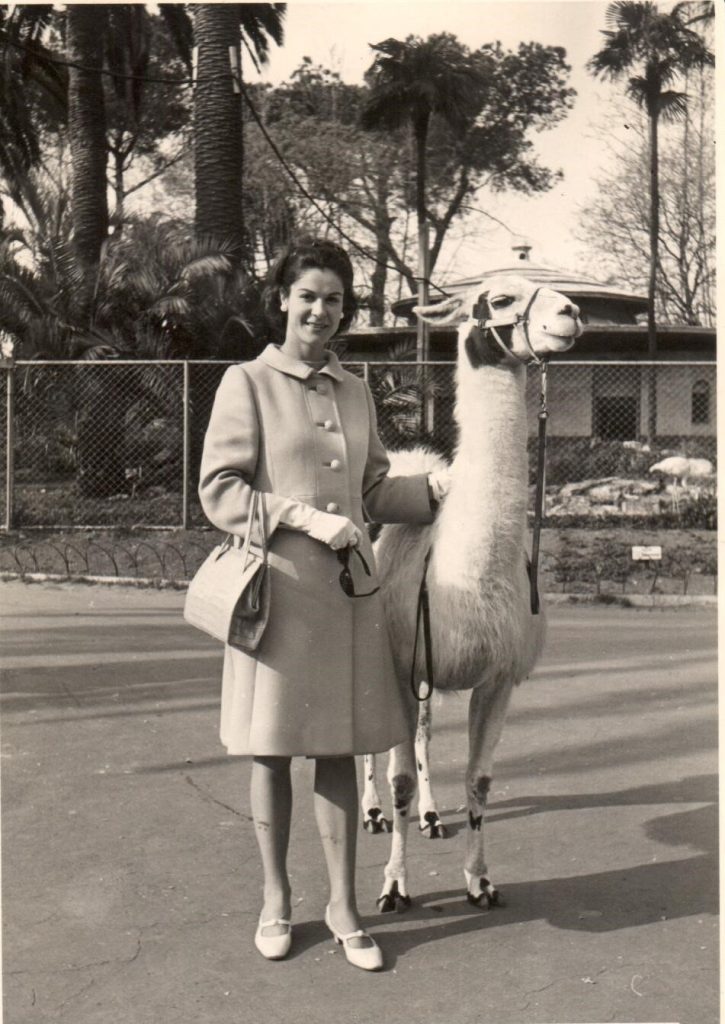
LLAMA and ME
ROME: ZOO, March 1967
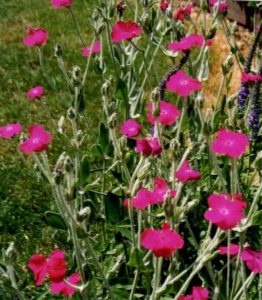
Rose Campion (Lychnis)
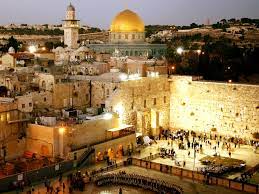
PALESTINE
THE CONTEST FOR JERUSALEM
King David made JERUSALEM the capital of Judea.
King Solomon built the Temple.
In 70 CE, the Romans destroyed the Temple of the Jews.
Burial place of Jesus Christ: Church of the Sepulchre—the Rock of Calvary.
In 638 CE, Caliph Omar entered Jerusalem; fifty years later was erected on these ruins the Dome of the Rock.
In 1841, Orson Hyde erected on the Mt of Olives an altar and beseeched (Google) God to restore the kingdom unto Israel and raise up Jerusalem as its capital and continue her people as a distinct nation. On the site of the altar was built a branch of Brigham Young University.
THE OLD TESTAMENT
THE TEN COMMANDMENTS
2—YOU SHALL HAVE NO OTHER GODS BESIDES ME
6—YOU SHALL NOT MURDER
THE NEW TESTAMENT
GOSPEL OF MATTHEW
1—A record of the genealogy of Jesus Christ the son of David,
the son of Abraham.
5:27—Do not think that I have come to abolish the LAW or the PROPHETS; I have not come to abolish them but to fulfill them.
10:34—Do not suppose that I have come to bring peace to the earth. I did not come to bring peace, but a SWORD ……


STONE AGE CUISINE
NOVEMBER
ASIA:
The story of RICE
“I eat rice for breakfast, lunch and dinner,” she said. “If I don’t eat rice, I feel like I haven’t eaten. What else can I eat?”
STAY TUNED!
Email your feedback about the story to the author at rosecamelia@verizon.net.
November
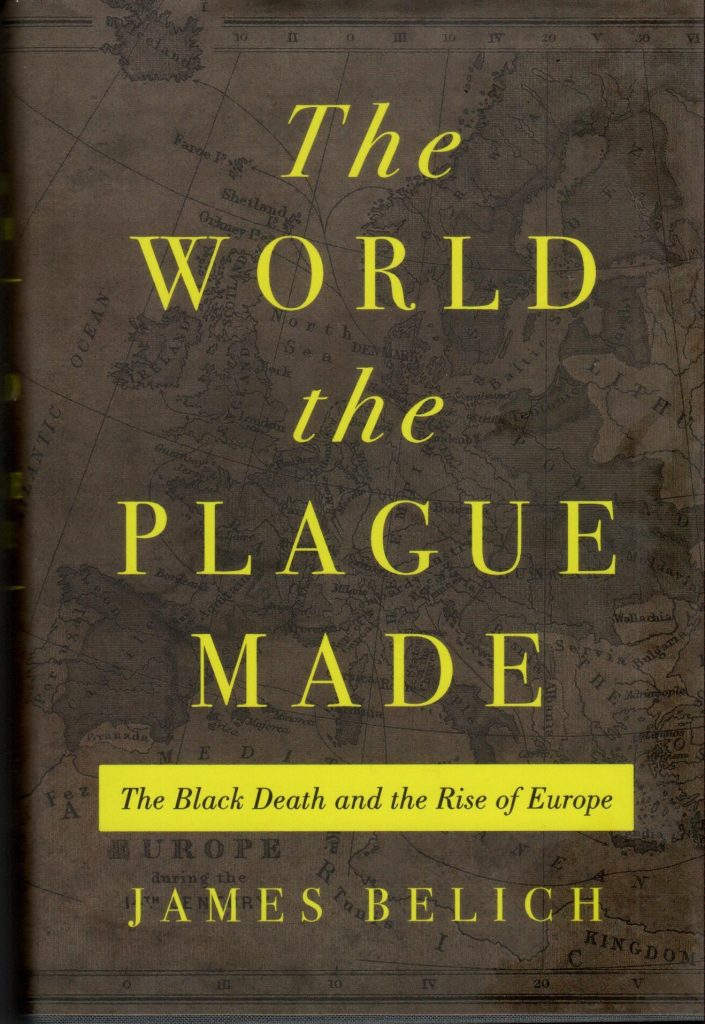
The WORLD the PLAGUE MADE
A ground-breaking history of HOW the Black Death unleashed revolutionary CHANGE across the medieval world and ushered in the modern age—GLOBAL TRADE.
Today: COVID changed the work-place:
Revolutionizing the “educational environment”.
[Book-banning; free speech/woke; the gay movement]
EINSTEIN:
I fear the day when technology will surpass our human interaction.
The world will have a generation of fools.
EINSTEIN:
We shall require a substantially NEW MANNER OF THINKING
if mankind is to SURVIVE.

THE WATERS OF CREATION
“I AM THE SOURCE OF THE UNIVERSE”
RICE:—ORYZA SATIVA
AN ASIAN MONSOON CROP: AQUA--CULTURE
3000 BCE
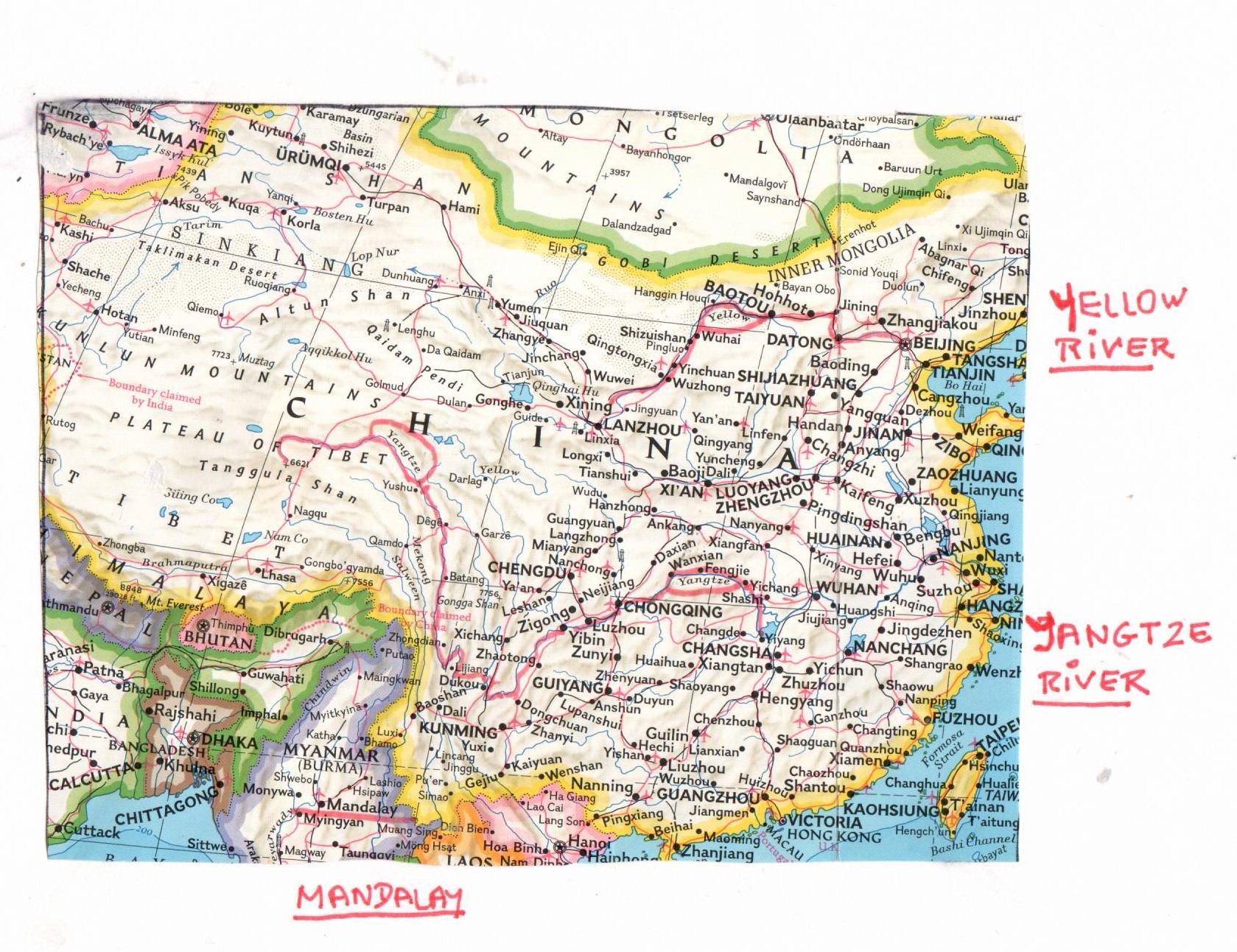
The location story
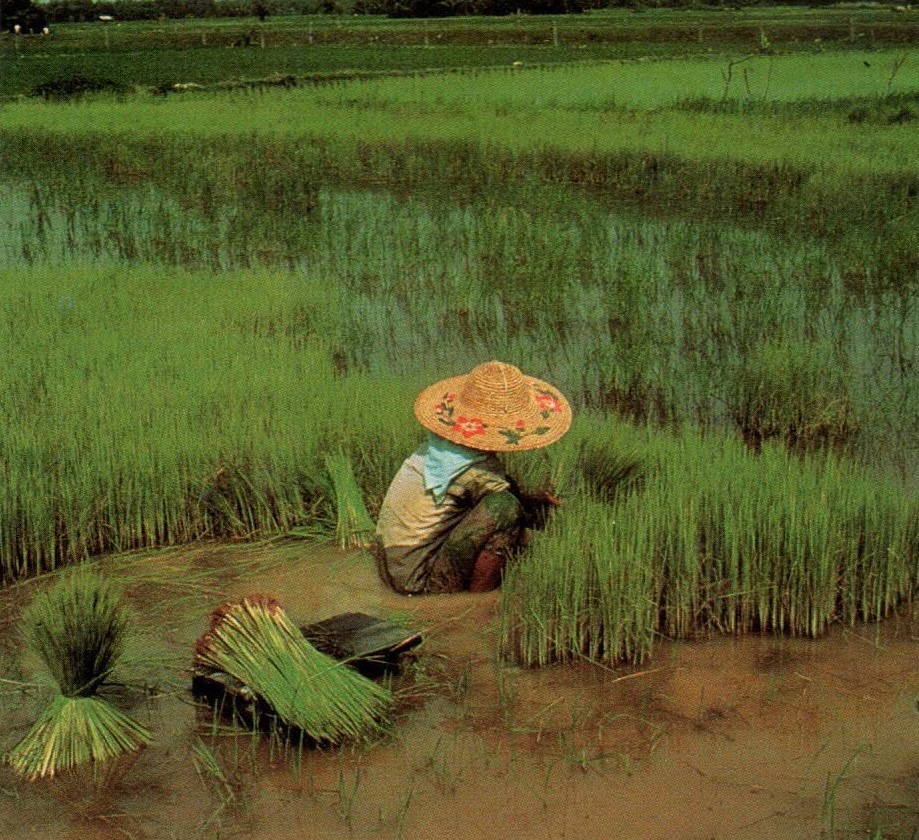

Welcome to my cookhouse: Chez Eve
FOOD on-the-go!
Here is our story of fortune: of fate. How Adam and I built our food-and-shimi Nirvana market. Take my word for it, the stakes were high.
We, our community, had been planting our food: rice. Let’s eat means eating rice—from sunrise to sunset.
The sun burned on my head. Standing in muddy water planting food, my face was hot and wet. I wiped my eyes. In a flash . . . I saw a picture. Work done, we went home. And I made a head-covering with soft bamboo grass—just like in my picture!
Pointing his finger at my head—the finger of fate—Adam named this creation: HAT.
Of course I also made a hat for Adam. We became known as the “hatters”.
One day, in a flash . . . I saw another picture . . . of making hats in exchange for food!
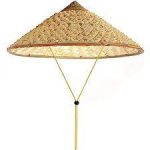
Before I start my story . . . I want to offer my thanks to WOOH, mother of Adam. She lost her husband and four children in a plague in her homeland near the RIVER YANGTZE. She feared for her life. She took courage and left with Adam. They walked and walked—until she no longer could use her feet. Adam had to carry her on his back. One day he got tired. She pointed at the paddies we were preparing. Hands are a perfect silent tool for communication—she pointed her finger at herself and Adam . . . nodding if they could stay with us. My mother, SREEKIT, her eyes fixed on Adam nodded. Wooh pointed her finger at me . . . and then at Adam. I liked him . . . and nodded! He smiled at me. And so we became a couple.
FOOD: THE FUEL OF LIFE
[for more information on RICE, please visit website 2016]
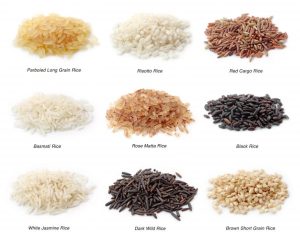
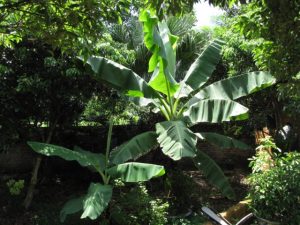
BANANA GROVE

BAMBOO IS A GRASS

We live on the slopes of a big mountain north of Mandalay.
Rice regulates our cycle of life because rice is as good as life itself. The spirit in charge of rice equals the essence of life. We worship the rice spirit and the land-guardian spirit, protector of the paddies. Once a year, at the beginning of a cycle, we have a water festival. Planting our food is labor intensive, so everyone is involved. We start by making “seedlings”—sowing some of the best (unpolished) grains in a special place with water that we watch every day. When the baby-plants are two fingers tall, we pull them up. We discard the unhealthy plants and pinch the tops of the healthy ones and plant these in shallow water in water-fields called paddies. Where Adam was born, the fields have a low mud wall to keep the water in place. Because of the slopes, here the walls are of stone: a staircase of water-terraces—a living landscape! Harvesting the tall plants is also a communal job. We collect the grain-plants with our hands, cutting the stems with something sharp: flints or sea-shells. We bundle up the cut plants: making a “bouquet” called sheaf. With our bamboo sticks we beat the sheaves so the grains fall on the ground. You need strong arms, so men do this work. Then the women use a bamboo fan to blow away the chaff. The oldest woman, with the most experience, shows us which grains to collect for the next cycle of food-planting. The bulk—our surplus food—we put in hollow bamboo containers. When Wooh left her homeland she took along, in a small container tied to her back, grains of brown rice. Here we grow red rice.
When I was a child, I watched mother Sreekit prepare our food. She would cut up into pieces a banana leaf and on each piece she’d put some grains that had been soaking overnight in water. She then added more water. Then she folded the leaf into a pouch—fastening with bamboo “toothpicks”. I finally got the hang of it!
My father, SPREE, takes care of the shallow cooking trenches lined with stones that are kept hot day and night. Like my teacher Sreekit, I put the pouches on top of the stones and cover the trench with large, wet banana leaves. Once in a while, I sprinkle water on top of the pouches to keep them steaming. It is a time-consuming job. We have several trenches to look after so we have a constant supply of cooked food.
Wooh planted her brown rice and Adam harvested her paddy. She cooks her food in a special container they use in her homeland. She takes young bamboo grass and braids it—making it look like a cupped hand. For several days, she soaks these cups in water. Then she puts sliced ginger-root at the bottom and tops it with soaked brown rice; covering the containers with a piece of banana leaf. She puts her cups next to my banana pouches to cook. Wooh smiles from ear to ear when we tell her that her food is delicious. A neighbor drops in and also eats her ginger-rice; saying it’s the best food she tasted in her life. All smiles, Wooh puts up three fingers and nods at the containers of ginger-rice—then points a finger at the woman’s necklace: a large sea-shell ornament on a braid of grass . . . Without a word, the neighbor gives Wooh her necklace; all smiles she leaves with her ginger-rice cups! Her face shining with pleasure, Wooh puts a finger to her lips.
Sreekit claps her hands. Spree suggests that Adam start offering these ginger-rice cups in exchange for an amount of our red grain. Wooh says we must wait—she has not harvested enough brown rice to start bartering. I suggest that in the meantime I make my pouches with sliced bananas and lime juice.
So . . . Wooh, Sreekit and I start experimenting with the many choices of bananas seasonally available. Wooh puts up her hand and moves her fingers; nodding at a bunch of what is locally known as sweet fingers. She suggests that we crush the red rice with stones so the lime juice and the flavor of sweet banana enhance the food. And indeed, the steamed pouches are delicious! Smacking his lips, and pointing his finger at me, Adam says that this is SMACKY!
I point my finger at Wooh and ask him to give his mother’s ginger-food a name. Adam puts his arm around her shoulder and says that her tongue-tasty preparation is BANG-BANG! Wooh chuckles. She takes his hand, kisses his fingers, and says that ginger warms your gut and gives you good health. Then she tells us that we must plant an orchard—limes, mangos, litchis, rambutan and durian—so we can cook rice with “fruits in season”. The word will get around . . . because, she says, everyone is curious!
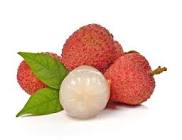
LITCHI
It has been some time now that I barter my hats for rice. People come to our bamboo house—build on stilts to keep us dry. Bartering had been brisk, so I had taught two girls how to make a hat. One day, a child joined them, and made two small hats. I smiled, and patted her on the head. After they had left, I had put the flimsy-made child hats up-side-down in the mud next to my bamboo-bench where I work. The next day the trio showed up. The child saw her up-side-down hats and, to my astonishment, she took some of my red rice and put them in her hats. She looked at me, laughed, and got a container with water, pouring some on the rice. Then she took pieces of banana leaves and covered her hats. The child jumped up and down, blabbering that she was making food. The girls clapped. Laughing, I also clapped. Some days later I uncovered the hats and saw that the rice had been cooked! That was the start of using hats for steaming rice. First, Spree has to make special trenches, square ones, for accommodating nine hat-steamers: a project “for the future”, because . . . . . .
Arm-in-arm, Sreekit and Wooh are approaching my work-bench. They kneel in front of me. To my amazement, they bow their heads. Then mother Sreekit tells me that I’m with child. She says the child will be a boy. Because . . . Wooh had noticed how I had been making my pouches without paying attention to fastening Smacky properly. Wooh points her finger at my belly. Then she kisses my feet! Sreekit says that in Wooh’s homeland only sons can worship the ancestors and she is grateful to me for carrying a future ancestor.
Adam joins me on the bench and Spree rushes up to hear the good news. I ask Adam why they worship ancestors. He looks at his mother, and then says that they thank their ancestors for teaching them knowledge. They showed their children how to prepare the soil and then plant the food. What else could they eat where . . . they were born? Adam points at his mother as he says that most likely they would have died from the plague. She took the courage to start a new life in another land. And they settled with us! Spree and Sreekit clap their hands, and Wooh blows me a kiss!

From that day on, I’m not allowed to walk alone looking for something tasty to add to my pouches. So I sit on my work-bench ‘cooking up new ways of cooking’! The child whose hats had given us the start for making the square trenches for nine hat-steamers has joined the crew of the two making my hats. The child, her name is Shooshoo, shows me her braiding trick: not tight, like my hats, so steam can touch the grains and cook the food. Shooshoo looks after ‘her’ trenches and warns us when the water is getting low.
Adam and Spree are making bamboo poles and baskets. Adam will carry the pole on his right shoulder with the food-basket in front and the empty rear basket is for collecting the red grains. He’ll go from paddy to paddy and peddle our food. Well . . . he was a big hit on the road because everyone knew the ‘hatter’. And as Wooh had predicted, the word got around that he was bartering cooked food: bang-bang, a brown ginger-rice and a finger-banana-rice called smacky.
Wooh, Sreekit, pregnant me and the two hat-makers as well as Shooshoo are working from sunrise until sunset making food on-the-go while Spree is busy fueling the trenches. He says that he needs two extra hands! He made a special bamboo basket for his first grandchild and the hat-makers and Shooshoo lined it with a braided coverlet of the softest bamboo grass.

Today is born Wooh’s first grandson! She has tears in her eyes holding the crying baby boy. Sreekit points her finger at my breasts. Giving the infant a kiss, Wooh puts him on my bosom.
Adam comes home; he puts his arm around me, the baby is suckling, and whispers in my ear that we created our first ancestor. We put the baby in his basket, and join the parents for “dinner”—a food pouch with sliced lotus roots I ‘cooked up’ in honor of our first son. Adam names the food: SMOOTHY.
Wooh reminds him that he must help making the ancestor altar where we can pray and worship. She has selected a space next to a litchi grove. Once the altar is build, Adam and I can announce the name of the first son. Adam invites Spree to help him; after all, this is to be a family “tree”.
We are standing at the litchi grove altar: made of bamboo. The oblong top is decorated with jungle flowers, bowls with brown-and-red rice, and two smooth gray stones representing the ancestors.
Wooh is holding a bowl with water. Adam tells me and my parents that she’ll bless the altar by scooping water on it—water is, like blood, life itself. Mother Sreekit is holding the baby boy and Spree a large smoothy pouch.
Well . . . Wooh scoops with her fingers water and sprinkles droplets all over the altar table while saying something in her native tongue. She turns around and nods at Sreekit, who gives her the infant. Cradling the baby in her arms, Wooh asks us for his name.
In tune, Adam and I shout . . . ASSAM!
The grandparents shout ASSAM, be blessed! Wooh offers Adam to hold his son.
Spree puts the smoothy pouch next to the rice bowls.
As is their custom, Adam and Wooh bow at each other; Wooh’s hands are clasped. We also bow, hands clasped.
Adam, holding Assam, asks Spree and Sreekit to follow him home. Mother Wooh needs to be alone with Eve. I know what’s coming because Adam had told me that knowledge of life has to be passed on from mother to mother; so I can pass this knowledge on to Assam’s wife!
They leave.
Wooh takes my hands and kisses me on both cheeks. Then she leads me to a bamboo bench behind the altar. We sit next to each other, facing the altar, and she starts the story of their knowledge called ‘wisdom’. She says that she learned the “art” of bartering from her grandmother who was famous in her homeland for her sense of “justice”. She says that nobody likes to be “cheated” and nobody wants to hear “lies”. I nod and squeeze her fingers.
So, Wooh says, you must not cheat and not lie. She squeezes my fingers and nods. Then she tells me that she saw—she puts both hands on her heart—an omen. Once Adam becomes famous peddling bang-bang, smacky and smoothy, he and I must start a market exchanging food from our house. Spree must build a storage house for the rice we get in return for the cooked foods. She takes my hands and says that she’ll use her eyes to oversee—she smiles—my “cookhouse”. She puts a finger to her lips and nods; then says I must not cheat my customers; that good will is important; that haggling is okay; that exchange of goods is good for everyone because everyone profits.
Wooh gets up. And facing me, tells me . . . that if I lie to my customers, they’ll spread the word not to trust us. She nods when she says that TRUST is the foundation of relationships.

Well . . . Adam peddled the cooked food, and soon we had to hire a strong man, Shang is his name, who walked behind him carrying the “surplus” cooked food! And then, one day, a woman shows up at the house telling me that she needs three pouches for her family. She comes in person because Adam has often been out of cooked food. Pointing a finger at herself, Wooh smiles from ear to ear.
And so the omen was fulfilled: our family started, as predicted, “on the spot” a food market: Food on-the-go from our house!
In his spare time Adam had built a fish-pond—in his homeland they eat carp—and Wooh prepares the fish in a ginger pouch. So Adam comes home with a tall bamboo container filled with what he calls rice-beer. A farmer living near his pond, his name is Shimi, exchanged the beverage for 3 bang-bangs. At dinner we have a jolly-good time! Wooh licks her lips. She tells Adam to get the recipe in case the farmer dies. That’s how Adam exchanged—after much haggling—the rice beer recipe for two cooked pouches every day as long as the farmer lives.
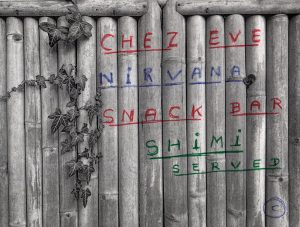
Well . . . under the watchful eyes of Wooh, Shang makes Shimi’s rice-beer behind her altar. And Adam and Spree are scouting for men who’ll make small bamboo containers for serving the beer and women who will deliver every day bundles of leaves for the food pouches. They learn how to negotiate so everyone is happy!
My two hat-makers want to go into business making hats at their homes and offer me an exchange “voucher” to supply me daily with 2 baskets of fruits. I am happy with this arrangement because I’m having a second child! Assam and Shooshoo bonded and she is his “nanny”.

Today is born Wooh’s second grandson!
Teary-eyed, his grandmother looks at the suckling newborn. Sometime later the naming of the infant is performed at her altar. Shooshoo is holding Assam by his hand. Wide-eyed with wonder, they watch Wooh sprinkle water droplets over the altar. Sreekit is holding the baby. Wooh turns around, a smile hovering on her lips, and Sreekit hands her the precious gift. When Wooh asks Adam and me for his name and we shout . . . BALI! Assam yells BALI! He tugs at his grandmother’s arm. Wooh bends over so Assam can see his brother. Screaming BALI, he plants kisses on his face. Adam comes to the rescue and scoops his firstborn in his arms. Wooh gives me the crying baby who instantly puts his mouth at my nipple.
We laugh!
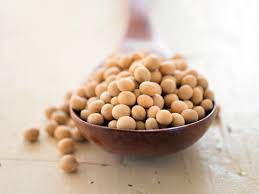
SOYA
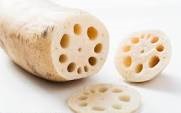
LOTUS ROOT
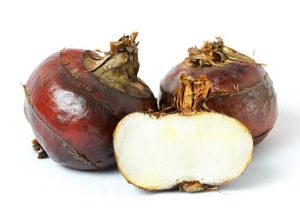
WATER CHESTNUT
Adam, Spree and Shang are building 2 storage houses for the rice we received in exchange for cooked food. Sreekit and Wooh look after the snack bar; serving customers. Often, groups of men on their way to work drop in for a sip of rice beer; sometimes they get ‘very merry’ and fight. So Wooh tells Adam to build an annex where only shimi is served. Shang says he’ll be the “bar-tender”.
One of my clients gave me a new food. She calls the beans SOYA; kept dry, these beans can, like rice, be stored. She tells me that she puts the beans in a shallow container with water and eats the sprouted beans with our ginger-rice. Shooshoo and Assam say they want to do this job for me; they are very entrepreneurial—taught by Wooh!
I’m thinking of making a sauce as spicy as Wooh’s fish-sauce—made with the bones of leftover carp. We offer this fish-sauce with our smoothies made with crisp, sliced lotus roots or crunchy, sliced water-chestnuts that Shooshoo collects from the paddies. However, not everyone likes the fish-sauce! So I experiment: cooking the dried, crushed soy-beans together with crushed ginger, and then add . . . shimi! I cook and cook until the sauce is thick. I offer my concoction for approval to Wooh and Spree—our seniors. They nod, saying it enhances our smoothies. Adam suggests that in his spare time Shang help me with the pounding of the ingredients. Well, he is so busy assisting me that Wooh engages three women to make shimi; behind her altar! We trade the soy-sauce in tiny bamboo beakers made by a neighbor’s two granddaughters.
Out of the blue, disaster strikes one of our largest rice storage houses: FUNGUS! Adam’s chest is heaving with fear, telling me that we must burn the rice before the fungus spreads. Everyone helps cleaning the brush around the ‘diseased house’. Wooh oversees the process—trenches are also dug, lined with stones. The news of a bonfire creates a sensation and people flock to watch this burning of FOOD. Wooh points a finger at Spree to light the fire. My father is filled with remorse, mother Sreekit said, because it is his job to keep an eye on the rice houses. Everyone watches in silence as flames engulf our surplus food.
Suddenly, eyes shining, Assam claps his hands; instantly, imitating his brother, Bali claps. And then all the children clap. And then, imagine, Wooh the finger-pointer claps! On cue, Adam claps . . . and then everyone claps! What a sight, indeed—this bonfire!
For some time, the ashes are smoldering. Wooh says that we must collect the cold ashes and throw them in the river; that’s what her ancestors did when a catastrophe like ours had hit them.
Wooh asks me to come to ‘our altar’ because she wants to consult me. I feel honored! So we sit on her bamboo bench behind the altar. I’m wondering what she’ll teach me this time about ‘the wisdom of the ancestors’. Knowledge must be passed on! She starts by saying that most people don’t lie; they just tell the truth in a way so nobody sees it [their own spin]. I nod because I witness this every day talking with my customers. Wooh chuckles when she says that to stay ahead in any exchange I must use my eyes—she points a finger at mine—I must FORESEE a need so people crave it. I smile from ear to ear: I’ve listened to my customers and some have given me wonderful hints.
Wooh takes my hand and says that the boys love Shooshoo; they call her ‘sister’. She has been thinking of the day that I will replace her at the ancestor altar; in that case who will replace me? And in case I don’t have a daughter . . . she puts my hand at her lips and kisses my fingers: who will point the finger of fate? So . . . she’d like . . . we adopt Shooshoo as daughter. Surprise-surprise? I had thought the same; of adopting Shooshoo so she can continue my snack-bar Nirvana and make it into a food-emporium [supermarket]. I had confided my thoughts to Adam so he’ll not be surprised either.
All smiles, I look into Wooh’s eyes and tell her that her wish—adopting Shooshoo—we will acknowledge as ancestor wisdom. She puts her arm around me and gives me a hug, saying with tears in her eyes that she calls the day she pointed her finger at me her lucky day. Then we discuss how to celebrate the ‘birth of Shooshoo, Wooh’s granddaughter’.
Well . . . I talk with my mother, Sreekit, after all she’ll be Shooshoo’s grandmother too! Mother is all for it, and suggests we give her a new name. With a twinkle in her eyes, she points at Assam and Bali as she whispers to let the boys name their sister. I clap my hands.
I have a private moment with Shooshoo. I look into her eyes and tell her that we want to adopt her as older sister and that the boys will give her a new name. The girl has tears in her eyes and hugs me.
So Adam puts Assam on his knees and I have Bali on my lap when we ask them to give their sister a new name. In anticipation Shooshoo licks her lips. Bali looks at Assam as he licks his lips. Then Assam grins and points at a bunch of sweet bananas locally know as SUSU—[pisang susu]. Bali shouts . . . SUSU!

We, the family, assemble at the family ancestor-altar. Wooh and Sreekit, the grandmothers, decorated the altar with the girl’s favorite flower: the flaming-red canna. Giggling, Sreekit shows Wooh a pebble that has red speckles. She points at the granddaughter-to-be, flanked by the brothers, Adam, Spree and me.
Wooh and Sreekit are in front of the altar. Wooh nods in my direction and on cue I tell the children to join their grandmothers. Wooh holds out her hand with the pebble, saying this day is a lucky day because they are gaining a granddaughter.
Sreekit tells the girl to stand next to Wooh; who give her the pebble. All smiles, she tells the boys that when their sister puts her ancestor pebble on the altar that they must shout out her new name. Trembling with joy, the new granddaughter puts her pebble in front of the other ancestor pebbles. And in unison Assam and Bali shout: SISTER SUSU! And the family shouts SUSU!
We celebrate at CHEZ-EVE snack bar together with invited neighbors; embracing granddaughter SUSU.
It was a lucky day indeed! Daughter Susu is a fast learner. So I can concentrate on helping customers, my mother teaches her the technique of cooking with water. Because once you know how, you can apply this skill to cooking with other foods. And Wooh teaches her about keeping the rituals at the altar; she says that Susu is resourceful. Adam agrees, saying that having a daughter, who asks for his advice, helps him widen his own horizon. Assam and Bali follow their sister everywhere and observe how handy she is.

Today is born Wooh’s third grandson!
Susu is overwhelmed with joy that Wooh and Sreekit want her to hold the infant at the altar so Adam can give his son his name. We prepare the food to be served afterwards at Chez-Eve.
Wooh stands at the altar holding a container with water. She asks Sreekit to join her. She gives her the container, saying that this grandson will be hers to love. A tear rolls down my mother’s cheek when she performs the water ritual.
Adam puts his arm around my shoulder and tells his two sons and Susu, holding the baby, to join their grandmothers. Thrilled, the boys look in awe at their new brother. Adam whispers in my ear to name him. And so, pointing my finger, I shout . . . JAPAN!
In chorus everyone shouts JAPAN . . . the grandmothers pointing their fingers!
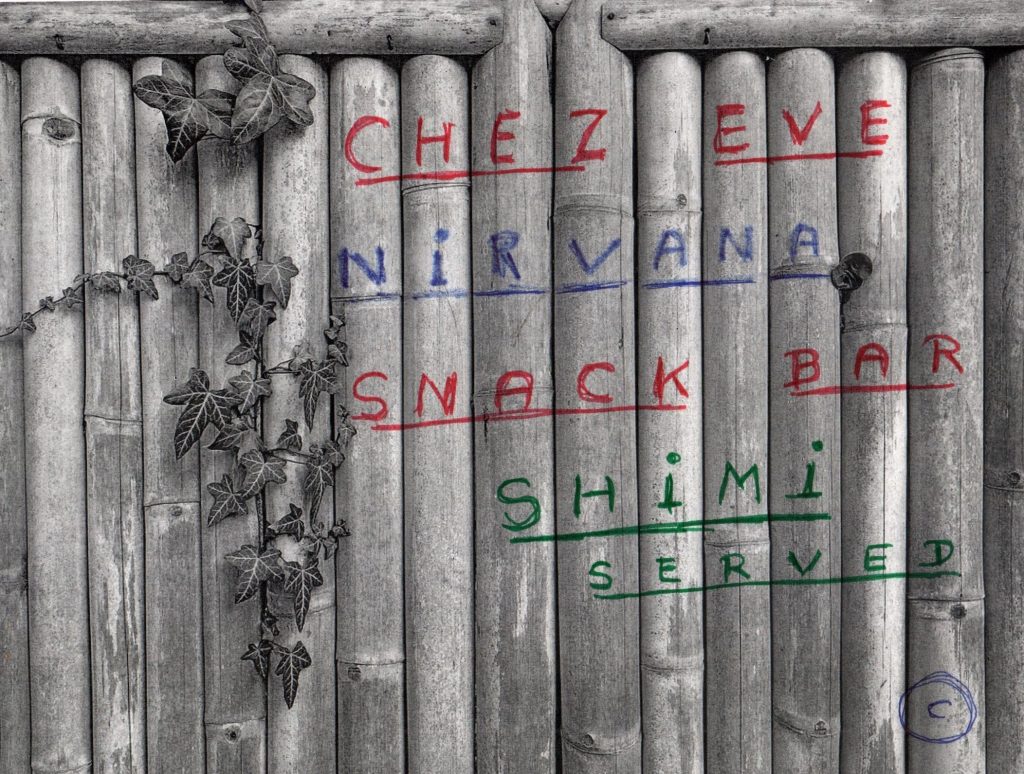
Today’s MENU:
Carp a la Adam
Baked Bananas
Rice pouch with mashed litchi
CARP: Clean inside of carp and outside until smooth; remove the eyes—otherwise . . . the fish will cast the evil eye! Make a stuffing: with brown rice, sprouted soya and the greens of the plant which grows at the fishpond next to the bananas. Mix with a light hand. Close the cavity with sharp bamboo-sticks. Wrap the stuffed carp in the leaves of the patchouli plant—on a bed of red flowers for coloring. Bake underground covered with earth for at least eight hours.
BANANAS: Take a large banana leaf and spread out flat. Put a layer of peeled, giant green bananas [plantain] on it. Mash ripe sweet bananas mixed with juice of orange. Pour over green bananas. Cover with large banana-leaf. Fasten top and bottom with bamboo-sticks and bake underground for two hours.
RICE POUCH: Make rice in patchouli water. When cooked, add mashed litchi. Serve with mashed mangoes.
FOOD EMPORIUM:
From village-market to supermarket to GLOBAL CUISINE: MEDIA/TV
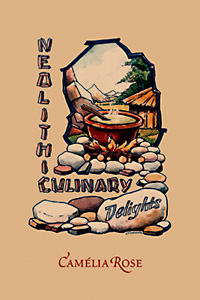
Our great civilizations were founded on FOUR STAPLE FOODS
WHEAT—Near East
RICE—Asia
POTATO—South America
CORN—Mesoamerica
Growing these staple foods, population centers developed along waterways and societies came into being. They needed centralized administration and organized religion. Above all, because of private property and extended trade in SURPLUS foodstuffs, WRITING became a necessity.
Surplus products produce private, corporate or state CAPITAL and a supply and demand market. The strongest producing communities became CITY-STATES and the rulers of countries.
The foodstuffs our pioneering ancestors grew were not too many. The menu of the Stone Age was signed: Bon Appétit Monotony.
Why would anyone want to change from a traveling/ hunting/gathering existence with a varied diet to settle down and GROW FOOD? Meat, fish, fowl supplied by nature was roasted on the open fire. But with a settled existence, and the invention of pottery, it was cooked in water and called soup or stew when wild plants and cereals were added.
What were the culinary delights of the Stone Age peoples on our planet Earth? Much depended on the plants nature had bestowed on each continent. Ethno-botany played a major role: the indigenous plants available for deciding on WHAT TO GROW AS A FOOD. The ‘Belly-Food’ plant potato and the grasses wheat, barley, rice and corn played an important role in their daily lives.
Stone Age belly-foods on which our civilizations were built are still produced and are now served on a global scale: The Electronic Age of Microwave Food and . . . Food on-the-go!
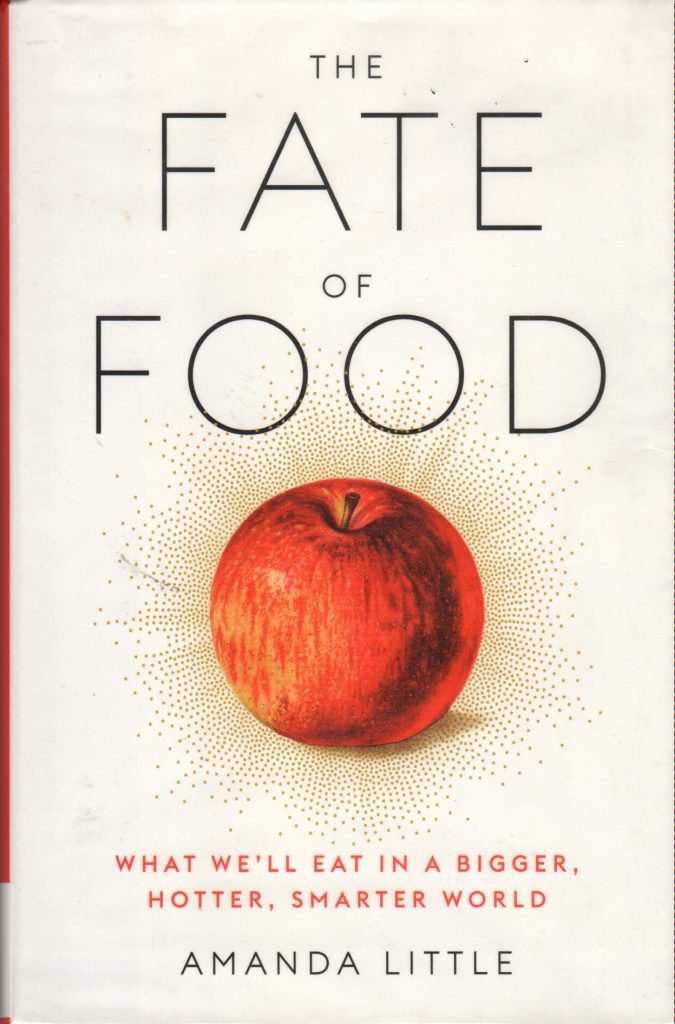
THE FATE OF FOOD
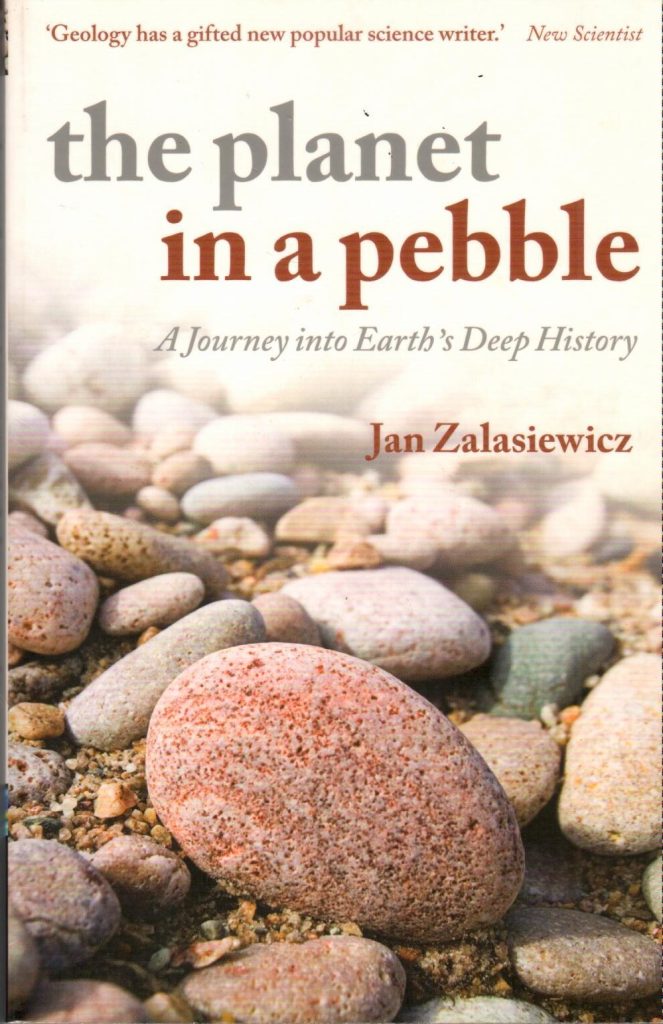
THE PLANET IN A PEBBLE
How life on Earth happened

The Waters of Creation
THE PENTAGRAM
The five-pointed STAR within a CIRCLE,
drawn in FIVE lines/strokes,
stood for the miracle/magic of LIFE:—CHNOPS.
The male (father) was the foundation of the family unit and his signature was FEET (five toes). The female (mother) was represented by HANDS (five fingers). The horizontal triangle represented the vulva (womb). The upright point represented the male organ and the bottom points were the feet: encircled they symbolized ETERNAL LIFE. The inner pentagon embodied the “terra firma” and the FIVE POINTS were for the “giver of life”.
CHNOPS
IF we are STARDUST—
We are a body/vessel of ATOMS
born from atoms and returning to atoms.
IN REALITY—nothing is born and nothing is dead
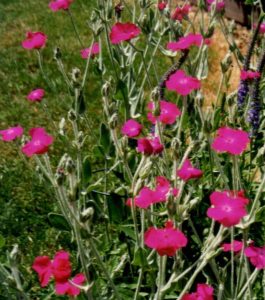
TAKE THE UNIVERSE ITSELF AS GOD
AND THERE IS NO DENYING GOD
STAY TUNED . . . !
Email your feedback about the story to the author at rosecamelia@verizon.net.
December

SHAKESPEARE
There is nothing either good or bad, but THINKING makes it so.
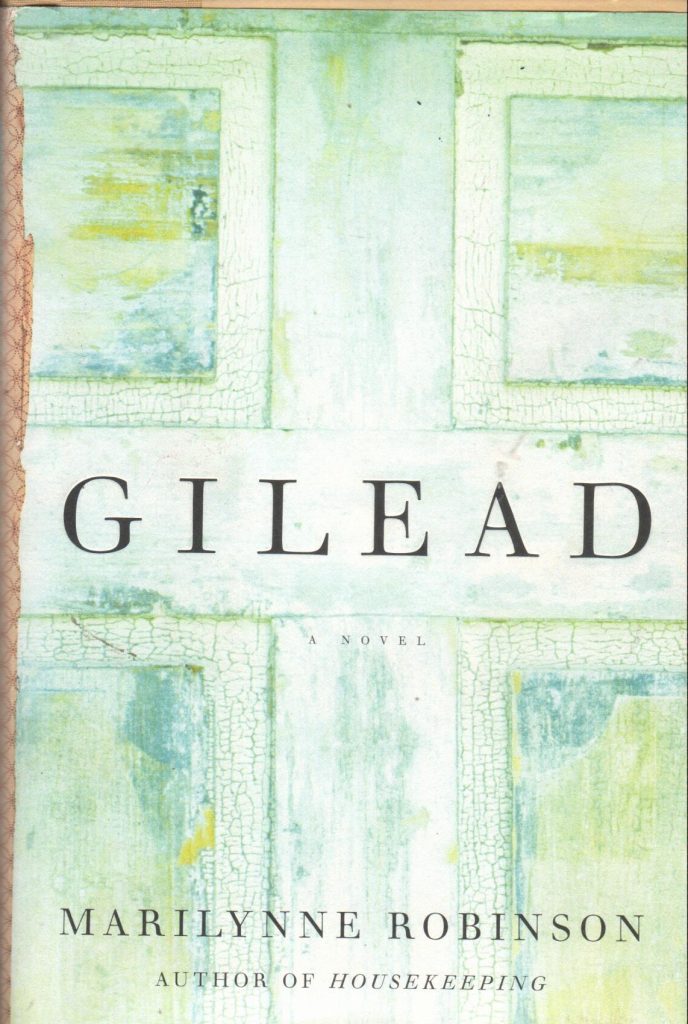
GILEAD
A 70-year-old dying pastor’s LETTER to his six-year-old son.
NEW TESTAMENT: LETTER from the apostle Paul -- 2 Timothy 2:8
“Remember Jesus Christ, raised from the dead,
descended from David. THIS IS MY GOSPEL.”
RELIGION BEGINS WHEN DEATH BECOMES THE CENTER OF THOUGHT IN ORDER TO GIVE MEANING TO MEANINGLESSNESS
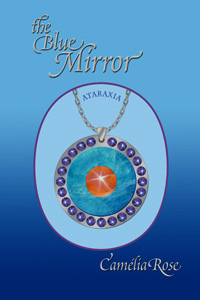
THE BLUE MIRROR
CHAPTER 9
Available as e-book
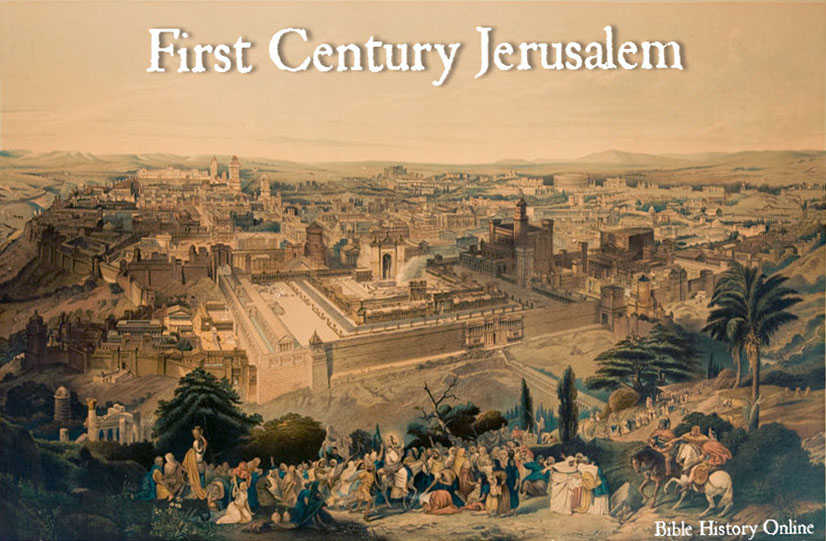
Christian New Testament
Galatians (1:18)
I went up to Jerusalem to get acquainted with Peter and stayed with him fifteen days.
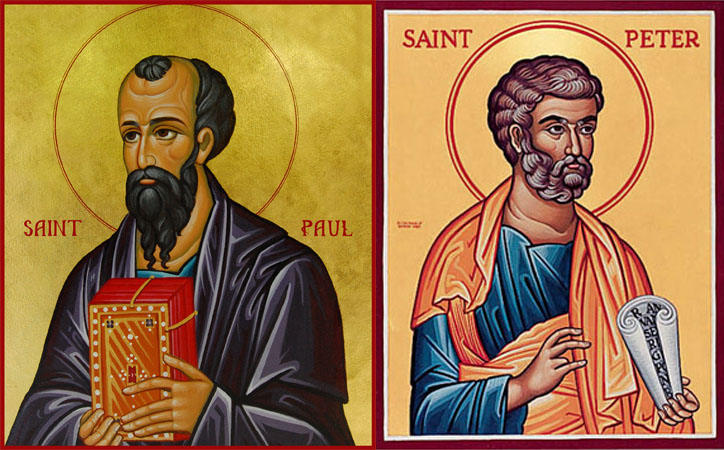
GIFTS TEMPT EVEN THE GODS
[Euripides]
A fictitious story may one day become a reality when made into a PLAY/MOVIE with flesh and blood characters. [Copyright still available]
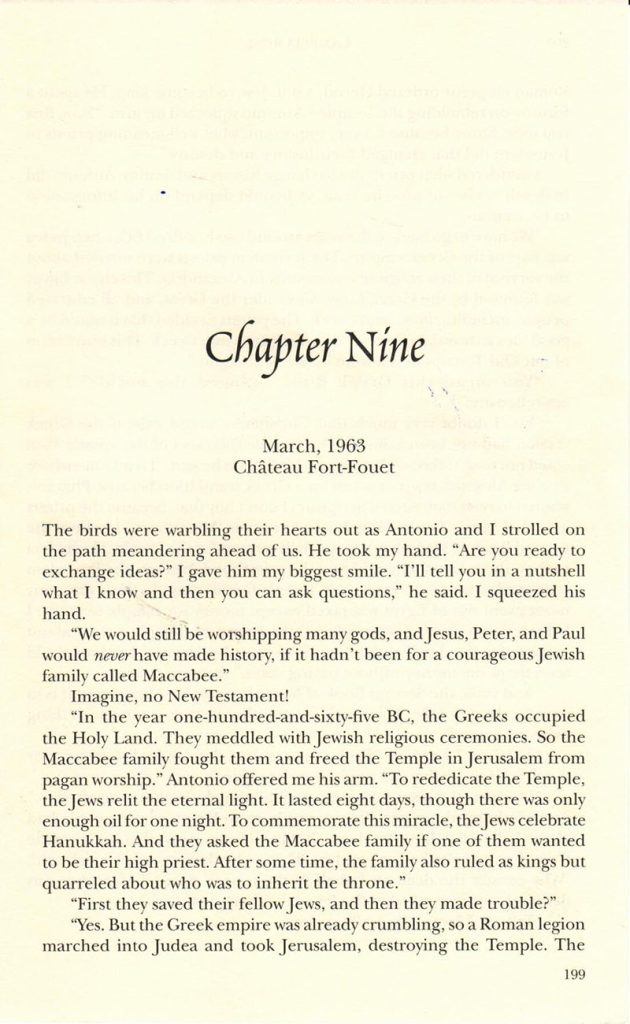
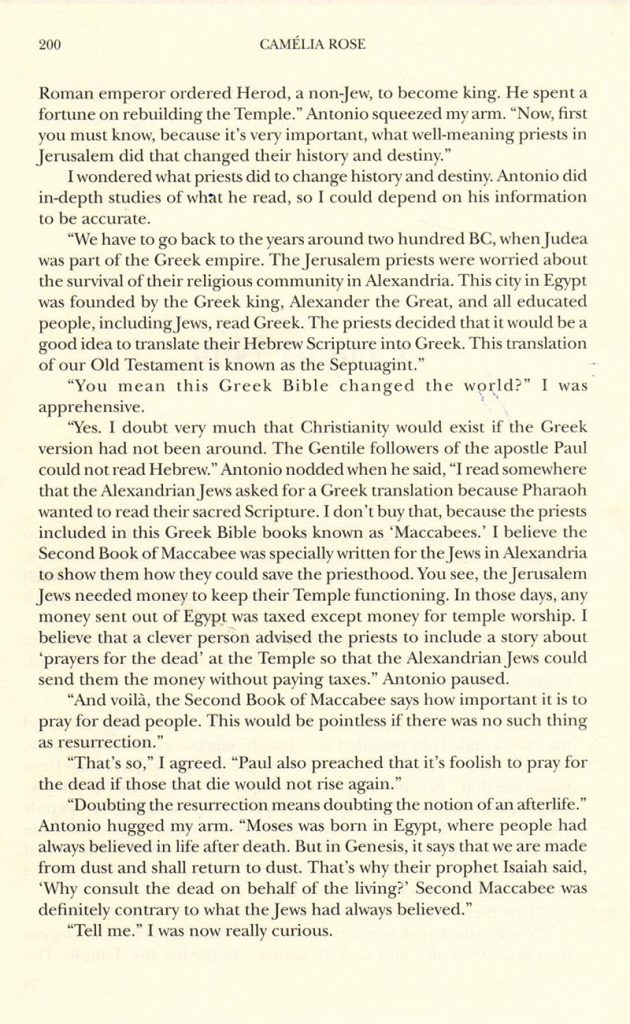
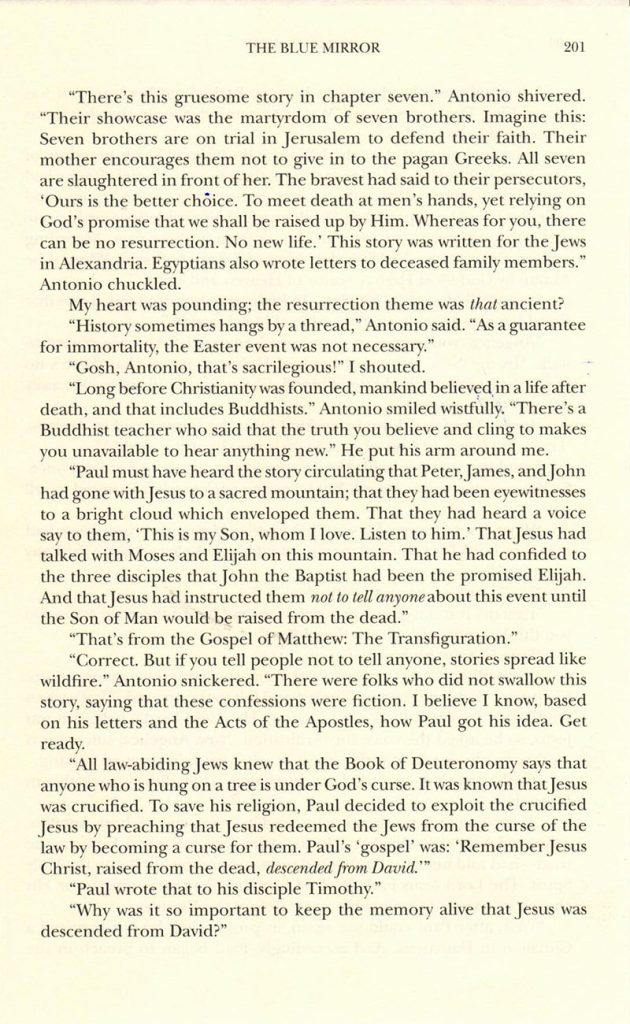
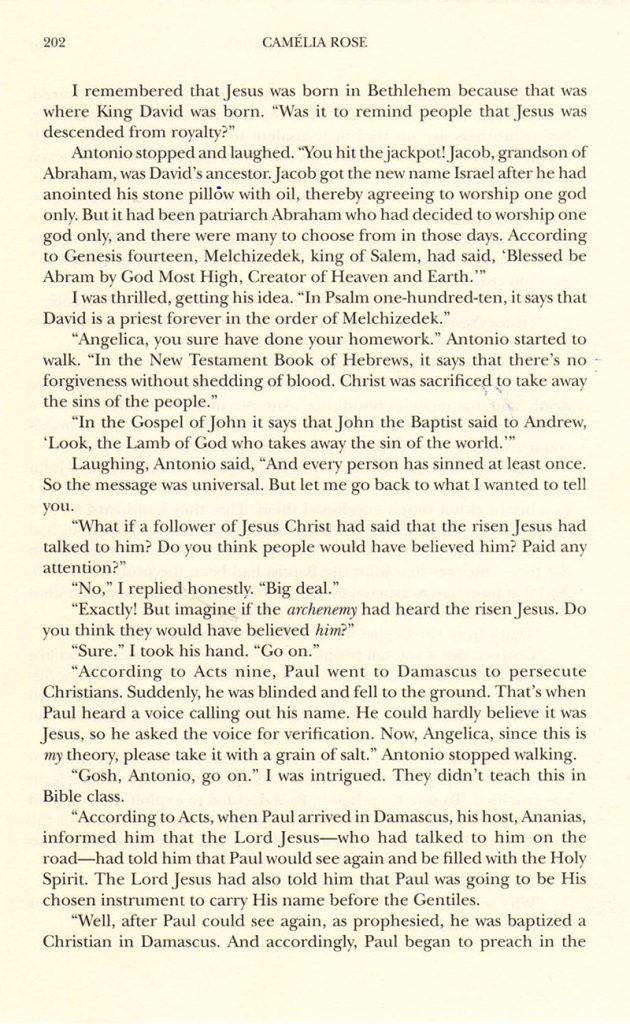
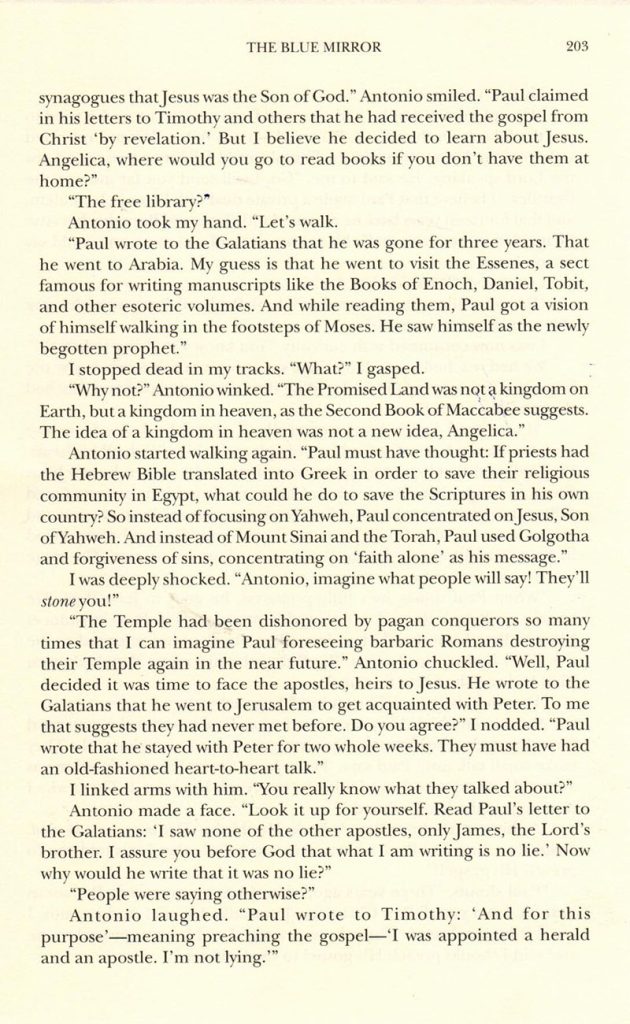
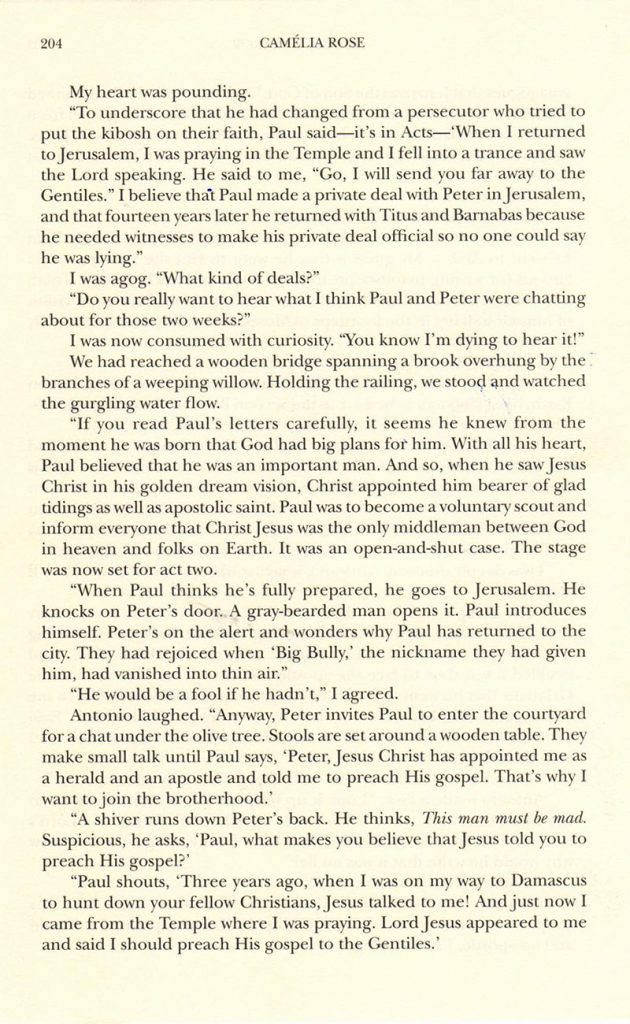
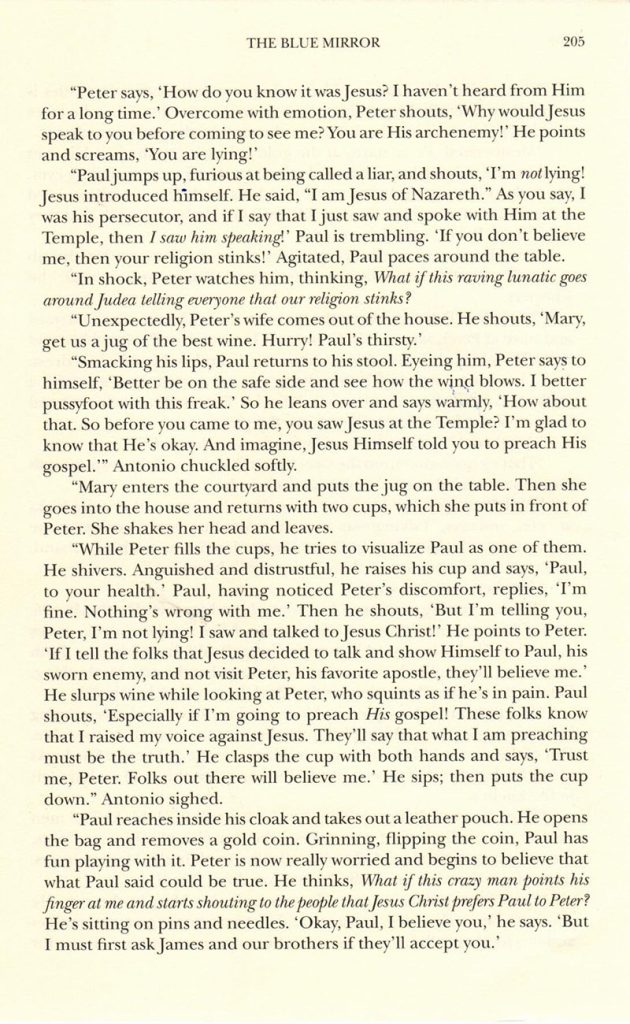
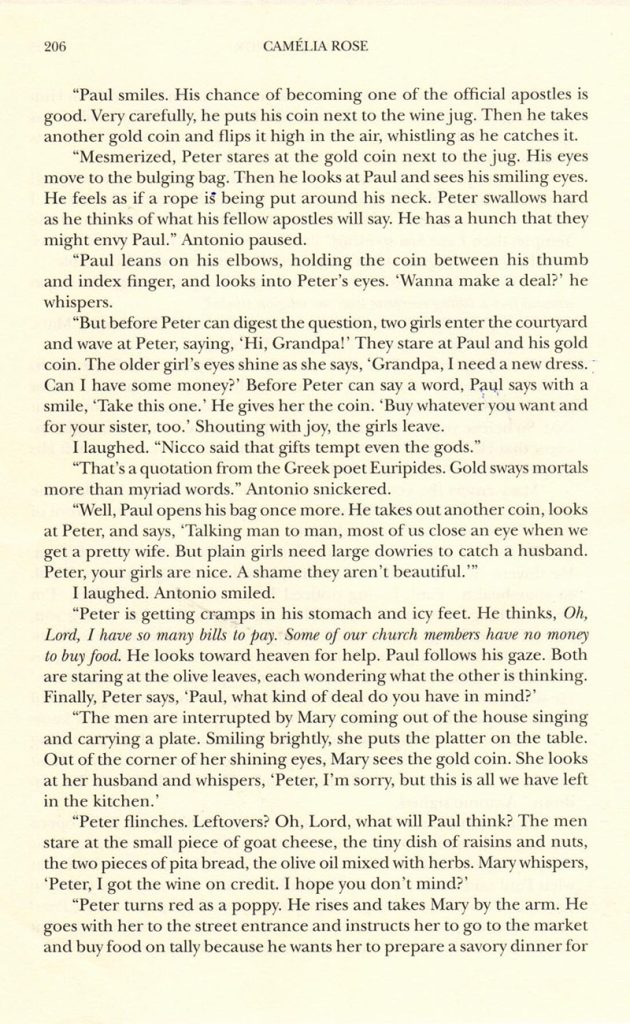
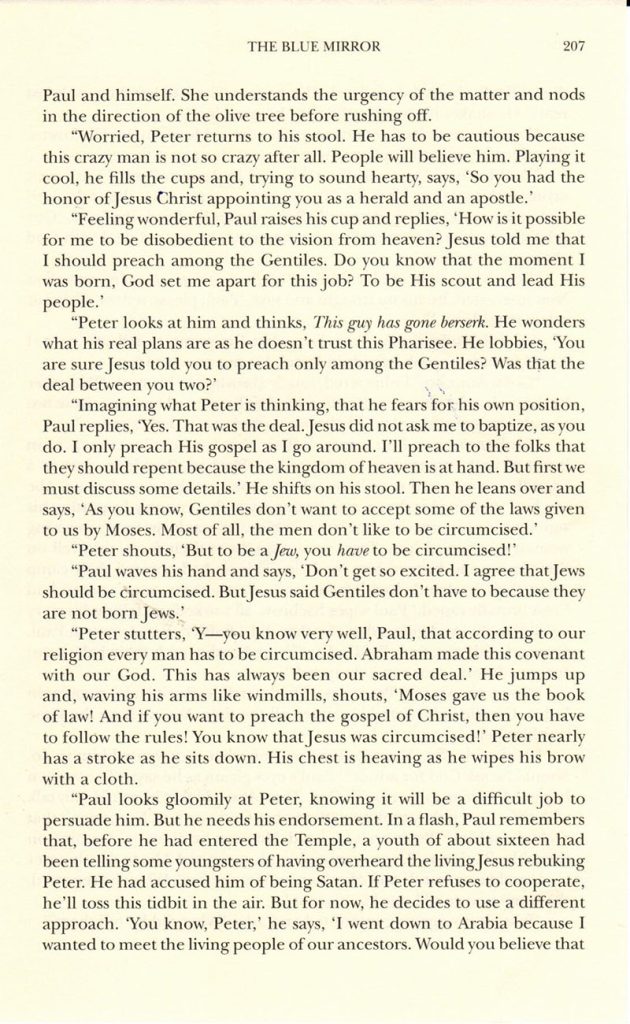
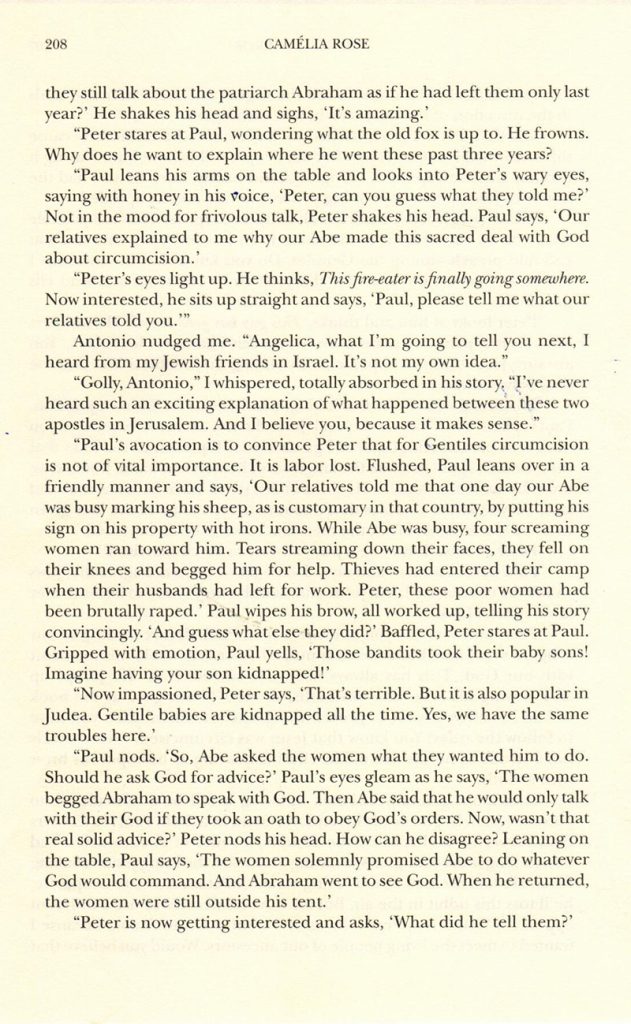
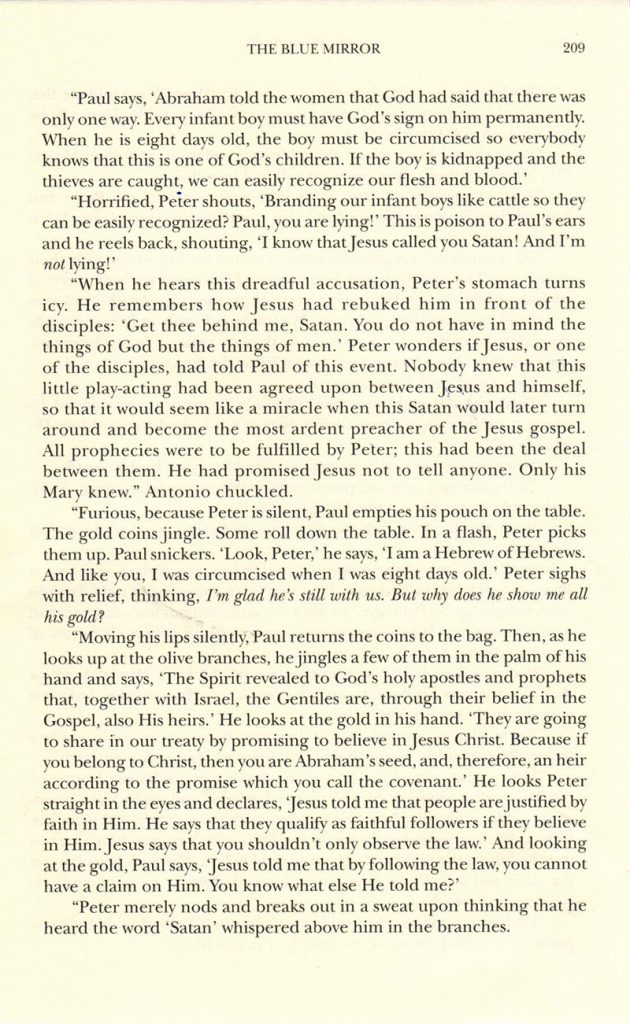
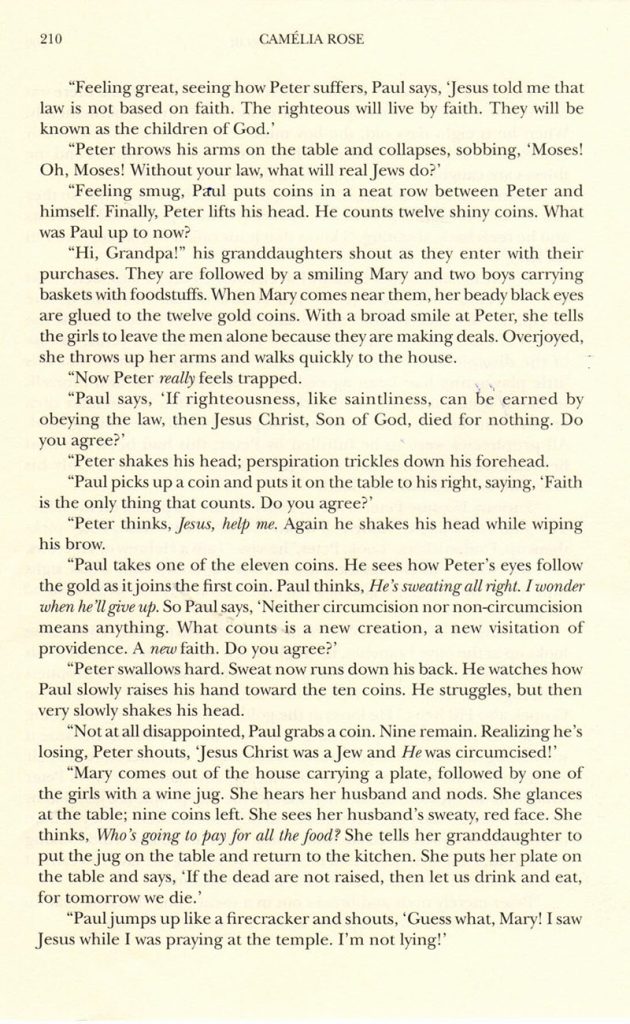
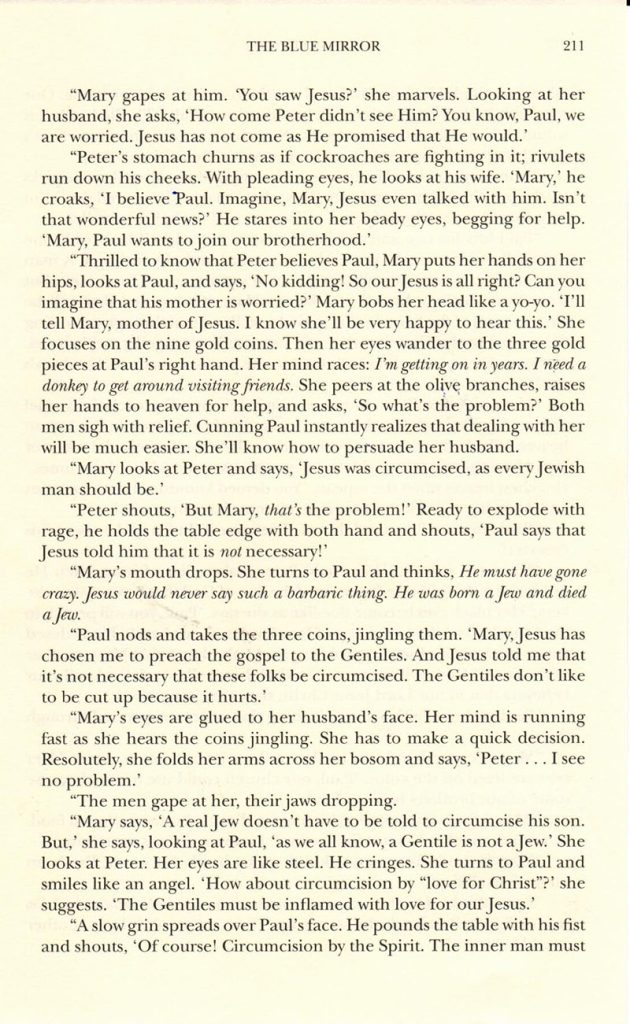
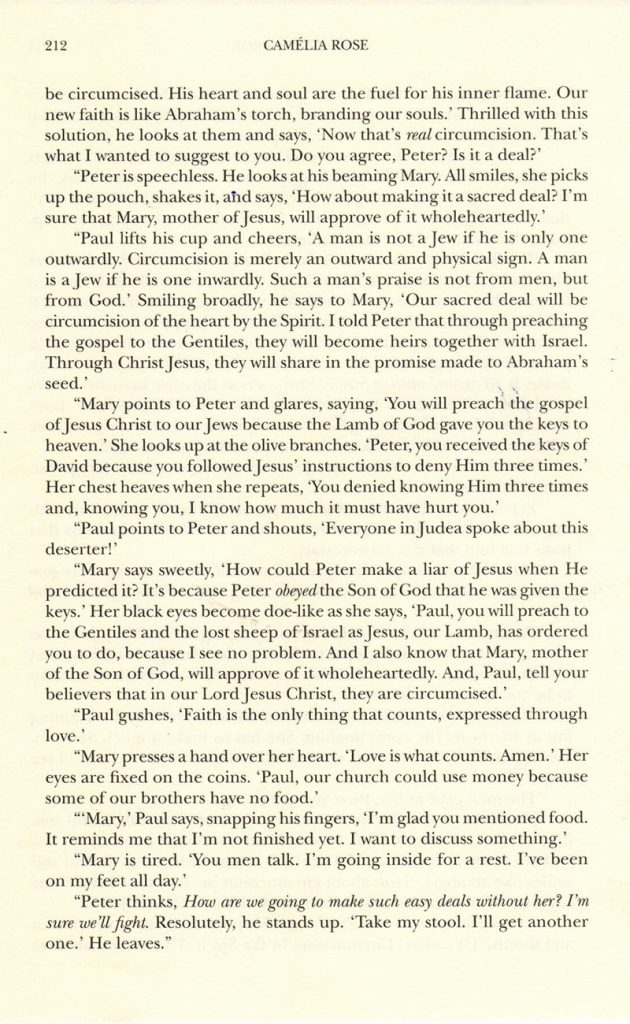
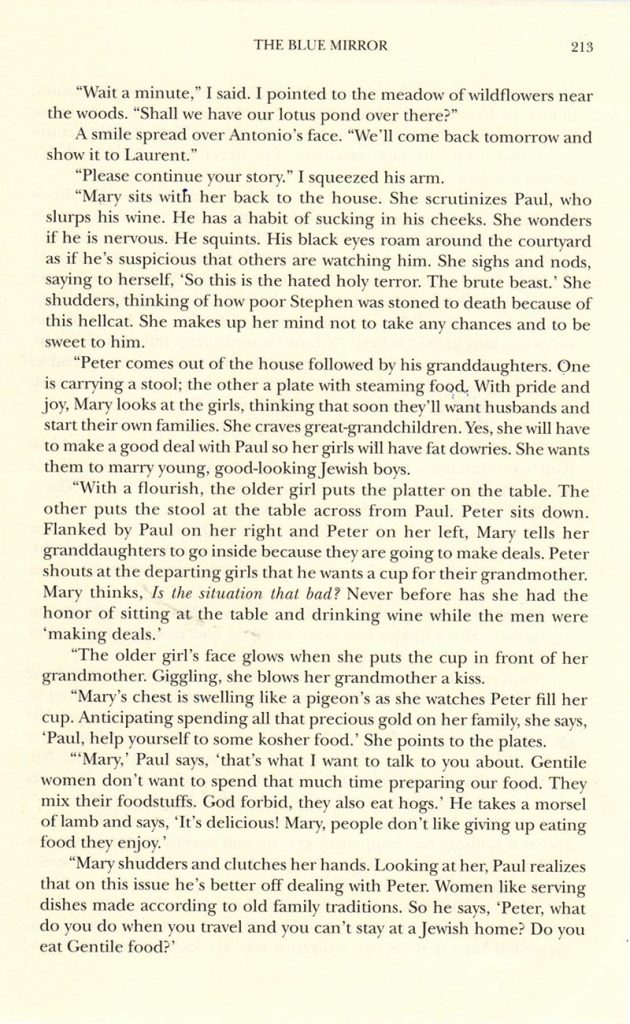
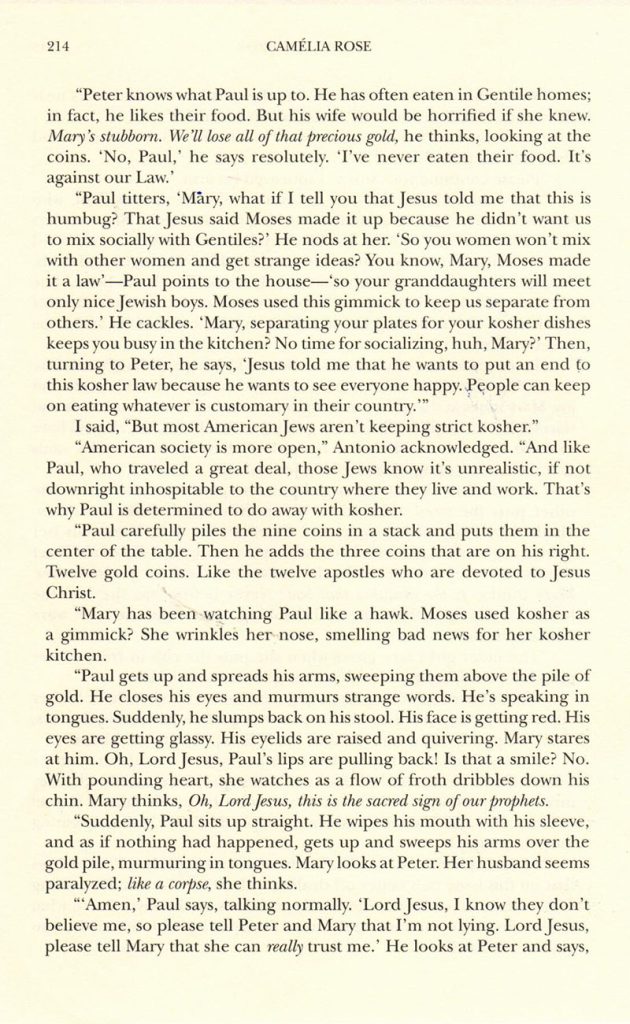
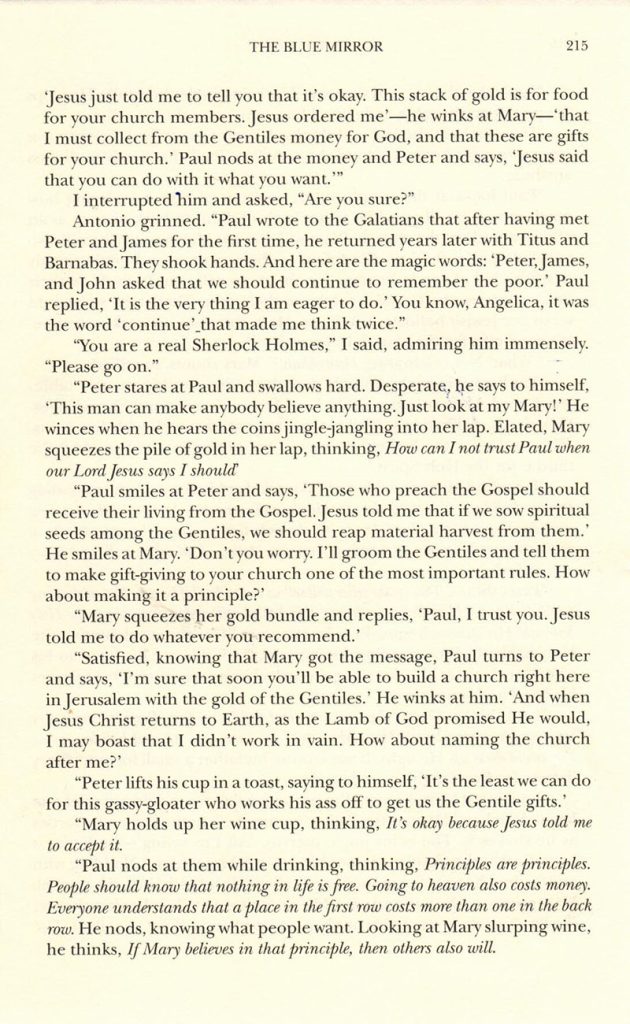
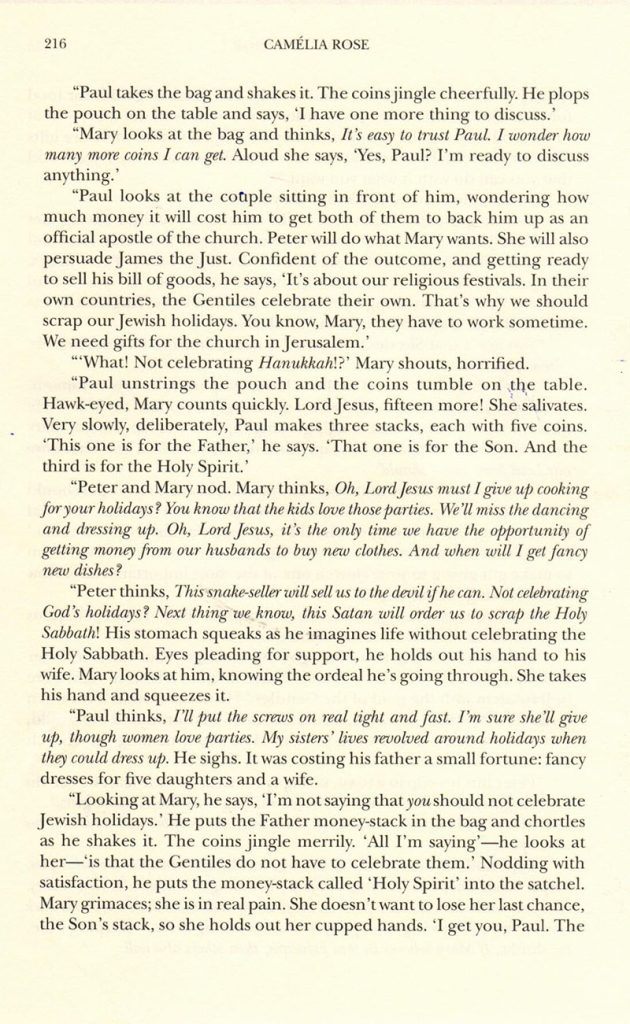
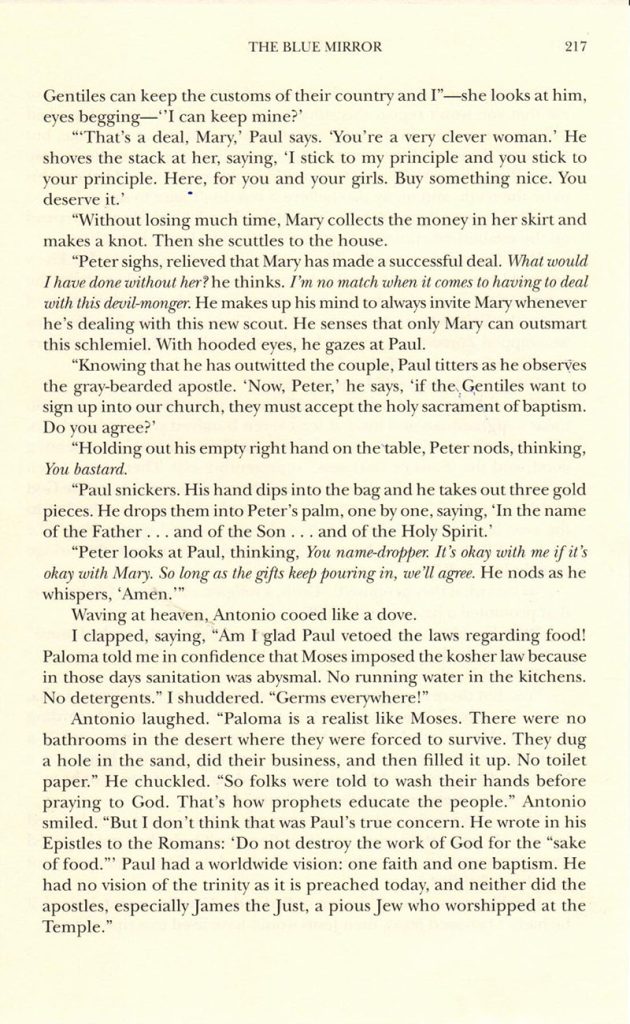
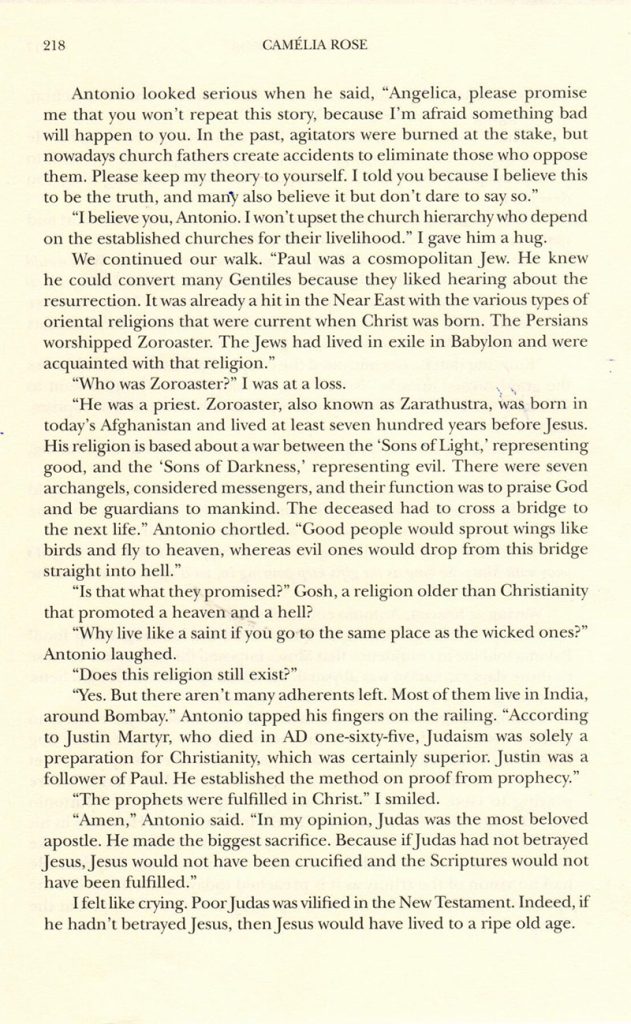
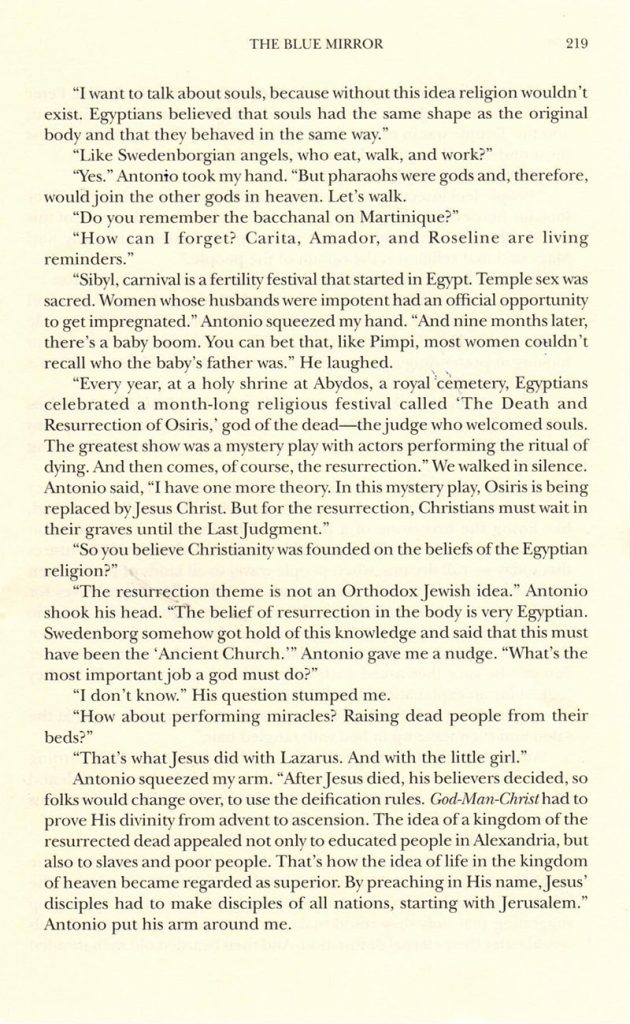
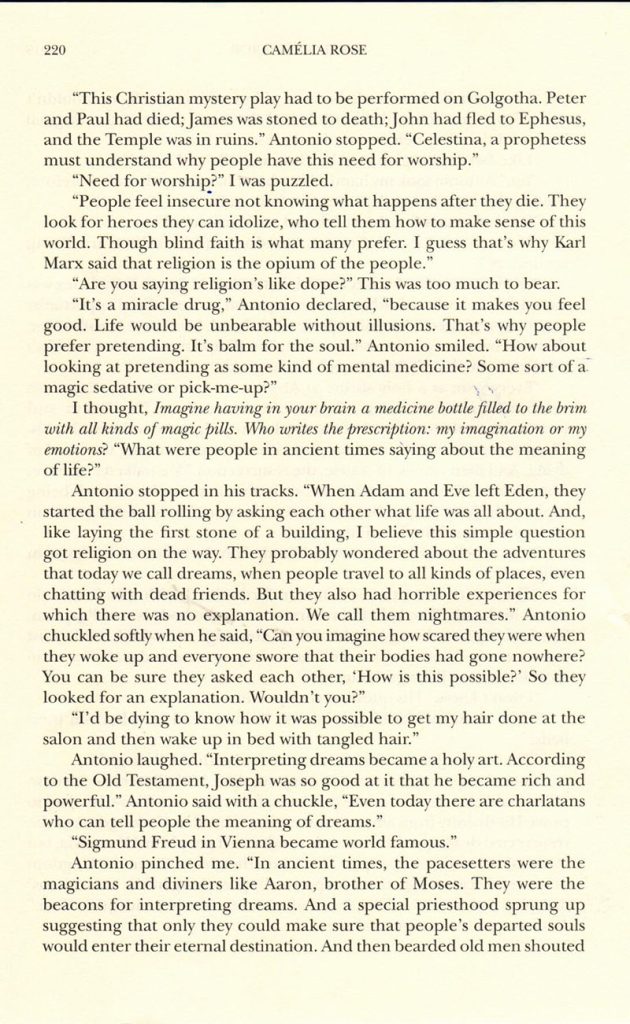
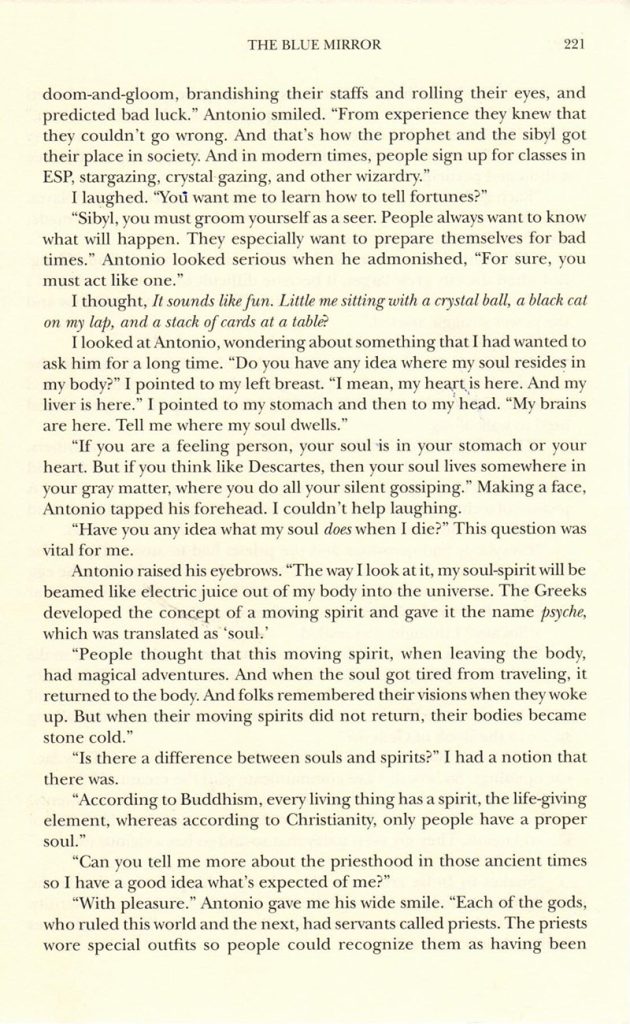
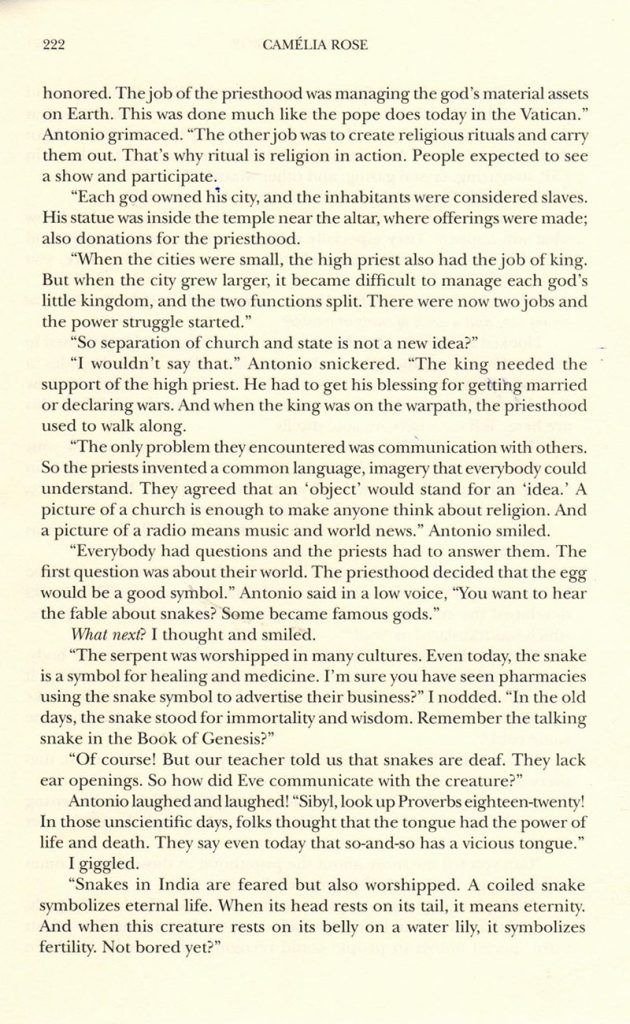
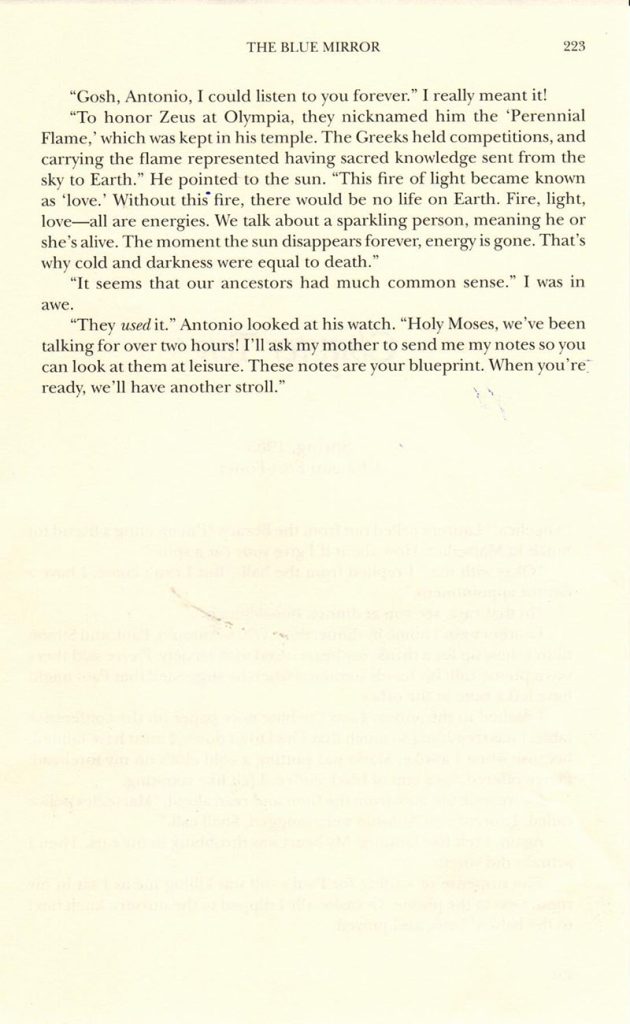
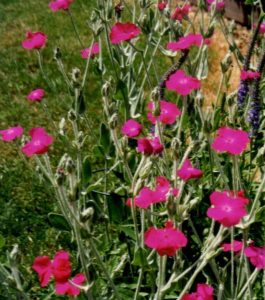
I want to thank Henry Van Dyke for his encouraging words:
USE WHAT TALENT YOU HAVE—THE WOODS WOULD BE SILENT
IF NO BIRDS SANG THERE EXCEPT FOR “THOSE THAT SANG BEST”.
EINSTEIN
IF MANKIND IS TO SURVIVE:
WE SHALL REQUIRE A SUBSTANTIALLY
NEW MANNER OF THINKING.
The Israeli-Hamas WAR reminds me of the wars between Sparta and Athens: and LYSISTRATA !
Instead of men determining the outcome, grandmothers and mothers will do the TALKING about SURVIVAL.
P.S. What are Palestinian CHILDREN doing in Israeli prisons?
I spent my childhood (1943-45) in Japanese concentration camps in Java.
My heart goes out to ALL jailed children: They are scarred forever!
VOLTAIRE: They only live who dare!
AMEN!
STAY TUNED ….. for 2024
Email your feedback about the story to the author at rosecamelia@verizon.net.
